Importance of Hospitality Management Education in Cyprus Hospitality Industry
VerifiedAdded on 2023/06/10
|100
|23908
|372
AI Summary
This study evaluates the importance of hospitality management education in enhancing the hospitality workforce ability of Cyprus hospitality industry. It discusses the challenges faced by the workforce in customer services without management education and provides recommendations on how ...
Read More
Contribute Materials
Your contribution can guide someone’s learning journey. Share your
documents today.
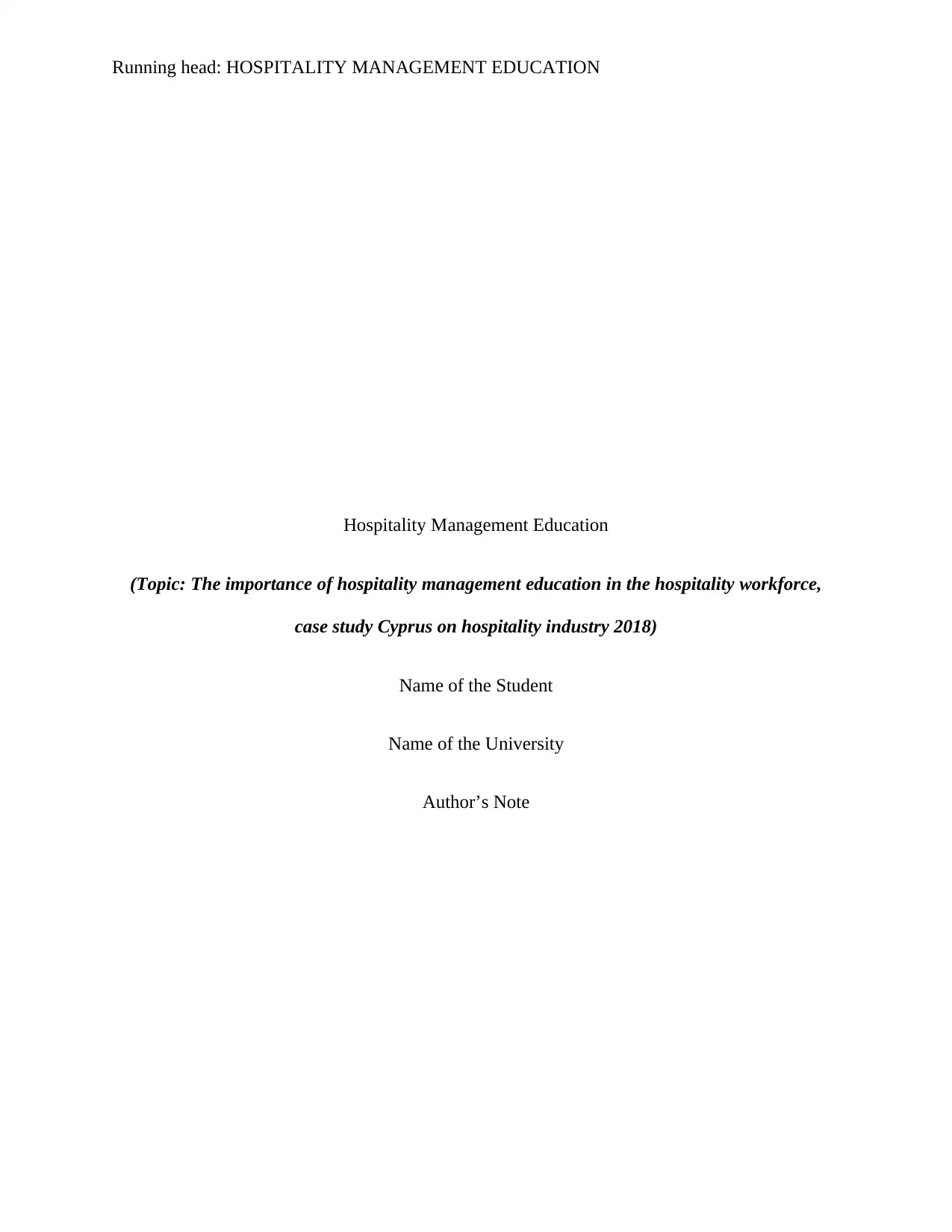
Running head: HOSPITALITY MANAGEMENT EDUCATION
Hospitality Management Education
(Topic: The importance of hospitality management education in the hospitality workforce,
case study Cyprus on hospitality industry 2018)
Name of the Student
Name of the University
Author’s Note
Hospitality Management Education
(Topic: The importance of hospitality management education in the hospitality workforce,
case study Cyprus on hospitality industry 2018)
Name of the Student
Name of the University
Author’s Note
Secure Best Marks with AI Grader
Need help grading? Try our AI Grader for instant feedback on your assignments.
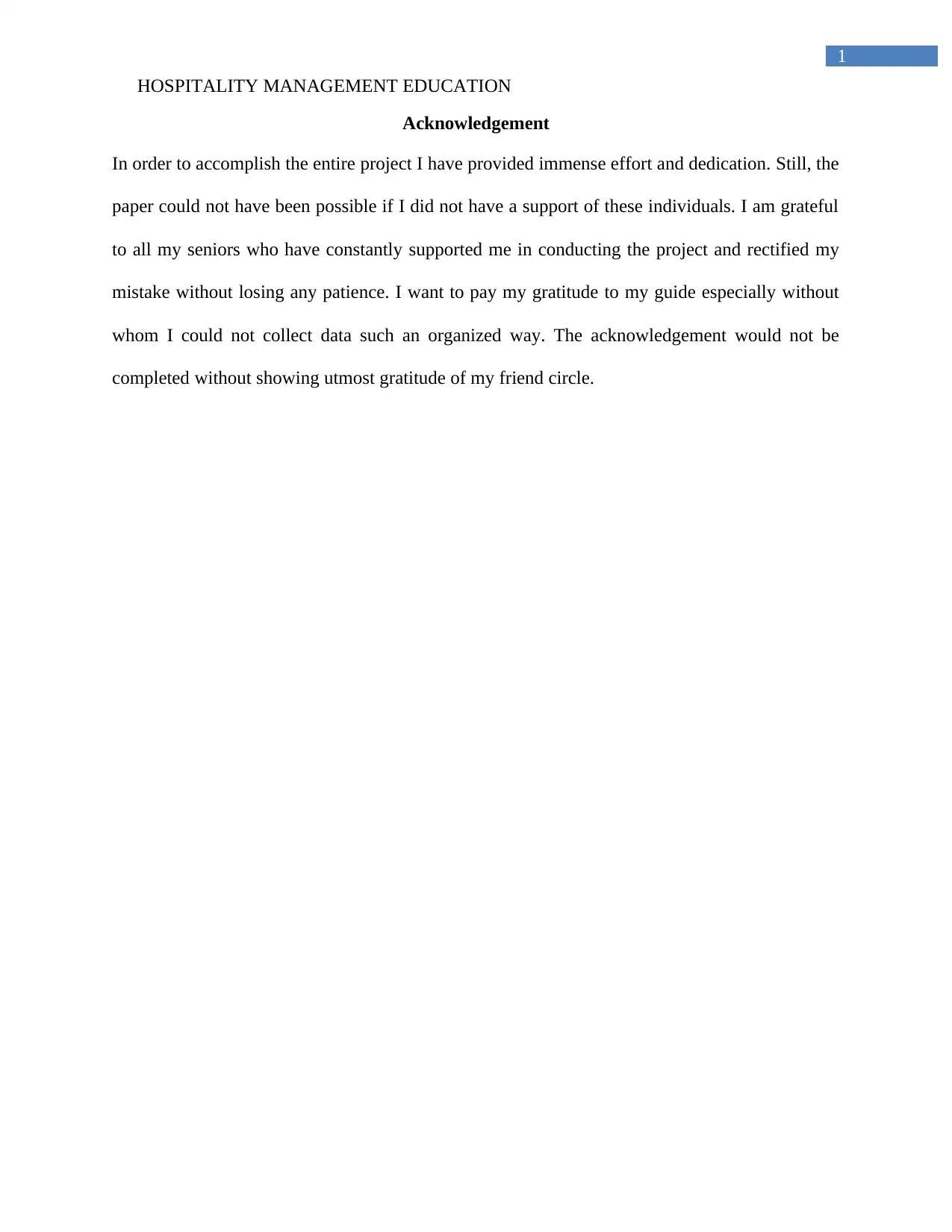
1
HOSPITALITY MANAGEMENT EDUCATION
Acknowledgement
In order to accomplish the entire project I have provided immense effort and dedication. Still, the
paper could not have been possible if I did not have a support of these individuals. I am grateful
to all my seniors who have constantly supported me in conducting the project and rectified my
mistake without losing any patience. I want to pay my gratitude to my guide especially without
whom I could not collect data such an organized way. The acknowledgement would not be
completed without showing utmost gratitude of my friend circle.
HOSPITALITY MANAGEMENT EDUCATION
Acknowledgement
In order to accomplish the entire project I have provided immense effort and dedication. Still, the
paper could not have been possible if I did not have a support of these individuals. I am grateful
to all my seniors who have constantly supported me in conducting the project and rectified my
mistake without losing any patience. I want to pay my gratitude to my guide especially without
whom I could not collect data such an organized way. The acknowledgement would not be
completed without showing utmost gratitude of my friend circle.
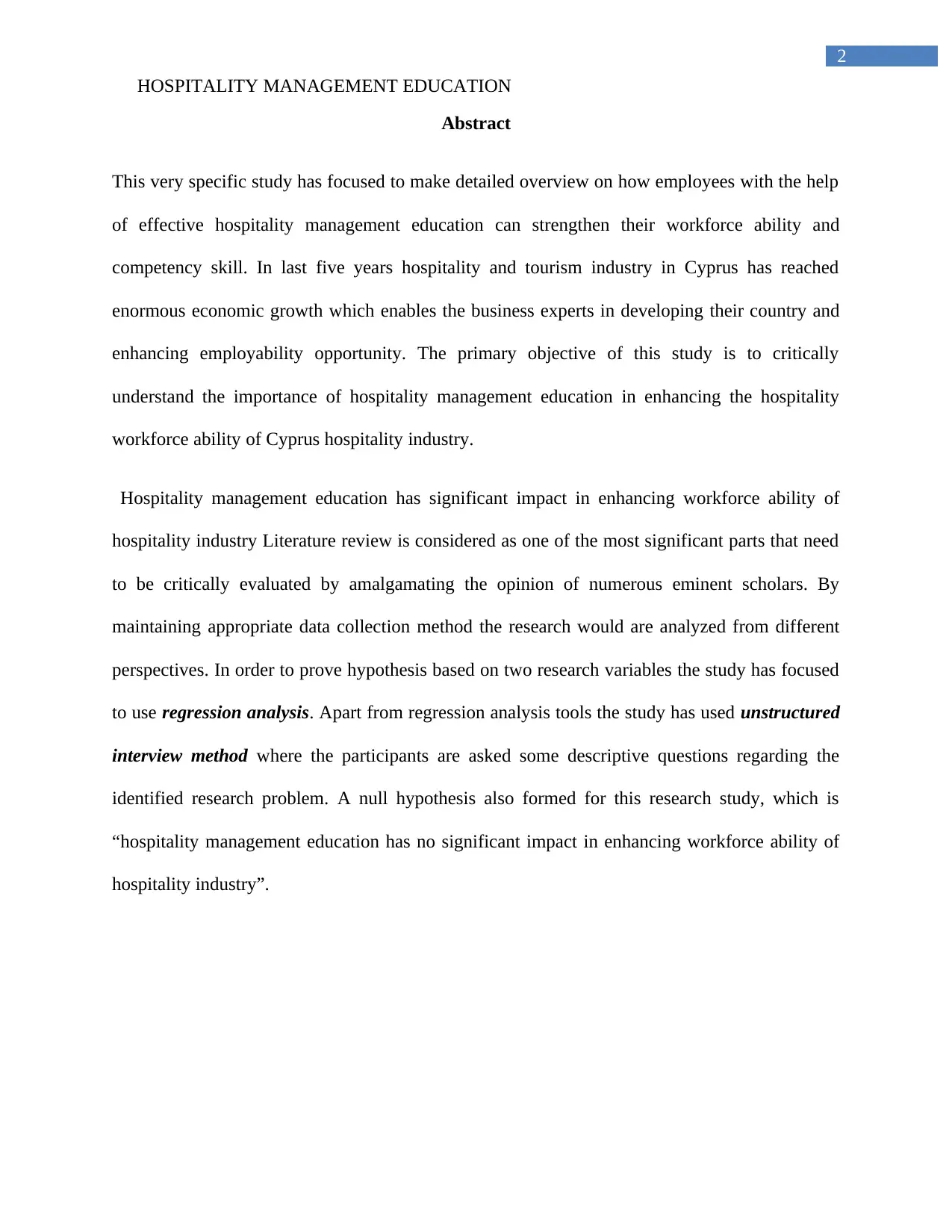
2
HOSPITALITY MANAGEMENT EDUCATION
Abstract
This very specific study has focused to make detailed overview on how employees with the help
of effective hospitality management education can strengthen their workforce ability and
competency skill. In last five years hospitality and tourism industry in Cyprus has reached
enormous economic growth which enables the business experts in developing their country and
enhancing employability opportunity. The primary objective of this study is to critically
understand the importance of hospitality management education in enhancing the hospitality
workforce ability of Cyprus hospitality industry.
Hospitality management education has significant impact in enhancing workforce ability of
hospitality industry Literature review is considered as one of the most significant parts that need
to be critically evaluated by amalgamating the opinion of numerous eminent scholars. By
maintaining appropriate data collection method the research would are analyzed from different
perspectives. In order to prove hypothesis based on two research variables the study has focused
to use regression analysis. Apart from regression analysis tools the study has used unstructured
interview method where the participants are asked some descriptive questions regarding the
identified research problem. A null hypothesis also formed for this research study, which is
“hospitality management education has no significant impact in enhancing workforce ability of
hospitality industry”.
HOSPITALITY MANAGEMENT EDUCATION
Abstract
This very specific study has focused to make detailed overview on how employees with the help
of effective hospitality management education can strengthen their workforce ability and
competency skill. In last five years hospitality and tourism industry in Cyprus has reached
enormous economic growth which enables the business experts in developing their country and
enhancing employability opportunity. The primary objective of this study is to critically
understand the importance of hospitality management education in enhancing the hospitality
workforce ability of Cyprus hospitality industry.
Hospitality management education has significant impact in enhancing workforce ability of
hospitality industry Literature review is considered as one of the most significant parts that need
to be critically evaluated by amalgamating the opinion of numerous eminent scholars. By
maintaining appropriate data collection method the research would are analyzed from different
perspectives. In order to prove hypothesis based on two research variables the study has focused
to use regression analysis. Apart from regression analysis tools the study has used unstructured
interview method where the participants are asked some descriptive questions regarding the
identified research problem. A null hypothesis also formed for this research study, which is
“hospitality management education has no significant impact in enhancing workforce ability of
hospitality industry”.
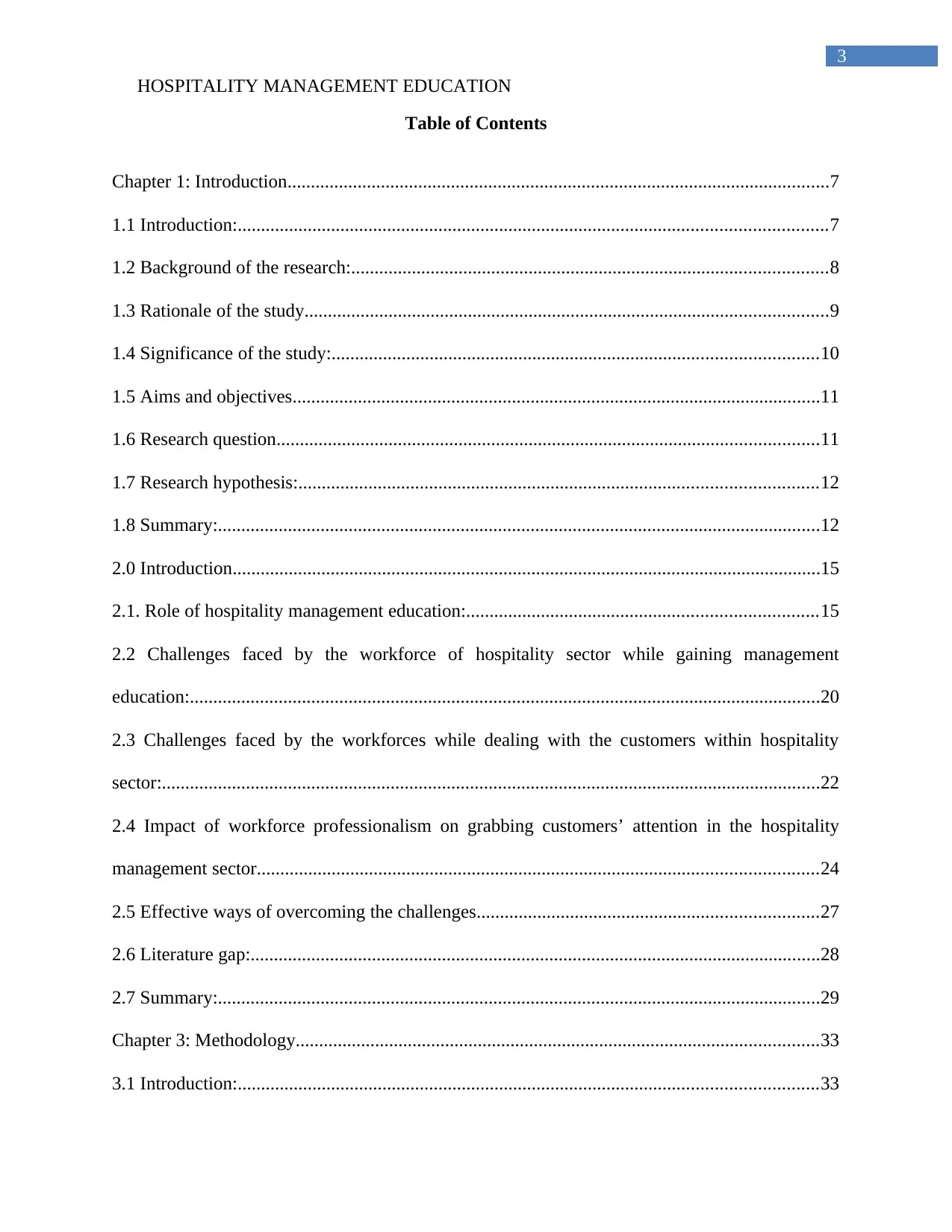
3
HOSPITALITY MANAGEMENT EDUCATION
Table of Contents
Chapter 1: Introduction....................................................................................................................7
1.1 Introduction:..............................................................................................................................7
1.2 Background of the research:......................................................................................................8
1.3 Rationale of the study................................................................................................................9
1.4 Significance of the study:........................................................................................................10
1.5 Aims and objectives.................................................................................................................11
1.6 Research question....................................................................................................................11
1.7 Research hypothesis:...............................................................................................................12
1.8 Summary:.................................................................................................................................12
2.0 Introduction..............................................................................................................................15
2.1. Role of hospitality management education:...........................................................................15
2.2 Challenges faced by the workforce of hospitality sector while gaining management
education:.......................................................................................................................................20
2.3 Challenges faced by the workforces while dealing with the customers within hospitality
sector:.............................................................................................................................................22
2.4 Impact of workforce professionalism on grabbing customers’ attention in the hospitality
management sector........................................................................................................................24
2.5 Effective ways of overcoming the challenges.........................................................................27
2.6 Literature gap:..........................................................................................................................28
2.7 Summary:.................................................................................................................................29
Chapter 3: Methodology................................................................................................................33
3.1 Introduction:............................................................................................................................33
HOSPITALITY MANAGEMENT EDUCATION
Table of Contents
Chapter 1: Introduction....................................................................................................................7
1.1 Introduction:..............................................................................................................................7
1.2 Background of the research:......................................................................................................8
1.3 Rationale of the study................................................................................................................9
1.4 Significance of the study:........................................................................................................10
1.5 Aims and objectives.................................................................................................................11
1.6 Research question....................................................................................................................11
1.7 Research hypothesis:...............................................................................................................12
1.8 Summary:.................................................................................................................................12
2.0 Introduction..............................................................................................................................15
2.1. Role of hospitality management education:...........................................................................15
2.2 Challenges faced by the workforce of hospitality sector while gaining management
education:.......................................................................................................................................20
2.3 Challenges faced by the workforces while dealing with the customers within hospitality
sector:.............................................................................................................................................22
2.4 Impact of workforce professionalism on grabbing customers’ attention in the hospitality
management sector........................................................................................................................24
2.5 Effective ways of overcoming the challenges.........................................................................27
2.6 Literature gap:..........................................................................................................................28
2.7 Summary:.................................................................................................................................29
Chapter 3: Methodology................................................................................................................33
3.1 Introduction:............................................................................................................................33
Secure Best Marks with AI Grader
Need help grading? Try our AI Grader for instant feedback on your assignments.
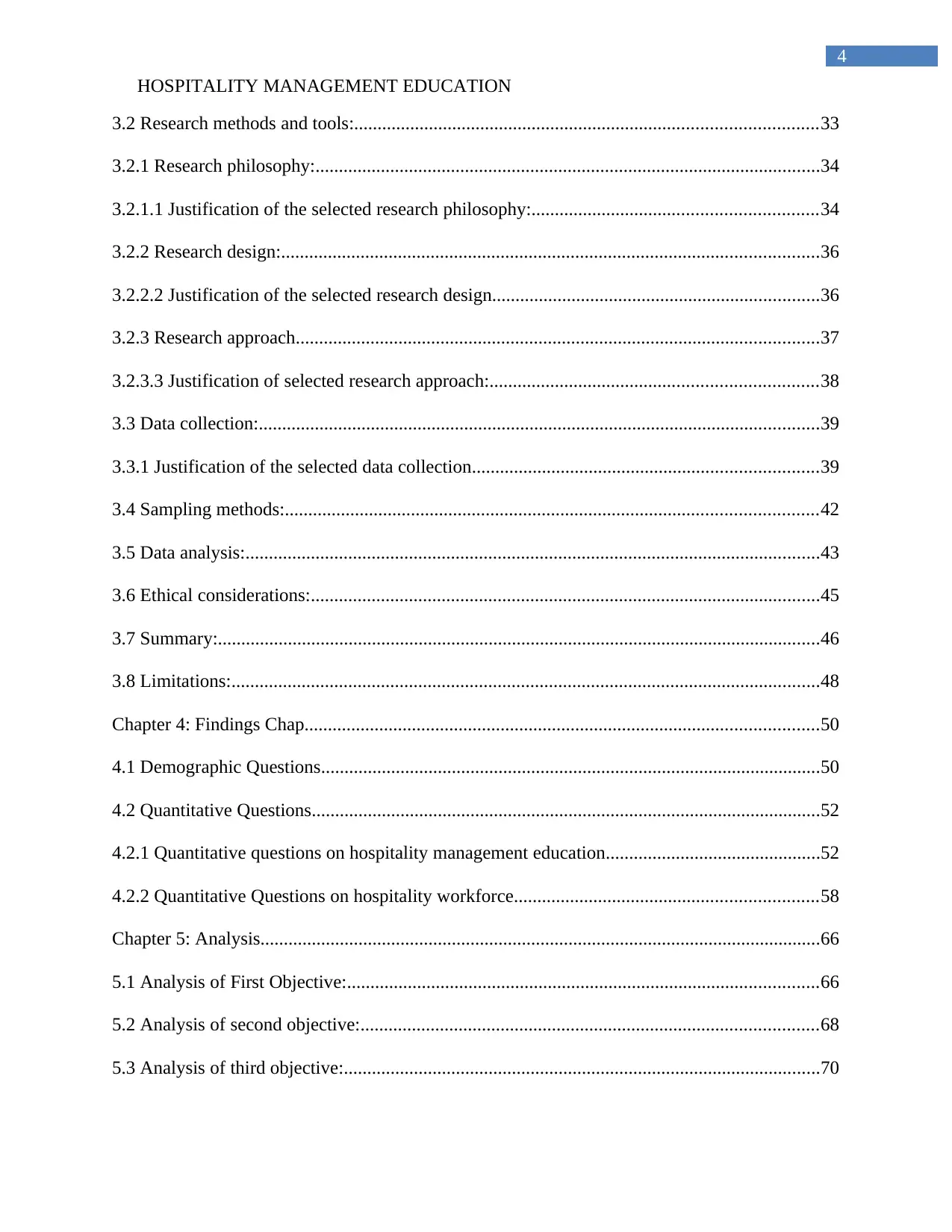
4
HOSPITALITY MANAGEMENT EDUCATION
3.2 Research methods and tools:...................................................................................................33
3.2.1 Research philosophy:............................................................................................................34
3.2.1.1 Justification of the selected research philosophy:.............................................................34
3.2.2 Research design:...................................................................................................................36
3.2.2.2 Justification of the selected research design......................................................................36
3.2.3 Research approach................................................................................................................37
3.2.3.3 Justification of selected research approach:......................................................................38
3.3 Data collection:........................................................................................................................39
3.3.1 Justification of the selected data collection..........................................................................39
3.4 Sampling methods:..................................................................................................................42
3.5 Data analysis:...........................................................................................................................43
3.6 Ethical considerations:.............................................................................................................45
3.7 Summary:.................................................................................................................................46
3.8 Limitations:..............................................................................................................................48
Chapter 4: Findings Chap..............................................................................................................50
4.1 Demographic Questions...........................................................................................................50
4.2 Quantitative Questions.............................................................................................................52
4.2.1 Quantitative questions on hospitality management education..............................................52
4.2.2 Quantitative Questions on hospitality workforce.................................................................58
Chapter 5: Analysis........................................................................................................................66
5.1 Analysis of First Objective:.....................................................................................................66
5.2 Analysis of second objective:..................................................................................................68
5.3 Analysis of third objective:......................................................................................................70
HOSPITALITY MANAGEMENT EDUCATION
3.2 Research methods and tools:...................................................................................................33
3.2.1 Research philosophy:............................................................................................................34
3.2.1.1 Justification of the selected research philosophy:.............................................................34
3.2.2 Research design:...................................................................................................................36
3.2.2.2 Justification of the selected research design......................................................................36
3.2.3 Research approach................................................................................................................37
3.2.3.3 Justification of selected research approach:......................................................................38
3.3 Data collection:........................................................................................................................39
3.3.1 Justification of the selected data collection..........................................................................39
3.4 Sampling methods:..................................................................................................................42
3.5 Data analysis:...........................................................................................................................43
3.6 Ethical considerations:.............................................................................................................45
3.7 Summary:.................................................................................................................................46
3.8 Limitations:..............................................................................................................................48
Chapter 4: Findings Chap..............................................................................................................50
4.1 Demographic Questions...........................................................................................................50
4.2 Quantitative Questions.............................................................................................................52
4.2.1 Quantitative questions on hospitality management education..............................................52
4.2.2 Quantitative Questions on hospitality workforce.................................................................58
Chapter 5: Analysis........................................................................................................................66
5.1 Analysis of First Objective:.....................................................................................................66
5.2 Analysis of second objective:..................................................................................................68
5.3 Analysis of third objective:......................................................................................................70
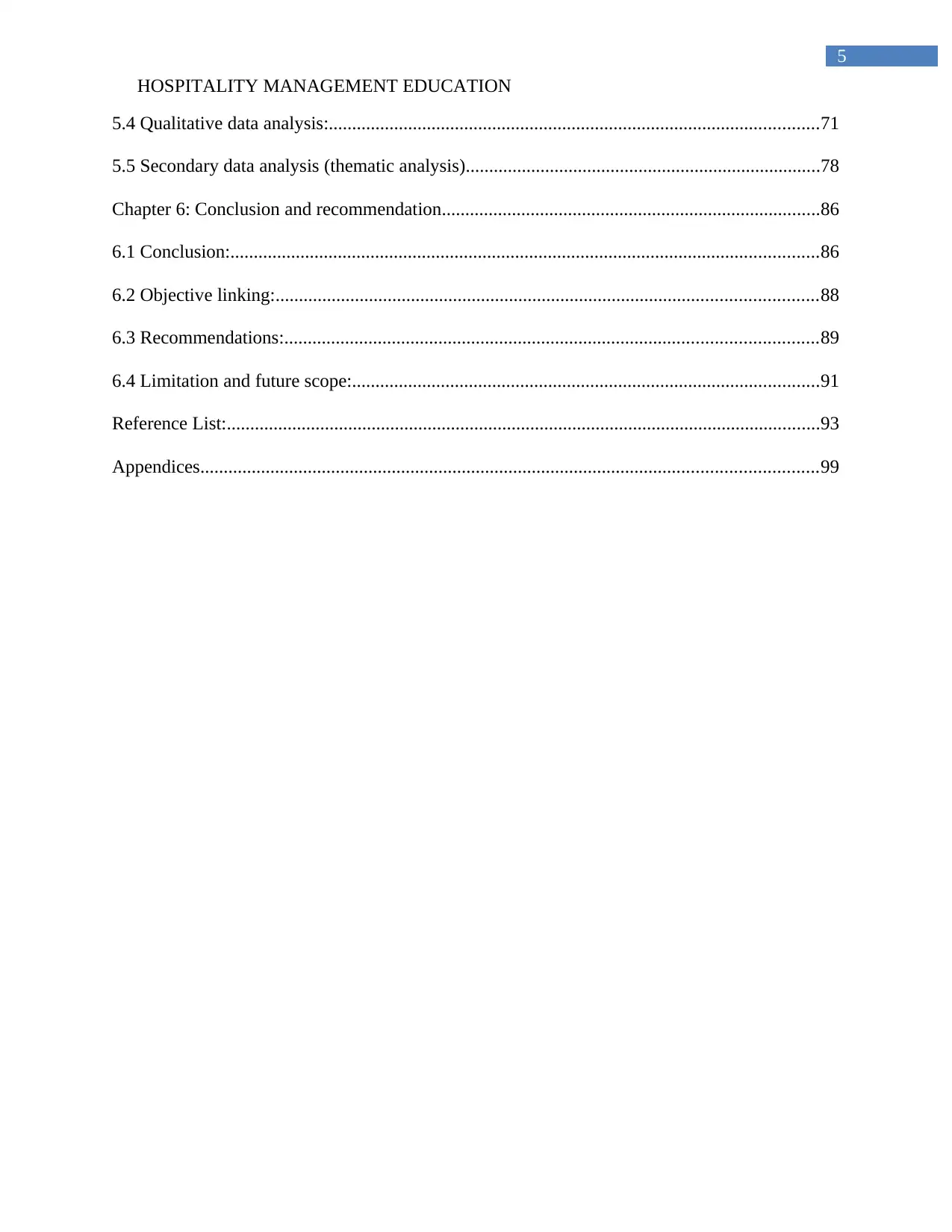
5
HOSPITALITY MANAGEMENT EDUCATION
5.4 Qualitative data analysis:.........................................................................................................71
5.5 Secondary data analysis (thematic analysis)............................................................................78
Chapter 6: Conclusion and recommendation.................................................................................86
6.1 Conclusion:..............................................................................................................................86
6.2 Objective linking:....................................................................................................................88
6.3 Recommendations:..................................................................................................................89
6.4 Limitation and future scope:....................................................................................................91
Reference List:...............................................................................................................................93
Appendices....................................................................................................................................99
HOSPITALITY MANAGEMENT EDUCATION
5.4 Qualitative data analysis:.........................................................................................................71
5.5 Secondary data analysis (thematic analysis)............................................................................78
Chapter 6: Conclusion and recommendation.................................................................................86
6.1 Conclusion:..............................................................................................................................86
6.2 Objective linking:....................................................................................................................88
6.3 Recommendations:..................................................................................................................89
6.4 Limitation and future scope:....................................................................................................91
Reference List:...............................................................................................................................93
Appendices....................................................................................................................................99

6
HOSPITALITY MANAGEMENT EDUCATION
Chapter 1: Introduction
1.1 Introduction:
As per business industry report of Cyprus tourism contributed 10.7% of the GDP which
helps the country in rendering immense economic growth. The employment in the tourism
industry of Cyprus is estimated as 113,000 jobs. It is estimated that around 3 million tourists
from various geographical backgrounds and cultural attitudes like to visit in Cyrus for enjoying
the tourism destinations of Cyprus. Therefore, business persons belonging to hospitality sectors
have focused in establishing hotels and guest houses for providing service facilities to the tourists
(Brown, Arendt and Bosselman 2014). As per geographic location however, Cyprus is
considered as third largest island countries belonging in the Eastern Mediterranean.
However, due to its regional culture and psychographic backgrounds the employees
associated with hospitality industry lack effective professionalism that prevents the organizations
in maintaining good rapport with the visitors. This specific issue has become a major concern to
many of the researchers and practitioners. As per their point of view employees associated with
the Cyprus hospitality management sector need to build their educational background properly.
Systematic management education in hospitality sector would help the employees or workforces
to enhance their professional skills and competency.
Employees would not have to be restricted within specific language skills and cultural
attitude. In quest of expanding the hospitality industry in the international market, the employees
need to enhance their management education. This very specific study has focused to make
HOSPITALITY MANAGEMENT EDUCATION
Chapter 1: Introduction
1.1 Introduction:
As per business industry report of Cyprus tourism contributed 10.7% of the GDP which
helps the country in rendering immense economic growth. The employment in the tourism
industry of Cyprus is estimated as 113,000 jobs. It is estimated that around 3 million tourists
from various geographical backgrounds and cultural attitudes like to visit in Cyrus for enjoying
the tourism destinations of Cyprus. Therefore, business persons belonging to hospitality sectors
have focused in establishing hotels and guest houses for providing service facilities to the tourists
(Brown, Arendt and Bosselman 2014). As per geographic location however, Cyprus is
considered as third largest island countries belonging in the Eastern Mediterranean.
However, due to its regional culture and psychographic backgrounds the employees
associated with hospitality industry lack effective professionalism that prevents the organizations
in maintaining good rapport with the visitors. This specific issue has become a major concern to
many of the researchers and practitioners. As per their point of view employees associated with
the Cyprus hospitality management sector need to build their educational background properly.
Systematic management education in hospitality sector would help the employees or workforces
to enhance their professional skills and competency.
Employees would not have to be restricted within specific language skills and cultural
attitude. In quest of expanding the hospitality industry in the international market, the employees
need to enhance their management education. This very specific study has focused to make
Paraphrase This Document
Need a fresh take? Get an instant paraphrase of this document with our AI Paraphraser
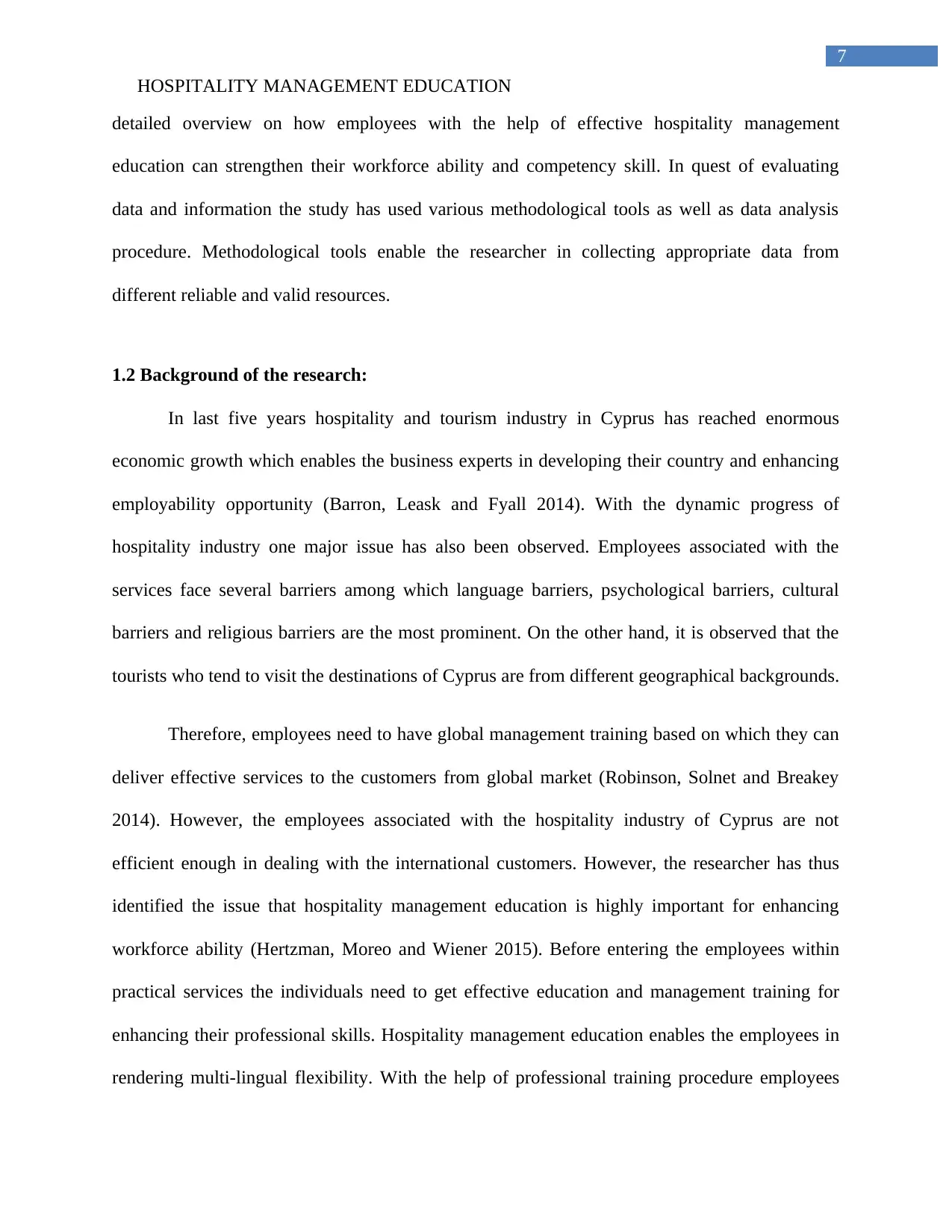
7
HOSPITALITY MANAGEMENT EDUCATION
detailed overview on how employees with the help of effective hospitality management
education can strengthen their workforce ability and competency skill. In quest of evaluating
data and information the study has used various methodological tools as well as data analysis
procedure. Methodological tools enable the researcher in collecting appropriate data from
different reliable and valid resources.
1.2 Background of the research:
In last five years hospitality and tourism industry in Cyprus has reached enormous
economic growth which enables the business experts in developing their country and enhancing
employability opportunity (Barron, Leask and Fyall 2014). With the dynamic progress of
hospitality industry one major issue has also been observed. Employees associated with the
services face several barriers among which language barriers, psychological barriers, cultural
barriers and religious barriers are the most prominent. On the other hand, it is observed that the
tourists who tend to visit the destinations of Cyprus are from different geographical backgrounds.
Therefore, employees need to have global management training based on which they can
deliver effective services to the customers from global market (Robinson, Solnet and Breakey
2014). However, the employees associated with the hospitality industry of Cyprus are not
efficient enough in dealing with the international customers. However, the researcher has thus
identified the issue that hospitality management education is highly important for enhancing
workforce ability (Hertzman, Moreo and Wiener 2015). Before entering the employees within
practical services the individuals need to get effective education and management training for
enhancing their professional skills. Hospitality management education enables the employees in
rendering multi-lingual flexibility. With the help of professional training procedure employees
HOSPITALITY MANAGEMENT EDUCATION
detailed overview on how employees with the help of effective hospitality management
education can strengthen their workforce ability and competency skill. In quest of evaluating
data and information the study has used various methodological tools as well as data analysis
procedure. Methodological tools enable the researcher in collecting appropriate data from
different reliable and valid resources.
1.2 Background of the research:
In last five years hospitality and tourism industry in Cyprus has reached enormous
economic growth which enables the business experts in developing their country and enhancing
employability opportunity (Barron, Leask and Fyall 2014). With the dynamic progress of
hospitality industry one major issue has also been observed. Employees associated with the
services face several barriers among which language barriers, psychological barriers, cultural
barriers and religious barriers are the most prominent. On the other hand, it is observed that the
tourists who tend to visit the destinations of Cyprus are from different geographical backgrounds.
Therefore, employees need to have global management training based on which they can
deliver effective services to the customers from global market (Robinson, Solnet and Breakey
2014). However, the employees associated with the hospitality industry of Cyprus are not
efficient enough in dealing with the international customers. However, the researcher has thus
identified the issue that hospitality management education is highly important for enhancing
workforce ability (Hertzman, Moreo and Wiener 2015). Before entering the employees within
practical services the individuals need to get effective education and management training for
enhancing their professional skills. Hospitality management education enables the employees in
rendering multi-lingual flexibility. With the help of professional training procedure employees
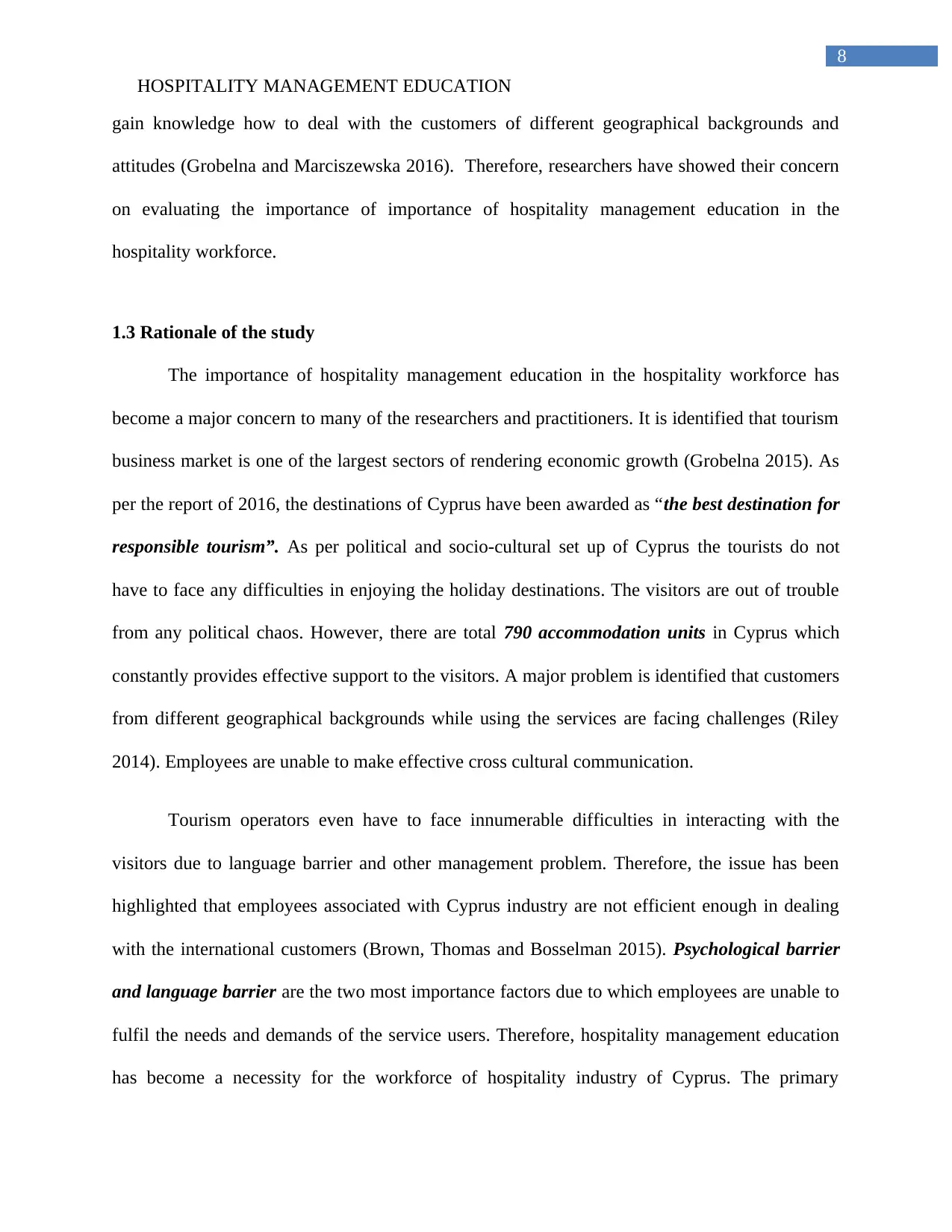
8
HOSPITALITY MANAGEMENT EDUCATION
gain knowledge how to deal with the customers of different geographical backgrounds and
attitudes (Grobelna and Marciszewska 2016). Therefore, researchers have showed their concern
on evaluating the importance of importance of hospitality management education in the
hospitality workforce.
1.3 Rationale of the study
The importance of hospitality management education in the hospitality workforce has
become a major concern to many of the researchers and practitioners. It is identified that tourism
business market is one of the largest sectors of rendering economic growth (Grobelna 2015). As
per the report of 2016, the destinations of Cyprus have been awarded as “the best destination for
responsible tourism”. As per political and socio-cultural set up of Cyprus the tourists do not
have to face any difficulties in enjoying the holiday destinations. The visitors are out of trouble
from any political chaos. However, there are total 790 accommodation units in Cyprus which
constantly provides effective support to the visitors. A major problem is identified that customers
from different geographical backgrounds while using the services are facing challenges (Riley
2014). Employees are unable to make effective cross cultural communication.
Tourism operators even have to face innumerable difficulties in interacting with the
visitors due to language barrier and other management problem. Therefore, the issue has been
highlighted that employees associated with Cyprus industry are not efficient enough in dealing
with the international customers (Brown, Thomas and Bosselman 2015). Psychological barrier
and language barrier are the two most importance factors due to which employees are unable to
fulfil the needs and demands of the service users. Therefore, hospitality management education
has become a necessity for the workforce of hospitality industry of Cyprus. The primary
HOSPITALITY MANAGEMENT EDUCATION
gain knowledge how to deal with the customers of different geographical backgrounds and
attitudes (Grobelna and Marciszewska 2016). Therefore, researchers have showed their concern
on evaluating the importance of importance of hospitality management education in the
hospitality workforce.
1.3 Rationale of the study
The importance of hospitality management education in the hospitality workforce has
become a major concern to many of the researchers and practitioners. It is identified that tourism
business market is one of the largest sectors of rendering economic growth (Grobelna 2015). As
per the report of 2016, the destinations of Cyprus have been awarded as “the best destination for
responsible tourism”. As per political and socio-cultural set up of Cyprus the tourists do not
have to face any difficulties in enjoying the holiday destinations. The visitors are out of trouble
from any political chaos. However, there are total 790 accommodation units in Cyprus which
constantly provides effective support to the visitors. A major problem is identified that customers
from different geographical backgrounds while using the services are facing challenges (Riley
2014). Employees are unable to make effective cross cultural communication.
Tourism operators even have to face innumerable difficulties in interacting with the
visitors due to language barrier and other management problem. Therefore, the issue has been
highlighted that employees associated with Cyprus industry are not efficient enough in dealing
with the international customers (Brown, Thomas and Bosselman 2015). Psychological barrier
and language barrier are the two most importance factors due to which employees are unable to
fulfil the needs and demands of the service users. Therefore, hospitality management education
has become a necessity for the workforce of hospitality industry of Cyprus. The primary
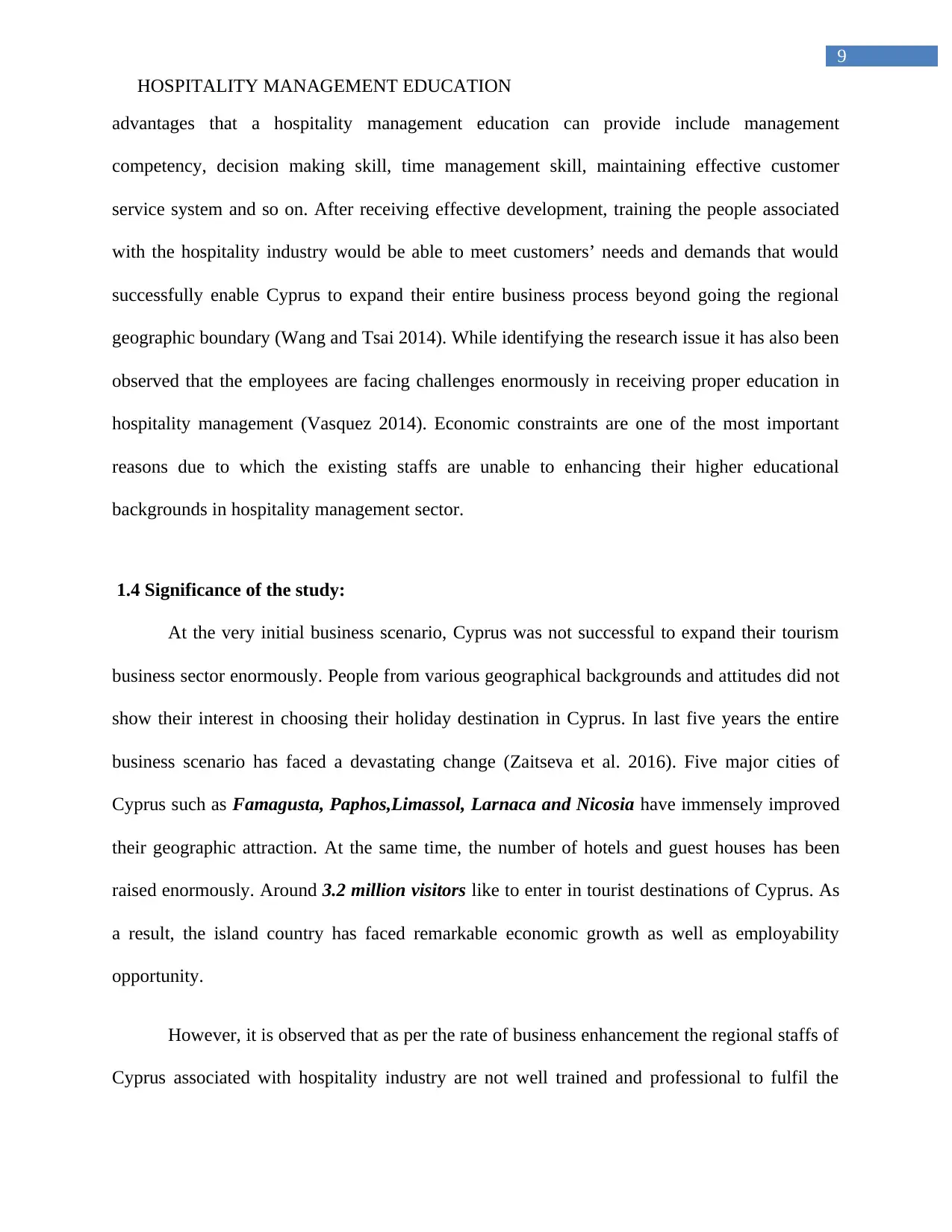
9
HOSPITALITY MANAGEMENT EDUCATION
advantages that a hospitality management education can provide include management
competency, decision making skill, time management skill, maintaining effective customer
service system and so on. After receiving effective development, training the people associated
with the hospitality industry would be able to meet customers’ needs and demands that would
successfully enable Cyprus to expand their entire business process beyond going the regional
geographic boundary (Wang and Tsai 2014). While identifying the research issue it has also been
observed that the employees are facing challenges enormously in receiving proper education in
hospitality management (Vasquez 2014). Economic constraints are one of the most important
reasons due to which the existing staffs are unable to enhancing their higher educational
backgrounds in hospitality management sector.
1.4 Significance of the study:
At the very initial business scenario, Cyprus was not successful to expand their tourism
business sector enormously. People from various geographical backgrounds and attitudes did not
show their interest in choosing their holiday destination in Cyprus. In last five years the entire
business scenario has faced a devastating change (Zaitseva et al. 2016). Five major cities of
Cyprus such as Famagusta, Paphos,Limassol, Larnaca and Nicosia have immensely improved
their geographic attraction. At the same time, the number of hotels and guest houses has been
raised enormously. Around 3.2 million visitors like to enter in tourist destinations of Cyprus. As
a result, the island country has faced remarkable economic growth as well as employability
opportunity.
However, it is observed that as per the rate of business enhancement the regional staffs of
Cyprus associated with hospitality industry are not well trained and professional to fulfil the
HOSPITALITY MANAGEMENT EDUCATION
advantages that a hospitality management education can provide include management
competency, decision making skill, time management skill, maintaining effective customer
service system and so on. After receiving effective development, training the people associated
with the hospitality industry would be able to meet customers’ needs and demands that would
successfully enable Cyprus to expand their entire business process beyond going the regional
geographic boundary (Wang and Tsai 2014). While identifying the research issue it has also been
observed that the employees are facing challenges enormously in receiving proper education in
hospitality management (Vasquez 2014). Economic constraints are one of the most important
reasons due to which the existing staffs are unable to enhancing their higher educational
backgrounds in hospitality management sector.
1.4 Significance of the study:
At the very initial business scenario, Cyprus was not successful to expand their tourism
business sector enormously. People from various geographical backgrounds and attitudes did not
show their interest in choosing their holiday destination in Cyprus. In last five years the entire
business scenario has faced a devastating change (Zaitseva et al. 2016). Five major cities of
Cyprus such as Famagusta, Paphos,Limassol, Larnaca and Nicosia have immensely improved
their geographic attraction. At the same time, the number of hotels and guest houses has been
raised enormously. Around 3.2 million visitors like to enter in tourist destinations of Cyprus. As
a result, the island country has faced remarkable economic growth as well as employability
opportunity.
However, it is observed that as per the rate of business enhancement the regional staffs of
Cyprus associated with hospitality industry are not well trained and professional to fulfil the
Secure Best Marks with AI Grader
Need help grading? Try our AI Grader for instant feedback on your assignments.

10
HOSPITALITY MANAGEMENT EDUCATION
needs and demands of international customers. In this situation, the researchers and practitioners
have showed their interest in highlighting the issue that hospitality management education has
significant impact in enhancing workforce ability of hospitality industry (Van der Wagen and
Goonetilleke 2015). While discussing the importance of higher education among the employees
in hospitality management sector some of the major challenges faced by the employees have also
been discussed critically.
1.5 Aims and objectives
This very specific study has aimed to evaluate the importance of hospitality management
education in the hospitality workforce. The primary objectives of this research paper are as
follows:
To critically understand the importance of hospitality management education in enhancing
the hospitality workforce ability of Cyprus hospitality industry
To evaluate the factors how workforce within hospitality industry face challenges in
customer services without management education
To provide some of the major recommendations on how hospitality management education is
effective in overcoming challenges faced by workforces
1.6 Research question
The research questions identified for the research issue are as follows:
What is the importance of hospitality management education in enhancing the hospitality
workforce ability of Cyprus hospitality industry?
HOSPITALITY MANAGEMENT EDUCATION
needs and demands of international customers. In this situation, the researchers and practitioners
have showed their interest in highlighting the issue that hospitality management education has
significant impact in enhancing workforce ability of hospitality industry (Van der Wagen and
Goonetilleke 2015). While discussing the importance of higher education among the employees
in hospitality management sector some of the major challenges faced by the employees have also
been discussed critically.
1.5 Aims and objectives
This very specific study has aimed to evaluate the importance of hospitality management
education in the hospitality workforce. The primary objectives of this research paper are as
follows:
To critically understand the importance of hospitality management education in enhancing
the hospitality workforce ability of Cyprus hospitality industry
To evaluate the factors how workforce within hospitality industry face challenges in
customer services without management education
To provide some of the major recommendations on how hospitality management education is
effective in overcoming challenges faced by workforces
1.6 Research question
The research questions identified for the research issue are as follows:
What is the importance of hospitality management education in enhancing the hospitality
workforce ability of Cyprus hospitality industry?
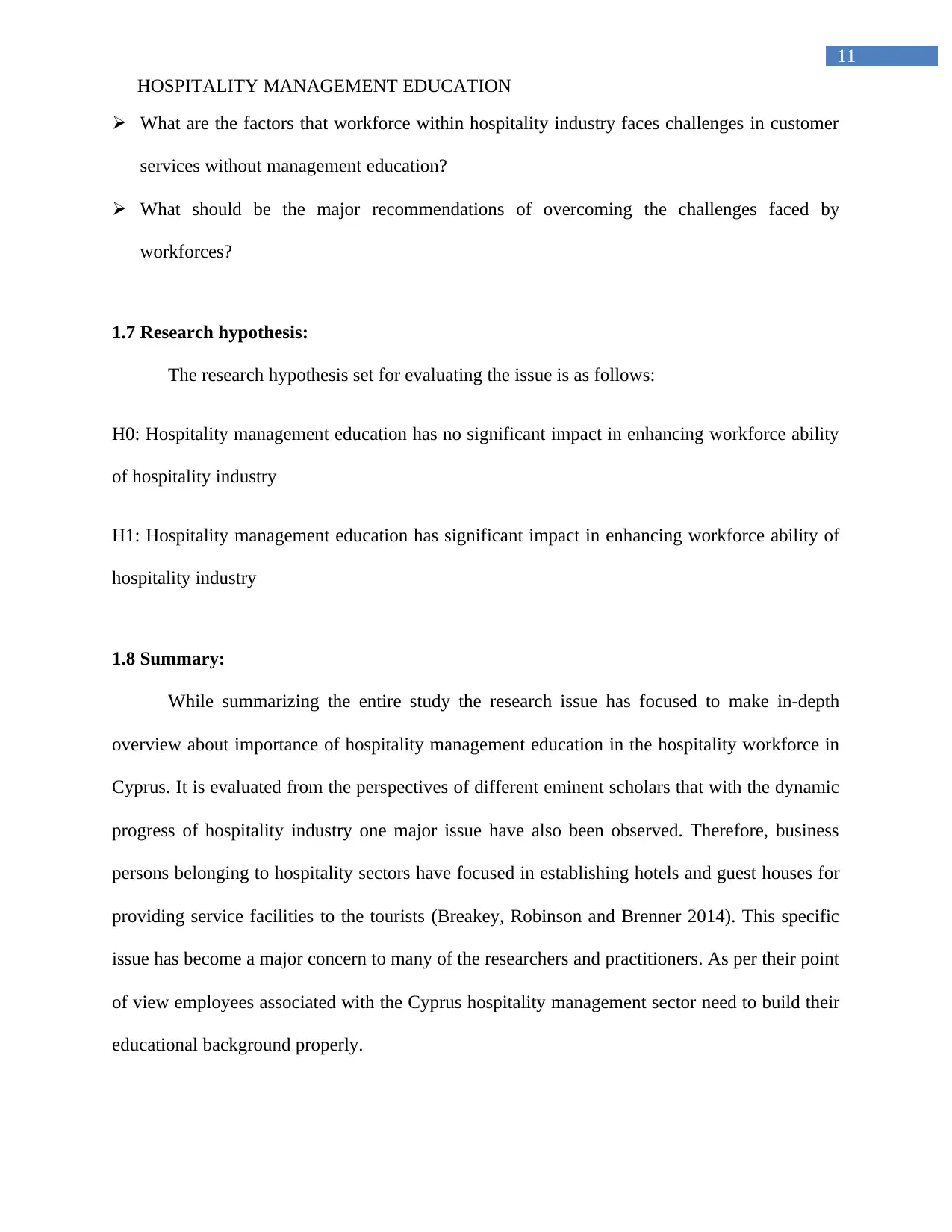
11
HOSPITALITY MANAGEMENT EDUCATION
What are the factors that workforce within hospitality industry faces challenges in customer
services without management education?
What should be the major recommendations of overcoming the challenges faced by
workforces?
1.7 Research hypothesis:
The research hypothesis set for evaluating the issue is as follows:
H0: Hospitality management education has no significant impact in enhancing workforce ability
of hospitality industry
H1: Hospitality management education has significant impact in enhancing workforce ability of
hospitality industry
1.8 Summary:
While summarizing the entire study the research issue has focused to make in-depth
overview about importance of hospitality management education in the hospitality workforce in
Cyprus. It is evaluated from the perspectives of different eminent scholars that with the dynamic
progress of hospitality industry one major issue have also been observed. Therefore, business
persons belonging to hospitality sectors have focused in establishing hotels and guest houses for
providing service facilities to the tourists (Breakey, Robinson and Brenner 2014). This specific
issue has become a major concern to many of the researchers and practitioners. As per their point
of view employees associated with the Cyprus hospitality management sector need to build their
educational background properly.
HOSPITALITY MANAGEMENT EDUCATION
What are the factors that workforce within hospitality industry faces challenges in customer
services without management education?
What should be the major recommendations of overcoming the challenges faced by
workforces?
1.7 Research hypothesis:
The research hypothesis set for evaluating the issue is as follows:
H0: Hospitality management education has no significant impact in enhancing workforce ability
of hospitality industry
H1: Hospitality management education has significant impact in enhancing workforce ability of
hospitality industry
1.8 Summary:
While summarizing the entire study the research issue has focused to make in-depth
overview about importance of hospitality management education in the hospitality workforce in
Cyprus. It is evaluated from the perspectives of different eminent scholars that with the dynamic
progress of hospitality industry one major issue have also been observed. Therefore, business
persons belonging to hospitality sectors have focused in establishing hotels and guest houses for
providing service facilities to the tourists (Breakey, Robinson and Brenner 2014). This specific
issue has become a major concern to many of the researchers and practitioners. As per their point
of view employees associated with the Cyprus hospitality management sector need to build their
educational background properly.
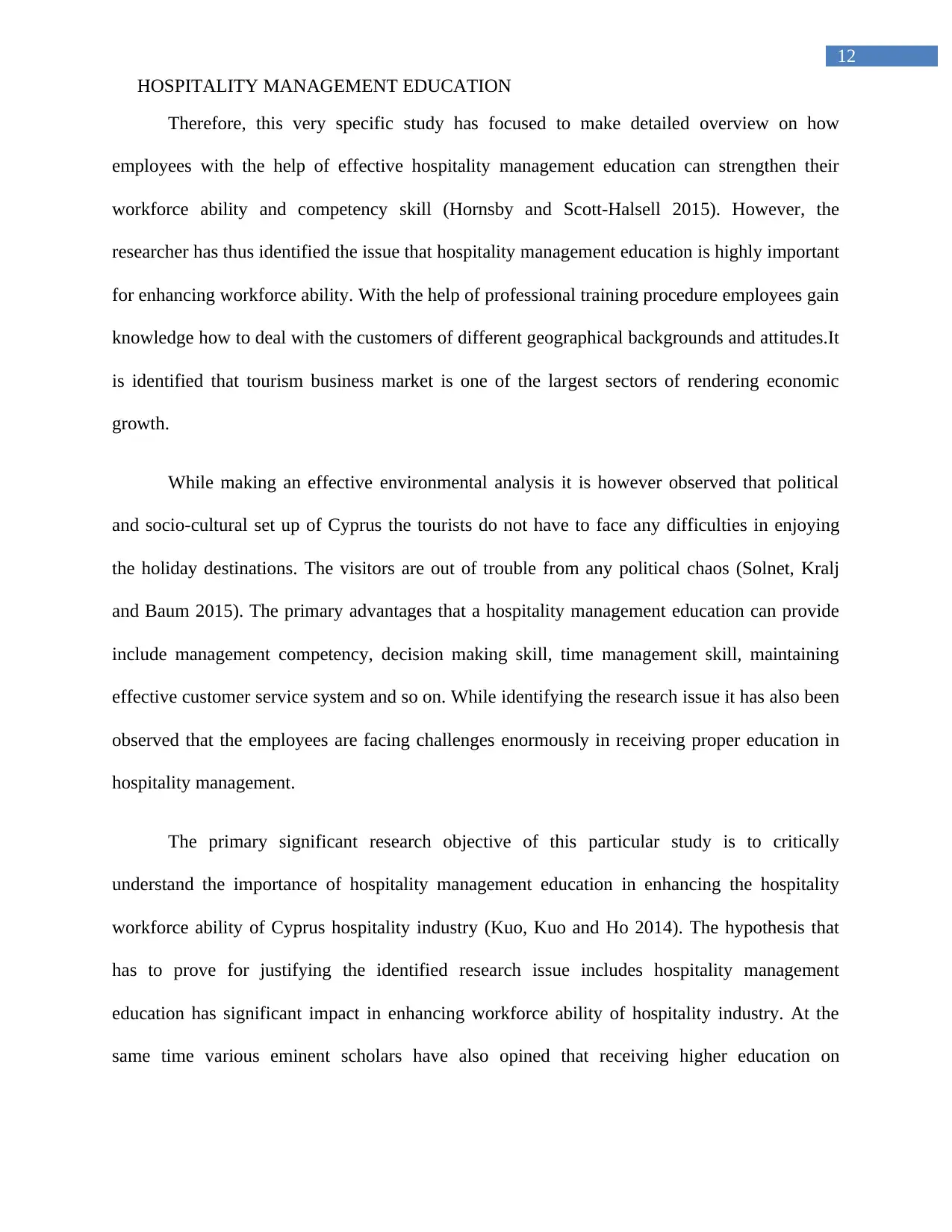
12
HOSPITALITY MANAGEMENT EDUCATION
Therefore, this very specific study has focused to make detailed overview on how
employees with the help of effective hospitality management education can strengthen their
workforce ability and competency skill (Hornsby and Scott-Halsell 2015). However, the
researcher has thus identified the issue that hospitality management education is highly important
for enhancing workforce ability. With the help of professional training procedure employees gain
knowledge how to deal with the customers of different geographical backgrounds and attitudes.It
is identified that tourism business market is one of the largest sectors of rendering economic
growth.
While making an effective environmental analysis it is however observed that political
and socio-cultural set up of Cyprus the tourists do not have to face any difficulties in enjoying
the holiday destinations. The visitors are out of trouble from any political chaos (Solnet, Kralj
and Baum 2015). The primary advantages that a hospitality management education can provide
include management competency, decision making skill, time management skill, maintaining
effective customer service system and so on. While identifying the research issue it has also been
observed that the employees are facing challenges enormously in receiving proper education in
hospitality management.
The primary significant research objective of this particular study is to critically
understand the importance of hospitality management education in enhancing the hospitality
workforce ability of Cyprus hospitality industry (Kuo, Kuo and Ho 2014). The hypothesis that
has to prove for justifying the identified research issue includes hospitality management
education has significant impact in enhancing workforce ability of hospitality industry. At the
same time various eminent scholars have also opined that receiving higher education on
HOSPITALITY MANAGEMENT EDUCATION
Therefore, this very specific study has focused to make detailed overview on how
employees with the help of effective hospitality management education can strengthen their
workforce ability and competency skill (Hornsby and Scott-Halsell 2015). However, the
researcher has thus identified the issue that hospitality management education is highly important
for enhancing workforce ability. With the help of professional training procedure employees gain
knowledge how to deal with the customers of different geographical backgrounds and attitudes.It
is identified that tourism business market is one of the largest sectors of rendering economic
growth.
While making an effective environmental analysis it is however observed that political
and socio-cultural set up of Cyprus the tourists do not have to face any difficulties in enjoying
the holiday destinations. The visitors are out of trouble from any political chaos (Solnet, Kralj
and Baum 2015). The primary advantages that a hospitality management education can provide
include management competency, decision making skill, time management skill, maintaining
effective customer service system and so on. While identifying the research issue it has also been
observed that the employees are facing challenges enormously in receiving proper education in
hospitality management.
The primary significant research objective of this particular study is to critically
understand the importance of hospitality management education in enhancing the hospitality
workforce ability of Cyprus hospitality industry (Kuo, Kuo and Ho 2014). The hypothesis that
has to prove for justifying the identified research issue includes hospitality management
education has significant impact in enhancing workforce ability of hospitality industry. At the
same time various eminent scholars have also opined that receiving higher education on
Paraphrase This Document
Need a fresh take? Get an instant paraphrase of this document with our AI Paraphraser
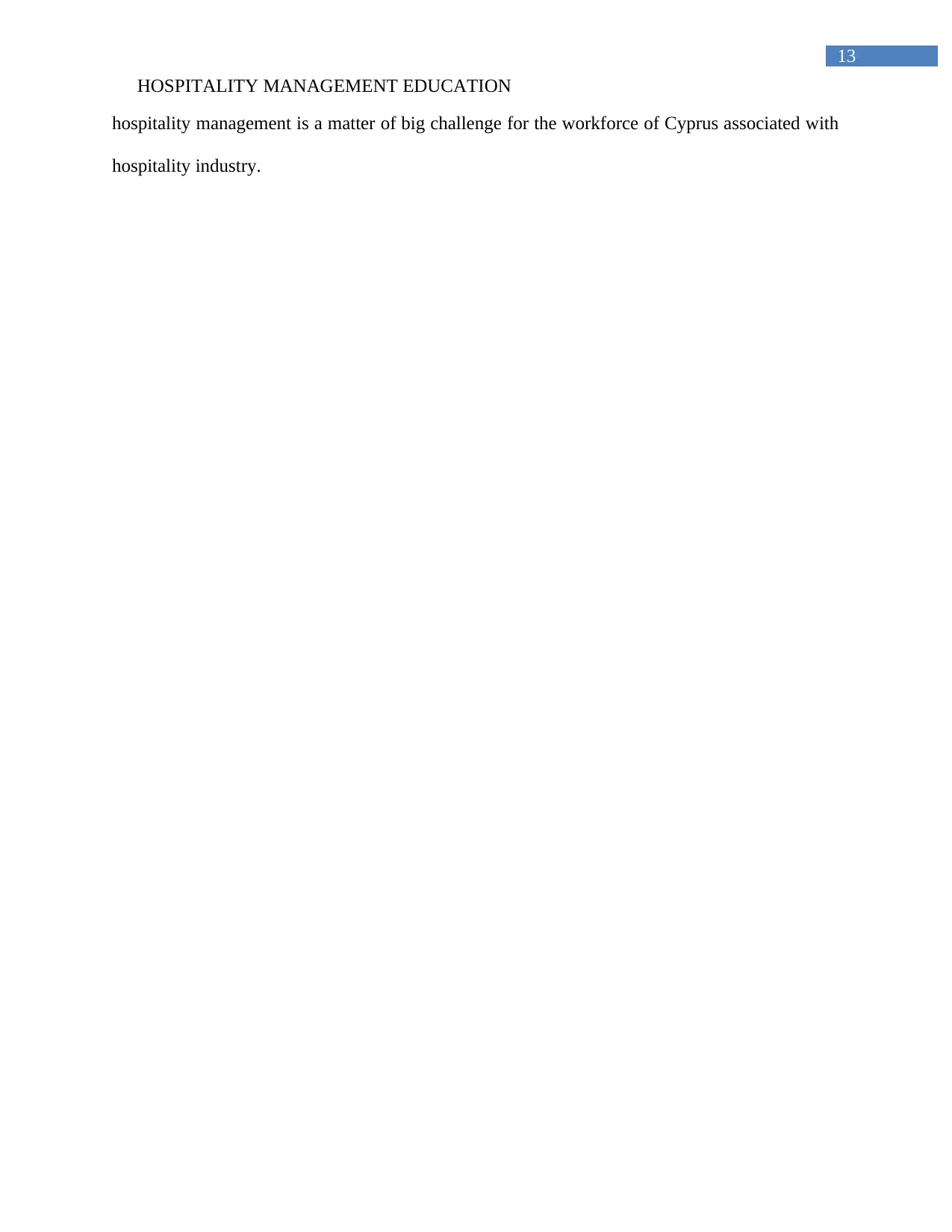
13
HOSPITALITY MANAGEMENT EDUCATION
hospitality management is a matter of big challenge for the workforce of Cyprus associated with
hospitality industry.
HOSPITALITY MANAGEMENT EDUCATION
hospitality management is a matter of big challenge for the workforce of Cyprus associated with
hospitality industry.
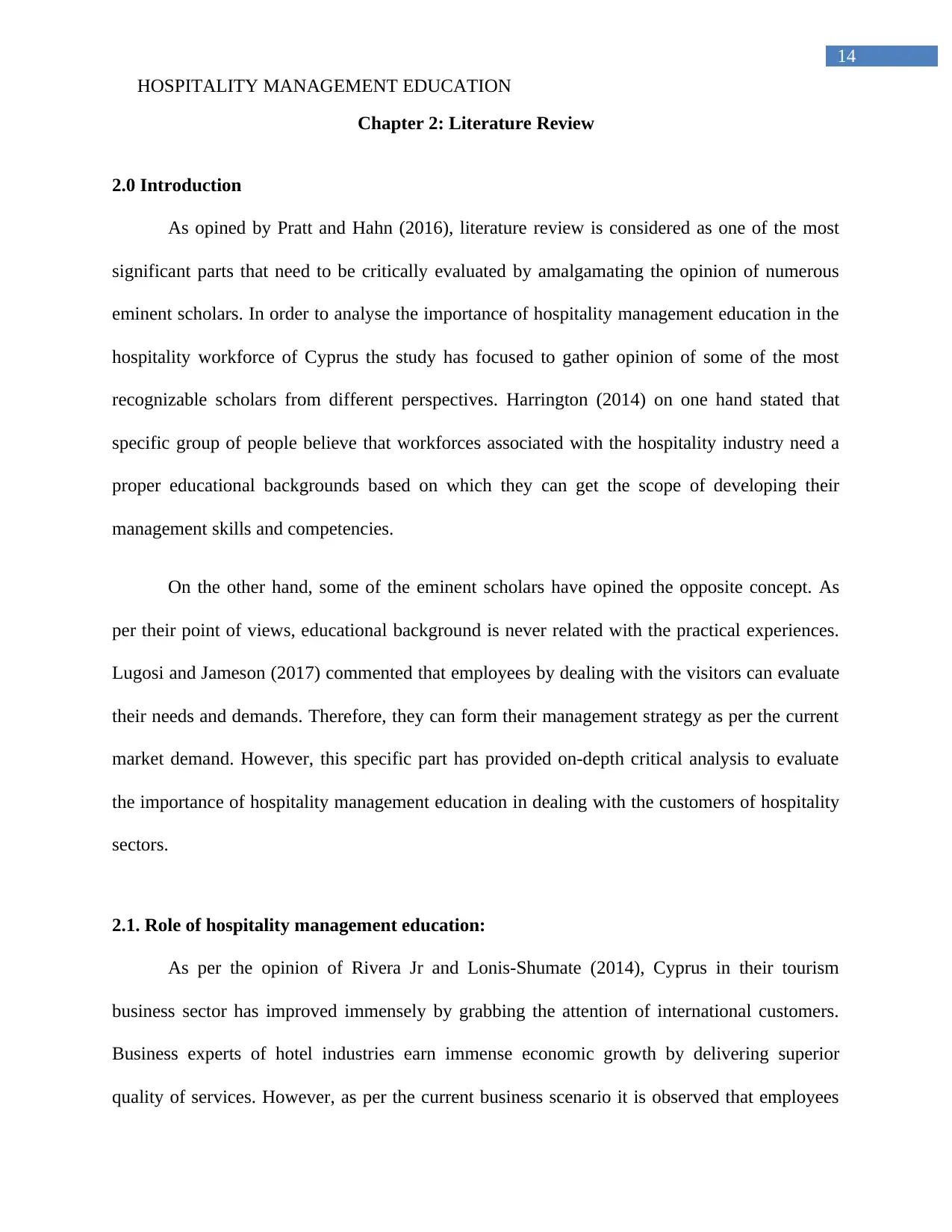
14
HOSPITALITY MANAGEMENT EDUCATION
Chapter 2: Literature Review
2.0 Introduction
As opined by Pratt and Hahn (2016), literature review is considered as one of the most
significant parts that need to be critically evaluated by amalgamating the opinion of numerous
eminent scholars. In order to analyse the importance of hospitality management education in the
hospitality workforce of Cyprus the study has focused to gather opinion of some of the most
recognizable scholars from different perspectives. Harrington (2014) on one hand stated that
specific group of people believe that workforces associated with the hospitality industry need a
proper educational backgrounds based on which they can get the scope of developing their
management skills and competencies.
On the other hand, some of the eminent scholars have opined the opposite concept. As
per their point of views, educational background is never related with the practical experiences.
Lugosi and Jameson (2017) commented that employees by dealing with the visitors can evaluate
their needs and demands. Therefore, they can form their management strategy as per the current
market demand. However, this specific part has provided on-depth critical analysis to evaluate
the importance of hospitality management education in dealing with the customers of hospitality
sectors.
2.1. Role of hospitality management education:
As per the opinion of Rivera Jr and Lonis-Shumate (2014), Cyprus in their tourism
business sector has improved immensely by grabbing the attention of international customers.
Business experts of hotel industries earn immense economic growth by delivering superior
quality of services. However, as per the current business scenario it is observed that employees
HOSPITALITY MANAGEMENT EDUCATION
Chapter 2: Literature Review
2.0 Introduction
As opined by Pratt and Hahn (2016), literature review is considered as one of the most
significant parts that need to be critically evaluated by amalgamating the opinion of numerous
eminent scholars. In order to analyse the importance of hospitality management education in the
hospitality workforce of Cyprus the study has focused to gather opinion of some of the most
recognizable scholars from different perspectives. Harrington (2014) on one hand stated that
specific group of people believe that workforces associated with the hospitality industry need a
proper educational backgrounds based on which they can get the scope of developing their
management skills and competencies.
On the other hand, some of the eminent scholars have opined the opposite concept. As
per their point of views, educational background is never related with the practical experiences.
Lugosi and Jameson (2017) commented that employees by dealing with the visitors can evaluate
their needs and demands. Therefore, they can form their management strategy as per the current
market demand. However, this specific part has provided on-depth critical analysis to evaluate
the importance of hospitality management education in dealing with the customers of hospitality
sectors.
2.1. Role of hospitality management education:
As per the opinion of Rivera Jr and Lonis-Shumate (2014), Cyprus in their tourism
business sector has improved immensely by grabbing the attention of international customers.
Business experts of hotel industries earn immense economic growth by delivering superior
quality of services. However, as per the current business scenario it is observed that employees
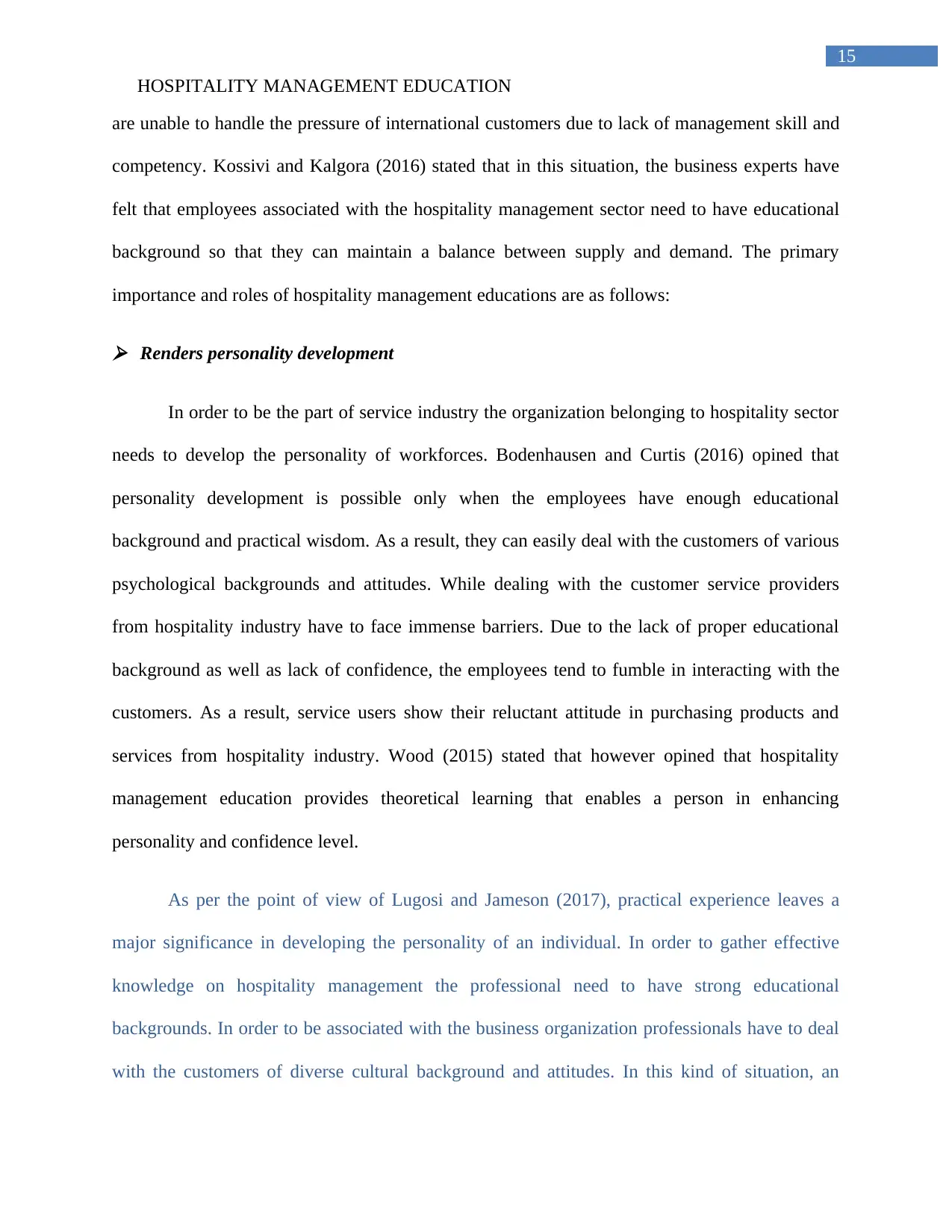
15
HOSPITALITY MANAGEMENT EDUCATION
are unable to handle the pressure of international customers due to lack of management skill and
competency. Kossivi and Kalgora (2016) stated that in this situation, the business experts have
felt that employees associated with the hospitality management sector need to have educational
background so that they can maintain a balance between supply and demand. The primary
importance and roles of hospitality management educations are as follows:
Renders personality development
In order to be the part of service industry the organization belonging to hospitality sector
needs to develop the personality of workforces. Bodenhausen and Curtis (2016) opined that
personality development is possible only when the employees have enough educational
background and practical wisdom. As a result, they can easily deal with the customers of various
psychological backgrounds and attitudes. While dealing with the customer service providers
from hospitality industry have to face immense barriers. Due to the lack of proper educational
background as well as lack of confidence, the employees tend to fumble in interacting with the
customers. As a result, service users show their reluctant attitude in purchasing products and
services from hospitality industry. Wood (2015) stated that however opined that hospitality
management education provides theoretical learning that enables a person in enhancing
personality and confidence level.
As per the point of view of Lugosi and Jameson (2017), practical experience leaves a
major significance in developing the personality of an individual. In order to gather effective
knowledge on hospitality management the professional need to have strong educational
backgrounds. In order to be associated with the business organization professionals have to deal
with the customers of diverse cultural background and attitudes. In this kind of situation, an
HOSPITALITY MANAGEMENT EDUCATION
are unable to handle the pressure of international customers due to lack of management skill and
competency. Kossivi and Kalgora (2016) stated that in this situation, the business experts have
felt that employees associated with the hospitality management sector need to have educational
background so that they can maintain a balance between supply and demand. The primary
importance and roles of hospitality management educations are as follows:
Renders personality development
In order to be the part of service industry the organization belonging to hospitality sector
needs to develop the personality of workforces. Bodenhausen and Curtis (2016) opined that
personality development is possible only when the employees have enough educational
background and practical wisdom. As a result, they can easily deal with the customers of various
psychological backgrounds and attitudes. While dealing with the customer service providers
from hospitality industry have to face immense barriers. Due to the lack of proper educational
background as well as lack of confidence, the employees tend to fumble in interacting with the
customers. As a result, service users show their reluctant attitude in purchasing products and
services from hospitality industry. Wood (2015) stated that however opined that hospitality
management education provides theoretical learning that enables a person in enhancing
personality and confidence level.
As per the point of view of Lugosi and Jameson (2017), practical experience leaves a
major significance in developing the personality of an individual. In order to gather effective
knowledge on hospitality management the professional need to have strong educational
backgrounds. In order to be associated with the business organization professionals have to deal
with the customers of diverse cultural background and attitudes. In this kind of situation, an
Secure Best Marks with AI Grader
Need help grading? Try our AI Grader for instant feedback on your assignments.
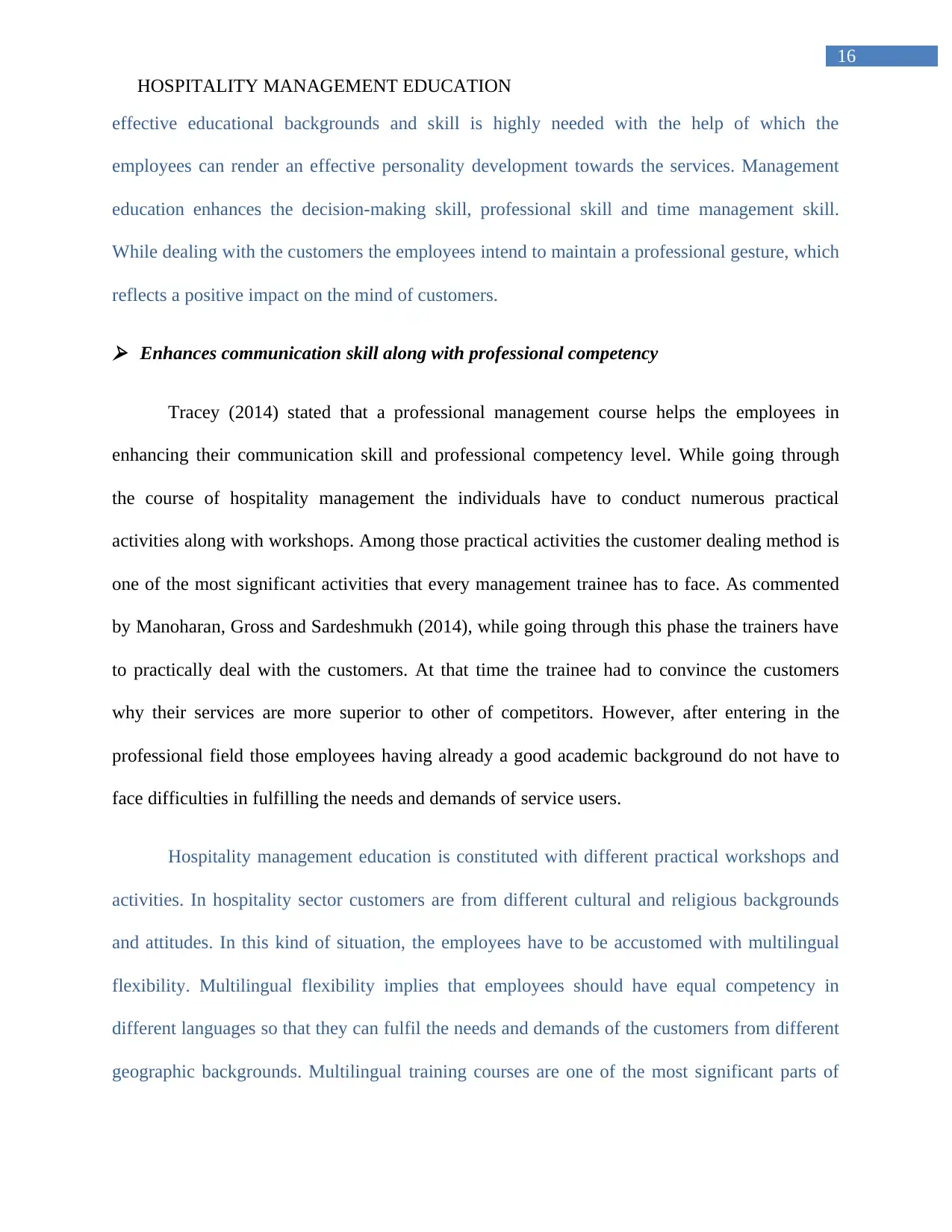
16
HOSPITALITY MANAGEMENT EDUCATION
effective educational backgrounds and skill is highly needed with the help of which the
employees can render an effective personality development towards the services. Management
education enhances the decision-making skill, professional skill and time management skill.
While dealing with the customers the employees intend to maintain a professional gesture, which
reflects a positive impact on the mind of customers.
Enhances communication skill along with professional competency
Tracey (2014) stated that a professional management course helps the employees in
enhancing their communication skill and professional competency level. While going through
the course of hospitality management the individuals have to conduct numerous practical
activities along with workshops. Among those practical activities the customer dealing method is
one of the most significant activities that every management trainee has to face. As commented
by Manoharan, Gross and Sardeshmukh (2014), while going through this phase the trainers have
to practically deal with the customers. At that time the trainee had to convince the customers
why their services are more superior to other of competitors. However, after entering in the
professional field those employees having already a good academic background do not have to
face difficulties in fulfilling the needs and demands of service users.
Hospitality management education is constituted with different practical workshops and
activities. In hospitality sector customers are from different cultural and religious backgrounds
and attitudes. In this kind of situation, the employees have to be accustomed with multilingual
flexibility. Multilingual flexibility implies that employees should have equal competency in
different languages so that they can fulfil the needs and demands of the customers from different
geographic backgrounds. Multilingual training courses are one of the most significant parts of
HOSPITALITY MANAGEMENT EDUCATION
effective educational backgrounds and skill is highly needed with the help of which the
employees can render an effective personality development towards the services. Management
education enhances the decision-making skill, professional skill and time management skill.
While dealing with the customers the employees intend to maintain a professional gesture, which
reflects a positive impact on the mind of customers.
Enhances communication skill along with professional competency
Tracey (2014) stated that a professional management course helps the employees in
enhancing their communication skill and professional competency level. While going through
the course of hospitality management the individuals have to conduct numerous practical
activities along with workshops. Among those practical activities the customer dealing method is
one of the most significant activities that every management trainee has to face. As commented
by Manoharan, Gross and Sardeshmukh (2014), while going through this phase the trainers have
to practically deal with the customers. At that time the trainee had to convince the customers
why their services are more superior to other of competitors. However, after entering in the
professional field those employees having already a good academic background do not have to
face difficulties in fulfilling the needs and demands of service users.
Hospitality management education is constituted with different practical workshops and
activities. In hospitality sector customers are from different cultural and religious backgrounds
and attitudes. In this kind of situation, the employees have to be accustomed with multilingual
flexibility. Multilingual flexibility implies that employees should have equal competency in
different languages so that they can fulfil the needs and demands of the customers from different
geographic backgrounds. Multilingual training courses are one of the most significant parts of
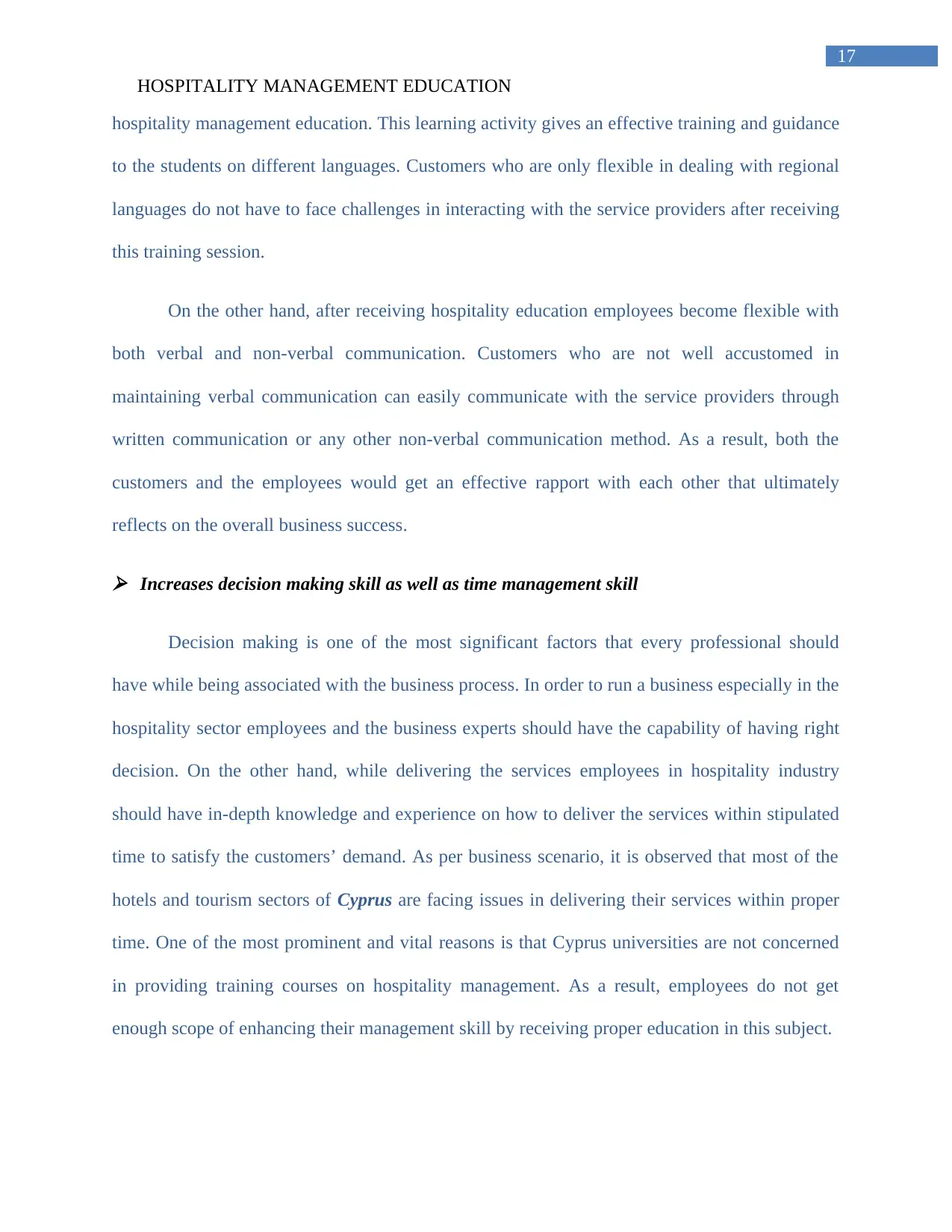
17
HOSPITALITY MANAGEMENT EDUCATION
hospitality management education. This learning activity gives an effective training and guidance
to the students on different languages. Customers who are only flexible in dealing with regional
languages do not have to face challenges in interacting with the service providers after receiving
this training session.
On the other hand, after receiving hospitality education employees become flexible with
both verbal and non-verbal communication. Customers who are not well accustomed in
maintaining verbal communication can easily communicate with the service providers through
written communication or any other non-verbal communication method. As a result, both the
customers and the employees would get an effective rapport with each other that ultimately
reflects on the overall business success.
Increases decision making skill as well as time management skill
Decision making is one of the most significant factors that every professional should
have while being associated with the business process. In order to run a business especially in the
hospitality sector employees and the business experts should have the capability of having right
decision. On the other hand, while delivering the services employees in hospitality industry
should have in-depth knowledge and experience on how to deliver the services within stipulated
time to satisfy the customers’ demand. As per business scenario, it is observed that most of the
hotels and tourism sectors of Cyprus are facing issues in delivering their services within proper
time. One of the most prominent and vital reasons is that Cyprus universities are not concerned
in providing training courses on hospitality management. As a result, employees do not get
enough scope of enhancing their management skill by receiving proper education in this subject.
HOSPITALITY MANAGEMENT EDUCATION
hospitality management education. This learning activity gives an effective training and guidance
to the students on different languages. Customers who are only flexible in dealing with regional
languages do not have to face challenges in interacting with the service providers after receiving
this training session.
On the other hand, after receiving hospitality education employees become flexible with
both verbal and non-verbal communication. Customers who are not well accustomed in
maintaining verbal communication can easily communicate with the service providers through
written communication or any other non-verbal communication method. As a result, both the
customers and the employees would get an effective rapport with each other that ultimately
reflects on the overall business success.
Increases decision making skill as well as time management skill
Decision making is one of the most significant factors that every professional should
have while being associated with the business process. In order to run a business especially in the
hospitality sector employees and the business experts should have the capability of having right
decision. On the other hand, while delivering the services employees in hospitality industry
should have in-depth knowledge and experience on how to deliver the services within stipulated
time to satisfy the customers’ demand. As per business scenario, it is observed that most of the
hotels and tourism sectors of Cyprus are facing issues in delivering their services within proper
time. One of the most prominent and vital reasons is that Cyprus universities are not concerned
in providing training courses on hospitality management. As a result, employees do not get
enough scope of enhancing their management skill by receiving proper education in this subject.
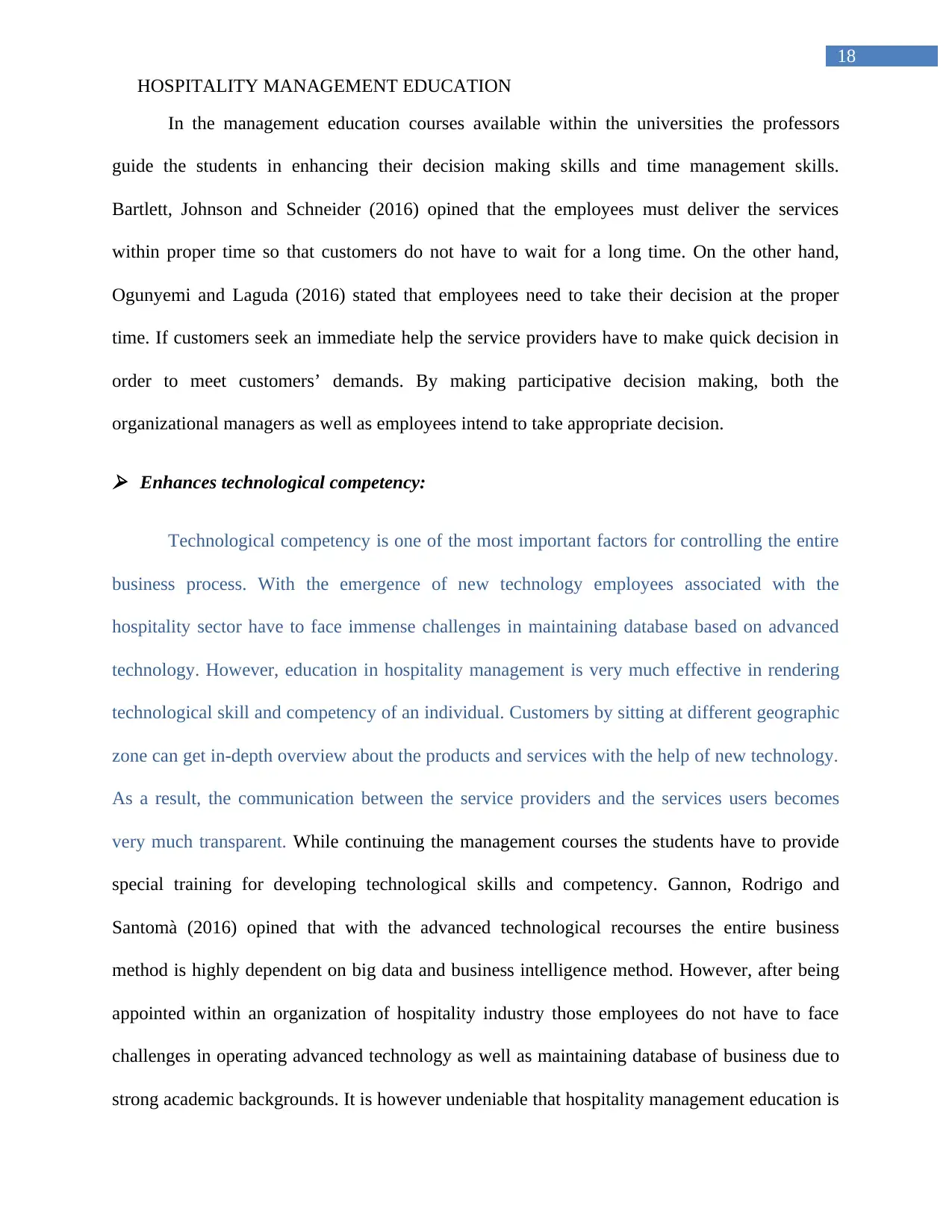
18
HOSPITALITY MANAGEMENT EDUCATION
In the management education courses available within the universities the professors
guide the students in enhancing their decision making skills and time management skills.
Bartlett, Johnson and Schneider (2016) opined that the employees must deliver the services
within proper time so that customers do not have to wait for a long time. On the other hand,
Ogunyemi and Laguda (2016) stated that employees need to take their decision at the proper
time. If customers seek an immediate help the service providers have to make quick decision in
order to meet customers’ demands. By making participative decision making, both the
organizational managers as well as employees intend to take appropriate decision.
Enhances technological competency:
Technological competency is one of the most important factors for controlling the entire
business process. With the emergence of new technology employees associated with the
hospitality sector have to face immense challenges in maintaining database based on advanced
technology. However, education in hospitality management is very much effective in rendering
technological skill and competency of an individual. Customers by sitting at different geographic
zone can get in-depth overview about the products and services with the help of new technology.
As a result, the communication between the service providers and the services users becomes
very much transparent. While continuing the management courses the students have to provide
special training for developing technological skills and competency. Gannon, Rodrigo and
Santomà (2016) opined that with the advanced technological recourses the entire business
method is highly dependent on big data and business intelligence method. However, after being
appointed within an organization of hospitality industry those employees do not have to face
challenges in operating advanced technology as well as maintaining database of business due to
strong academic backgrounds. It is however undeniable that hospitality management education is
HOSPITALITY MANAGEMENT EDUCATION
In the management education courses available within the universities the professors
guide the students in enhancing their decision making skills and time management skills.
Bartlett, Johnson and Schneider (2016) opined that the employees must deliver the services
within proper time so that customers do not have to wait for a long time. On the other hand,
Ogunyemi and Laguda (2016) stated that employees need to take their decision at the proper
time. If customers seek an immediate help the service providers have to make quick decision in
order to meet customers’ demands. By making participative decision making, both the
organizational managers as well as employees intend to take appropriate decision.
Enhances technological competency:
Technological competency is one of the most important factors for controlling the entire
business process. With the emergence of new technology employees associated with the
hospitality sector have to face immense challenges in maintaining database based on advanced
technology. However, education in hospitality management is very much effective in rendering
technological skill and competency of an individual. Customers by sitting at different geographic
zone can get in-depth overview about the products and services with the help of new technology.
As a result, the communication between the service providers and the services users becomes
very much transparent. While continuing the management courses the students have to provide
special training for developing technological skills and competency. Gannon, Rodrigo and
Santomà (2016) opined that with the advanced technological recourses the entire business
method is highly dependent on big data and business intelligence method. However, after being
appointed within an organization of hospitality industry those employees do not have to face
challenges in operating advanced technology as well as maintaining database of business due to
strong academic backgrounds. It is however undeniable that hospitality management education is
Paraphrase This Document
Need a fresh take? Get an instant paraphrase of this document with our AI Paraphraser
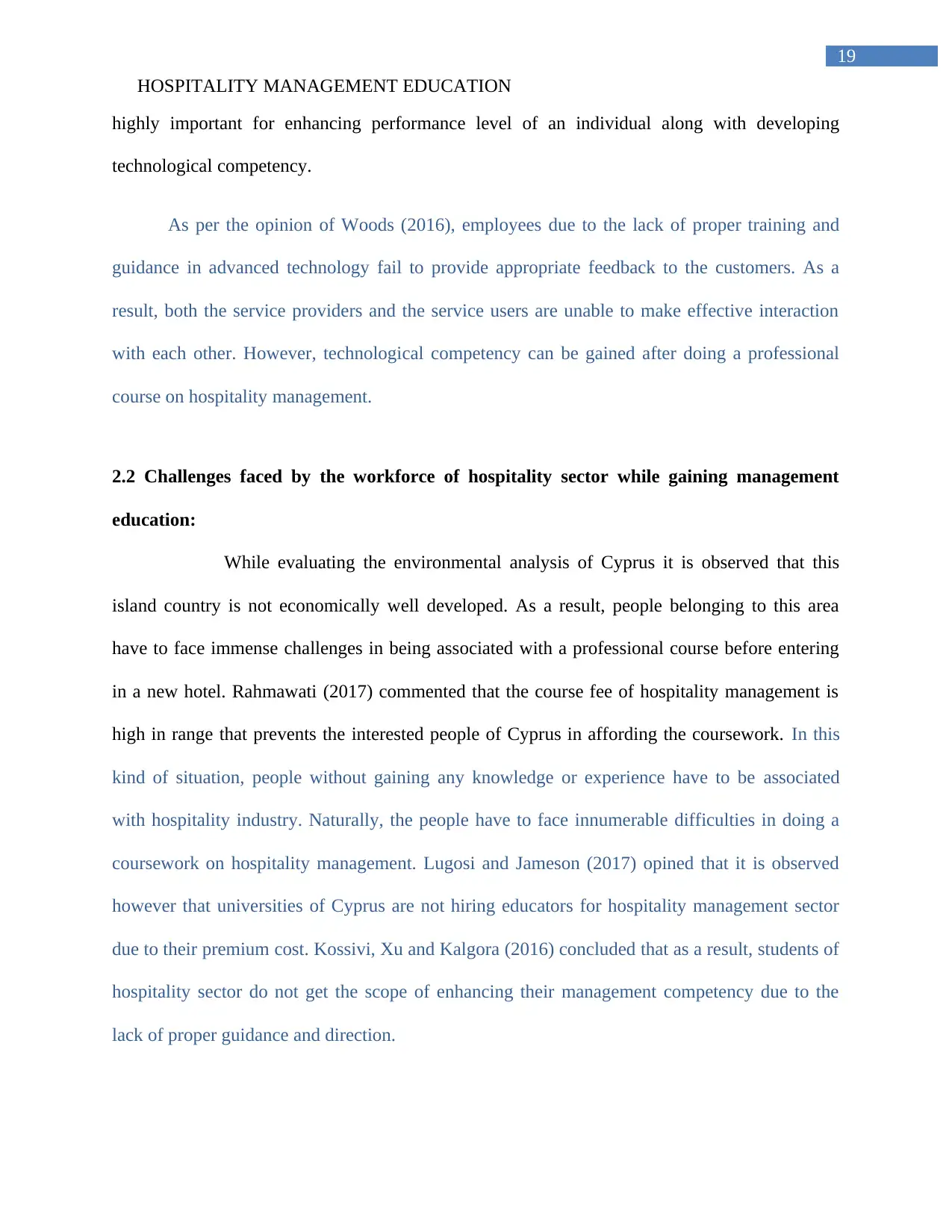
19
HOSPITALITY MANAGEMENT EDUCATION
highly important for enhancing performance level of an individual along with developing
technological competency.
As per the opinion of Woods (2016), employees due to the lack of proper training and
guidance in advanced technology fail to provide appropriate feedback to the customers. As a
result, both the service providers and the service users are unable to make effective interaction
with each other. However, technological competency can be gained after doing a professional
course on hospitality management.
2.2 Challenges faced by the workforce of hospitality sector while gaining management
education:
While evaluating the environmental analysis of Cyprus it is observed that this
island country is not economically well developed. As a result, people belonging to this area
have to face immense challenges in being associated with a professional course before entering
in a new hotel. Rahmawati (2017) commented that the course fee of hospitality management is
high in range that prevents the interested people of Cyprus in affording the coursework. In this
kind of situation, people without gaining any knowledge or experience have to be associated
with hospitality industry. Naturally, the people have to face innumerable difficulties in doing a
coursework on hospitality management. Lugosi and Jameson (2017) opined that it is observed
however that universities of Cyprus are not hiring educators for hospitality management sector
due to their premium cost. Kossivi, Xu and Kalgora (2016) concluded that as a result, students of
hospitality sector do not get the scope of enhancing their management competency due to the
lack of proper guidance and direction.
HOSPITALITY MANAGEMENT EDUCATION
highly important for enhancing performance level of an individual along with developing
technological competency.
As per the opinion of Woods (2016), employees due to the lack of proper training and
guidance in advanced technology fail to provide appropriate feedback to the customers. As a
result, both the service providers and the service users are unable to make effective interaction
with each other. However, technological competency can be gained after doing a professional
course on hospitality management.
2.2 Challenges faced by the workforce of hospitality sector while gaining management
education:
While evaluating the environmental analysis of Cyprus it is observed that this
island country is not economically well developed. As a result, people belonging to this area
have to face immense challenges in being associated with a professional course before entering
in a new hotel. Rahmawati (2017) commented that the course fee of hospitality management is
high in range that prevents the interested people of Cyprus in affording the coursework. In this
kind of situation, people without gaining any knowledge or experience have to be associated
with hospitality industry. Naturally, the people have to face innumerable difficulties in doing a
coursework on hospitality management. Lugosi and Jameson (2017) opined that it is observed
however that universities of Cyprus are not hiring educators for hospitality management sector
due to their premium cost. Kossivi, Xu and Kalgora (2016) concluded that as a result, students of
hospitality sector do not get the scope of enhancing their management competency due to the
lack of proper guidance and direction.
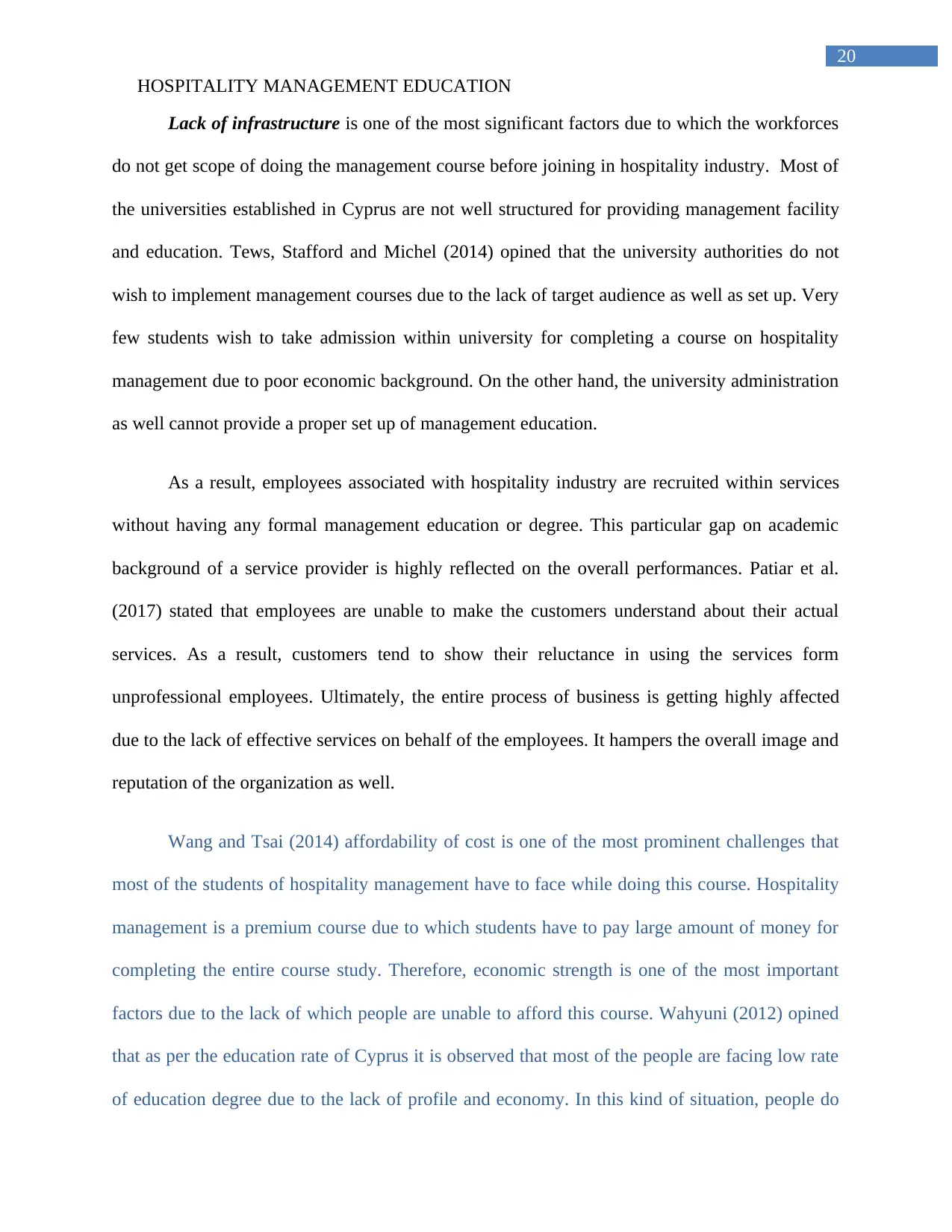
20
HOSPITALITY MANAGEMENT EDUCATION
Lack of infrastructure is one of the most significant factors due to which the workforces
do not get scope of doing the management course before joining in hospitality industry. Most of
the universities established in Cyprus are not well structured for providing management facility
and education. Tews, Stafford and Michel (2014) opined that the university authorities do not
wish to implement management courses due to the lack of target audience as well as set up. Very
few students wish to take admission within university for completing a course on hospitality
management due to poor economic background. On the other hand, the university administration
as well cannot provide a proper set up of management education.
As a result, employees associated with hospitality industry are recruited within services
without having any formal management education or degree. This particular gap on academic
background of a service provider is highly reflected on the overall performances. Patiar et al.
(2017) stated that employees are unable to make the customers understand about their actual
services. As a result, customers tend to show their reluctance in using the services form
unprofessional employees. Ultimately, the entire process of business is getting highly affected
due to the lack of effective services on behalf of the employees. It hampers the overall image and
reputation of the organization as well.
Wang and Tsai (2014) affordability of cost is one of the most prominent challenges that
most of the students of hospitality management have to face while doing this course. Hospitality
management is a premium course due to which students have to pay large amount of money for
completing the entire course study. Therefore, economic strength is one of the most important
factors due to the lack of which people are unable to afford this course. Wahyuni (2012) opined
that as per the education rate of Cyprus it is observed that most of the people are facing low rate
of education degree due to the lack of profile and economy. In this kind of situation, people do
HOSPITALITY MANAGEMENT EDUCATION
Lack of infrastructure is one of the most significant factors due to which the workforces
do not get scope of doing the management course before joining in hospitality industry. Most of
the universities established in Cyprus are not well structured for providing management facility
and education. Tews, Stafford and Michel (2014) opined that the university authorities do not
wish to implement management courses due to the lack of target audience as well as set up. Very
few students wish to take admission within university for completing a course on hospitality
management due to poor economic background. On the other hand, the university administration
as well cannot provide a proper set up of management education.
As a result, employees associated with hospitality industry are recruited within services
without having any formal management education or degree. This particular gap on academic
background of a service provider is highly reflected on the overall performances. Patiar et al.
(2017) stated that employees are unable to make the customers understand about their actual
services. As a result, customers tend to show their reluctance in using the services form
unprofessional employees. Ultimately, the entire process of business is getting highly affected
due to the lack of effective services on behalf of the employees. It hampers the overall image and
reputation of the organization as well.
Wang and Tsai (2014) affordability of cost is one of the most prominent challenges that
most of the students of hospitality management have to face while doing this course. Hospitality
management is a premium course due to which students have to pay large amount of money for
completing the entire course study. Therefore, economic strength is one of the most important
factors due to the lack of which people are unable to afford this course. Wahyuni (2012) opined
that as per the education rate of Cyprus it is observed that most of the people are facing low rate
of education degree due to the lack of profile and economy. In this kind of situation, people do
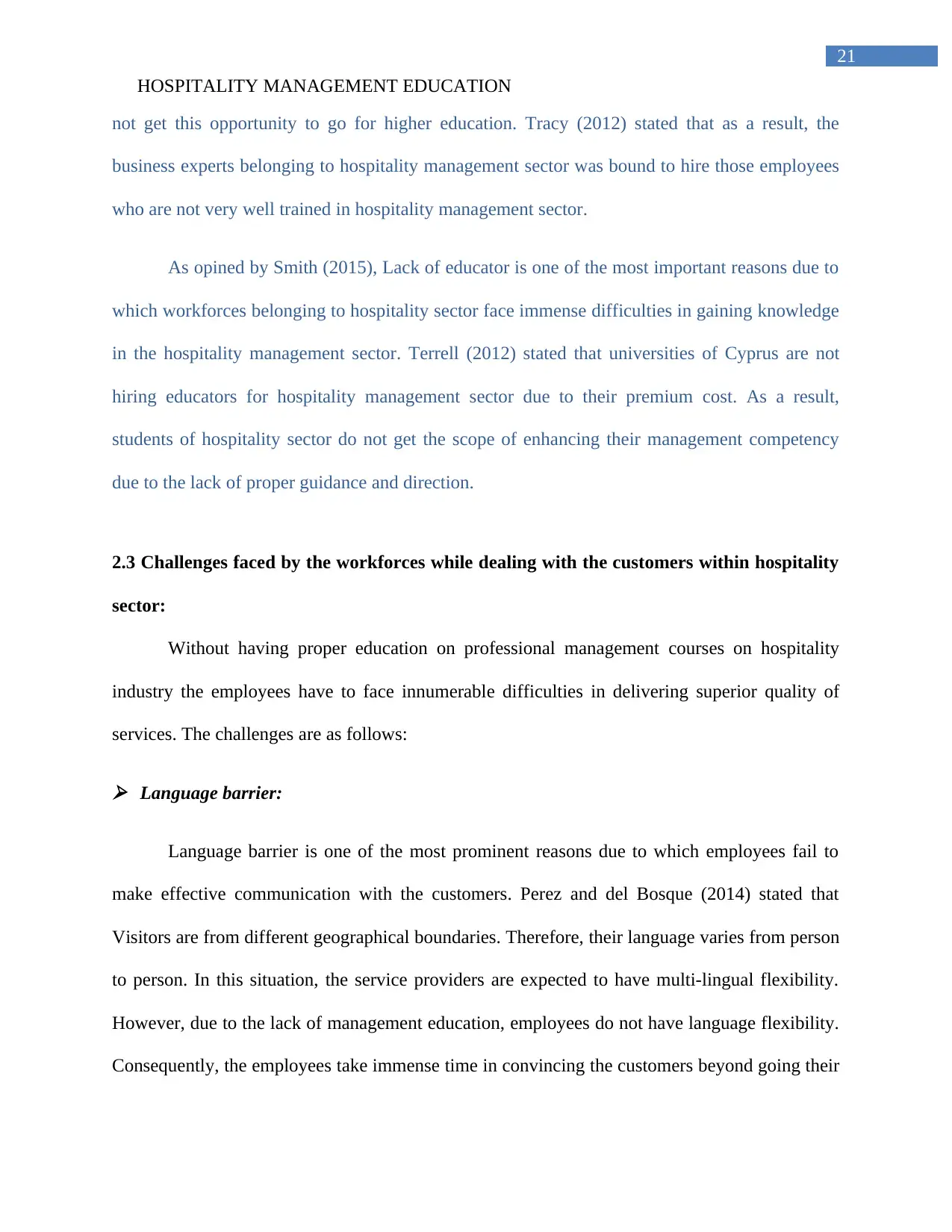
21
HOSPITALITY MANAGEMENT EDUCATION
not get this opportunity to go for higher education. Tracy (2012) stated that as a result, the
business experts belonging to hospitality management sector was bound to hire those employees
who are not very well trained in hospitality management sector.
As opined by Smith (2015), Lack of educator is one of the most important reasons due to
which workforces belonging to hospitality sector face immense difficulties in gaining knowledge
in the hospitality management sector. Terrell (2012) stated that universities of Cyprus are not
hiring educators for hospitality management sector due to their premium cost. As a result,
students of hospitality sector do not get the scope of enhancing their management competency
due to the lack of proper guidance and direction.
2.3 Challenges faced by the workforces while dealing with the customers within hospitality
sector:
Without having proper education on professional management courses on hospitality
industry the employees have to face innumerable difficulties in delivering superior quality of
services. The challenges are as follows:
Language barrier:
Language barrier is one of the most prominent reasons due to which employees fail to
make effective communication with the customers. Perez and del Bosque (2014) stated that
Visitors are from different geographical boundaries. Therefore, their language varies from person
to person. In this situation, the service providers are expected to have multi-lingual flexibility.
However, due to the lack of management education, employees do not have language flexibility.
Consequently, the employees take immense time in convincing the customers beyond going their
HOSPITALITY MANAGEMENT EDUCATION
not get this opportunity to go for higher education. Tracy (2012) stated that as a result, the
business experts belonging to hospitality management sector was bound to hire those employees
who are not very well trained in hospitality management sector.
As opined by Smith (2015), Lack of educator is one of the most important reasons due to
which workforces belonging to hospitality sector face immense difficulties in gaining knowledge
in the hospitality management sector. Terrell (2012) stated that universities of Cyprus are not
hiring educators for hospitality management sector due to their premium cost. As a result,
students of hospitality sector do not get the scope of enhancing their management competency
due to the lack of proper guidance and direction.
2.3 Challenges faced by the workforces while dealing with the customers within hospitality
sector:
Without having proper education on professional management courses on hospitality
industry the employees have to face innumerable difficulties in delivering superior quality of
services. The challenges are as follows:
Language barrier:
Language barrier is one of the most prominent reasons due to which employees fail to
make effective communication with the customers. Perez and del Bosque (2014) stated that
Visitors are from different geographical boundaries. Therefore, their language varies from person
to person. In this situation, the service providers are expected to have multi-lingual flexibility.
However, due to the lack of management education, employees do not have language flexibility.
Consequently, the employees take immense time in convincing the customers beyond going their
Secure Best Marks with AI Grader
Need help grading? Try our AI Grader for instant feedback on your assignments.
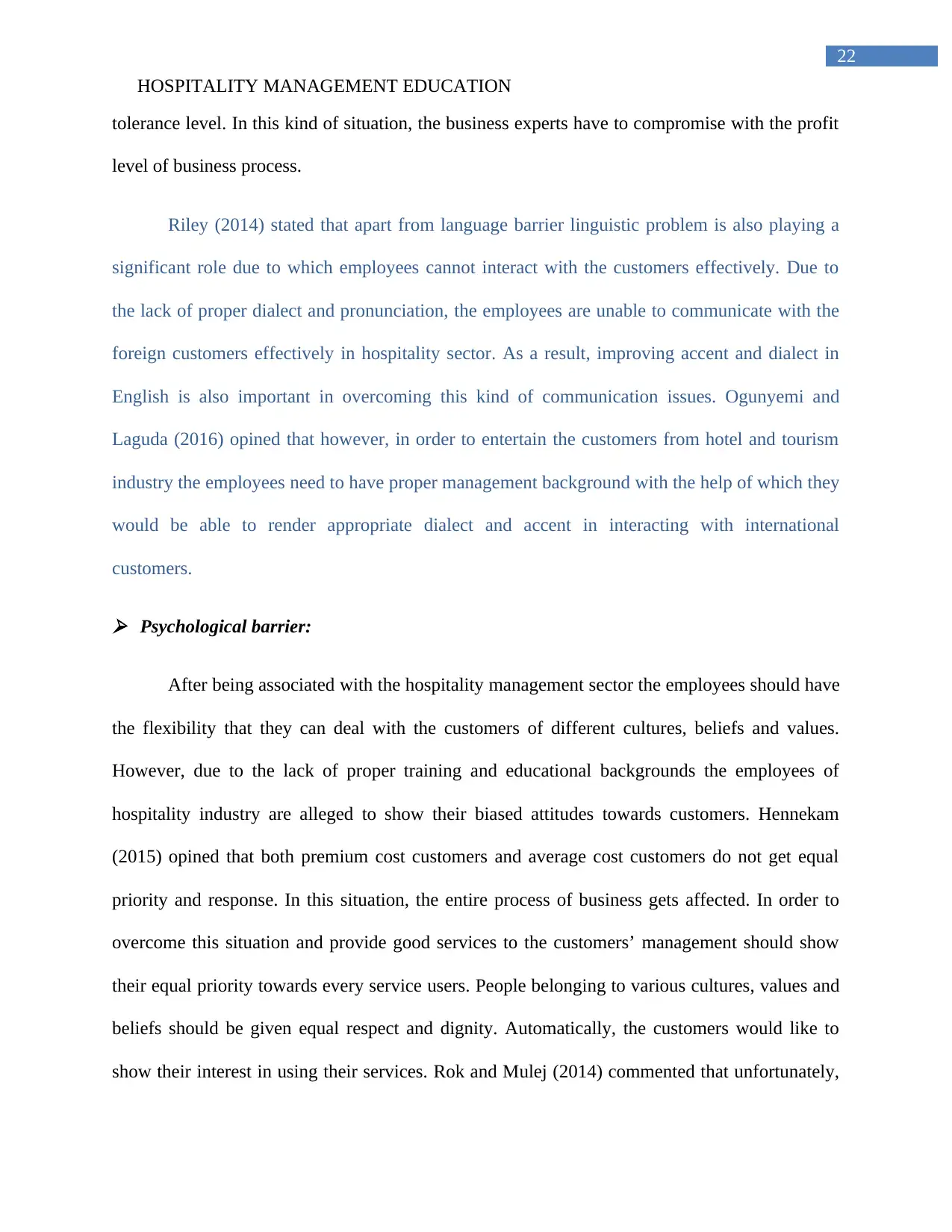
22
HOSPITALITY MANAGEMENT EDUCATION
tolerance level. In this kind of situation, the business experts have to compromise with the profit
level of business process.
Riley (2014) stated that apart from language barrier linguistic problem is also playing a
significant role due to which employees cannot interact with the customers effectively. Due to
the lack of proper dialect and pronunciation, the employees are unable to communicate with the
foreign customers effectively in hospitality sector. As a result, improving accent and dialect in
English is also important in overcoming this kind of communication issues. Ogunyemi and
Laguda (2016) opined that however, in order to entertain the customers from hotel and tourism
industry the employees need to have proper management background with the help of which they
would be able to render appropriate dialect and accent in interacting with international
customers.
Psychological barrier:
After being associated with the hospitality management sector the employees should have
the flexibility that they can deal with the customers of different cultures, beliefs and values.
However, due to the lack of proper training and educational backgrounds the employees of
hospitality industry are alleged to show their biased attitudes towards customers. Hennekam
(2015) opined that both premium cost customers and average cost customers do not get equal
priority and response. In this situation, the entire process of business gets affected. In order to
overcome this situation and provide good services to the customers’ management should show
their equal priority towards every service users. People belonging to various cultures, values and
beliefs should be given equal respect and dignity. Automatically, the customers would like to
show their interest in using their services. Rok and Mulej (2014) commented that unfortunately,
HOSPITALITY MANAGEMENT EDUCATION
tolerance level. In this kind of situation, the business experts have to compromise with the profit
level of business process.
Riley (2014) stated that apart from language barrier linguistic problem is also playing a
significant role due to which employees cannot interact with the customers effectively. Due to
the lack of proper dialect and pronunciation, the employees are unable to communicate with the
foreign customers effectively in hospitality sector. As a result, improving accent and dialect in
English is also important in overcoming this kind of communication issues. Ogunyemi and
Laguda (2016) opined that however, in order to entertain the customers from hotel and tourism
industry the employees need to have proper management background with the help of which they
would be able to render appropriate dialect and accent in interacting with international
customers.
Psychological barrier:
After being associated with the hospitality management sector the employees should have
the flexibility that they can deal with the customers of different cultures, beliefs and values.
However, due to the lack of proper training and educational backgrounds the employees of
hospitality industry are alleged to show their biased attitudes towards customers. Hennekam
(2015) opined that both premium cost customers and average cost customers do not get equal
priority and response. In this situation, the entire process of business gets affected. In order to
overcome this situation and provide good services to the customers’ management should show
their equal priority towards every service users. People belonging to various cultures, values and
beliefs should be given equal respect and dignity. Automatically, the customers would like to
show their interest in using their services. Rok and Mulej (2014) commented that unfortunately,
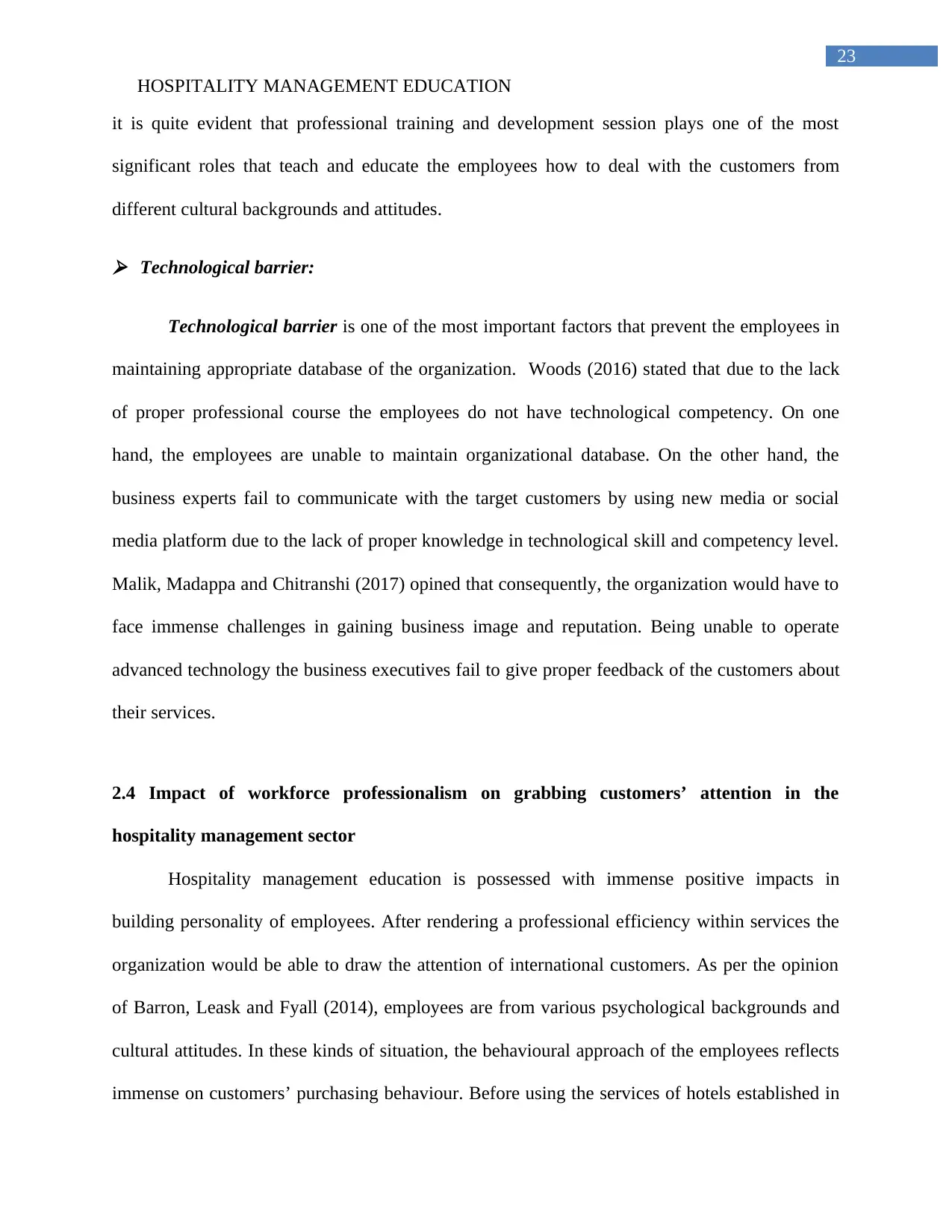
23
HOSPITALITY MANAGEMENT EDUCATION
it is quite evident that professional training and development session plays one of the most
significant roles that teach and educate the employees how to deal with the customers from
different cultural backgrounds and attitudes.
Technological barrier:
Technological barrier is one of the most important factors that prevent the employees in
maintaining appropriate database of the organization. Woods (2016) stated that due to the lack
of proper professional course the employees do not have technological competency. On one
hand, the employees are unable to maintain organizational database. On the other hand, the
business experts fail to communicate with the target customers by using new media or social
media platform due to the lack of proper knowledge in technological skill and competency level.
Malik, Madappa and Chitranshi (2017) opined that consequently, the organization would have to
face immense challenges in gaining business image and reputation. Being unable to operate
advanced technology the business executives fail to give proper feedback of the customers about
their services.
2.4 Impact of workforce professionalism on grabbing customers’ attention in the
hospitality management sector
Hospitality management education is possessed with immense positive impacts in
building personality of employees. After rendering a professional efficiency within services the
organization would be able to draw the attention of international customers. As per the opinion
of Barron, Leask and Fyall (2014), employees are from various psychological backgrounds and
cultural attitudes. In these kinds of situation, the behavioural approach of the employees reflects
immense on customers’ purchasing behaviour. Before using the services of hotels established in
HOSPITALITY MANAGEMENT EDUCATION
it is quite evident that professional training and development session plays one of the most
significant roles that teach and educate the employees how to deal with the customers from
different cultural backgrounds and attitudes.
Technological barrier:
Technological barrier is one of the most important factors that prevent the employees in
maintaining appropriate database of the organization. Woods (2016) stated that due to the lack
of proper professional course the employees do not have technological competency. On one
hand, the employees are unable to maintain organizational database. On the other hand, the
business experts fail to communicate with the target customers by using new media or social
media platform due to the lack of proper knowledge in technological skill and competency level.
Malik, Madappa and Chitranshi (2017) opined that consequently, the organization would have to
face immense challenges in gaining business image and reputation. Being unable to operate
advanced technology the business executives fail to give proper feedback of the customers about
their services.
2.4 Impact of workforce professionalism on grabbing customers’ attention in the
hospitality management sector
Hospitality management education is possessed with immense positive impacts in
building personality of employees. After rendering a professional efficiency within services the
organization would be able to draw the attention of international customers. As per the opinion
of Barron, Leask and Fyall (2014), employees are from various psychological backgrounds and
cultural attitudes. In these kinds of situation, the behavioural approach of the employees reflects
immense on customers’ purchasing behaviour. Before using the services of hotels established in
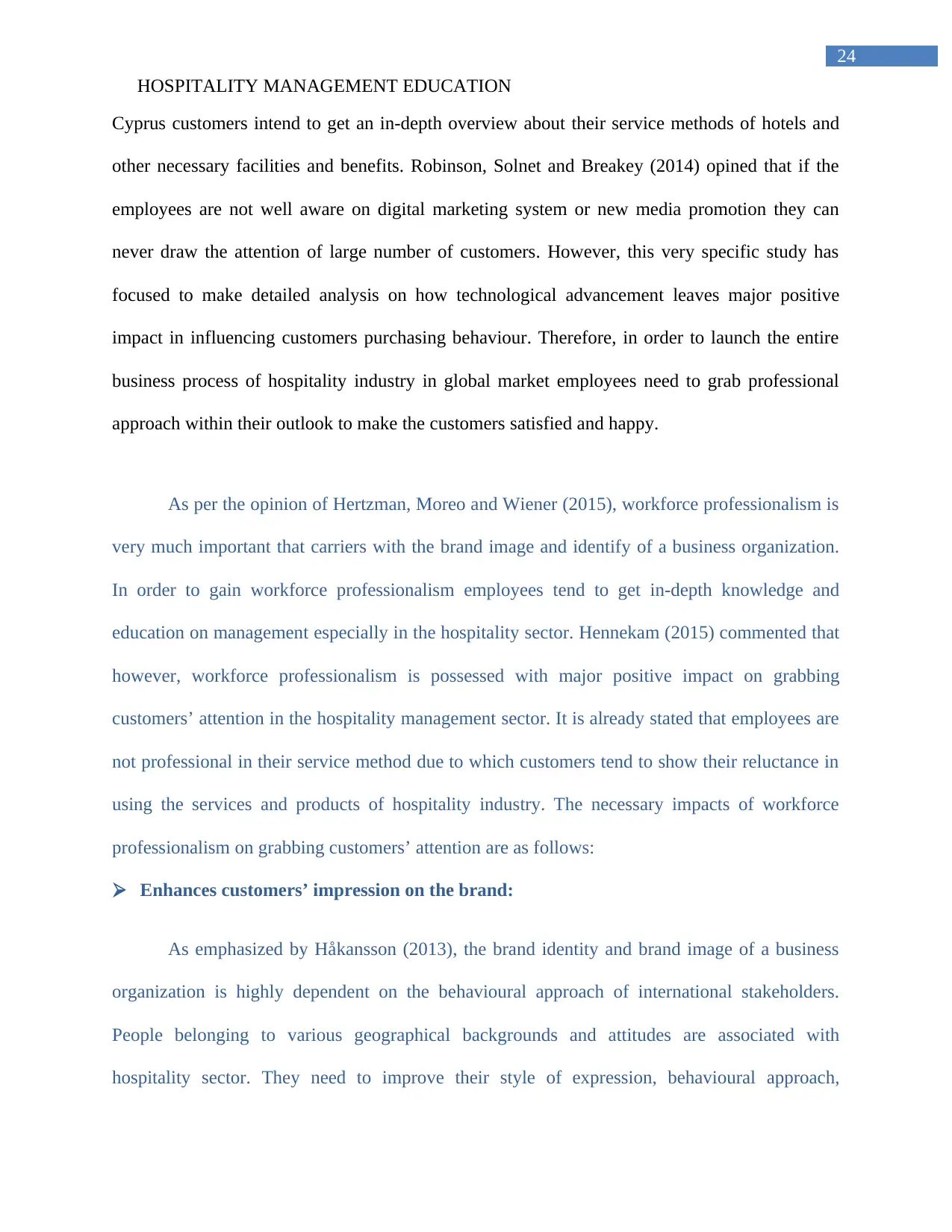
24
HOSPITALITY MANAGEMENT EDUCATION
Cyprus customers intend to get an in-depth overview about their service methods of hotels and
other necessary facilities and benefits. Robinson, Solnet and Breakey (2014) opined that if the
employees are not well aware on digital marketing system or new media promotion they can
never draw the attention of large number of customers. However, this very specific study has
focused to make detailed analysis on how technological advancement leaves major positive
impact in influencing customers purchasing behaviour. Therefore, in order to launch the entire
business process of hospitality industry in global market employees need to grab professional
approach within their outlook to make the customers satisfied and happy.
As per the opinion of Hertzman, Moreo and Wiener (2015), workforce professionalism is
very much important that carriers with the brand image and identify of a business organization.
In order to gain workforce professionalism employees tend to get in-depth knowledge and
education on management especially in the hospitality sector. Hennekam (2015) commented that
however, workforce professionalism is possessed with major positive impact on grabbing
customers’ attention in the hospitality management sector. It is already stated that employees are
not professional in their service method due to which customers tend to show their reluctance in
using the services and products of hospitality industry. The necessary impacts of workforce
professionalism on grabbing customers’ attention are as follows:
Enhances customers’ impression on the brand:
As emphasized by Håkansson (2013), the brand identity and brand image of a business
organization is highly dependent on the behavioural approach of international stakeholders.
People belonging to various geographical backgrounds and attitudes are associated with
hospitality sector. They need to improve their style of expression, behavioural approach,
HOSPITALITY MANAGEMENT EDUCATION
Cyprus customers intend to get an in-depth overview about their service methods of hotels and
other necessary facilities and benefits. Robinson, Solnet and Breakey (2014) opined that if the
employees are not well aware on digital marketing system or new media promotion they can
never draw the attention of large number of customers. However, this very specific study has
focused to make detailed analysis on how technological advancement leaves major positive
impact in influencing customers purchasing behaviour. Therefore, in order to launch the entire
business process of hospitality industry in global market employees need to grab professional
approach within their outlook to make the customers satisfied and happy.
As per the opinion of Hertzman, Moreo and Wiener (2015), workforce professionalism is
very much important that carriers with the brand image and identify of a business organization.
In order to gain workforce professionalism employees tend to get in-depth knowledge and
education on management especially in the hospitality sector. Hennekam (2015) commented that
however, workforce professionalism is possessed with major positive impact on grabbing
customers’ attention in the hospitality management sector. It is already stated that employees are
not professional in their service method due to which customers tend to show their reluctance in
using the services and products of hospitality industry. The necessary impacts of workforce
professionalism on grabbing customers’ attention are as follows:
Enhances customers’ impression on the brand:
As emphasized by Håkansson (2013), the brand identity and brand image of a business
organization is highly dependent on the behavioural approach of international stakeholders.
People belonging to various geographical backgrounds and attitudes are associated with
hospitality sector. They need to improve their style of expression, behavioural approach,
Paraphrase This Document
Need a fresh take? Get an instant paraphrase of this document with our AI Paraphraser

25
HOSPITALITY MANAGEMENT EDUCATION
communication approach and so many. As stated by Collis and Hussey (2013), these kinds of
professional approach can be gained in two effective ways. Firstly, the employees can take an
effective training and development session with the initiative of human resource manager.
Otherwise, the employees before joining in the professional field can do a professional course on
hospitality management. As a result, the employees can automatically develop their personality.
Levy and Lemeshow (2013) stated that hospitality management education provides theoretical
learning that enables a person in enhancing personality and confidence level. After this
evaluation, it can be concluded that professional approach and behaviour enhances customers’
brand identity and image.
Minimizes conflict among the employees:
Barron, Leask and Fyall (opined) that unprofessional approach always raises conflict
among the employees. Due to the lack of training internal stakeholders do not intend to maintain
organizational behaviour and business ethics. This kind of internal conflict reflects a major
negative impact on the overall impression of customers. However, professional approach and
training method is very much effective in minimizing these kinds of internal conflict at the
workplace.
Maintains strong communication:
Bryman and Bell (2015) opined that employees by maintaining professionalism become
very much communicative with each other. Effective communication enables the employees in
sharing their important views and thoughts regarding the success of business. As a result, every
employee is categorically well-informed about the flow of business and its necessary way of
improvement. Brown, Arendt and Bosselman (2014) commented that in this kind of situation,
HOSPITALITY MANAGEMENT EDUCATION
communication approach and so many. As stated by Collis and Hussey (2013), these kinds of
professional approach can be gained in two effective ways. Firstly, the employees can take an
effective training and development session with the initiative of human resource manager.
Otherwise, the employees before joining in the professional field can do a professional course on
hospitality management. As a result, the employees can automatically develop their personality.
Levy and Lemeshow (2013) stated that hospitality management education provides theoretical
learning that enables a person in enhancing personality and confidence level. After this
evaluation, it can be concluded that professional approach and behaviour enhances customers’
brand identity and image.
Minimizes conflict among the employees:
Barron, Leask and Fyall (opined) that unprofessional approach always raises conflict
among the employees. Due to the lack of training internal stakeholders do not intend to maintain
organizational behaviour and business ethics. This kind of internal conflict reflects a major
negative impact on the overall impression of customers. However, professional approach and
training method is very much effective in minimizing these kinds of internal conflict at the
workplace.
Maintains strong communication:
Bryman and Bell (2015) opined that employees by maintaining professionalism become
very much communicative with each other. Effective communication enables the employees in
sharing their important views and thoughts regarding the success of business. As a result, every
employee is categorically well-informed about the flow of business and its necessary way of
improvement. Brown, Arendt and Bosselman (2014) commented that in this kind of situation,

26
HOSPITALITY MANAGEMENT EDUCATION
employees become flexible in resolving their issues with each other so that the flow of business
can be well maintained. On the other hand, professional communication is always helpful in
meeting effective balance between supply and demand.
Renders business profitability:
Barron, Leask and Fyall (2014) opined that systematic flow of business and effective
communication among the employees renders business profitability. Employees by maintaining
professionalism intends to take appropriate decision making by following participative form of
decision making style. In this form of decision making style both the employees and the business
managers intend to take equal participation in forming business strategy and policy. As a result,
employees tend to show their interest in providing their best endeavour towards the services.
However, Bodenhausen and Curtis (2016) has commented in this occasion that good
performance of employees, their professional approach, effective customer service management
system ultimately renders immense business profitability.
2.5 Effective ways of overcoming the challenges
Some of the most effective ways of overcoming the challenges in dealing with the
international customers of hospitality industry are as follows. Grobelna and Marciszewska
(2016) stated that the business experts should implement training and development method
within services. As a result, the employees after been associated within organization get the
opportunity to develop their professional competency level. On the other hand, hospitality
management employees need to receive a professional training for enhancing their technological
competency. Grobelna (2015) opined that an effective professional training is very much
HOSPITALITY MANAGEMENT EDUCATION
employees become flexible in resolving their issues with each other so that the flow of business
can be well maintained. On the other hand, professional communication is always helpful in
meeting effective balance between supply and demand.
Renders business profitability:
Barron, Leask and Fyall (2014) opined that systematic flow of business and effective
communication among the employees renders business profitability. Employees by maintaining
professionalism intends to take appropriate decision making by following participative form of
decision making style. In this form of decision making style both the employees and the business
managers intend to take equal participation in forming business strategy and policy. As a result,
employees tend to show their interest in providing their best endeavour towards the services.
However, Bodenhausen and Curtis (2016) has commented in this occasion that good
performance of employees, their professional approach, effective customer service management
system ultimately renders immense business profitability.
2.5 Effective ways of overcoming the challenges
Some of the most effective ways of overcoming the challenges in dealing with the
international customers of hospitality industry are as follows. Grobelna and Marciszewska
(2016) stated that the business experts should implement training and development method
within services. As a result, the employees after been associated within organization get the
opportunity to develop their professional competency level. On the other hand, hospitality
management employees need to receive a professional training for enhancing their technological
competency. Grobelna (2015) opined that an effective professional training is very much
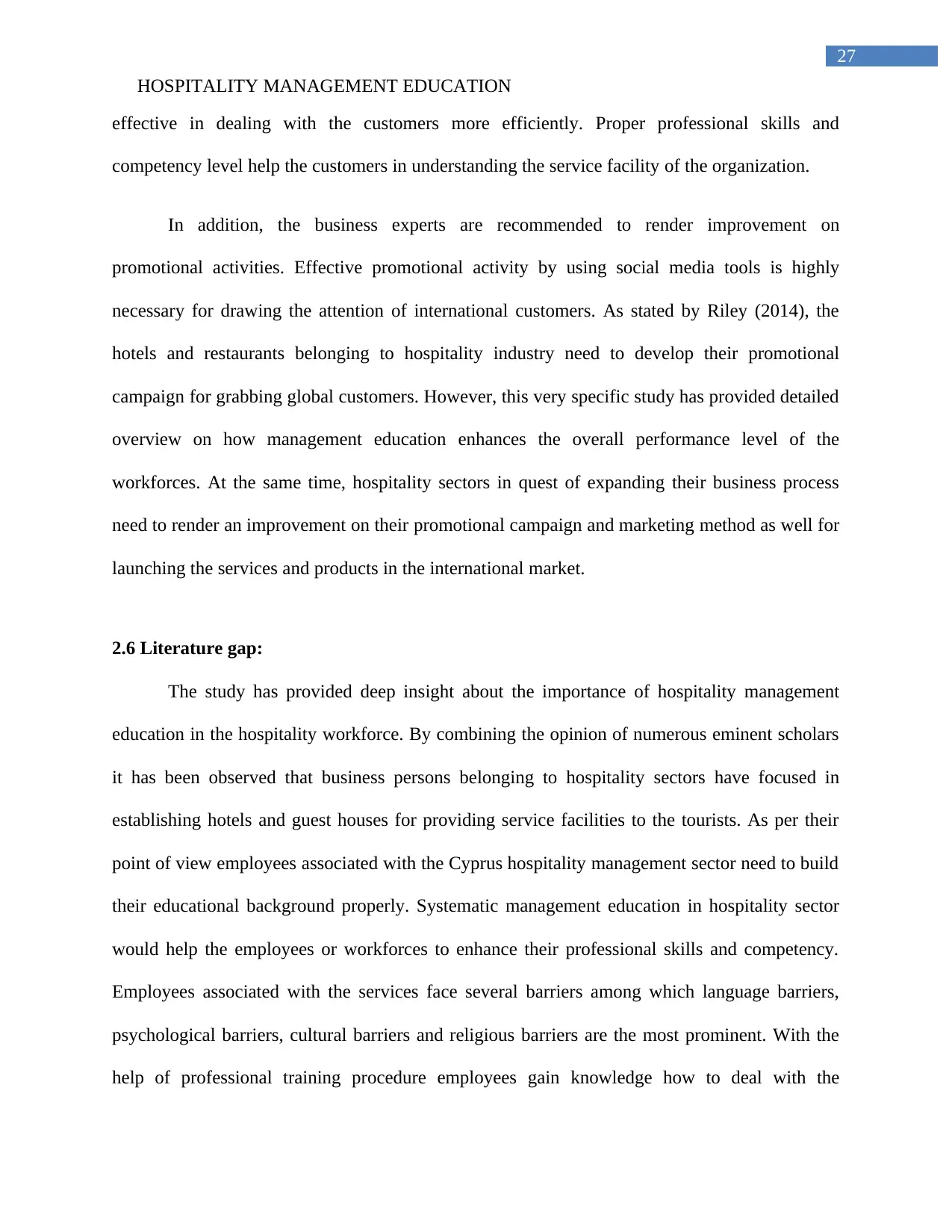
27
HOSPITALITY MANAGEMENT EDUCATION
effective in dealing with the customers more efficiently. Proper professional skills and
competency level help the customers in understanding the service facility of the organization.
In addition, the business experts are recommended to render improvement on
promotional activities. Effective promotional activity by using social media tools is highly
necessary for drawing the attention of international customers. As stated by Riley (2014), the
hotels and restaurants belonging to hospitality industry need to develop their promotional
campaign for grabbing global customers. However, this very specific study has provided detailed
overview on how management education enhances the overall performance level of the
workforces. At the same time, hospitality sectors in quest of expanding their business process
need to render an improvement on their promotional campaign and marketing method as well for
launching the services and products in the international market.
2.6 Literature gap:
The study has provided deep insight about the importance of hospitality management
education in the hospitality workforce. By combining the opinion of numerous eminent scholars
it has been observed that business persons belonging to hospitality sectors have focused in
establishing hotels and guest houses for providing service facilities to the tourists. As per their
point of view employees associated with the Cyprus hospitality management sector need to build
their educational background properly. Systematic management education in hospitality sector
would help the employees or workforces to enhance their professional skills and competency.
Employees associated with the services face several barriers among which language barriers,
psychological barriers, cultural barriers and religious barriers are the most prominent. With the
help of professional training procedure employees gain knowledge how to deal with the
HOSPITALITY MANAGEMENT EDUCATION
effective in dealing with the customers more efficiently. Proper professional skills and
competency level help the customers in understanding the service facility of the organization.
In addition, the business experts are recommended to render improvement on
promotional activities. Effective promotional activity by using social media tools is highly
necessary for drawing the attention of international customers. As stated by Riley (2014), the
hotels and restaurants belonging to hospitality industry need to develop their promotional
campaign for grabbing global customers. However, this very specific study has provided detailed
overview on how management education enhances the overall performance level of the
workforces. At the same time, hospitality sectors in quest of expanding their business process
need to render an improvement on their promotional campaign and marketing method as well for
launching the services and products in the international market.
2.6 Literature gap:
The study has provided deep insight about the importance of hospitality management
education in the hospitality workforce. By combining the opinion of numerous eminent scholars
it has been observed that business persons belonging to hospitality sectors have focused in
establishing hotels and guest houses for providing service facilities to the tourists. As per their
point of view employees associated with the Cyprus hospitality management sector need to build
their educational background properly. Systematic management education in hospitality sector
would help the employees or workforces to enhance their professional skills and competency.
Employees associated with the services face several barriers among which language barriers,
psychological barriers, cultural barriers and religious barriers are the most prominent. With the
help of professional training procedure employees gain knowledge how to deal with the
Secure Best Marks with AI Grader
Need help grading? Try our AI Grader for instant feedback on your assignments.

28
HOSPITALITY MANAGEMENT EDUCATION
customers of different geographical backgrounds and attitudes. A major problem is identified
that customers from different geographical backgrounds while using the services are facing
challenges. Employees are unable to make effective cross cultural communication.
The primary advantages that a hospitality management education can provide include
management competency, decision making skill, time management skill, maintaining effective
customer service system and so on. On the other hand, it is observed that as per the rate of
business enhancement the regional staffs of Cyprus associated with hospitality industry are not
well trained and professional to fulfil the needs and demands of international customers. It
cannot be denied that hospitality management education has significant impact in enhancing
workforce ability of hospitality industry.
However, still the literature review is possessed with some of its major gaps and
limitations. The entire literature part has not focused on discussing a theoretical framework based
on the learning methods and its importance in professional field. On the other hand, the impact of
hospitality management education could have been discussed in more critical ways by involving
cotemporary scholars.
2.7 Summary:
In order to summarize the importance of hospitality management education in the
hospitality workforce of Cyprus the study has focused to gather opinion of some of the most
recognizable scholars from different perspectives. Therefore, they can form their management
strategy as per the current market demand. However, this specific part has provided on-depth
critical analysis to evaluate the importance of hospitality management education in dealing with
the customers of hospitality sectors. In this situation, the business experts have felt that
HOSPITALITY MANAGEMENT EDUCATION
customers of different geographical backgrounds and attitudes. A major problem is identified
that customers from different geographical backgrounds while using the services are facing
challenges. Employees are unable to make effective cross cultural communication.
The primary advantages that a hospitality management education can provide include
management competency, decision making skill, time management skill, maintaining effective
customer service system and so on. On the other hand, it is observed that as per the rate of
business enhancement the regional staffs of Cyprus associated with hospitality industry are not
well trained and professional to fulfil the needs and demands of international customers. It
cannot be denied that hospitality management education has significant impact in enhancing
workforce ability of hospitality industry.
However, still the literature review is possessed with some of its major gaps and
limitations. The entire literature part has not focused on discussing a theoretical framework based
on the learning methods and its importance in professional field. On the other hand, the impact of
hospitality management education could have been discussed in more critical ways by involving
cotemporary scholars.
2.7 Summary:
In order to summarize the importance of hospitality management education in the
hospitality workforce of Cyprus the study has focused to gather opinion of some of the most
recognizable scholars from different perspectives. Therefore, they can form their management
strategy as per the current market demand. However, this specific part has provided on-depth
critical analysis to evaluate the importance of hospitality management education in dealing with
the customers of hospitality sectors. In this situation, the business experts have felt that
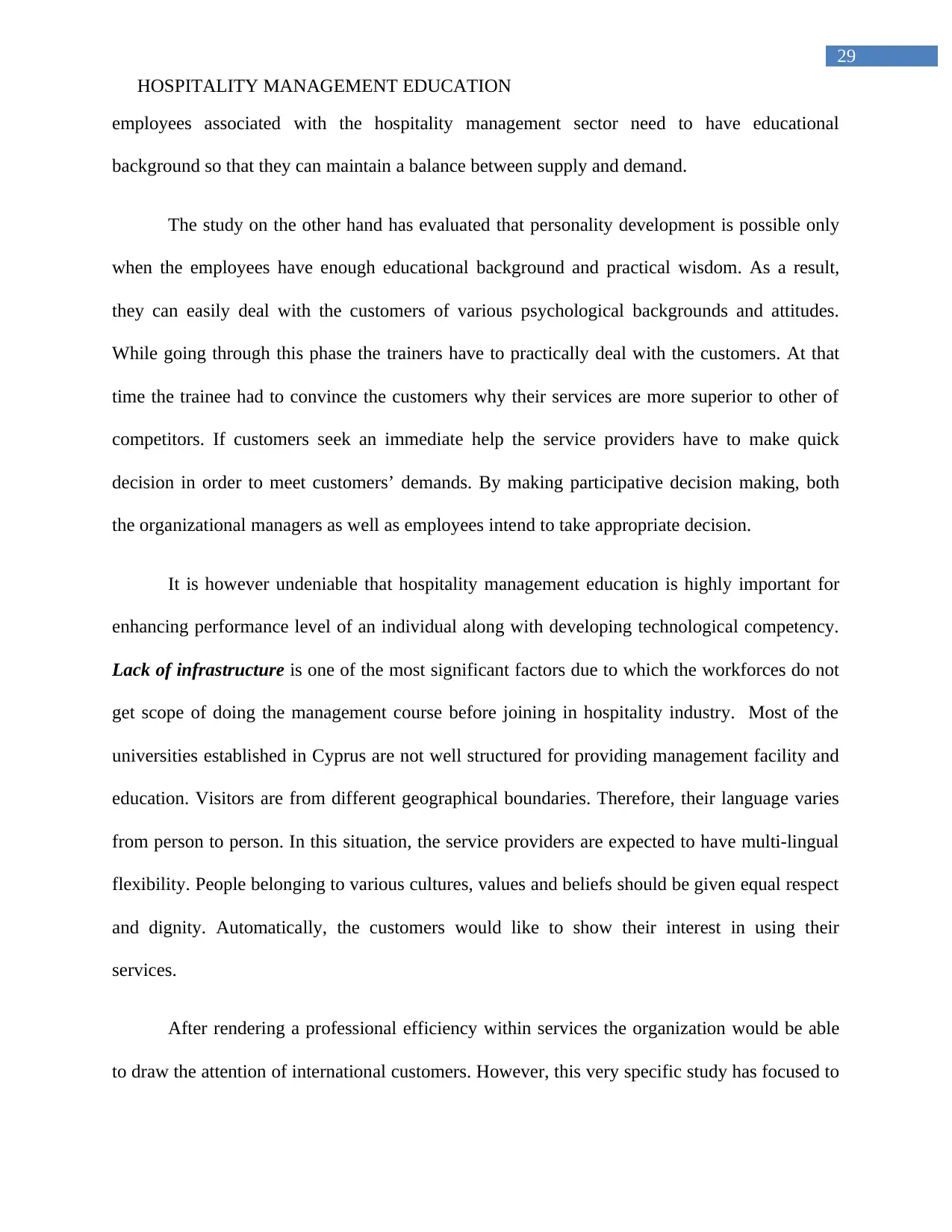
29
HOSPITALITY MANAGEMENT EDUCATION
employees associated with the hospitality management sector need to have educational
background so that they can maintain a balance between supply and demand.
The study on the other hand has evaluated that personality development is possible only
when the employees have enough educational background and practical wisdom. As a result,
they can easily deal with the customers of various psychological backgrounds and attitudes.
While going through this phase the trainers have to practically deal with the customers. At that
time the trainee had to convince the customers why their services are more superior to other of
competitors. If customers seek an immediate help the service providers have to make quick
decision in order to meet customers’ demands. By making participative decision making, both
the organizational managers as well as employees intend to take appropriate decision.
It is however undeniable that hospitality management education is highly important for
enhancing performance level of an individual along with developing technological competency.
Lack of infrastructure is one of the most significant factors due to which the workforces do not
get scope of doing the management course before joining in hospitality industry. Most of the
universities established in Cyprus are not well structured for providing management facility and
education. Visitors are from different geographical boundaries. Therefore, their language varies
from person to person. In this situation, the service providers are expected to have multi-lingual
flexibility. People belonging to various cultures, values and beliefs should be given equal respect
and dignity. Automatically, the customers would like to show their interest in using their
services.
After rendering a professional efficiency within services the organization would be able
to draw the attention of international customers. However, this very specific study has focused to
HOSPITALITY MANAGEMENT EDUCATION
employees associated with the hospitality management sector need to have educational
background so that they can maintain a balance between supply and demand.
The study on the other hand has evaluated that personality development is possible only
when the employees have enough educational background and practical wisdom. As a result,
they can easily deal with the customers of various psychological backgrounds and attitudes.
While going through this phase the trainers have to practically deal with the customers. At that
time the trainee had to convince the customers why their services are more superior to other of
competitors. If customers seek an immediate help the service providers have to make quick
decision in order to meet customers’ demands. By making participative decision making, both
the organizational managers as well as employees intend to take appropriate decision.
It is however undeniable that hospitality management education is highly important for
enhancing performance level of an individual along with developing technological competency.
Lack of infrastructure is one of the most significant factors due to which the workforces do not
get scope of doing the management course before joining in hospitality industry. Most of the
universities established in Cyprus are not well structured for providing management facility and
education. Visitors are from different geographical boundaries. Therefore, their language varies
from person to person. In this situation, the service providers are expected to have multi-lingual
flexibility. People belonging to various cultures, values and beliefs should be given equal respect
and dignity. Automatically, the customers would like to show their interest in using their
services.
After rendering a professional efficiency within services the organization would be able
to draw the attention of international customers. However, this very specific study has focused to
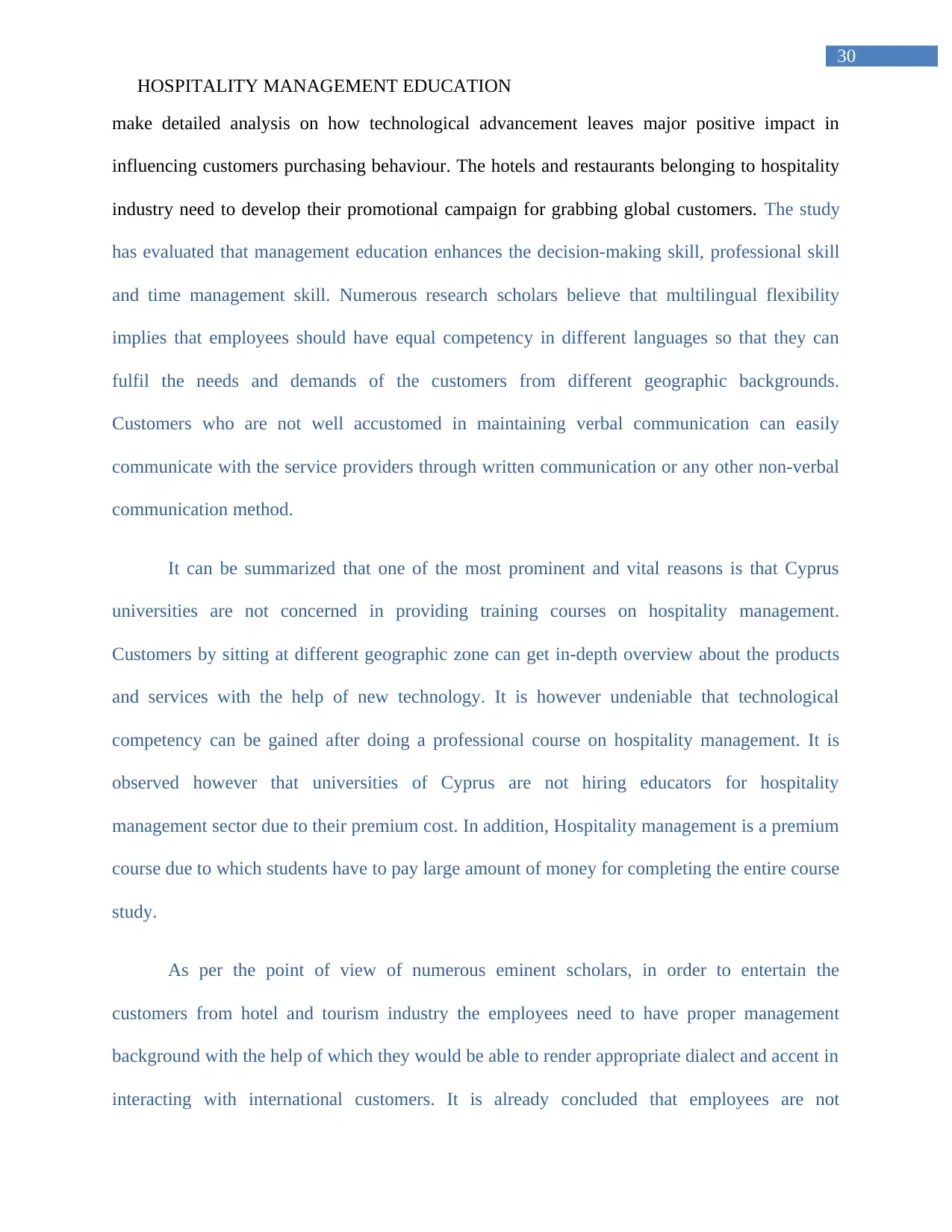
30
HOSPITALITY MANAGEMENT EDUCATION
make detailed analysis on how technological advancement leaves major positive impact in
influencing customers purchasing behaviour. The hotels and restaurants belonging to hospitality
industry need to develop their promotional campaign for grabbing global customers. The study
has evaluated that management education enhances the decision-making skill, professional skill
and time management skill. Numerous research scholars believe that multilingual flexibility
implies that employees should have equal competency in different languages so that they can
fulfil the needs and demands of the customers from different geographic backgrounds.
Customers who are not well accustomed in maintaining verbal communication can easily
communicate with the service providers through written communication or any other non-verbal
communication method.
It can be summarized that one of the most prominent and vital reasons is that Cyprus
universities are not concerned in providing training courses on hospitality management.
Customers by sitting at different geographic zone can get in-depth overview about the products
and services with the help of new technology. It is however undeniable that technological
competency can be gained after doing a professional course on hospitality management. It is
observed however that universities of Cyprus are not hiring educators for hospitality
management sector due to their premium cost. In addition, Hospitality management is a premium
course due to which students have to pay large amount of money for completing the entire course
study.
As per the point of view of numerous eminent scholars, in order to entertain the
customers from hotel and tourism industry the employees need to have proper management
background with the help of which they would be able to render appropriate dialect and accent in
interacting with international customers. It is already concluded that employees are not
HOSPITALITY MANAGEMENT EDUCATION
make detailed analysis on how technological advancement leaves major positive impact in
influencing customers purchasing behaviour. The hotels and restaurants belonging to hospitality
industry need to develop their promotional campaign for grabbing global customers. The study
has evaluated that management education enhances the decision-making skill, professional skill
and time management skill. Numerous research scholars believe that multilingual flexibility
implies that employees should have equal competency in different languages so that they can
fulfil the needs and demands of the customers from different geographic backgrounds.
Customers who are not well accustomed in maintaining verbal communication can easily
communicate with the service providers through written communication or any other non-verbal
communication method.
It can be summarized that one of the most prominent and vital reasons is that Cyprus
universities are not concerned in providing training courses on hospitality management.
Customers by sitting at different geographic zone can get in-depth overview about the products
and services with the help of new technology. It is however undeniable that technological
competency can be gained after doing a professional course on hospitality management. It is
observed however that universities of Cyprus are not hiring educators for hospitality
management sector due to their premium cost. In addition, Hospitality management is a premium
course due to which students have to pay large amount of money for completing the entire course
study.
As per the point of view of numerous eminent scholars, in order to entertain the
customers from hotel and tourism industry the employees need to have proper management
background with the help of which they would be able to render appropriate dialect and accent in
interacting with international customers. It is already concluded that employees are not
Paraphrase This Document
Need a fresh take? Get an instant paraphrase of this document with our AI Paraphraser
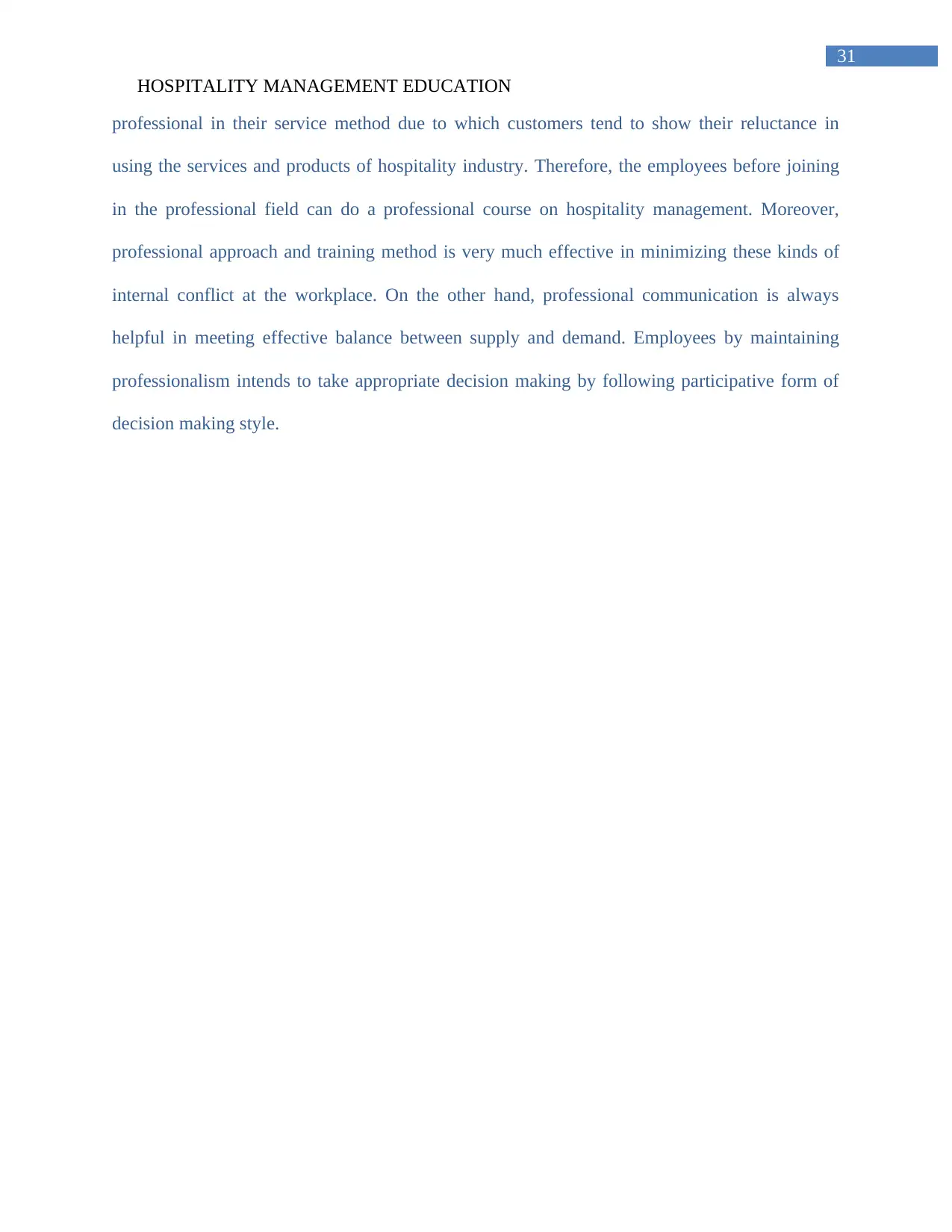
31
HOSPITALITY MANAGEMENT EDUCATION
professional in their service method due to which customers tend to show their reluctance in
using the services and products of hospitality industry. Therefore, the employees before joining
in the professional field can do a professional course on hospitality management. Moreover,
professional approach and training method is very much effective in minimizing these kinds of
internal conflict at the workplace. On the other hand, professional communication is always
helpful in meeting effective balance between supply and demand. Employees by maintaining
professionalism intends to take appropriate decision making by following participative form of
decision making style.
HOSPITALITY MANAGEMENT EDUCATION
professional in their service method due to which customers tend to show their reluctance in
using the services and products of hospitality industry. Therefore, the employees before joining
in the professional field can do a professional course on hospitality management. Moreover,
professional approach and training method is very much effective in minimizing these kinds of
internal conflict at the workplace. On the other hand, professional communication is always
helpful in meeting effective balance between supply and demand. Employees by maintaining
professionalism intends to take appropriate decision making by following participative form of
decision making style.

32
HOSPITALITY MANAGEMENT EDUCATION
Chapter 3: Methodology
3.1 Introduction:
Research methodology is the systematic method of gathering collected data and analyse it
as per the numerous methodological tools. By using different research approach and designs the
study has focused to evaluate the acquired information from various points of views. By
maintaining appropriate data collection method the research would are analyzed from different
perspectives (Mary Converse 2012). With the help of a detailed research plan the researcher has
given an in-depth research schedule along with its activities. In order to gather appropriate data
and information from different reliable and valid resources using appropriate research methods
and its various methodological tools are very much important (Novikov and Novikov 2013. In
order to acquire appropriate knowledge on the importance of hospitality management education
for enhancing the professionalism of business experts the researcher has used different research
methods for gathering logical data from both primary and secondary data resources.
3.2 Research methods and tools:
Research method and tools are primarily used for analysing the gathered data from every
perspective (Novikov 2013). By using those tools the researcher can get the opportunity to
identify why large number of researchers and practitioners has raised their voice on this issue
that this “the importance of hospitality management education in the hospitality workforce,
case study Cyprus on hospitality industry 2018”.
HOSPITALITY MANAGEMENT EDUCATION
Chapter 3: Methodology
3.1 Introduction:
Research methodology is the systematic method of gathering collected data and analyse it
as per the numerous methodological tools. By using different research approach and designs the
study has focused to evaluate the acquired information from various points of views. By
maintaining appropriate data collection method the research would are analyzed from different
perspectives (Mary Converse 2012). With the help of a detailed research plan the researcher has
given an in-depth research schedule along with its activities. In order to gather appropriate data
and information from different reliable and valid resources using appropriate research methods
and its various methodological tools are very much important (Novikov and Novikov 2013. In
order to acquire appropriate knowledge on the importance of hospitality management education
for enhancing the professionalism of business experts the researcher has used different research
methods for gathering logical data from both primary and secondary data resources.
3.2 Research methods and tools:
Research method and tools are primarily used for analysing the gathered data from every
perspective (Novikov 2013). By using those tools the researcher can get the opportunity to
identify why large number of researchers and practitioners has raised their voice on this issue
that this “the importance of hospitality management education in the hospitality workforce,
case study Cyprus on hospitality industry 2018”.
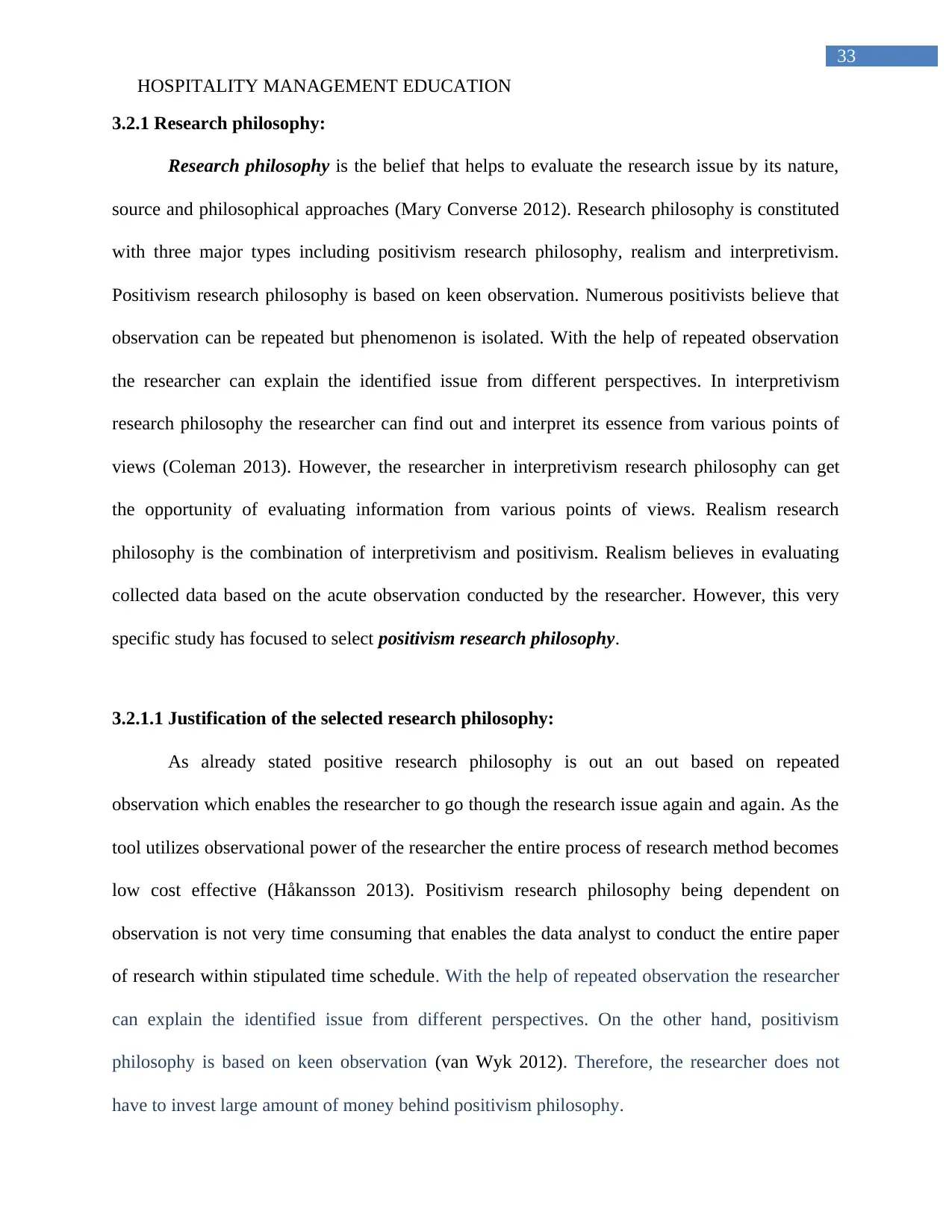
33
HOSPITALITY MANAGEMENT EDUCATION
3.2.1 Research philosophy:
Research philosophy is the belief that helps to evaluate the research issue by its nature,
source and philosophical approaches (Mary Converse 2012). Research philosophy is constituted
with three major types including positivism research philosophy, realism and interpretivism.
Positivism research philosophy is based on keen observation. Numerous positivists believe that
observation can be repeated but phenomenon is isolated. With the help of repeated observation
the researcher can explain the identified issue from different perspectives. In interpretivism
research philosophy the researcher can find out and interpret its essence from various points of
views (Coleman 2013). However, the researcher in interpretivism research philosophy can get
the opportunity of evaluating information from various points of views. Realism research
philosophy is the combination of interpretivism and positivism. Realism believes in evaluating
collected data based on the acute observation conducted by the researcher. However, this very
specific study has focused to select positivism research philosophy.
3.2.1.1 Justification of the selected research philosophy:
As already stated positive research philosophy is out an out based on repeated
observation which enables the researcher to go though the research issue again and again. As the
tool utilizes observational power of the researcher the entire process of research method becomes
low cost effective (Håkansson 2013). Positivism research philosophy being dependent on
observation is not very time consuming that enables the data analyst to conduct the entire paper
of research within stipulated time schedule. With the help of repeated observation the researcher
can explain the identified issue from different perspectives. On the other hand, positivism
philosophy is based on keen observation (van Wyk 2012). Therefore, the researcher does not
have to invest large amount of money behind positivism philosophy.
HOSPITALITY MANAGEMENT EDUCATION
3.2.1 Research philosophy:
Research philosophy is the belief that helps to evaluate the research issue by its nature,
source and philosophical approaches (Mary Converse 2012). Research philosophy is constituted
with three major types including positivism research philosophy, realism and interpretivism.
Positivism research philosophy is based on keen observation. Numerous positivists believe that
observation can be repeated but phenomenon is isolated. With the help of repeated observation
the researcher can explain the identified issue from different perspectives. In interpretivism
research philosophy the researcher can find out and interpret its essence from various points of
views (Coleman 2013). However, the researcher in interpretivism research philosophy can get
the opportunity of evaluating information from various points of views. Realism research
philosophy is the combination of interpretivism and positivism. Realism believes in evaluating
collected data based on the acute observation conducted by the researcher. However, this very
specific study has focused to select positivism research philosophy.
3.2.1.1 Justification of the selected research philosophy:
As already stated positive research philosophy is out an out based on repeated
observation which enables the researcher to go though the research issue again and again. As the
tool utilizes observational power of the researcher the entire process of research method becomes
low cost effective (Håkansson 2013). Positivism research philosophy being dependent on
observation is not very time consuming that enables the data analyst to conduct the entire paper
of research within stipulated time schedule. With the help of repeated observation the researcher
can explain the identified issue from different perspectives. On the other hand, positivism
philosophy is based on keen observation (van Wyk 2012). Therefore, the researcher does not
have to invest large amount of money behind positivism philosophy.
Secure Best Marks with AI Grader
Need help grading? Try our AI Grader for instant feedback on your assignments.
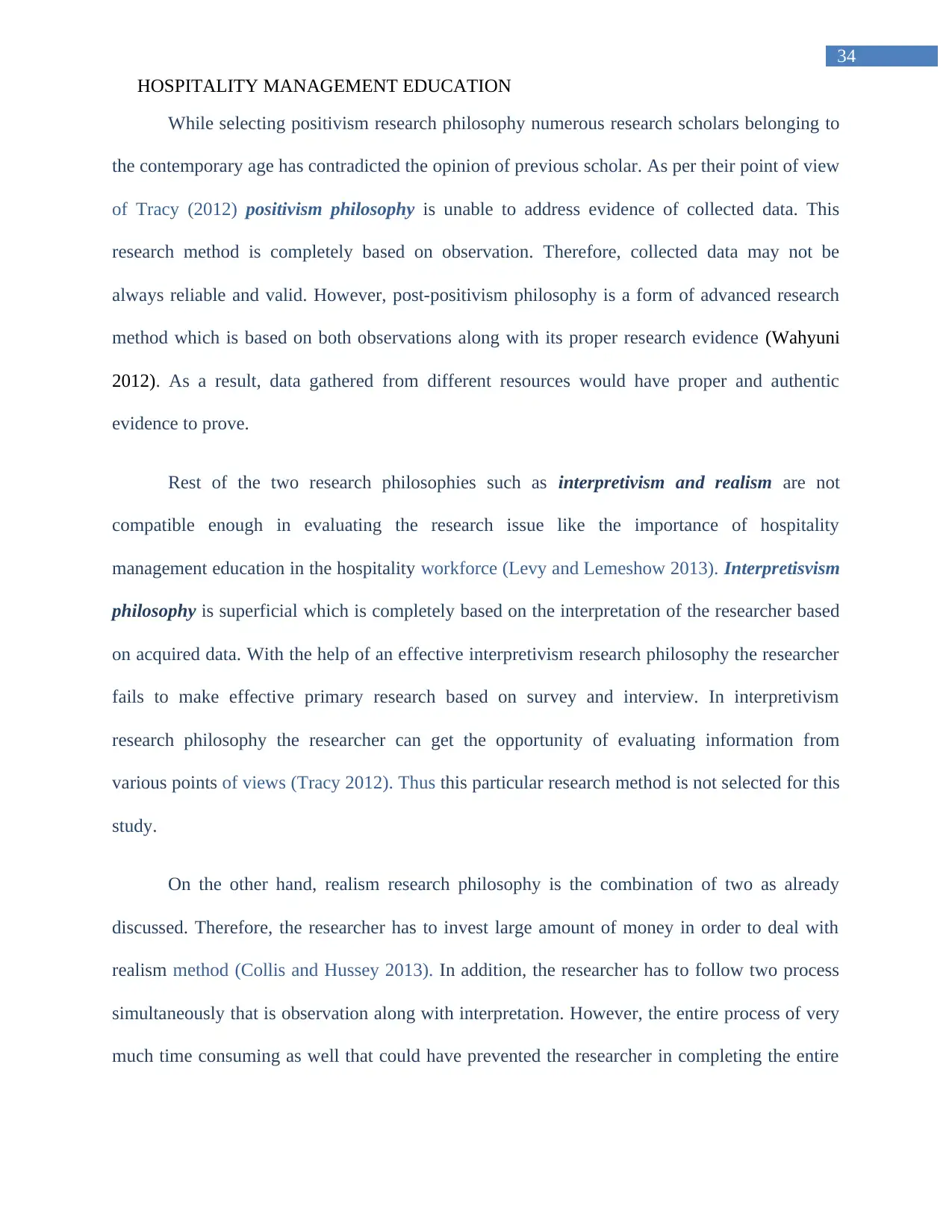
34
HOSPITALITY MANAGEMENT EDUCATION
While selecting positivism research philosophy numerous research scholars belonging to
the contemporary age has contradicted the opinion of previous scholar. As per their point of view
of Tracy (2012) positivism philosophy is unable to address evidence of collected data. This
research method is completely based on observation. Therefore, collected data may not be
always reliable and valid. However, post-positivism philosophy is a form of advanced research
method which is based on both observations along with its proper research evidence (Wahyuni
2012). As a result, data gathered from different resources would have proper and authentic
evidence to prove.
Rest of the two research philosophies such as interpretivism and realism are not
compatible enough in evaluating the research issue like the importance of hospitality
management education in the hospitality workforce (Levy and Lemeshow 2013). Interpretisvism
philosophy is superficial which is completely based on the interpretation of the researcher based
on acquired data. With the help of an effective interpretivism research philosophy the researcher
fails to make effective primary research based on survey and interview. In interpretivism
research philosophy the researcher can get the opportunity of evaluating information from
various points of views (Tracy 2012). Thus this particular research method is not selected for this
study.
On the other hand, realism research philosophy is the combination of two as already
discussed. Therefore, the researcher has to invest large amount of money in order to deal with
realism method (Collis and Hussey 2013). In addition, the researcher has to follow two process
simultaneously that is observation along with interpretation. However, the entire process of very
much time consuming as well that could have prevented the researcher in completing the entire
HOSPITALITY MANAGEMENT EDUCATION
While selecting positivism research philosophy numerous research scholars belonging to
the contemporary age has contradicted the opinion of previous scholar. As per their point of view
of Tracy (2012) positivism philosophy is unable to address evidence of collected data. This
research method is completely based on observation. Therefore, collected data may not be
always reliable and valid. However, post-positivism philosophy is a form of advanced research
method which is based on both observations along with its proper research evidence (Wahyuni
2012). As a result, data gathered from different resources would have proper and authentic
evidence to prove.
Rest of the two research philosophies such as interpretivism and realism are not
compatible enough in evaluating the research issue like the importance of hospitality
management education in the hospitality workforce (Levy and Lemeshow 2013). Interpretisvism
philosophy is superficial which is completely based on the interpretation of the researcher based
on acquired data. With the help of an effective interpretivism research philosophy the researcher
fails to make effective primary research based on survey and interview. In interpretivism
research philosophy the researcher can get the opportunity of evaluating information from
various points of views (Tracy 2012). Thus this particular research method is not selected for this
study.
On the other hand, realism research philosophy is the combination of two as already
discussed. Therefore, the researcher has to invest large amount of money in order to deal with
realism method (Collis and Hussey 2013). In addition, the researcher has to follow two process
simultaneously that is observation along with interpretation. However, the entire process of very
much time consuming as well that could have prevented the researcher in completing the entire
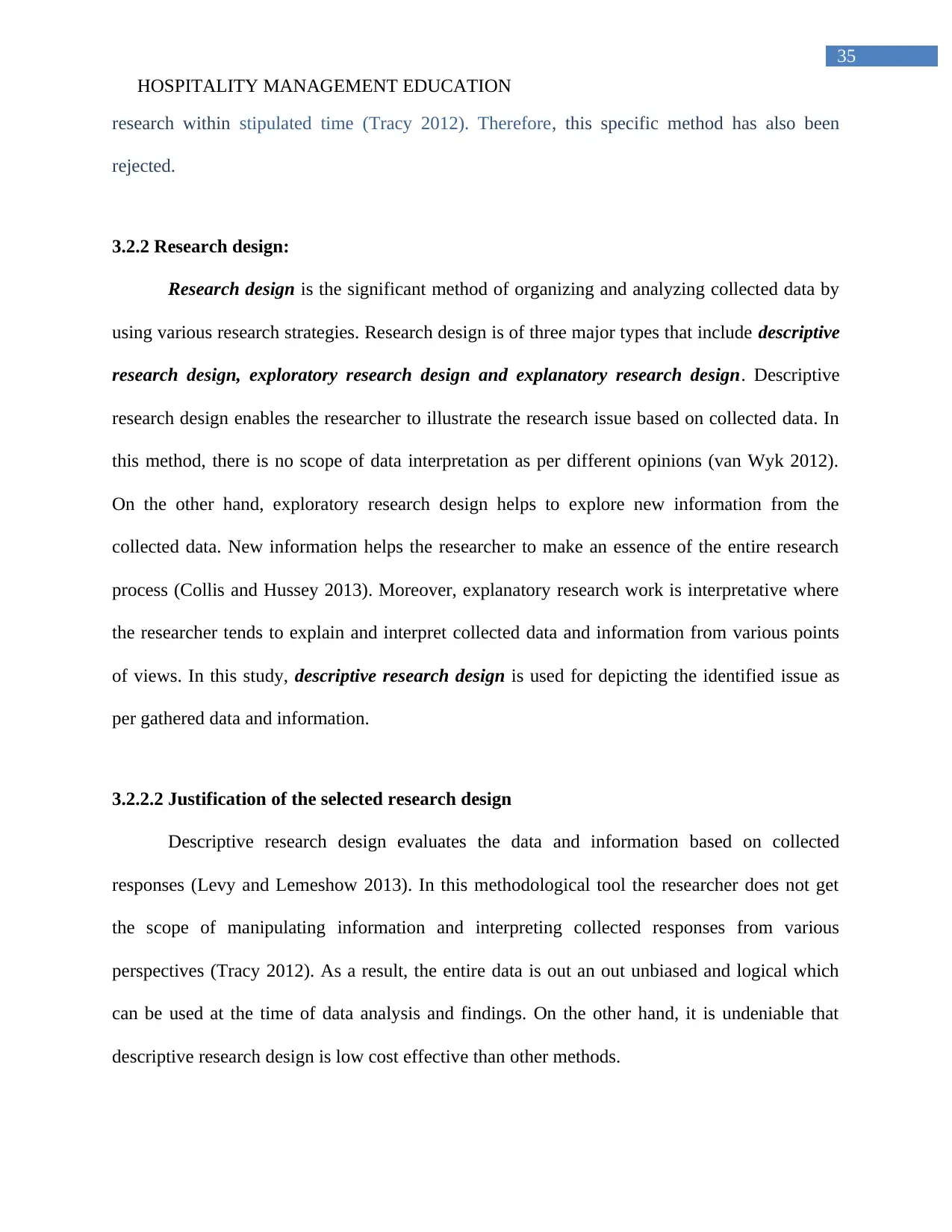
35
HOSPITALITY MANAGEMENT EDUCATION
research within stipulated time (Tracy 2012). Therefore, this specific method has also been
rejected.
3.2.2 Research design:
Research design is the significant method of organizing and analyzing collected data by
using various research strategies. Research design is of three major types that include descriptive
research design, exploratory research design and explanatory research design. Descriptive
research design enables the researcher to illustrate the research issue based on collected data. In
this method, there is no scope of data interpretation as per different opinions (van Wyk 2012).
On the other hand, exploratory research design helps to explore new information from the
collected data. New information helps the researcher to make an essence of the entire research
process (Collis and Hussey 2013). Moreover, explanatory research work is interpretative where
the researcher tends to explain and interpret collected data and information from various points
of views. In this study, descriptive research design is used for depicting the identified issue as
per gathered data and information.
3.2.2.2 Justification of the selected research design
Descriptive research design evaluates the data and information based on collected
responses (Levy and Lemeshow 2013). In this methodological tool the researcher does not get
the scope of manipulating information and interpreting collected responses from various
perspectives (Tracy 2012). As a result, the entire data is out an out unbiased and logical which
can be used at the time of data analysis and findings. On the other hand, it is undeniable that
descriptive research design is low cost effective than other methods.
HOSPITALITY MANAGEMENT EDUCATION
research within stipulated time (Tracy 2012). Therefore, this specific method has also been
rejected.
3.2.2 Research design:
Research design is the significant method of organizing and analyzing collected data by
using various research strategies. Research design is of three major types that include descriptive
research design, exploratory research design and explanatory research design. Descriptive
research design enables the researcher to illustrate the research issue based on collected data. In
this method, there is no scope of data interpretation as per different opinions (van Wyk 2012).
On the other hand, exploratory research design helps to explore new information from the
collected data. New information helps the researcher to make an essence of the entire research
process (Collis and Hussey 2013). Moreover, explanatory research work is interpretative where
the researcher tends to explain and interpret collected data and information from various points
of views. In this study, descriptive research design is used for depicting the identified issue as
per gathered data and information.
3.2.2.2 Justification of the selected research design
Descriptive research design evaluates the data and information based on collected
responses (Levy and Lemeshow 2013). In this methodological tool the researcher does not get
the scope of manipulating information and interpreting collected responses from various
perspectives (Tracy 2012). As a result, the entire data is out an out unbiased and logical which
can be used at the time of data analysis and findings. On the other hand, it is undeniable that
descriptive research design is low cost effective than other methods.

36
HOSPITALITY MANAGEMENT EDUCATION
If a comparative analysis can be conducted among three consecutive research methods it
can be concluded that exploratory and explanatory are not suitable for this particular research
issue (Bryman and Bell 2015). It is said that exploratory research design helps to explore new
information from the collected data. On the other hand, explanatory research work is
interpretative where the researcher tends to explain and interpret collected data and information
from various points of views. In order to explore new data and information the researcher has to
justify the authentication of that information which is explored (Etikan, Musa and Alkassim
2016). This method is out an out time consuming. In addition, exploratory research work enables
the researcher in analysing collected information based on the existing case study. The researcher
has not selected this procedure due to its long term method.
Explanatory research method is very much effective for secondary data analysis
(Wahyuni 2012). In order to conduct effective analysis of research issue the researcher has to
focus on secondary source of data method. As this very specific study is entirely based on both
primary and secondary source of data collection technique the researcher has not selected
explanatory research design for completing this study.
3.2.3 Research approach
Research approach is the systematic method of collecting appropriate data based on
theories and conceptual framework, be it new or existing (Håkansson 2013). Research approach
is classified into two major types including deductive approach and inductive approach (Collis
and Hussey 2013). Deductive approach enables the researcher in gathering information based on
the existing theory already discussed in the literature review part. On the other hand, inductive
HOSPITALITY MANAGEMENT EDUCATION
If a comparative analysis can be conducted among three consecutive research methods it
can be concluded that exploratory and explanatory are not suitable for this particular research
issue (Bryman and Bell 2015). It is said that exploratory research design helps to explore new
information from the collected data. On the other hand, explanatory research work is
interpretative where the researcher tends to explain and interpret collected data and information
from various points of views. In order to explore new data and information the researcher has to
justify the authentication of that information which is explored (Etikan, Musa and Alkassim
2016). This method is out an out time consuming. In addition, exploratory research work enables
the researcher in analysing collected information based on the existing case study. The researcher
has not selected this procedure due to its long term method.
Explanatory research method is very much effective for secondary data analysis
(Wahyuni 2012). In order to conduct effective analysis of research issue the researcher has to
focus on secondary source of data method. As this very specific study is entirely based on both
primary and secondary source of data collection technique the researcher has not selected
explanatory research design for completing this study.
3.2.3 Research approach
Research approach is the systematic method of collecting appropriate data based on
theories and conceptual framework, be it new or existing (Håkansson 2013). Research approach
is classified into two major types including deductive approach and inductive approach (Collis
and Hussey 2013). Deductive approach enables the researcher in gathering information based on
the existing theory already discussed in the literature review part. On the other hand, inductive
Paraphrase This Document
Need a fresh take? Get an instant paraphrase of this document with our AI Paraphraser

37
HOSPITALITY MANAGEMENT EDUCATION
research approach is based on new theories (Smith 2015). This very specific study has selected
deductive research approach for completing the entire process work successfully.
3.2.3.3 Justification of selected research approach:
Deductive research approach has focused to collect relevant information based on the
existing theory (Mary Converse 2012). While evaluating the theories and conceptual framework
the researcher has to go through various case studies for analyzing the importance of hospitality
management education in the hospitality workforce. Deductive approach helped the researcher
in evaluating the case study on how hospitality education and training enables an individual
employee to deliver proper services (Wahyuni 2012). Based on numerous learning theories and
interactive approach the researcher has evaluated on how professional training and educational
background is effective enough in enhancing the performance level of an individual employee.
At the same time, the researcher by using deductive approach has decided to analyze the factors
that prevent the employees in receiving hospitality education properly.
This very specific research study has not selected inductive research approach due to
some of the most specific reasons. Firstly, inductive research approach is completely based on
new theories that the researcher explores for evaluating research issue (Wahyuni 2012). The new
invented theory may not have proper database based on which research issue can be evaluated
from numerous point of views. On the other hand, inductive theory is complicated to analyze for
a researcher in getting appropriate response regarding the research issue (Collis and Hussey).
However, these are the two reasons due to which inductive research approach has been rejected
and deductive approach is selected for data evaluation.
HOSPITALITY MANAGEMENT EDUCATION
research approach is based on new theories (Smith 2015). This very specific study has selected
deductive research approach for completing the entire process work successfully.
3.2.3.3 Justification of selected research approach:
Deductive research approach has focused to collect relevant information based on the
existing theory (Mary Converse 2012). While evaluating the theories and conceptual framework
the researcher has to go through various case studies for analyzing the importance of hospitality
management education in the hospitality workforce. Deductive approach helped the researcher
in evaluating the case study on how hospitality education and training enables an individual
employee to deliver proper services (Wahyuni 2012). Based on numerous learning theories and
interactive approach the researcher has evaluated on how professional training and educational
background is effective enough in enhancing the performance level of an individual employee.
At the same time, the researcher by using deductive approach has decided to analyze the factors
that prevent the employees in receiving hospitality education properly.
This very specific research study has not selected inductive research approach due to
some of the most specific reasons. Firstly, inductive research approach is completely based on
new theories that the researcher explores for evaluating research issue (Wahyuni 2012). The new
invented theory may not have proper database based on which research issue can be evaluated
from numerous point of views. On the other hand, inductive theory is complicated to analyze for
a researcher in getting appropriate response regarding the research issue (Collis and Hussey).
However, these are the two reasons due to which inductive research approach has been rejected
and deductive approach is selected for data evaluation.
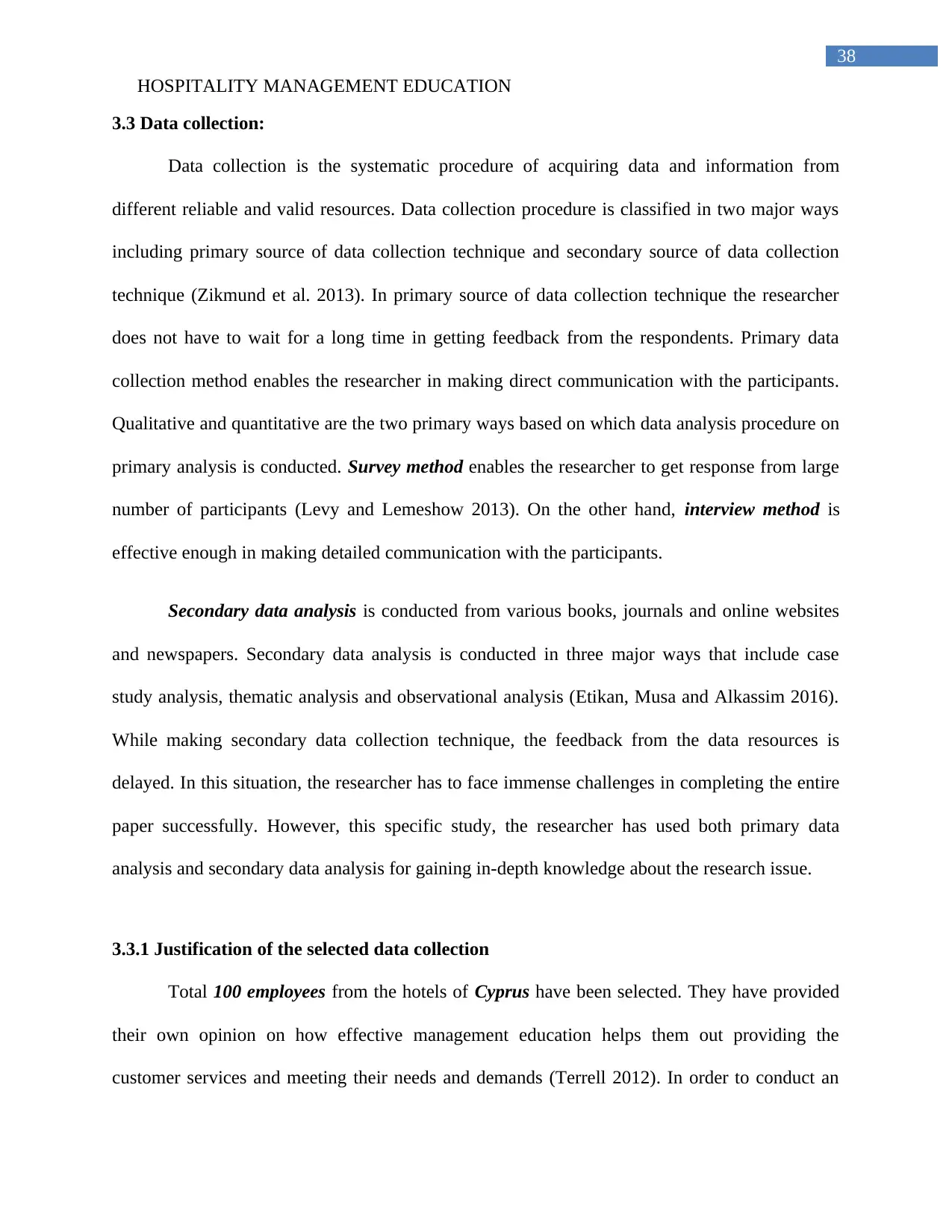
38
HOSPITALITY MANAGEMENT EDUCATION
3.3 Data collection:
Data collection is the systematic procedure of acquiring data and information from
different reliable and valid resources. Data collection procedure is classified in two major ways
including primary source of data collection technique and secondary source of data collection
technique (Zikmund et al. 2013). In primary source of data collection technique the researcher
does not have to wait for a long time in getting feedback from the respondents. Primary data
collection method enables the researcher in making direct communication with the participants.
Qualitative and quantitative are the two primary ways based on which data analysis procedure on
primary analysis is conducted. Survey method enables the researcher to get response from large
number of participants (Levy and Lemeshow 2013). On the other hand, interview method is
effective enough in making detailed communication with the participants.
Secondary data analysis is conducted from various books, journals and online websites
and newspapers. Secondary data analysis is conducted in three major ways that include case
study analysis, thematic analysis and observational analysis (Etikan, Musa and Alkassim 2016).
While making secondary data collection technique, the feedback from the data resources is
delayed. In this situation, the researcher has to face immense challenges in completing the entire
paper successfully. However, this specific study, the researcher has used both primary data
analysis and secondary data analysis for gaining in-depth knowledge about the research issue.
3.3.1 Justification of the selected data collection
Total 100 employees from the hotels of Cyprus have been selected. They have provided
their own opinion on how effective management education helps them out providing the
customer services and meeting their needs and demands (Terrell 2012). In order to conduct an
HOSPITALITY MANAGEMENT EDUCATION
3.3 Data collection:
Data collection is the systematic procedure of acquiring data and information from
different reliable and valid resources. Data collection procedure is classified in two major ways
including primary source of data collection technique and secondary source of data collection
technique (Zikmund et al. 2013). In primary source of data collection technique the researcher
does not have to wait for a long time in getting feedback from the respondents. Primary data
collection method enables the researcher in making direct communication with the participants.
Qualitative and quantitative are the two primary ways based on which data analysis procedure on
primary analysis is conducted. Survey method enables the researcher to get response from large
number of participants (Levy and Lemeshow 2013). On the other hand, interview method is
effective enough in making detailed communication with the participants.
Secondary data analysis is conducted from various books, journals and online websites
and newspapers. Secondary data analysis is conducted in three major ways that include case
study analysis, thematic analysis and observational analysis (Etikan, Musa and Alkassim 2016).
While making secondary data collection technique, the feedback from the data resources is
delayed. In this situation, the researcher has to face immense challenges in completing the entire
paper successfully. However, this specific study, the researcher has used both primary data
analysis and secondary data analysis for gaining in-depth knowledge about the research issue.
3.3.1 Justification of the selected data collection
Total 100 employees from the hotels of Cyprus have been selected. They have provided
their own opinion on how effective management education helps them out providing the
customer services and meeting their needs and demands (Terrell 2012). In order to conduct an
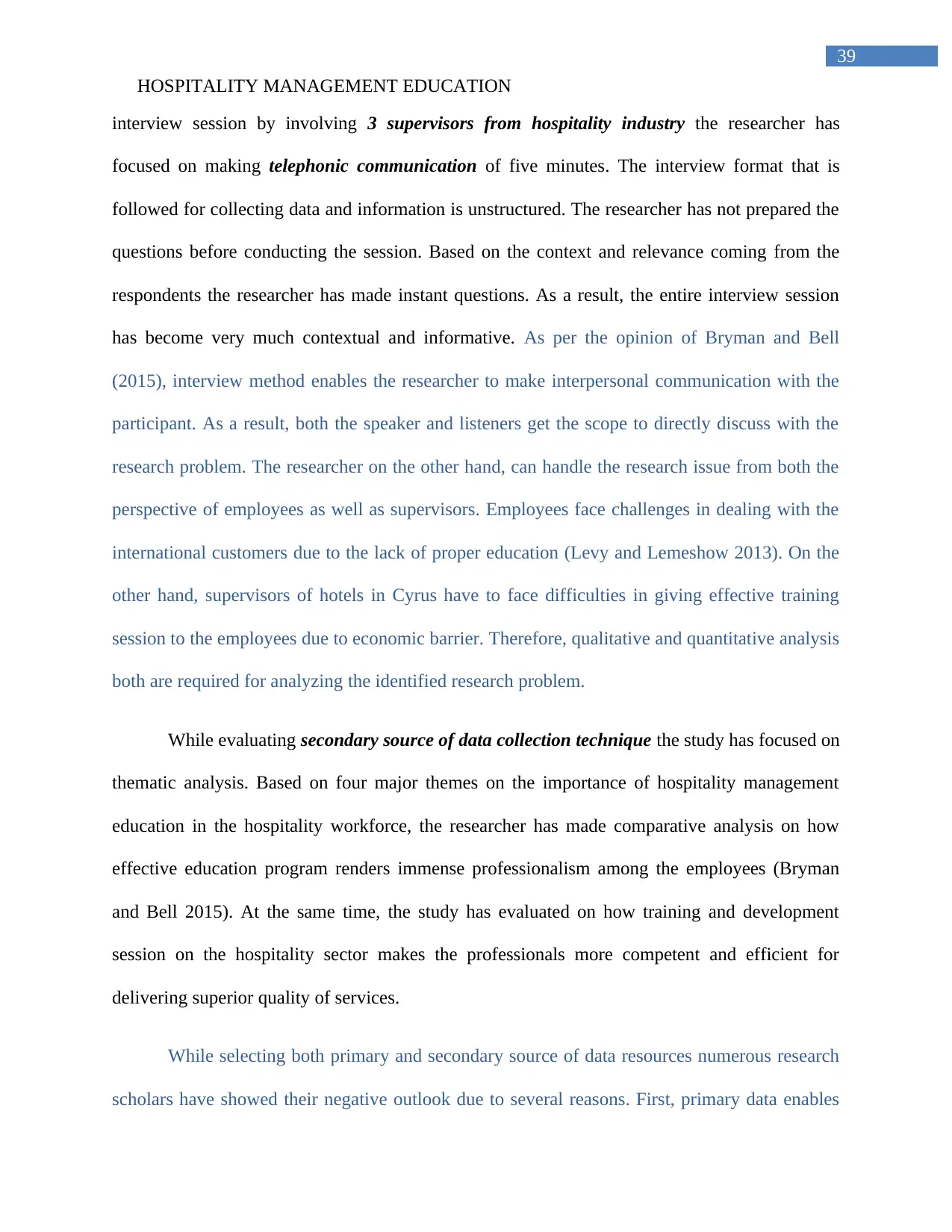
39
HOSPITALITY MANAGEMENT EDUCATION
interview session by involving 3 supervisors from hospitality industry the researcher has
focused on making telephonic communication of five minutes. The interview format that is
followed for collecting data and information is unstructured. The researcher has not prepared the
questions before conducting the session. Based on the context and relevance coming from the
respondents the researcher has made instant questions. As a result, the entire interview session
has become very much contextual and informative. As per the opinion of Bryman and Bell
(2015), interview method enables the researcher to make interpersonal communication with the
participant. As a result, both the speaker and listeners get the scope to directly discuss with the
research problem. The researcher on the other hand, can handle the research issue from both the
perspective of employees as well as supervisors. Employees face challenges in dealing with the
international customers due to the lack of proper education (Levy and Lemeshow 2013). On the
other hand, supervisors of hotels in Cyrus have to face difficulties in giving effective training
session to the employees due to economic barrier. Therefore, qualitative and quantitative analysis
both are required for analyzing the identified research problem.
While evaluating secondary source of data collection technique the study has focused on
thematic analysis. Based on four major themes on the importance of hospitality management
education in the hospitality workforce, the researcher has made comparative analysis on how
effective education program renders immense professionalism among the employees (Bryman
and Bell 2015). At the same time, the study has evaluated on how training and development
session on the hospitality sector makes the professionals more competent and efficient for
delivering superior quality of services.
While selecting both primary and secondary source of data resources numerous research
scholars have showed their negative outlook due to several reasons. First, primary data enables
HOSPITALITY MANAGEMENT EDUCATION
interview session by involving 3 supervisors from hospitality industry the researcher has
focused on making telephonic communication of five minutes. The interview format that is
followed for collecting data and information is unstructured. The researcher has not prepared the
questions before conducting the session. Based on the context and relevance coming from the
respondents the researcher has made instant questions. As a result, the entire interview session
has become very much contextual and informative. As per the opinion of Bryman and Bell
(2015), interview method enables the researcher to make interpersonal communication with the
participant. As a result, both the speaker and listeners get the scope to directly discuss with the
research problem. The researcher on the other hand, can handle the research issue from both the
perspective of employees as well as supervisors. Employees face challenges in dealing with the
international customers due to the lack of proper education (Levy and Lemeshow 2013). On the
other hand, supervisors of hotels in Cyrus have to face difficulties in giving effective training
session to the employees due to economic barrier. Therefore, qualitative and quantitative analysis
both are required for analyzing the identified research problem.
While evaluating secondary source of data collection technique the study has focused on
thematic analysis. Based on four major themes on the importance of hospitality management
education in the hospitality workforce, the researcher has made comparative analysis on how
effective education program renders immense professionalism among the employees (Bryman
and Bell 2015). At the same time, the study has evaluated on how training and development
session on the hospitality sector makes the professionals more competent and efficient for
delivering superior quality of services.
While selecting both primary and secondary source of data resources numerous research
scholars have showed their negative outlook due to several reasons. First, primary data enables
Secure Best Marks with AI Grader
Need help grading? Try our AI Grader for instant feedback on your assignments.
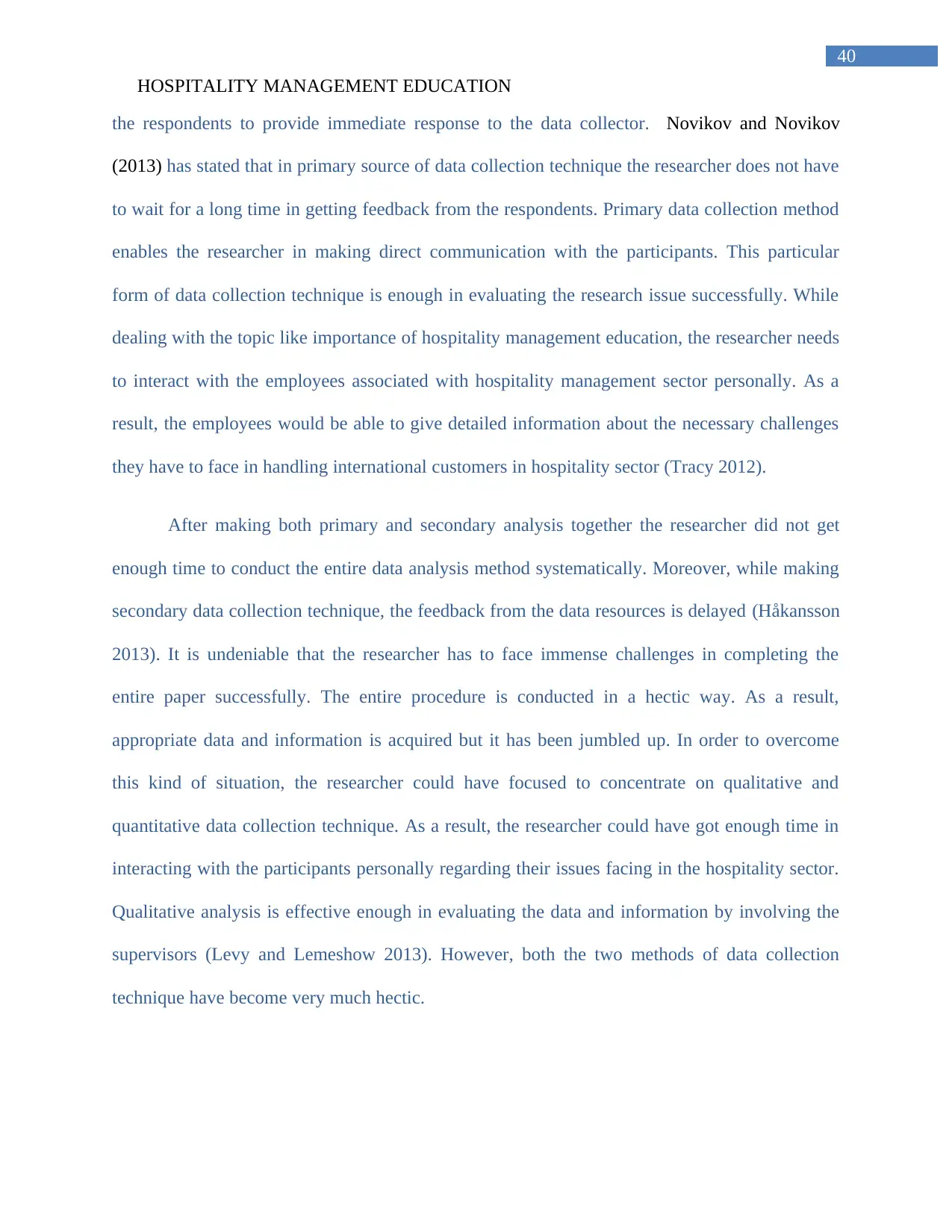
40
HOSPITALITY MANAGEMENT EDUCATION
the respondents to provide immediate response to the data collector. Novikov and Novikov
(2013) has stated that in primary source of data collection technique the researcher does not have
to wait for a long time in getting feedback from the respondents. Primary data collection method
enables the researcher in making direct communication with the participants. This particular
form of data collection technique is enough in evaluating the research issue successfully. While
dealing with the topic like importance of hospitality management education, the researcher needs
to interact with the employees associated with hospitality management sector personally. As a
result, the employees would be able to give detailed information about the necessary challenges
they have to face in handling international customers in hospitality sector (Tracy 2012).
After making both primary and secondary analysis together the researcher did not get
enough time to conduct the entire data analysis method systematically. Moreover, while making
secondary data collection technique, the feedback from the data resources is delayed (Håkansson
2013). It is undeniable that the researcher has to face immense challenges in completing the
entire paper successfully. The entire procedure is conducted in a hectic way. As a result,
appropriate data and information is acquired but it has been jumbled up. In order to overcome
this kind of situation, the researcher could have focused to concentrate on qualitative and
quantitative data collection technique. As a result, the researcher could have got enough time in
interacting with the participants personally regarding their issues facing in the hospitality sector.
Qualitative analysis is effective enough in evaluating the data and information by involving the
supervisors (Levy and Lemeshow 2013). However, both the two methods of data collection
technique have become very much hectic.
HOSPITALITY MANAGEMENT EDUCATION
the respondents to provide immediate response to the data collector. Novikov and Novikov
(2013) has stated that in primary source of data collection technique the researcher does not have
to wait for a long time in getting feedback from the respondents. Primary data collection method
enables the researcher in making direct communication with the participants. This particular
form of data collection technique is enough in evaluating the research issue successfully. While
dealing with the topic like importance of hospitality management education, the researcher needs
to interact with the employees associated with hospitality management sector personally. As a
result, the employees would be able to give detailed information about the necessary challenges
they have to face in handling international customers in hospitality sector (Tracy 2012).
After making both primary and secondary analysis together the researcher did not get
enough time to conduct the entire data analysis method systematically. Moreover, while making
secondary data collection technique, the feedback from the data resources is delayed (Håkansson
2013). It is undeniable that the researcher has to face immense challenges in completing the
entire paper successfully. The entire procedure is conducted in a hectic way. As a result,
appropriate data and information is acquired but it has been jumbled up. In order to overcome
this kind of situation, the researcher could have focused to concentrate on qualitative and
quantitative data collection technique. As a result, the researcher could have got enough time in
interacting with the participants personally regarding their issues facing in the hospitality sector.
Qualitative analysis is effective enough in evaluating the data and information by involving the
supervisors (Levy and Lemeshow 2013). However, both the two methods of data collection
technique have become very much hectic.

41
HOSPITALITY MANAGEMENT EDUCATION
3.4 Sampling methods:
Sampling method is the procedure of collecting appropriate data and information from
stipulated number of people amidst large population. Sampling method is primarily constituted
with two major types. These include probability sampling technique and non-probability
sampling technique. Probability sampling method is the random procedure where the researcher
does not specific participants for gathering responses (Terrell 2012). On the other hand, non-
probability sampling technique enables the researcher to collect appropriate information from
specific group of people. In this very specific study, the researcher has used non-probability
sampling technique for conducting the entire research successfully.
While implementing non-probability sampling technique, the researcher intends to
involve the participants directly associated with the research issue. Importance of hospitality
management education in the hospitality workforce is the primary research problem (Wahyuni
2012). Therefore, in quest of collecting appropriate data the study has focused to involve those
employees who are associated with the customer service department of hospitality sector. They
have shown their own views on how the customer service associates get benefits and facilities
after receiving hospitality management training and education. Total 156 sampling size is
collected for gathering data among which 100 respondents have showed their interest in
providing responses in the data collection method.
At the same time, non-probability sampling technique is possessed with numerous
negative impacts as well. Non-probability sampling technique enables the researcher in selecting
specific number of people who are associated with the research issue. As a result, there is a
major scope and opportunity of providing biased response in non-probability sampling
technique. Håkansson (2013) stated that probability sampling method is effective enough in
HOSPITALITY MANAGEMENT EDUCATION
3.4 Sampling methods:
Sampling method is the procedure of collecting appropriate data and information from
stipulated number of people amidst large population. Sampling method is primarily constituted
with two major types. These include probability sampling technique and non-probability
sampling technique. Probability sampling method is the random procedure where the researcher
does not specific participants for gathering responses (Terrell 2012). On the other hand, non-
probability sampling technique enables the researcher to collect appropriate information from
specific group of people. In this very specific study, the researcher has used non-probability
sampling technique for conducting the entire research successfully.
While implementing non-probability sampling technique, the researcher intends to
involve the participants directly associated with the research issue. Importance of hospitality
management education in the hospitality workforce is the primary research problem (Wahyuni
2012). Therefore, in quest of collecting appropriate data the study has focused to involve those
employees who are associated with the customer service department of hospitality sector. They
have shown their own views on how the customer service associates get benefits and facilities
after receiving hospitality management training and education. Total 156 sampling size is
collected for gathering data among which 100 respondents have showed their interest in
providing responses in the data collection method.
At the same time, non-probability sampling technique is possessed with numerous
negative impacts as well. Non-probability sampling technique enables the researcher in selecting
specific number of people who are associated with the research issue. As a result, there is a
major scope and opportunity of providing biased response in non-probability sampling
technique. Håkansson (2013) stated that probability sampling method is effective enough in
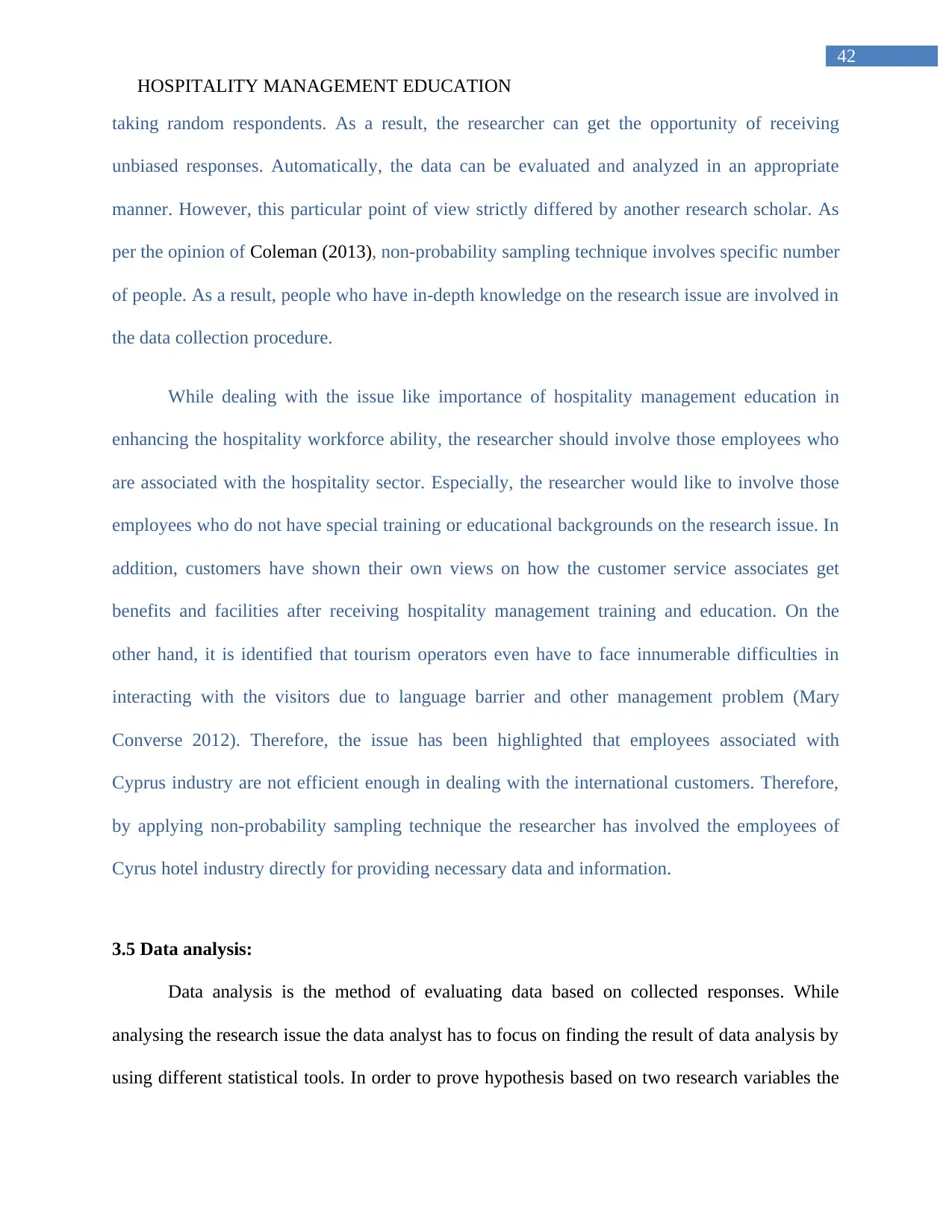
42
HOSPITALITY MANAGEMENT EDUCATION
taking random respondents. As a result, the researcher can get the opportunity of receiving
unbiased responses. Automatically, the data can be evaluated and analyzed in an appropriate
manner. However, this particular point of view strictly differed by another research scholar. As
per the opinion of Coleman (2013), non-probability sampling technique involves specific number
of people. As a result, people who have in-depth knowledge on the research issue are involved in
the data collection procedure.
While dealing with the issue like importance of hospitality management education in
enhancing the hospitality workforce ability, the researcher should involve those employees who
are associated with the hospitality sector. Especially, the researcher would like to involve those
employees who do not have special training or educational backgrounds on the research issue. In
addition, customers have shown their own views on how the customer service associates get
benefits and facilities after receiving hospitality management training and education. On the
other hand, it is identified that tourism operators even have to face innumerable difficulties in
interacting with the visitors due to language barrier and other management problem (Mary
Converse 2012). Therefore, the issue has been highlighted that employees associated with
Cyprus industry are not efficient enough in dealing with the international customers. Therefore,
by applying non-probability sampling technique the researcher has involved the employees of
Cyrus hotel industry directly for providing necessary data and information.
3.5 Data analysis:
Data analysis is the method of evaluating data based on collected responses. While
analysing the research issue the data analyst has to focus on finding the result of data analysis by
using different statistical tools. In order to prove hypothesis based on two research variables the
HOSPITALITY MANAGEMENT EDUCATION
taking random respondents. As a result, the researcher can get the opportunity of receiving
unbiased responses. Automatically, the data can be evaluated and analyzed in an appropriate
manner. However, this particular point of view strictly differed by another research scholar. As
per the opinion of Coleman (2013), non-probability sampling technique involves specific number
of people. As a result, people who have in-depth knowledge on the research issue are involved in
the data collection procedure.
While dealing with the issue like importance of hospitality management education in
enhancing the hospitality workforce ability, the researcher should involve those employees who
are associated with the hospitality sector. Especially, the researcher would like to involve those
employees who do not have special training or educational backgrounds on the research issue. In
addition, customers have shown their own views on how the customer service associates get
benefits and facilities after receiving hospitality management training and education. On the
other hand, it is identified that tourism operators even have to face innumerable difficulties in
interacting with the visitors due to language barrier and other management problem (Mary
Converse 2012). Therefore, the issue has been highlighted that employees associated with
Cyprus industry are not efficient enough in dealing with the international customers. Therefore,
by applying non-probability sampling technique the researcher has involved the employees of
Cyrus hotel industry directly for providing necessary data and information.
3.5 Data analysis:
Data analysis is the method of evaluating data based on collected responses. While
analysing the research issue the data analyst has to focus on finding the result of data analysis by
using different statistical tools. In order to prove hypothesis based on two research variables the
Paraphrase This Document
Need a fresh take? Get an instant paraphrase of this document with our AI Paraphraser
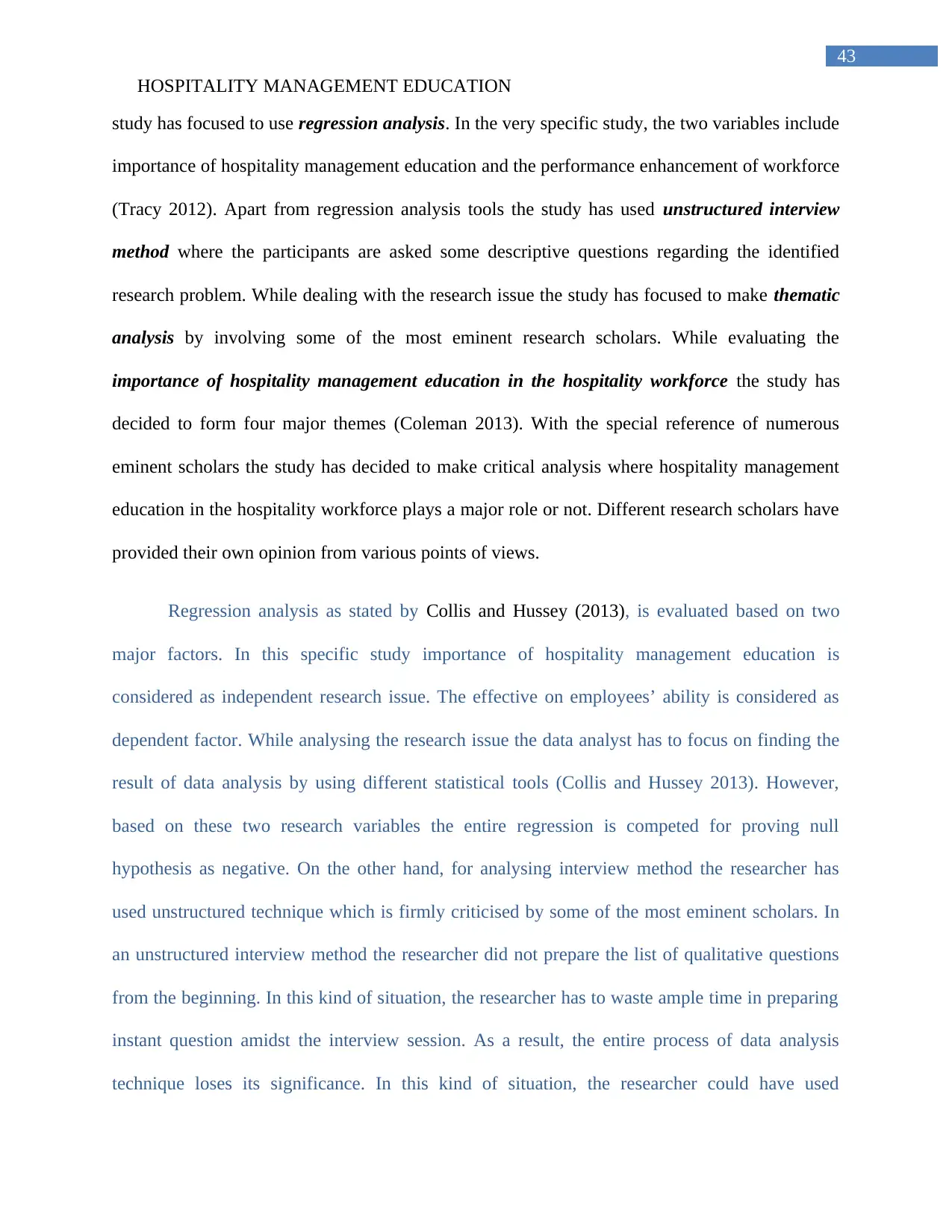
43
HOSPITALITY MANAGEMENT EDUCATION
study has focused to use regression analysis. In the very specific study, the two variables include
importance of hospitality management education and the performance enhancement of workforce
(Tracy 2012). Apart from regression analysis tools the study has used unstructured interview
method where the participants are asked some descriptive questions regarding the identified
research problem. While dealing with the research issue the study has focused to make thematic
analysis by involving some of the most eminent research scholars. While evaluating the
importance of hospitality management education in the hospitality workforce the study has
decided to form four major themes (Coleman 2013). With the special reference of numerous
eminent scholars the study has decided to make critical analysis where hospitality management
education in the hospitality workforce plays a major role or not. Different research scholars have
provided their own opinion from various points of views.
Regression analysis as stated by Collis and Hussey (2013), is evaluated based on two
major factors. In this specific study importance of hospitality management education is
considered as independent research issue. The effective on employees’ ability is considered as
dependent factor. While analysing the research issue the data analyst has to focus on finding the
result of data analysis by using different statistical tools (Collis and Hussey 2013). However,
based on these two research variables the entire regression is competed for proving null
hypothesis as negative. On the other hand, for analysing interview method the researcher has
used unstructured technique which is firmly criticised by some of the most eminent scholars. In
an unstructured interview method the researcher did not prepare the list of qualitative questions
from the beginning. In this kind of situation, the researcher has to waste ample time in preparing
instant question amidst the interview session. As a result, the entire process of data analysis
technique loses its significance. In this kind of situation, the researcher could have used
HOSPITALITY MANAGEMENT EDUCATION
study has focused to use regression analysis. In the very specific study, the two variables include
importance of hospitality management education and the performance enhancement of workforce
(Tracy 2012). Apart from regression analysis tools the study has used unstructured interview
method where the participants are asked some descriptive questions regarding the identified
research problem. While dealing with the research issue the study has focused to make thematic
analysis by involving some of the most eminent research scholars. While evaluating the
importance of hospitality management education in the hospitality workforce the study has
decided to form four major themes (Coleman 2013). With the special reference of numerous
eminent scholars the study has decided to make critical analysis where hospitality management
education in the hospitality workforce plays a major role or not. Different research scholars have
provided their own opinion from various points of views.
Regression analysis as stated by Collis and Hussey (2013), is evaluated based on two
major factors. In this specific study importance of hospitality management education is
considered as independent research issue. The effective on employees’ ability is considered as
dependent factor. While analysing the research issue the data analyst has to focus on finding the
result of data analysis by using different statistical tools (Collis and Hussey 2013). However,
based on these two research variables the entire regression is competed for proving null
hypothesis as negative. On the other hand, for analysing interview method the researcher has
used unstructured technique which is firmly criticised by some of the most eminent scholars. In
an unstructured interview method the researcher did not prepare the list of qualitative questions
from the beginning. In this kind of situation, the researcher has to waste ample time in preparing
instant question amidst the interview session. As a result, the entire process of data analysis
technique loses its significance. In this kind of situation, the researcher could have used
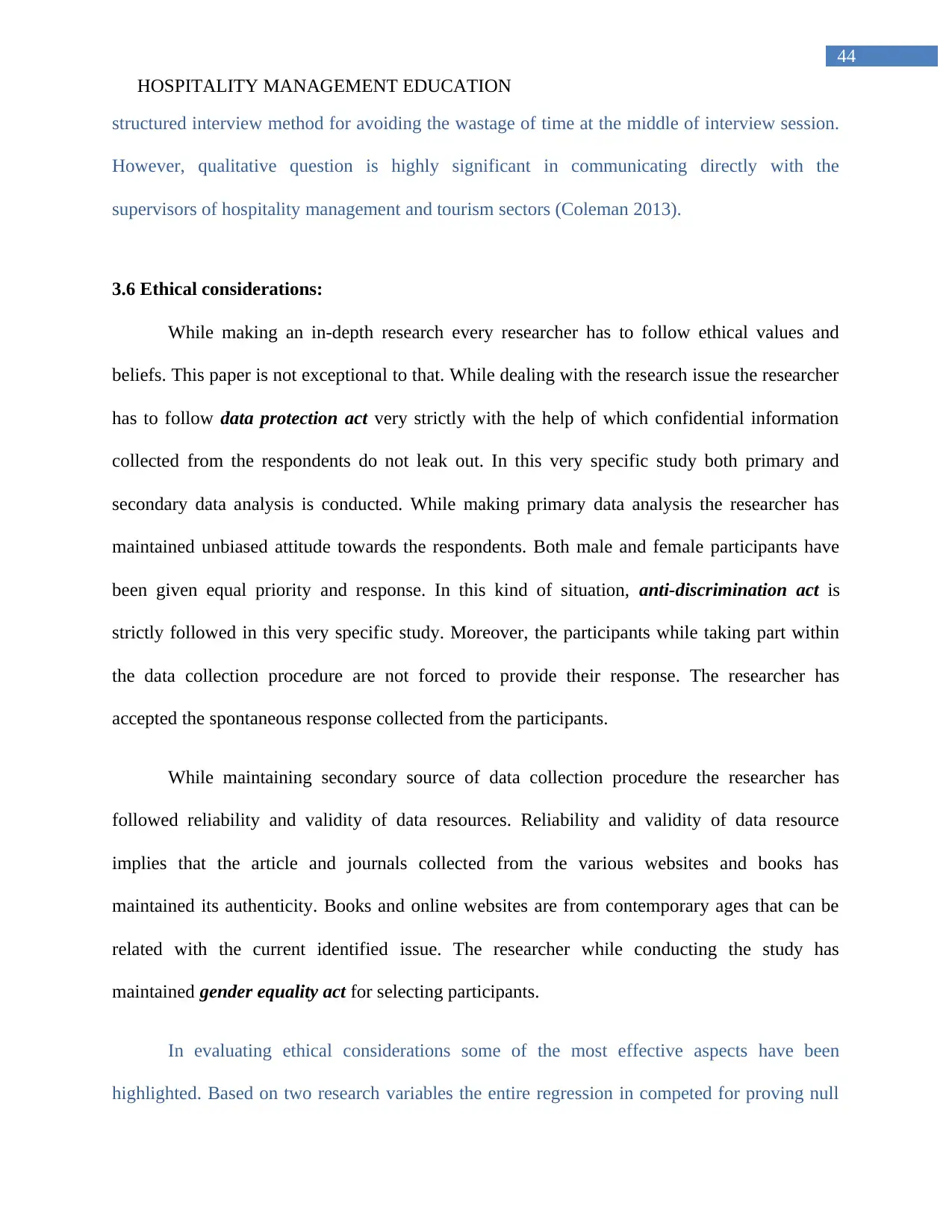
44
HOSPITALITY MANAGEMENT EDUCATION
structured interview method for avoiding the wastage of time at the middle of interview session.
However, qualitative question is highly significant in communicating directly with the
supervisors of hospitality management and tourism sectors (Coleman 2013).
3.6 Ethical considerations:
While making an in-depth research every researcher has to follow ethical values and
beliefs. This paper is not exceptional to that. While dealing with the research issue the researcher
has to follow data protection act very strictly with the help of which confidential information
collected from the respondents do not leak out. In this very specific study both primary and
secondary data analysis is conducted. While making primary data analysis the researcher has
maintained unbiased attitude towards the respondents. Both male and female participants have
been given equal priority and response. In this kind of situation, anti-discrimination act is
strictly followed in this very specific study. Moreover, the participants while taking part within
the data collection procedure are not forced to provide their response. The researcher has
accepted the spontaneous response collected from the participants.
While maintaining secondary source of data collection procedure the researcher has
followed reliability and validity of data resources. Reliability and validity of data resource
implies that the article and journals collected from the various websites and books has
maintained its authenticity. Books and online websites are from contemporary ages that can be
related with the current identified issue. The researcher while conducting the study has
maintained gender equality act for selecting participants.
In evaluating ethical considerations some of the most effective aspects have been
highlighted. Based on two research variables the entire regression in competed for proving null
HOSPITALITY MANAGEMENT EDUCATION
structured interview method for avoiding the wastage of time at the middle of interview session.
However, qualitative question is highly significant in communicating directly with the
supervisors of hospitality management and tourism sectors (Coleman 2013).
3.6 Ethical considerations:
While making an in-depth research every researcher has to follow ethical values and
beliefs. This paper is not exceptional to that. While dealing with the research issue the researcher
has to follow data protection act very strictly with the help of which confidential information
collected from the respondents do not leak out. In this very specific study both primary and
secondary data analysis is conducted. While making primary data analysis the researcher has
maintained unbiased attitude towards the respondents. Both male and female participants have
been given equal priority and response. In this kind of situation, anti-discrimination act is
strictly followed in this very specific study. Moreover, the participants while taking part within
the data collection procedure are not forced to provide their response. The researcher has
accepted the spontaneous response collected from the participants.
While maintaining secondary source of data collection procedure the researcher has
followed reliability and validity of data resources. Reliability and validity of data resource
implies that the article and journals collected from the various websites and books has
maintained its authenticity. Books and online websites are from contemporary ages that can be
related with the current identified issue. The researcher while conducting the study has
maintained gender equality act for selecting participants.
In evaluating ethical considerations some of the most effective aspects have been
highlighted. Based on two research variables the entire regression in competed for proving null

45
HOSPITALITY MANAGEMENT EDUCATION
hypothesis as negative. In order to prove the null hypothesis negative the researcher has to follow
a proper systematic step. Based on two factors and its necessary questionnaires the hypothesis
test has to make for proving the research issue positive. On the other hand, for analysing
interview method the researcher has used unstructured technique which is firmly criticised by
some of the most eminent scholars. Unstructured interview method as stated by Wahyuni (2012),
have numerous ethical issues. In unstructured interview process the researcher cannot make the
conversation effective due to immense disturbances in forming instant questions. While dealing
with the research issue the interviewer should form and structure the interview questions
properly. As a result, the entire session of interview can be completed within stipulated time.
3.7 Summary:
After evaluating the entire research methodology part it can be summarised that research
method and tools are primarily used for analysing the gathered data from every perspective.
Numerous positivists while analysing positivism research philosophy believe that observation
can be repeated but phenomenon is isolated (Mary Converse 2012). However, this very specific
study has focused to select positivism research philosophy. The study has depicted that
positivism research philosophy being dependent on observation is not very time consuming that
enables the data analyst to conduct the entire paper of research within stipulated time schedule.
On the other hand, research design is the significant method of organizing and analyzing
collected data by using various research strategies. In this study however, descriptive research
design is used for depicting the identified issue as per gathered data and information. It is
undeniable that descriptive research design evaluates the data and information based on collected
responses. In this methodological tool the researcher does not get the scope of manipulating
information and interpreting collected responses from various perspectives.
HOSPITALITY MANAGEMENT EDUCATION
hypothesis as negative. In order to prove the null hypothesis negative the researcher has to follow
a proper systematic step. Based on two factors and its necessary questionnaires the hypothesis
test has to make for proving the research issue positive. On the other hand, for analysing
interview method the researcher has used unstructured technique which is firmly criticised by
some of the most eminent scholars. Unstructured interview method as stated by Wahyuni (2012),
have numerous ethical issues. In unstructured interview process the researcher cannot make the
conversation effective due to immense disturbances in forming instant questions. While dealing
with the research issue the interviewer should form and structure the interview questions
properly. As a result, the entire session of interview can be completed within stipulated time.
3.7 Summary:
After evaluating the entire research methodology part it can be summarised that research
method and tools are primarily used for analysing the gathered data from every perspective.
Numerous positivists while analysing positivism research philosophy believe that observation
can be repeated but phenomenon is isolated (Mary Converse 2012). However, this very specific
study has focused to select positivism research philosophy. The study has depicted that
positivism research philosophy being dependent on observation is not very time consuming that
enables the data analyst to conduct the entire paper of research within stipulated time schedule.
On the other hand, research design is the significant method of organizing and analyzing
collected data by using various research strategies. In this study however, descriptive research
design is used for depicting the identified issue as per gathered data and information. It is
undeniable that descriptive research design evaluates the data and information based on collected
responses. In this methodological tool the researcher does not get the scope of manipulating
information and interpreting collected responses from various perspectives.
Secure Best Marks with AI Grader
Need help grading? Try our AI Grader for instant feedback on your assignments.
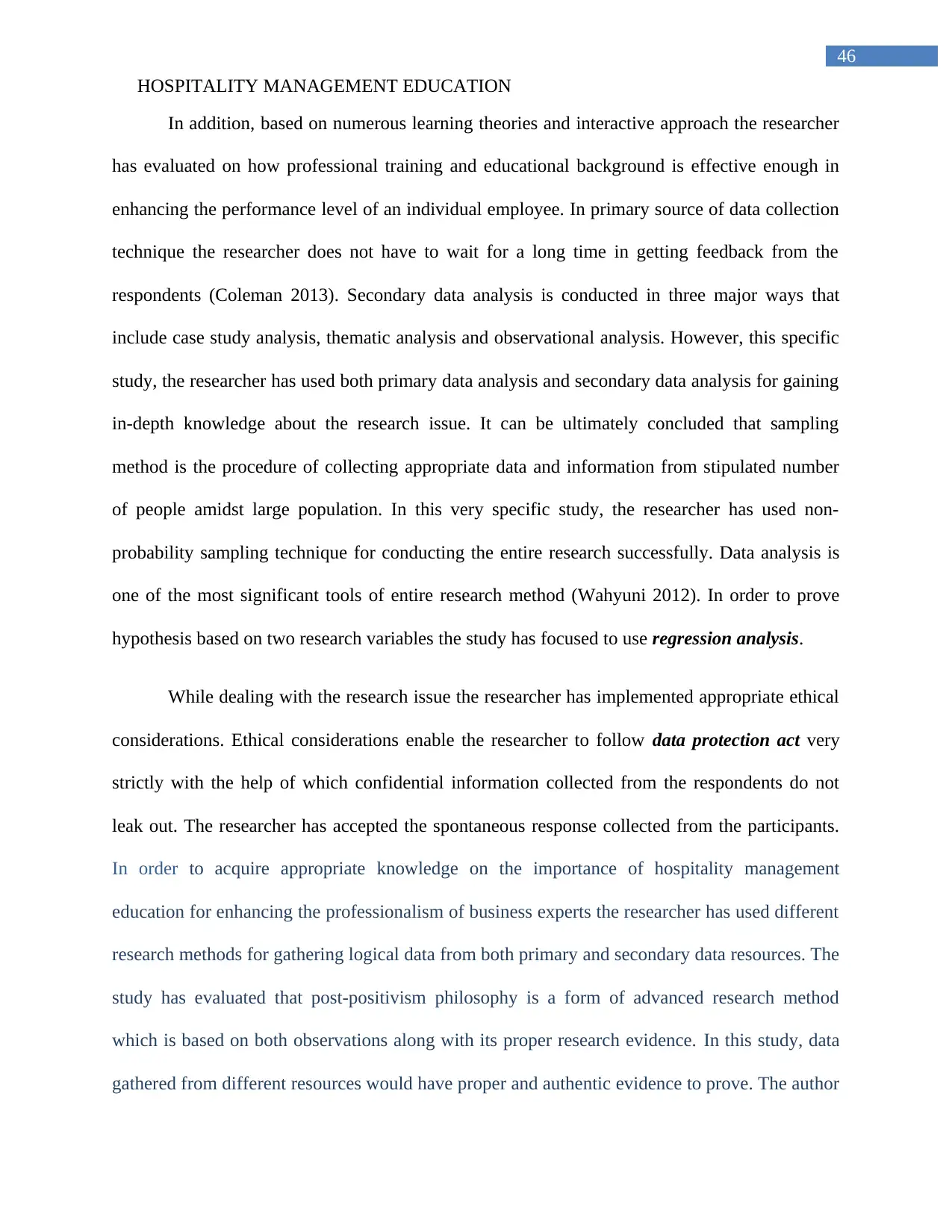
46
HOSPITALITY MANAGEMENT EDUCATION
In addition, based on numerous learning theories and interactive approach the researcher
has evaluated on how professional training and educational background is effective enough in
enhancing the performance level of an individual employee. In primary source of data collection
technique the researcher does not have to wait for a long time in getting feedback from the
respondents (Coleman 2013). Secondary data analysis is conducted in three major ways that
include case study analysis, thematic analysis and observational analysis. However, this specific
study, the researcher has used both primary data analysis and secondary data analysis for gaining
in-depth knowledge about the research issue. It can be ultimately concluded that sampling
method is the procedure of collecting appropriate data and information from stipulated number
of people amidst large population. In this very specific study, the researcher has used non-
probability sampling technique for conducting the entire research successfully. Data analysis is
one of the most significant tools of entire research method (Wahyuni 2012). In order to prove
hypothesis based on two research variables the study has focused to use regression analysis.
While dealing with the research issue the researcher has implemented appropriate ethical
considerations. Ethical considerations enable the researcher to follow data protection act very
strictly with the help of which confidential information collected from the respondents do not
leak out. The researcher has accepted the spontaneous response collected from the participants.
In order to acquire appropriate knowledge on the importance of hospitality management
education for enhancing the professionalism of business experts the researcher has used different
research methods for gathering logical data from both primary and secondary data resources. The
study has evaluated that post-positivism philosophy is a form of advanced research method
which is based on both observations along with its proper research evidence. In this study, data
gathered from different resources would have proper and authentic evidence to prove. The author
HOSPITALITY MANAGEMENT EDUCATION
In addition, based on numerous learning theories and interactive approach the researcher
has evaluated on how professional training and educational background is effective enough in
enhancing the performance level of an individual employee. In primary source of data collection
technique the researcher does not have to wait for a long time in getting feedback from the
respondents (Coleman 2013). Secondary data analysis is conducted in three major ways that
include case study analysis, thematic analysis and observational analysis. However, this specific
study, the researcher has used both primary data analysis and secondary data analysis for gaining
in-depth knowledge about the research issue. It can be ultimately concluded that sampling
method is the procedure of collecting appropriate data and information from stipulated number
of people amidst large population. In this very specific study, the researcher has used non-
probability sampling technique for conducting the entire research successfully. Data analysis is
one of the most significant tools of entire research method (Wahyuni 2012). In order to prove
hypothesis based on two research variables the study has focused to use regression analysis.
While dealing with the research issue the researcher has implemented appropriate ethical
considerations. Ethical considerations enable the researcher to follow data protection act very
strictly with the help of which confidential information collected from the respondents do not
leak out. The researcher has accepted the spontaneous response collected from the participants.
In order to acquire appropriate knowledge on the importance of hospitality management
education for enhancing the professionalism of business experts the researcher has used different
research methods for gathering logical data from both primary and secondary data resources. The
study has evaluated that post-positivism philosophy is a form of advanced research method
which is based on both observations along with its proper research evidence. In this study, data
gathered from different resources would have proper and authentic evidence to prove. The author
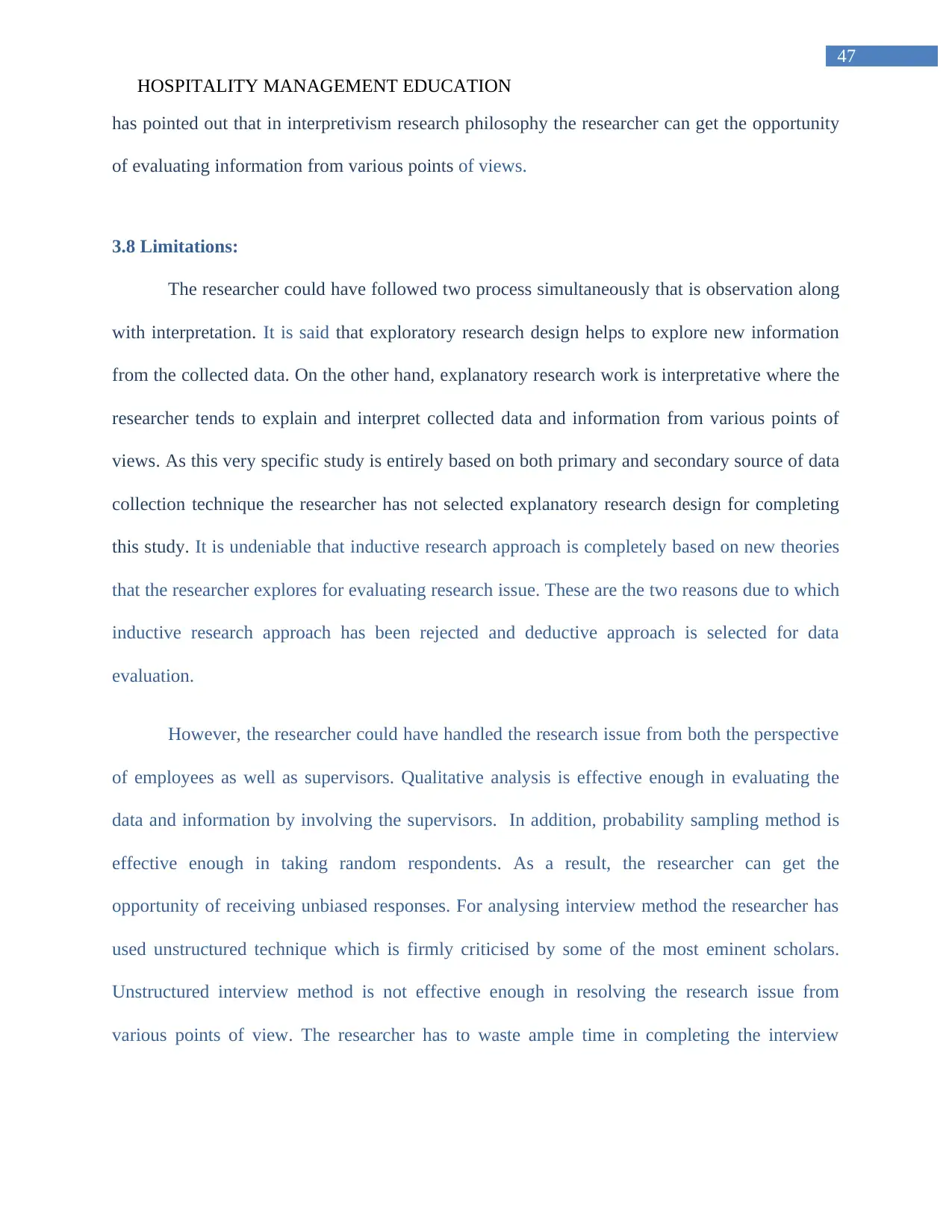
47
HOSPITALITY MANAGEMENT EDUCATION
has pointed out that in interpretivism research philosophy the researcher can get the opportunity
of evaluating information from various points of views.
3.8 Limitations:
The researcher could have followed two process simultaneously that is observation along
with interpretation. It is said that exploratory research design helps to explore new information
from the collected data. On the other hand, explanatory research work is interpretative where the
researcher tends to explain and interpret collected data and information from various points of
views. As this very specific study is entirely based on both primary and secondary source of data
collection technique the researcher has not selected explanatory research design for completing
this study. It is undeniable that inductive research approach is completely based on new theories
that the researcher explores for evaluating research issue. These are the two reasons due to which
inductive research approach has been rejected and deductive approach is selected for data
evaluation.
However, the researcher could have handled the research issue from both the perspective
of employees as well as supervisors. Qualitative analysis is effective enough in evaluating the
data and information by involving the supervisors. In addition, probability sampling method is
effective enough in taking random respondents. As a result, the researcher can get the
opportunity of receiving unbiased responses. For analysing interview method the researcher has
used unstructured technique which is firmly criticised by some of the most eminent scholars.
Unstructured interview method is not effective enough in resolving the research issue from
various points of view. The researcher has to waste ample time in completing the interview
HOSPITALITY MANAGEMENT EDUCATION
has pointed out that in interpretivism research philosophy the researcher can get the opportunity
of evaluating information from various points of views.
3.8 Limitations:
The researcher could have followed two process simultaneously that is observation along
with interpretation. It is said that exploratory research design helps to explore new information
from the collected data. On the other hand, explanatory research work is interpretative where the
researcher tends to explain and interpret collected data and information from various points of
views. As this very specific study is entirely based on both primary and secondary source of data
collection technique the researcher has not selected explanatory research design for completing
this study. It is undeniable that inductive research approach is completely based on new theories
that the researcher explores for evaluating research issue. These are the two reasons due to which
inductive research approach has been rejected and deductive approach is selected for data
evaluation.
However, the researcher could have handled the research issue from both the perspective
of employees as well as supervisors. Qualitative analysis is effective enough in evaluating the
data and information by involving the supervisors. In addition, probability sampling method is
effective enough in taking random respondents. As a result, the researcher can get the
opportunity of receiving unbiased responses. For analysing interview method the researcher has
used unstructured technique which is firmly criticised by some of the most eminent scholars.
Unstructured interview method is not effective enough in resolving the research issue from
various points of view. The researcher has to waste ample time in completing the interview
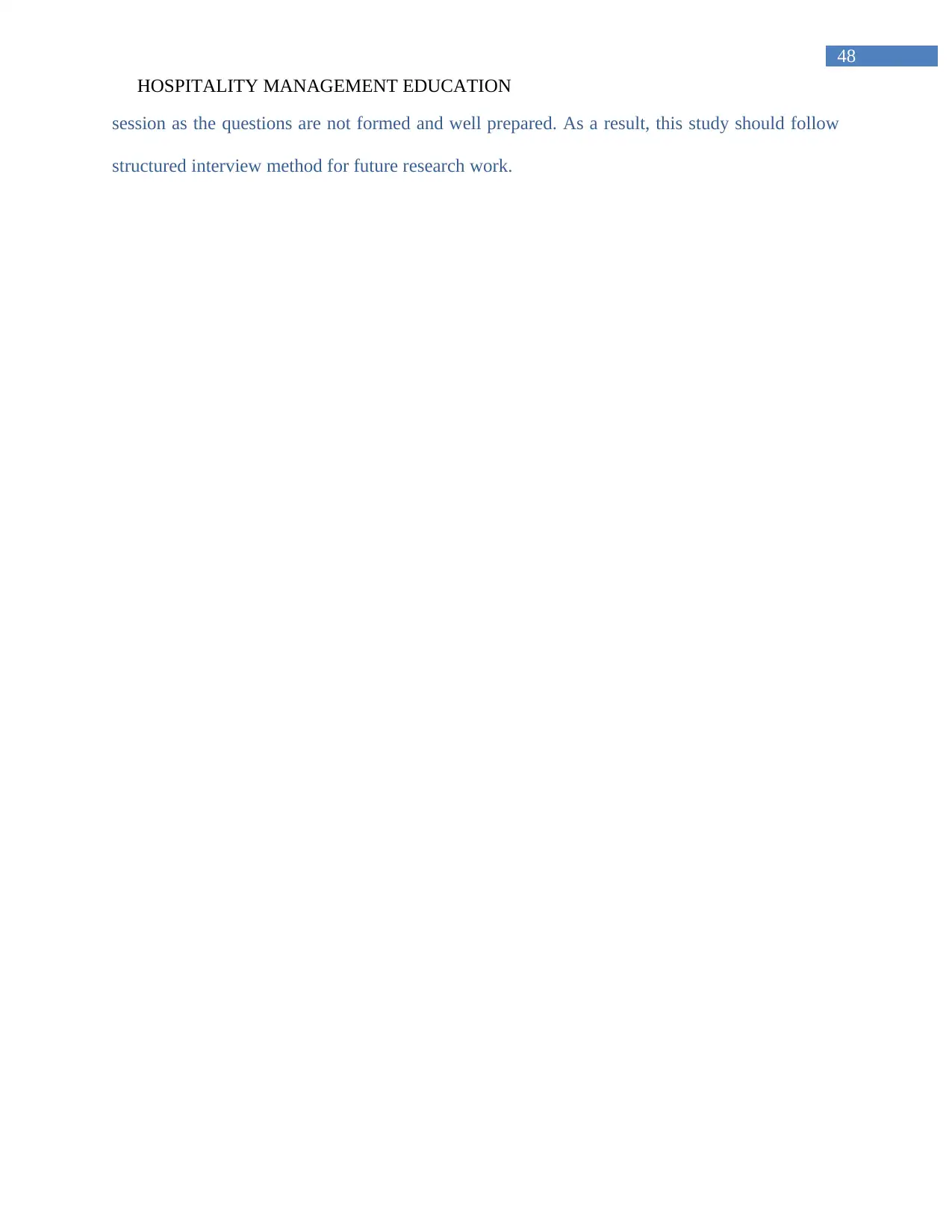
48
HOSPITALITY MANAGEMENT EDUCATION
session as the questions are not formed and well prepared. As a result, this study should follow
structured interview method for future research work.
HOSPITALITY MANAGEMENT EDUCATION
session as the questions are not formed and well prepared. As a result, this study should follow
structured interview method for future research work.
Paraphrase This Document
Need a fresh take? Get an instant paraphrase of this document with our AI Paraphraser
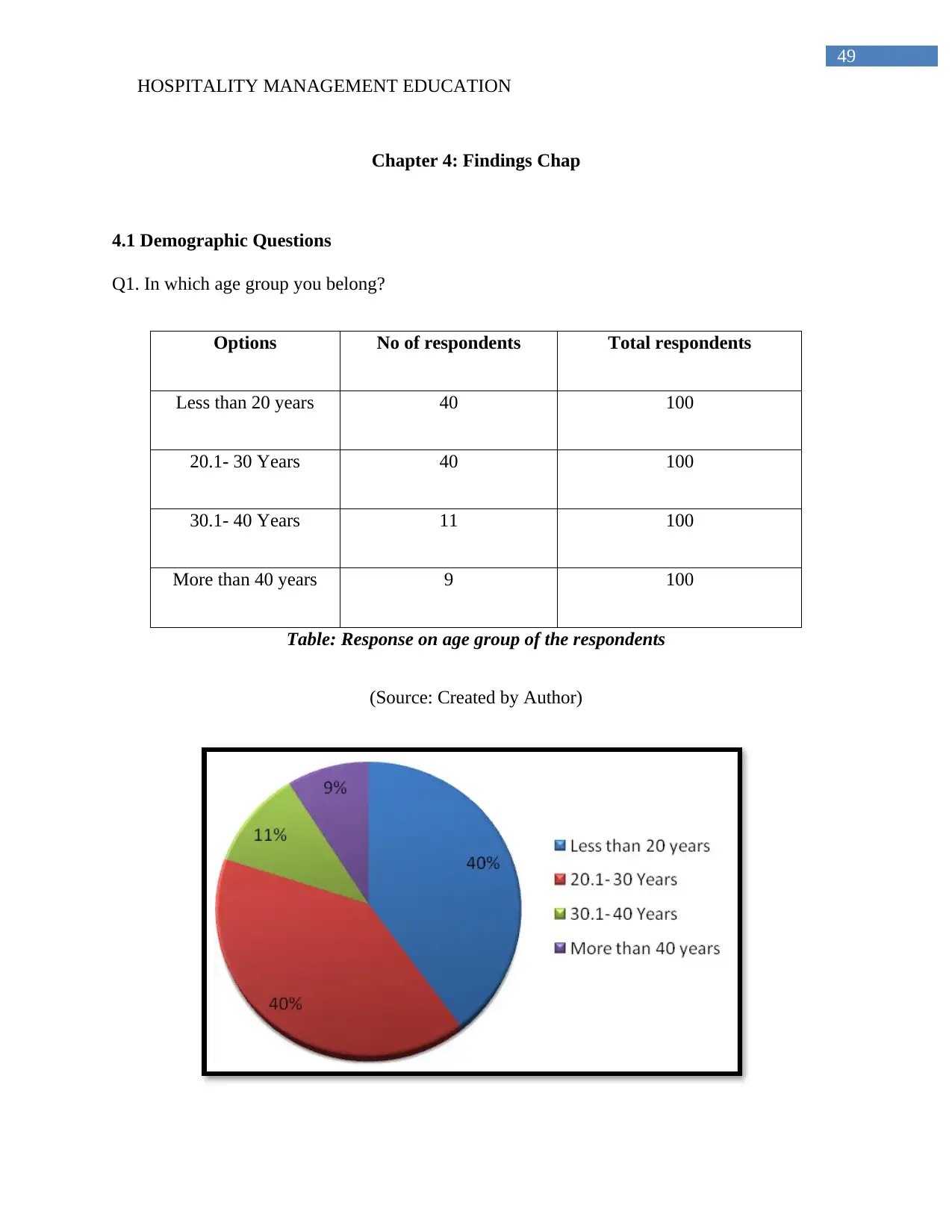
49
HOSPITALITY MANAGEMENT EDUCATION
Chapter 4: Findings Chap
4.1 Demographic Questions
Q1. In which age group you belong?
Options No of respondents Total respondents
Less than 20 years 40 100
20.1- 30 Years 40 100
30.1- 40 Years 11 100
More than 40 years 9 100
Table: Response on age group of the respondents
(Source: Created by Author)
HOSPITALITY MANAGEMENT EDUCATION
Chapter 4: Findings Chap
4.1 Demographic Questions
Q1. In which age group you belong?
Options No of respondents Total respondents
Less than 20 years 40 100
20.1- 30 Years 40 100
30.1- 40 Years 11 100
More than 40 years 9 100
Table: Response on age group of the respondents
(Source: Created by Author)
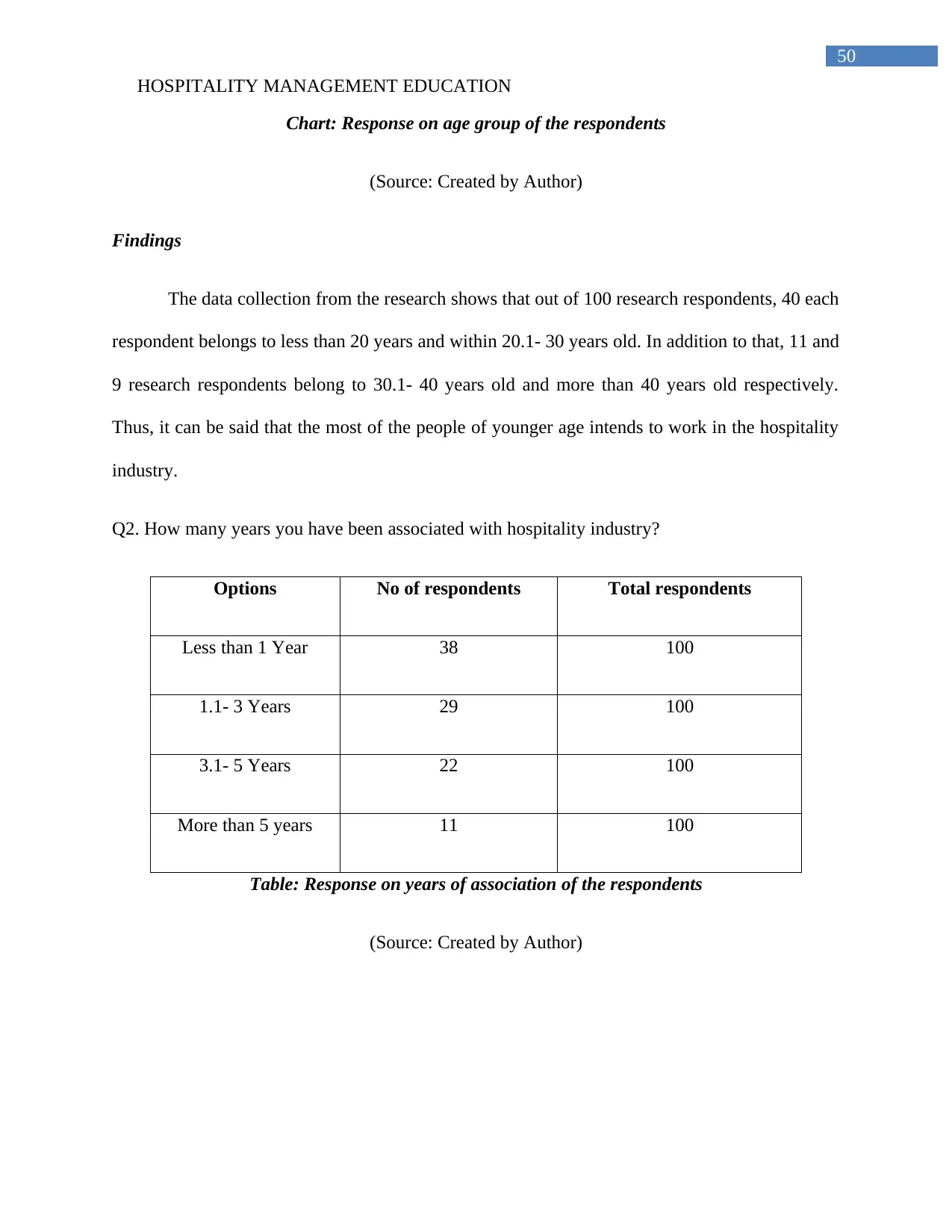
50
HOSPITALITY MANAGEMENT EDUCATION
Chart: Response on age group of the respondents
(Source: Created by Author)
Findings
The data collection from the research shows that out of 100 research respondents, 40 each
respondent belongs to less than 20 years and within 20.1- 30 years old. In addition to that, 11 and
9 research respondents belong to 30.1- 40 years old and more than 40 years old respectively.
Thus, it can be said that the most of the people of younger age intends to work in the hospitality
industry.
Q2. How many years you have been associated with hospitality industry?
Options No of respondents Total respondents
Less than 1 Year 38 100
1.1- 3 Years 29 100
3.1- 5 Years 22 100
More than 5 years 11 100
Table: Response on years of association of the respondents
(Source: Created by Author)
HOSPITALITY MANAGEMENT EDUCATION
Chart: Response on age group of the respondents
(Source: Created by Author)
Findings
The data collection from the research shows that out of 100 research respondents, 40 each
respondent belongs to less than 20 years and within 20.1- 30 years old. In addition to that, 11 and
9 research respondents belong to 30.1- 40 years old and more than 40 years old respectively.
Thus, it can be said that the most of the people of younger age intends to work in the hospitality
industry.
Q2. How many years you have been associated with hospitality industry?
Options No of respondents Total respondents
Less than 1 Year 38 100
1.1- 3 Years 29 100
3.1- 5 Years 22 100
More than 5 years 11 100
Table: Response on years of association of the respondents
(Source: Created by Author)
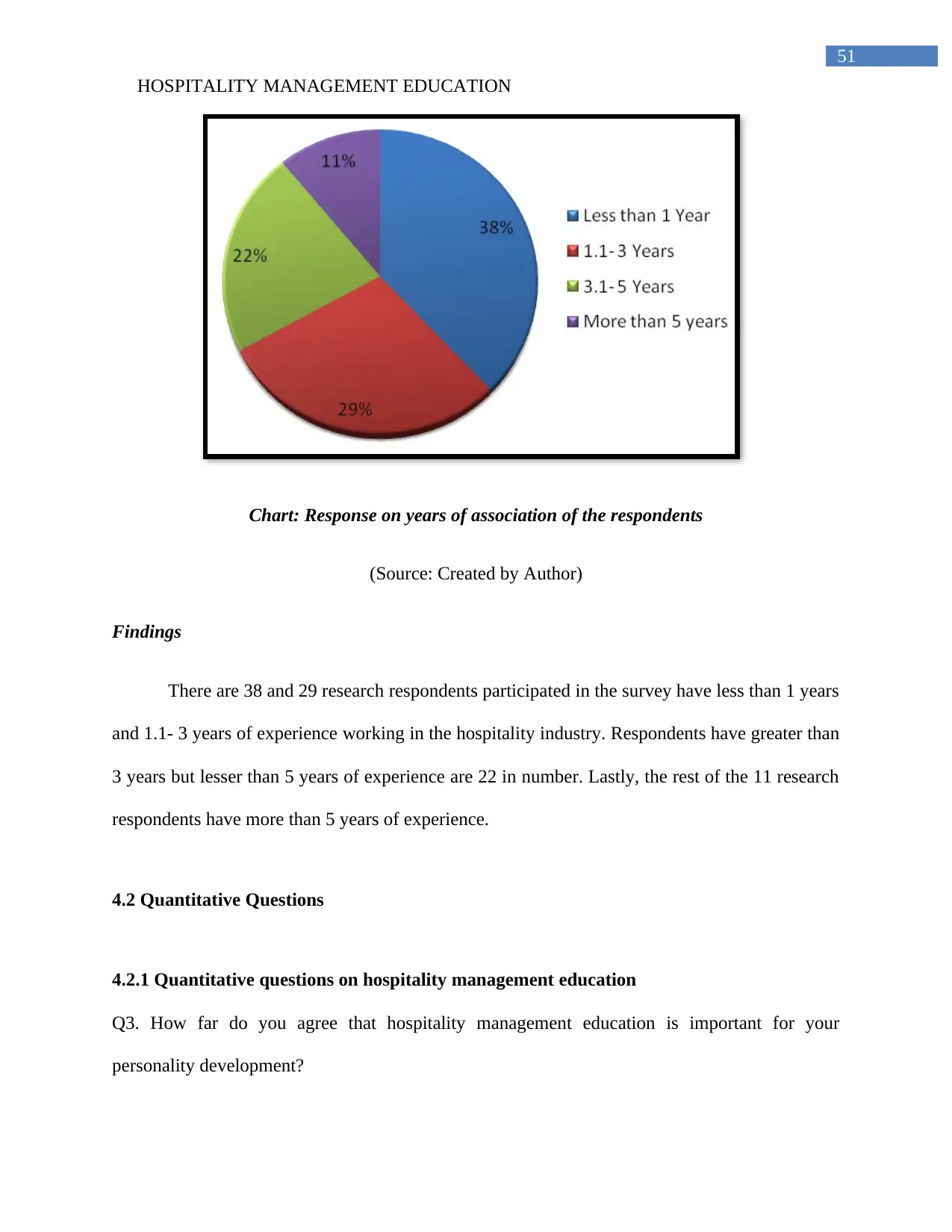
51
HOSPITALITY MANAGEMENT EDUCATION
Chart: Response on years of association of the respondents
(Source: Created by Author)
Findings
There are 38 and 29 research respondents participated in the survey have less than 1 years
and 1.1- 3 years of experience working in the hospitality industry. Respondents have greater than
3 years but lesser than 5 years of experience are 22 in number. Lastly, the rest of the 11 research
respondents have more than 5 years of experience.
4.2 Quantitative Questions
4.2.1 Quantitative questions on hospitality management education
Q3. How far do you agree that hospitality management education is important for your
personality development?
HOSPITALITY MANAGEMENT EDUCATION
Chart: Response on years of association of the respondents
(Source: Created by Author)
Findings
There are 38 and 29 research respondents participated in the survey have less than 1 years
and 1.1- 3 years of experience working in the hospitality industry. Respondents have greater than
3 years but lesser than 5 years of experience are 22 in number. Lastly, the rest of the 11 research
respondents have more than 5 years of experience.
4.2 Quantitative Questions
4.2.1 Quantitative questions on hospitality management education
Q3. How far do you agree that hospitality management education is important for your
personality development?
Secure Best Marks with AI Grader
Need help grading? Try our AI Grader for instant feedback on your assignments.
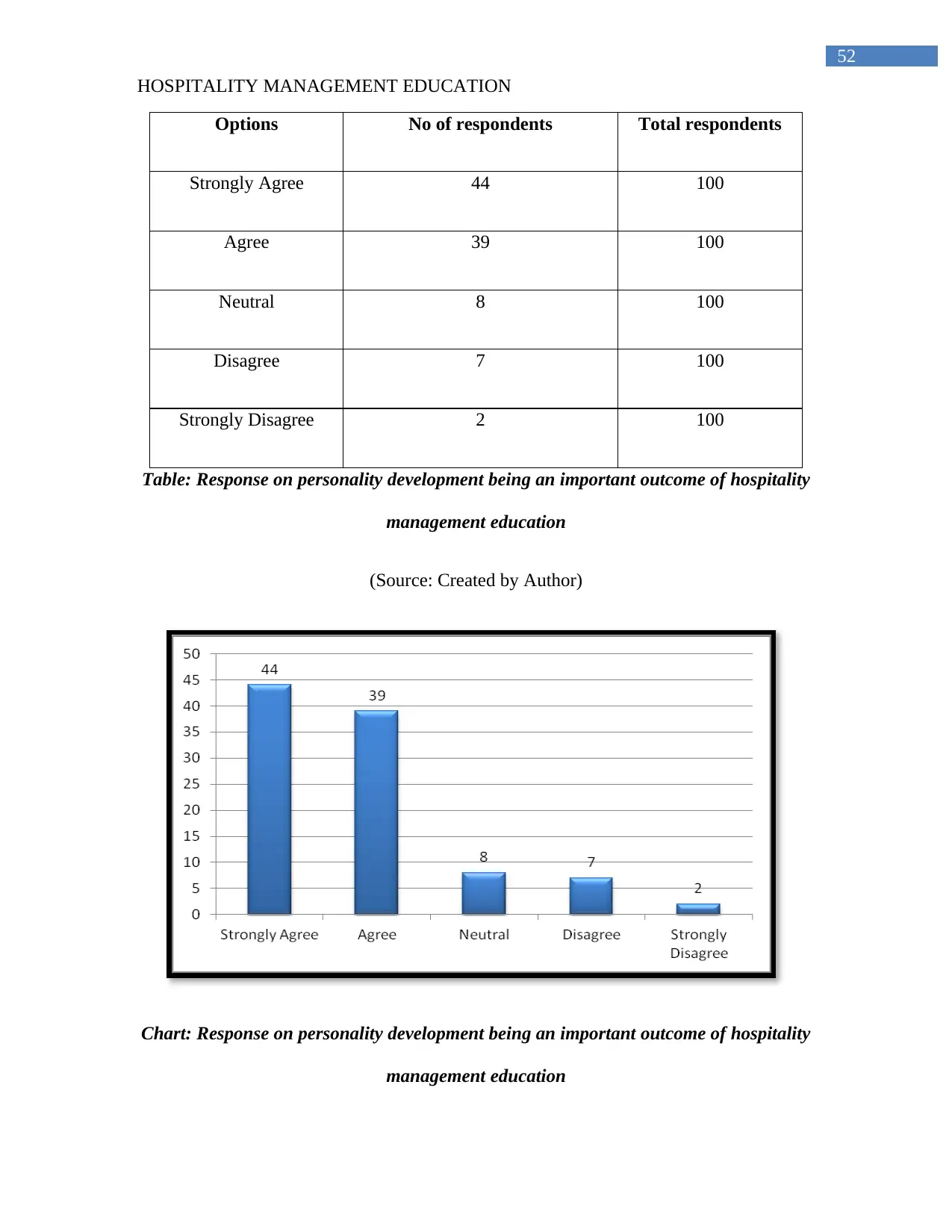
52
HOSPITALITY MANAGEMENT EDUCATION
Options No of respondents Total respondents
Strongly Agree 44 100
Agree 39 100
Neutral 8 100
Disagree 7 100
Strongly Disagree 2 100
Table: Response on personality development being an important outcome of hospitality
management education
(Source: Created by Author)
Chart: Response on personality development being an important outcome of hospitality
management education
HOSPITALITY MANAGEMENT EDUCATION
Options No of respondents Total respondents
Strongly Agree 44 100
Agree 39 100
Neutral 8 100
Disagree 7 100
Strongly Disagree 2 100
Table: Response on personality development being an important outcome of hospitality
management education
(Source: Created by Author)
Chart: Response on personality development being an important outcome of hospitality
management education
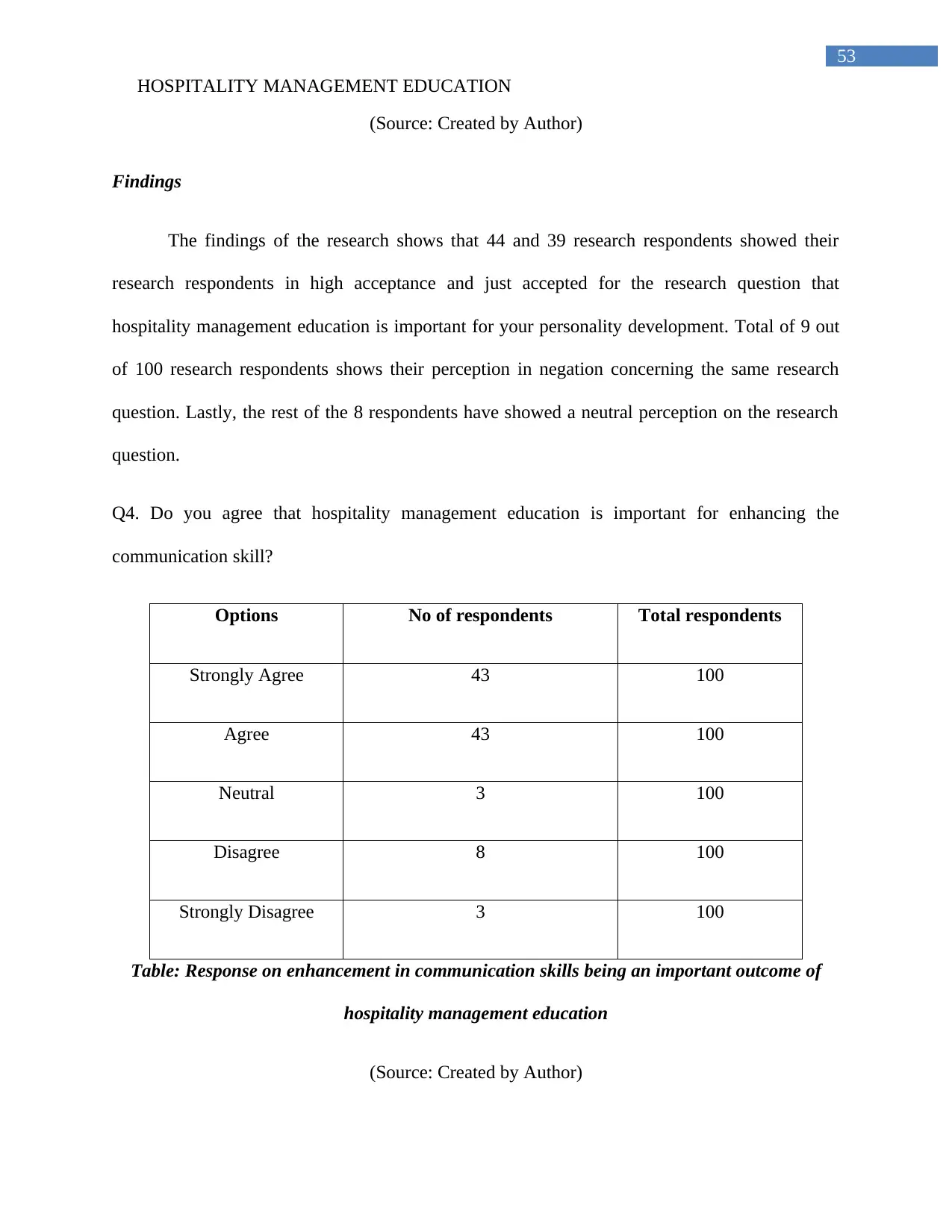
53
HOSPITALITY MANAGEMENT EDUCATION
(Source: Created by Author)
Findings
The findings of the research shows that 44 and 39 research respondents showed their
research respondents in high acceptance and just accepted for the research question that
hospitality management education is important for your personality development. Total of 9 out
of 100 research respondents shows their perception in negation concerning the same research
question. Lastly, the rest of the 8 respondents have showed a neutral perception on the research
question.
Q4. Do you agree that hospitality management education is important for enhancing the
communication skill?
Options No of respondents Total respondents
Strongly Agree 43 100
Agree 43 100
Neutral 3 100
Disagree 8 100
Strongly Disagree 3 100
Table: Response on enhancement in communication skills being an important outcome of
hospitality management education
(Source: Created by Author)
HOSPITALITY MANAGEMENT EDUCATION
(Source: Created by Author)
Findings
The findings of the research shows that 44 and 39 research respondents showed their
research respondents in high acceptance and just accepted for the research question that
hospitality management education is important for your personality development. Total of 9 out
of 100 research respondents shows their perception in negation concerning the same research
question. Lastly, the rest of the 8 respondents have showed a neutral perception on the research
question.
Q4. Do you agree that hospitality management education is important for enhancing the
communication skill?
Options No of respondents Total respondents
Strongly Agree 43 100
Agree 43 100
Neutral 3 100
Disagree 8 100
Strongly Disagree 3 100
Table: Response on enhancement in communication skills being an important outcome of
hospitality management education
(Source: Created by Author)
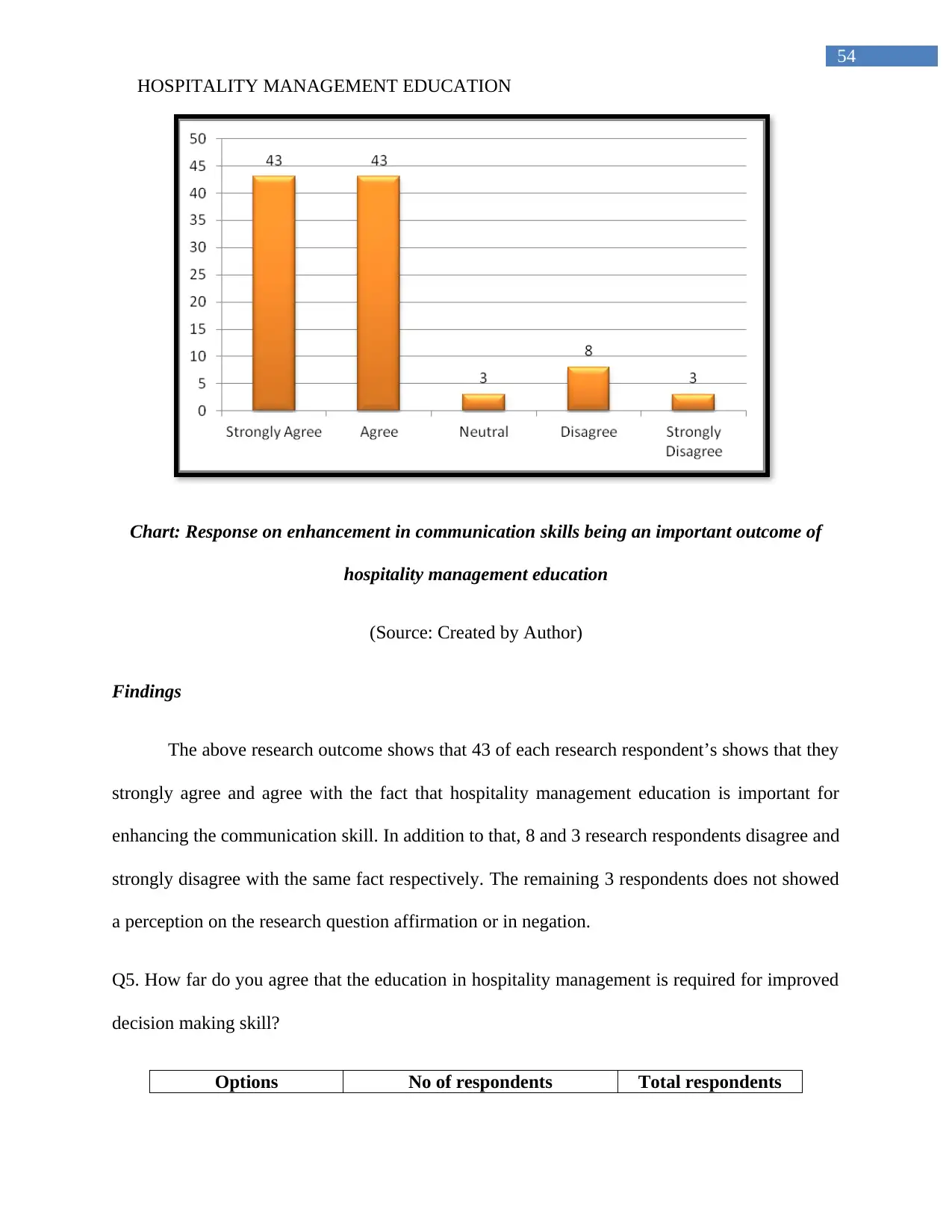
54
HOSPITALITY MANAGEMENT EDUCATION
Chart: Response on enhancement in communication skills being an important outcome of
hospitality management education
(Source: Created by Author)
Findings
The above research outcome shows that 43 of each research respondent’s shows that they
strongly agree and agree with the fact that hospitality management education is important for
enhancing the communication skill. In addition to that, 8 and 3 research respondents disagree and
strongly disagree with the same fact respectively. The remaining 3 respondents does not showed
a perception on the research question affirmation or in negation.
Q5. How far do you agree that the education in hospitality management is required for improved
decision making skill?
Options No of respondents Total respondents
HOSPITALITY MANAGEMENT EDUCATION
Chart: Response on enhancement in communication skills being an important outcome of
hospitality management education
(Source: Created by Author)
Findings
The above research outcome shows that 43 of each research respondent’s shows that they
strongly agree and agree with the fact that hospitality management education is important for
enhancing the communication skill. In addition to that, 8 and 3 research respondents disagree and
strongly disagree with the same fact respectively. The remaining 3 respondents does not showed
a perception on the research question affirmation or in negation.
Q5. How far do you agree that the education in hospitality management is required for improved
decision making skill?
Options No of respondents Total respondents
Paraphrase This Document
Need a fresh take? Get an instant paraphrase of this document with our AI Paraphraser
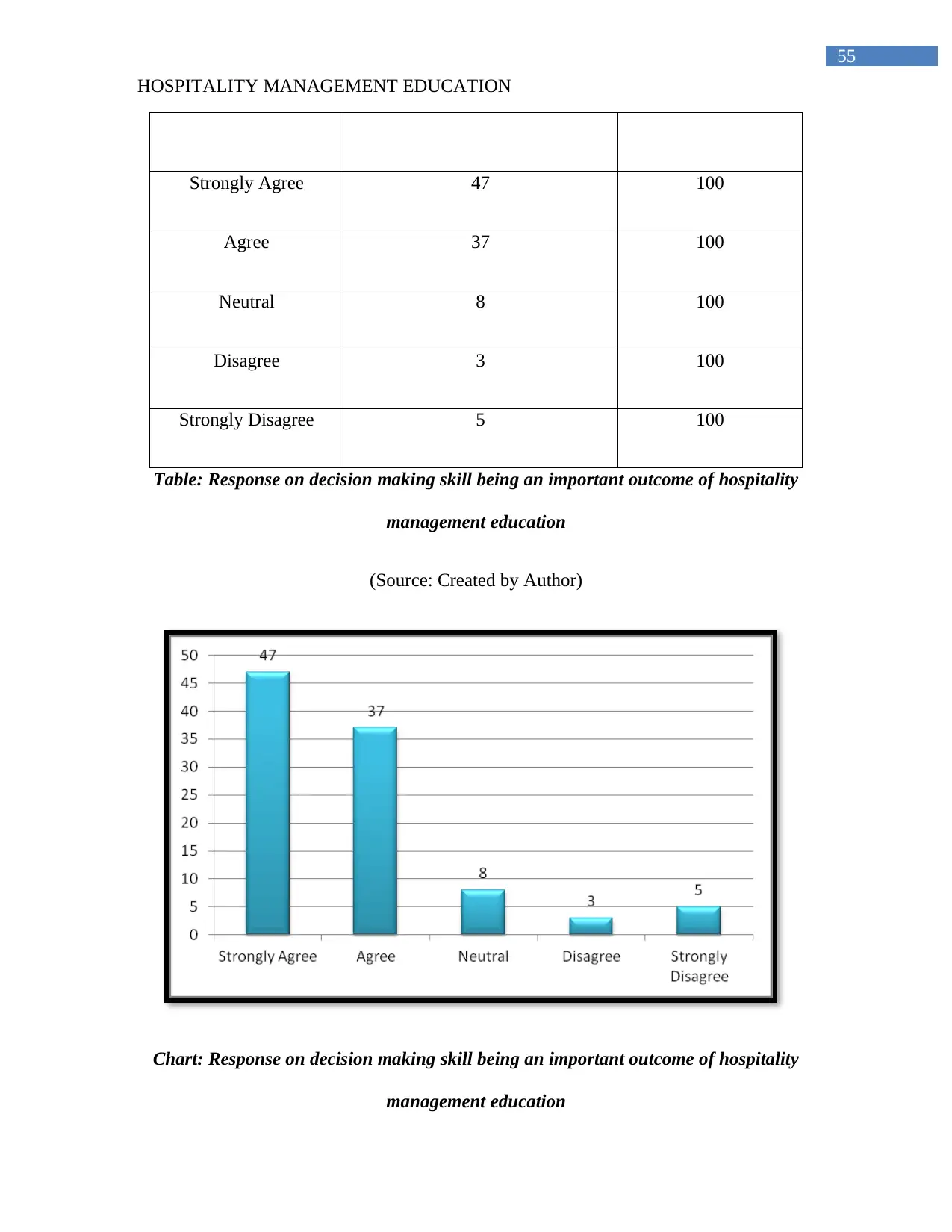
55
HOSPITALITY MANAGEMENT EDUCATION
Strongly Agree 47 100
Agree 37 100
Neutral 8 100
Disagree 3 100
Strongly Disagree 5 100
Table: Response on decision making skill being an important outcome of hospitality
management education
(Source: Created by Author)
Chart: Response on decision making skill being an important outcome of hospitality
management education
HOSPITALITY MANAGEMENT EDUCATION
Strongly Agree 47 100
Agree 37 100
Neutral 8 100
Disagree 3 100
Strongly Disagree 5 100
Table: Response on decision making skill being an important outcome of hospitality
management education
(Source: Created by Author)
Chart: Response on decision making skill being an important outcome of hospitality
management education
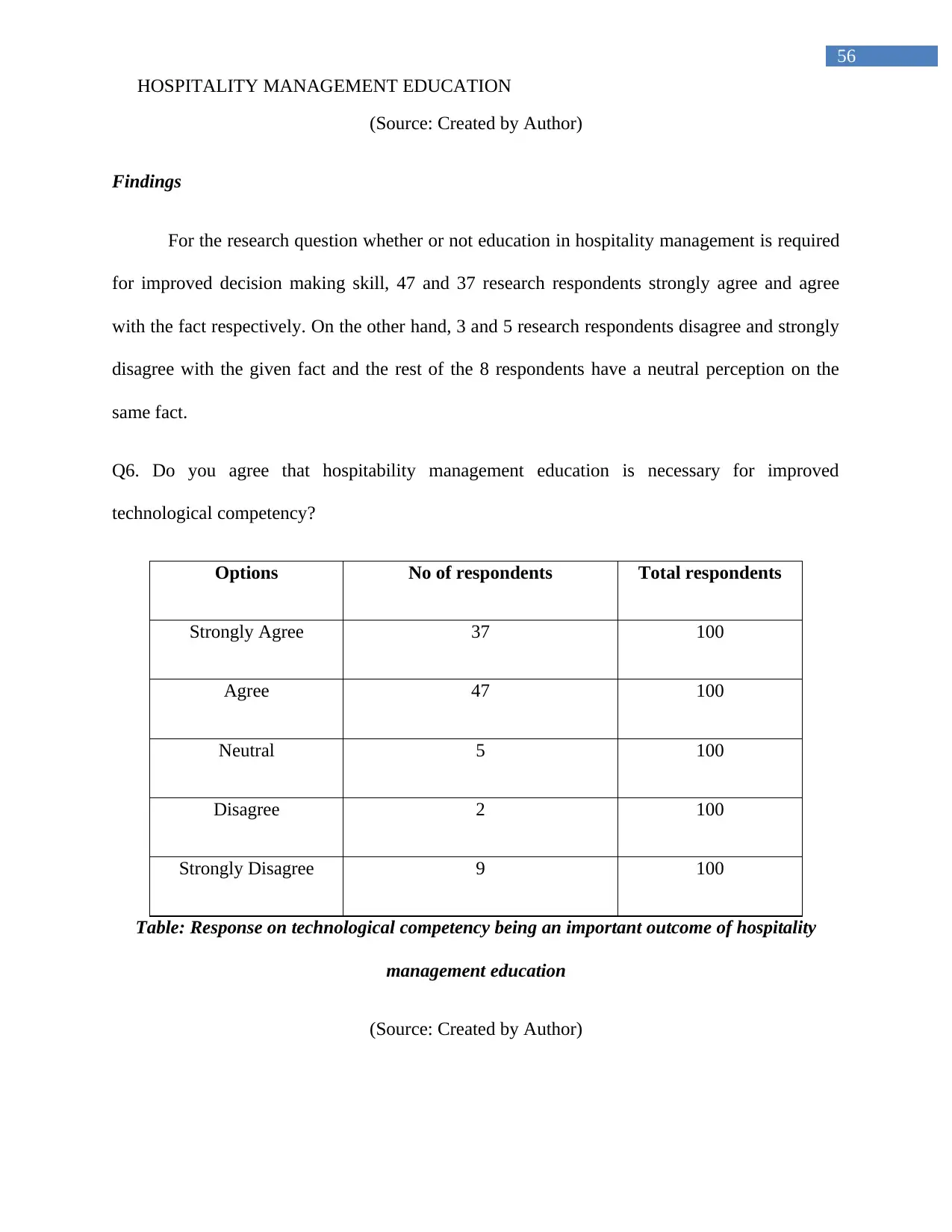
56
HOSPITALITY MANAGEMENT EDUCATION
(Source: Created by Author)
Findings
For the research question whether or not education in hospitality management is required
for improved decision making skill, 47 and 37 research respondents strongly agree and agree
with the fact respectively. On the other hand, 3 and 5 research respondents disagree and strongly
disagree with the given fact and the rest of the 8 respondents have a neutral perception on the
same fact.
Q6. Do you agree that hospitability management education is necessary for improved
technological competency?
Options No of respondents Total respondents
Strongly Agree 37 100
Agree 47 100
Neutral 5 100
Disagree 2 100
Strongly Disagree 9 100
Table: Response on technological competency being an important outcome of hospitality
management education
(Source: Created by Author)
HOSPITALITY MANAGEMENT EDUCATION
(Source: Created by Author)
Findings
For the research question whether or not education in hospitality management is required
for improved decision making skill, 47 and 37 research respondents strongly agree and agree
with the fact respectively. On the other hand, 3 and 5 research respondents disagree and strongly
disagree with the given fact and the rest of the 8 respondents have a neutral perception on the
same fact.
Q6. Do you agree that hospitability management education is necessary for improved
technological competency?
Options No of respondents Total respondents
Strongly Agree 37 100
Agree 47 100
Neutral 5 100
Disagree 2 100
Strongly Disagree 9 100
Table: Response on technological competency being an important outcome of hospitality
management education
(Source: Created by Author)
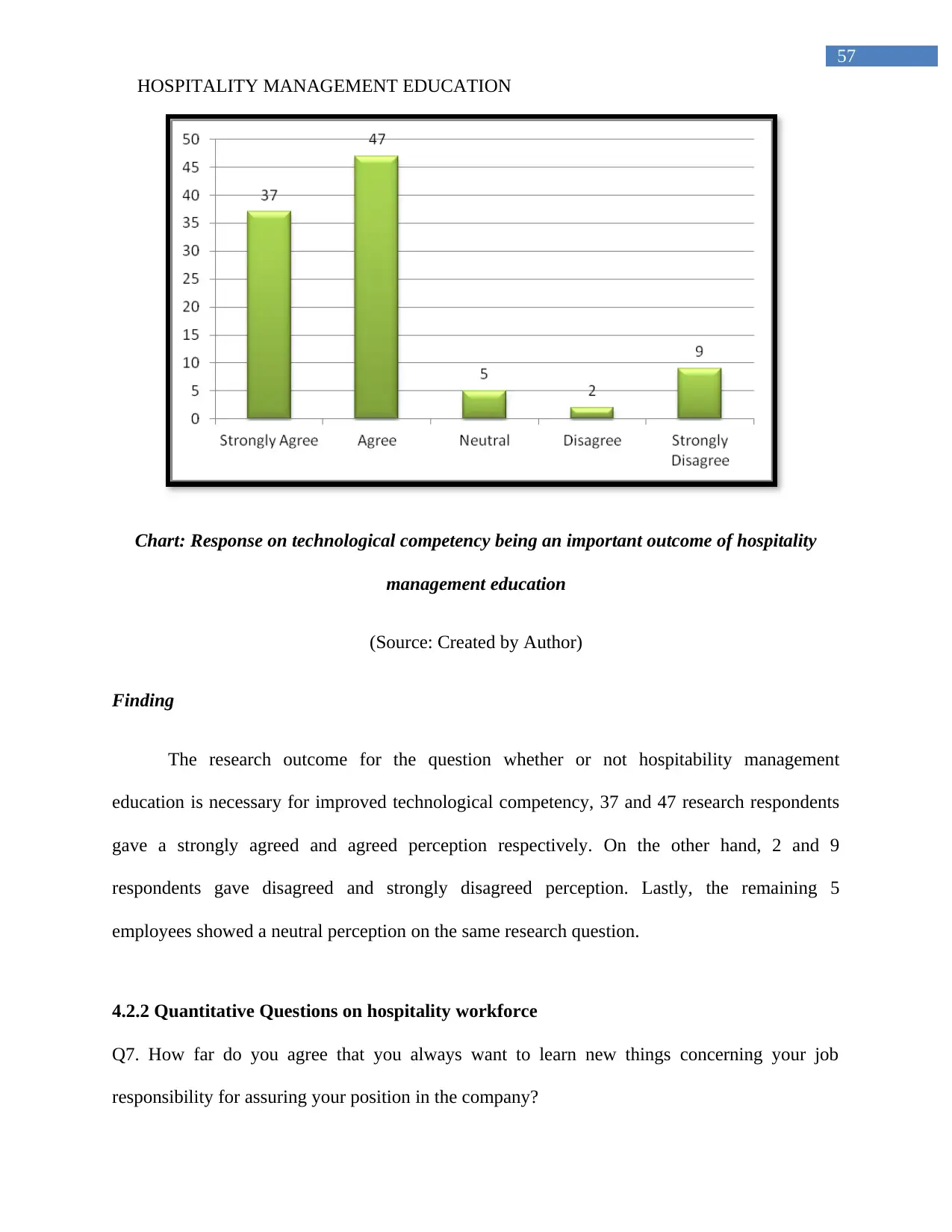
57
HOSPITALITY MANAGEMENT EDUCATION
Chart: Response on technological competency being an important outcome of hospitality
management education
(Source: Created by Author)
Finding
The research outcome for the question whether or not hospitability management
education is necessary for improved technological competency, 37 and 47 research respondents
gave a strongly agreed and agreed perception respectively. On the other hand, 2 and 9
respondents gave disagreed and strongly disagreed perception. Lastly, the remaining 5
employees showed a neutral perception on the same research question.
4.2.2 Quantitative Questions on hospitality workforce
Q7. How far do you agree that you always want to learn new things concerning your job
responsibility for assuring your position in the company?
HOSPITALITY MANAGEMENT EDUCATION
Chart: Response on technological competency being an important outcome of hospitality
management education
(Source: Created by Author)
Finding
The research outcome for the question whether or not hospitability management
education is necessary for improved technological competency, 37 and 47 research respondents
gave a strongly agreed and agreed perception respectively. On the other hand, 2 and 9
respondents gave disagreed and strongly disagreed perception. Lastly, the remaining 5
employees showed a neutral perception on the same research question.
4.2.2 Quantitative Questions on hospitality workforce
Q7. How far do you agree that you always want to learn new things concerning your job
responsibility for assuring your position in the company?
Secure Best Marks with AI Grader
Need help grading? Try our AI Grader for instant feedback on your assignments.
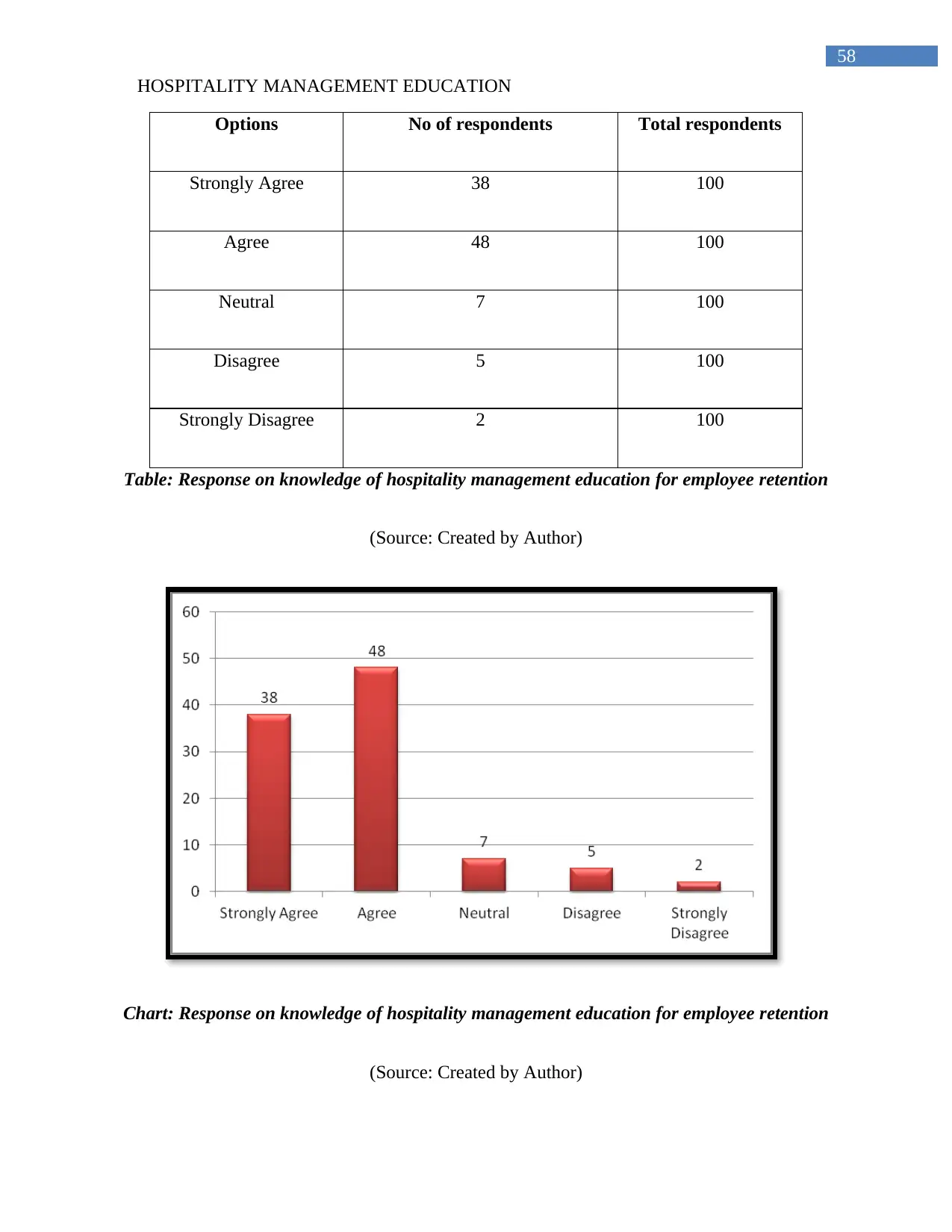
58
HOSPITALITY MANAGEMENT EDUCATION
Options No of respondents Total respondents
Strongly Agree 38 100
Agree 48 100
Neutral 7 100
Disagree 5 100
Strongly Disagree 2 100
Table: Response on knowledge of hospitality management education for employee retention
(Source: Created by Author)
Chart: Response on knowledge of hospitality management education for employee retention
(Source: Created by Author)
HOSPITALITY MANAGEMENT EDUCATION
Options No of respondents Total respondents
Strongly Agree 38 100
Agree 48 100
Neutral 7 100
Disagree 5 100
Strongly Disagree 2 100
Table: Response on knowledge of hospitality management education for employee retention
(Source: Created by Author)
Chart: Response on knowledge of hospitality management education for employee retention
(Source: Created by Author)

59
HOSPITALITY MANAGEMENT EDUCATION
Findings
The research outcome for the question whether or not the employees want to learn new
things concerning their job responsibility for assuring position in the company, 38 and 48
research respondents gave their reply strongly in favor and in favor respectively. On the other
hand, 5 and 2 research respondents denied and strongly denied the perception. The rest of the 7
respondents showed a neutral reply.
Q8. Do you agree that a proper training method would help in enhancing your workforce ability?
Options No of respondents Total respondents
Strongly Agree 42 100
Agree 44 100
Neutral 7 100
Disagree 5 100
Strongly Disagree 2 100
Table: Response on proper training method for the enhancement in workforce ability
(Source: Created by Author)
HOSPITALITY MANAGEMENT EDUCATION
Findings
The research outcome for the question whether or not the employees want to learn new
things concerning their job responsibility for assuring position in the company, 38 and 48
research respondents gave their reply strongly in favor and in favor respectively. On the other
hand, 5 and 2 research respondents denied and strongly denied the perception. The rest of the 7
respondents showed a neutral reply.
Q8. Do you agree that a proper training method would help in enhancing your workforce ability?
Options No of respondents Total respondents
Strongly Agree 42 100
Agree 44 100
Neutral 7 100
Disagree 5 100
Strongly Disagree 2 100
Table: Response on proper training method for the enhancement in workforce ability
(Source: Created by Author)
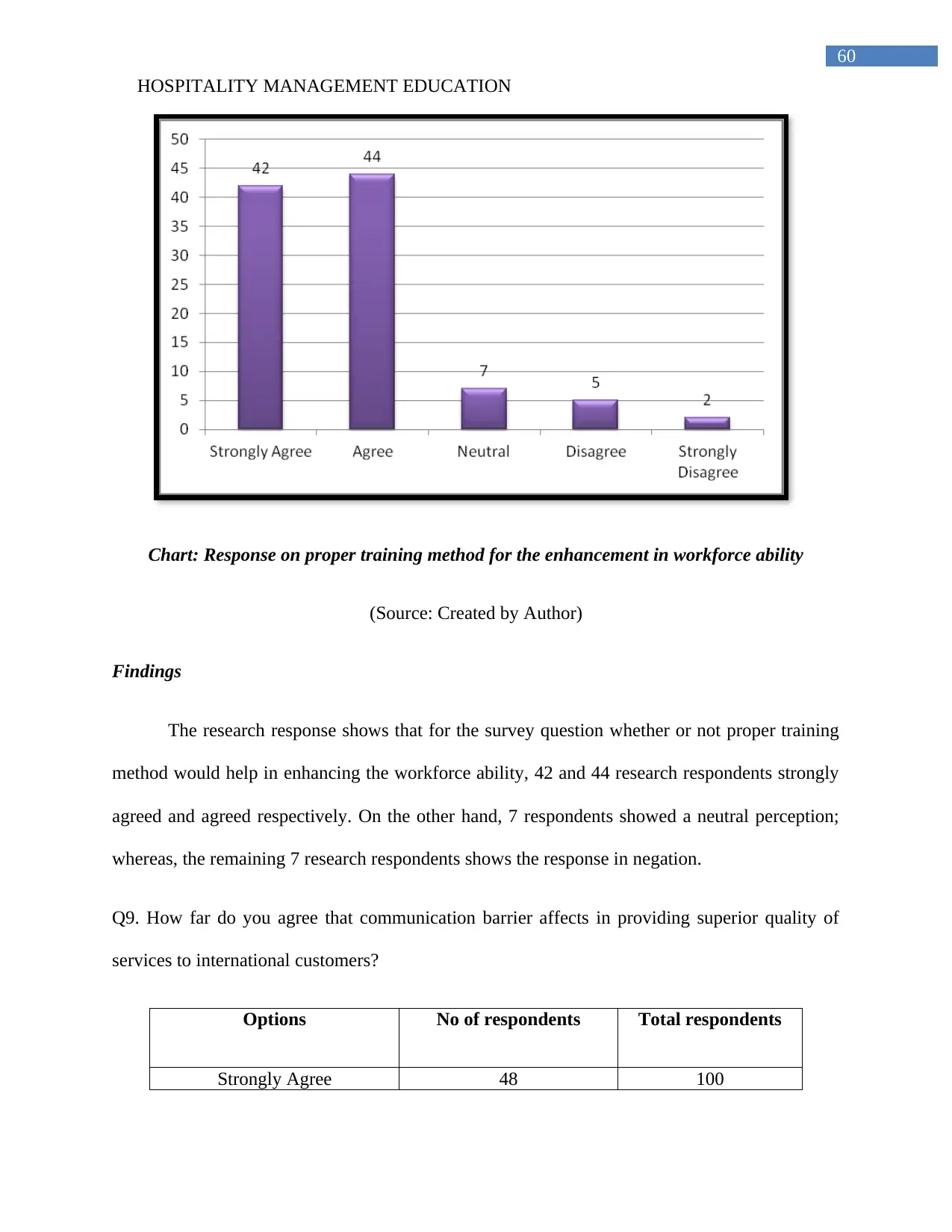
60
HOSPITALITY MANAGEMENT EDUCATION
Chart: Response on proper training method for the enhancement in workforce ability
(Source: Created by Author)
Findings
The research response shows that for the survey question whether or not proper training
method would help in enhancing the workforce ability, 42 and 44 research respondents strongly
agreed and agreed respectively. On the other hand, 7 respondents showed a neutral perception;
whereas, the remaining 7 research respondents shows the response in negation.
Q9. How far do you agree that communication barrier affects in providing superior quality of
services to international customers?
Options No of respondents Total respondents
Strongly Agree 48 100
HOSPITALITY MANAGEMENT EDUCATION
Chart: Response on proper training method for the enhancement in workforce ability
(Source: Created by Author)
Findings
The research response shows that for the survey question whether or not proper training
method would help in enhancing the workforce ability, 42 and 44 research respondents strongly
agreed and agreed respectively. On the other hand, 7 respondents showed a neutral perception;
whereas, the remaining 7 research respondents shows the response in negation.
Q9. How far do you agree that communication barrier affects in providing superior quality of
services to international customers?
Options No of respondents Total respondents
Strongly Agree 48 100
Paraphrase This Document
Need a fresh take? Get an instant paraphrase of this document with our AI Paraphraser
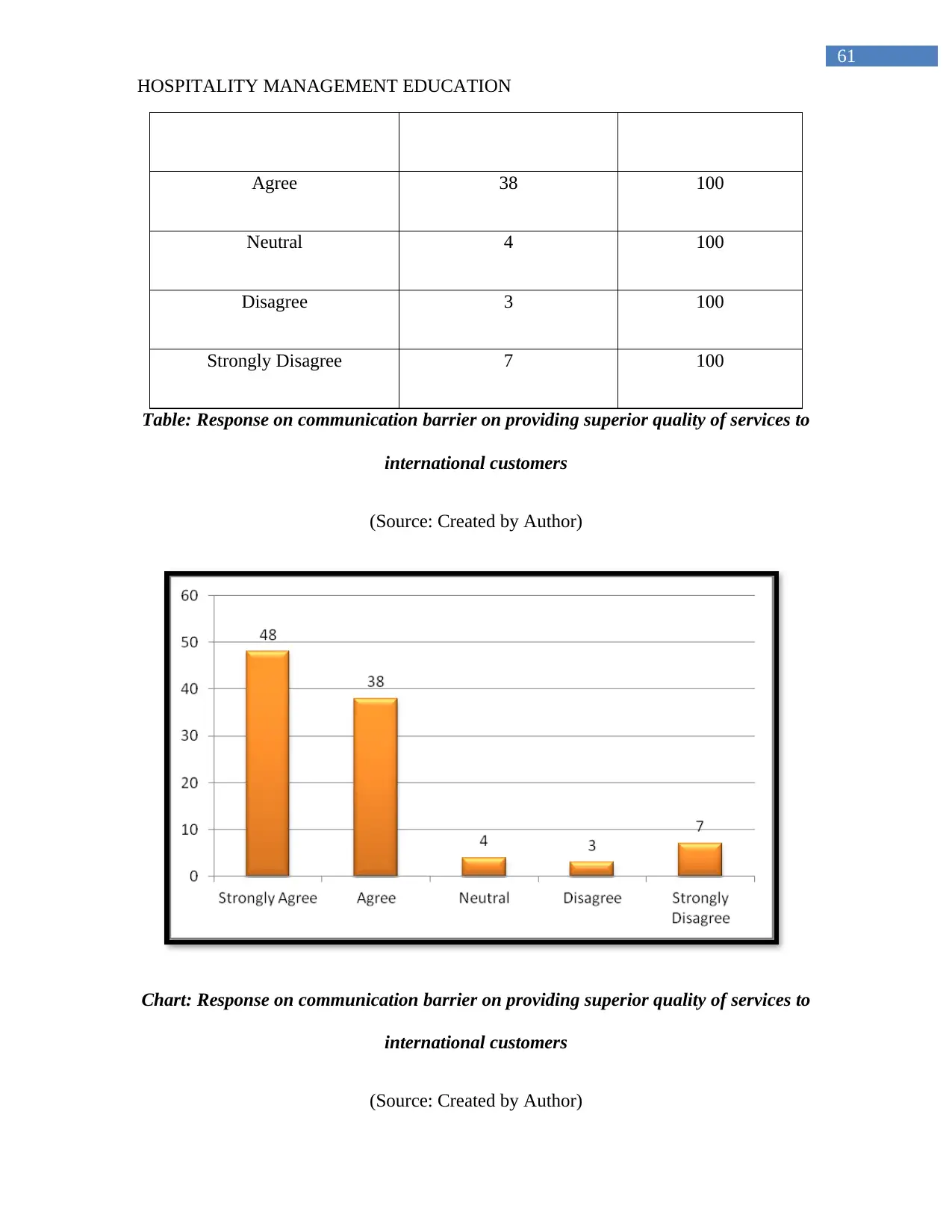
61
HOSPITALITY MANAGEMENT EDUCATION
Agree 38 100
Neutral 4 100
Disagree 3 100
Strongly Disagree 7 100
Table: Response on communication barrier on providing superior quality of services to
international customers
(Source: Created by Author)
Chart: Response on communication barrier on providing superior quality of services to
international customers
(Source: Created by Author)
HOSPITALITY MANAGEMENT EDUCATION
Agree 38 100
Neutral 4 100
Disagree 3 100
Strongly Disagree 7 100
Table: Response on communication barrier on providing superior quality of services to
international customers
(Source: Created by Author)
Chart: Response on communication barrier on providing superior quality of services to
international customers
(Source: Created by Author)
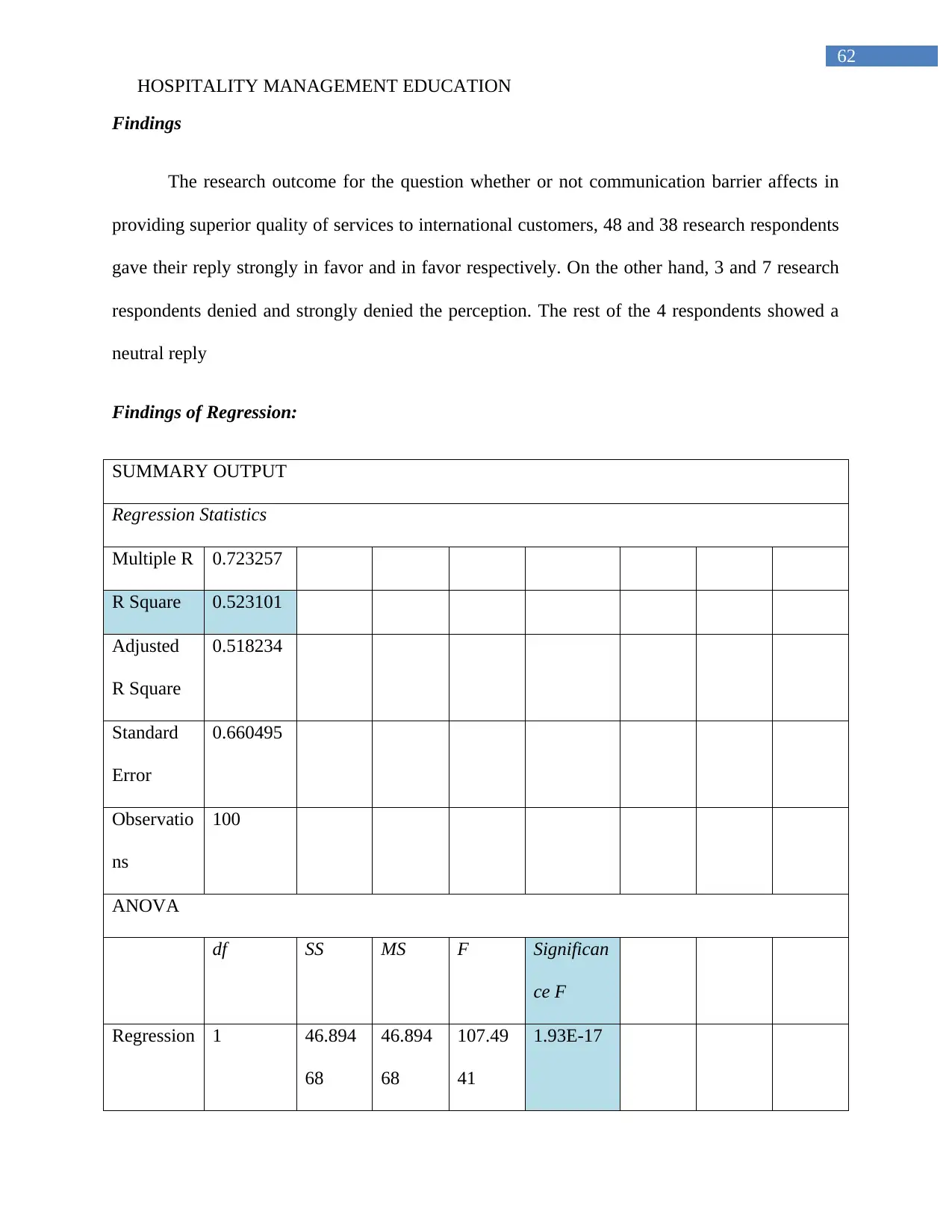
62
HOSPITALITY MANAGEMENT EDUCATION
Findings
The research outcome for the question whether or not communication barrier affects in
providing superior quality of services to international customers, 48 and 38 research respondents
gave their reply strongly in favor and in favor respectively. On the other hand, 3 and 7 research
respondents denied and strongly denied the perception. The rest of the 4 respondents showed a
neutral reply
Findings of Regression:
SUMMARY OUTPUT
Regression Statistics
Multiple R 0.723257
R Square 0.523101
Adjusted
R Square
0.518234
Standard
Error
0.660495
Observatio
ns
100
ANOVA
df SS MS F Significan
ce F
Regression 1 46.894
68
46.894
68
107.49
41
1.93E-17
HOSPITALITY MANAGEMENT EDUCATION
Findings
The research outcome for the question whether or not communication barrier affects in
providing superior quality of services to international customers, 48 and 38 research respondents
gave their reply strongly in favor and in favor respectively. On the other hand, 3 and 7 research
respondents denied and strongly denied the perception. The rest of the 4 respondents showed a
neutral reply
Findings of Regression:
SUMMARY OUTPUT
Regression Statistics
Multiple R 0.723257
R Square 0.523101
Adjusted
R Square
0.518234
Standard
Error
0.660495
Observatio
ns
100
ANOVA
df SS MS F Significan
ce F
Regression 1 46.894
68
46.894
68
107.49
41
1.93E-17
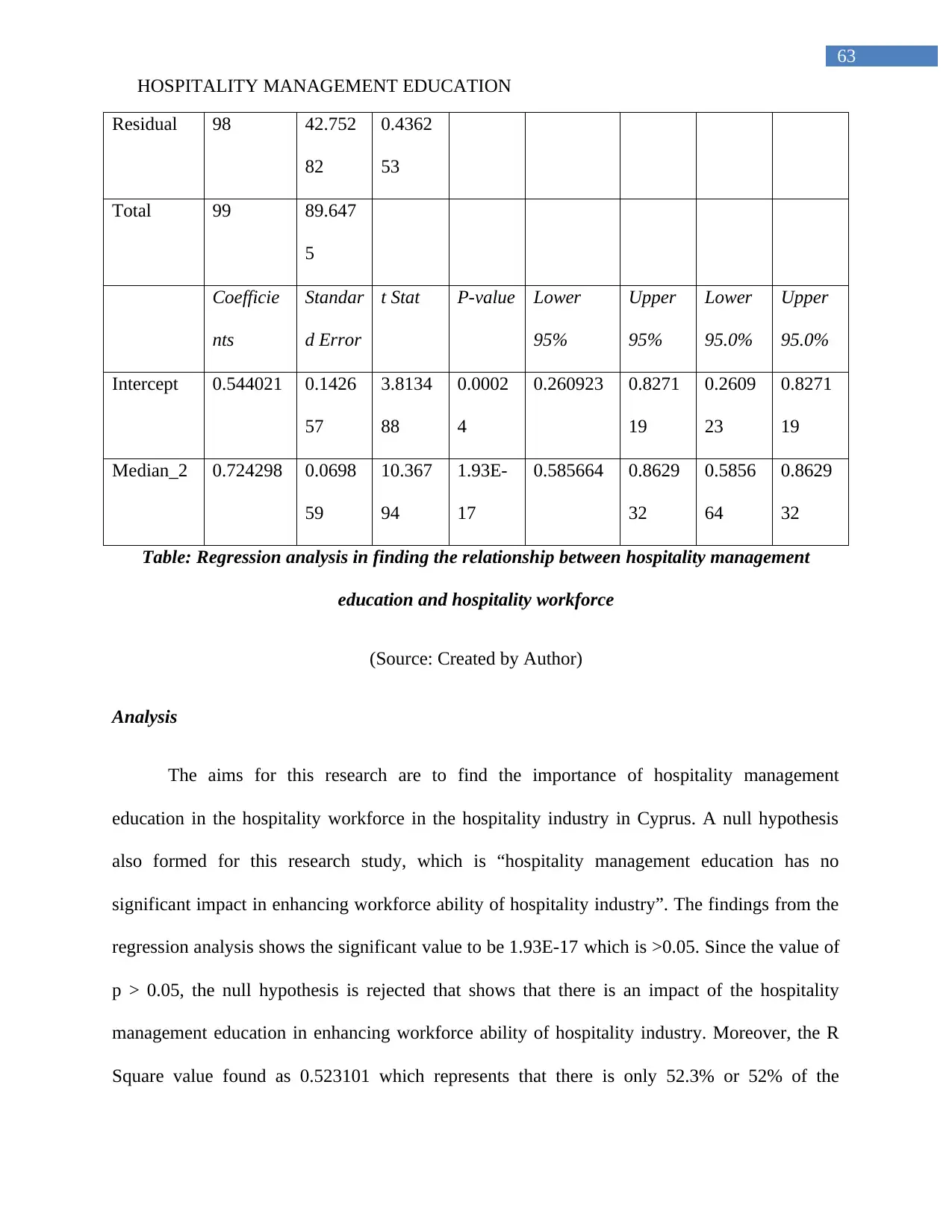
63
HOSPITALITY MANAGEMENT EDUCATION
Residual 98 42.752
82
0.4362
53
Total 99 89.647
5
Coefficie
nts
Standar
d Error
t Stat P-value Lower
95%
Upper
95%
Lower
95.0%
Upper
95.0%
Intercept 0.544021 0.1426
57
3.8134
88
0.0002
4
0.260923 0.8271
19
0.2609
23
0.8271
19
Median_2 0.724298 0.0698
59
10.367
94
1.93E-
17
0.585664 0.8629
32
0.5856
64
0.8629
32
Table: Regression analysis in finding the relationship between hospitality management
education and hospitality workforce
(Source: Created by Author)
Analysis
The aims for this research are to find the importance of hospitality management
education in the hospitality workforce in the hospitality industry in Cyprus. A null hypothesis
also formed for this research study, which is “hospitality management education has no
significant impact in enhancing workforce ability of hospitality industry”. The findings from the
regression analysis shows the significant value to be 1.93E-17 which is >0.05. Since the value of
p > 0.05, the null hypothesis is rejected that shows that there is an impact of the hospitality
management education in enhancing workforce ability of hospitality industry. Moreover, the R
Square value found as 0.523101 which represents that there is only 52.3% or 52% of the
HOSPITALITY MANAGEMENT EDUCATION
Residual 98 42.752
82
0.4362
53
Total 99 89.647
5
Coefficie
nts
Standar
d Error
t Stat P-value Lower
95%
Upper
95%
Lower
95.0%
Upper
95.0%
Intercept 0.544021 0.1426
57
3.8134
88
0.0002
4
0.260923 0.8271
19
0.2609
23
0.8271
19
Median_2 0.724298 0.0698
59
10.367
94
1.93E-
17
0.585664 0.8629
32
0.5856
64
0.8629
32
Table: Regression analysis in finding the relationship between hospitality management
education and hospitality workforce
(Source: Created by Author)
Analysis
The aims for this research are to find the importance of hospitality management
education in the hospitality workforce in the hospitality industry in Cyprus. A null hypothesis
also formed for this research study, which is “hospitality management education has no
significant impact in enhancing workforce ability of hospitality industry”. The findings from the
regression analysis shows the significant value to be 1.93E-17 which is >0.05. Since the value of
p > 0.05, the null hypothesis is rejected that shows that there is an impact of the hospitality
management education in enhancing workforce ability of hospitality industry. Moreover, the R
Square value found as 0.523101 which represents that there is only 52.3% or 52% of the
Secure Best Marks with AI Grader
Need help grading? Try our AI Grader for instant feedback on your assignments.
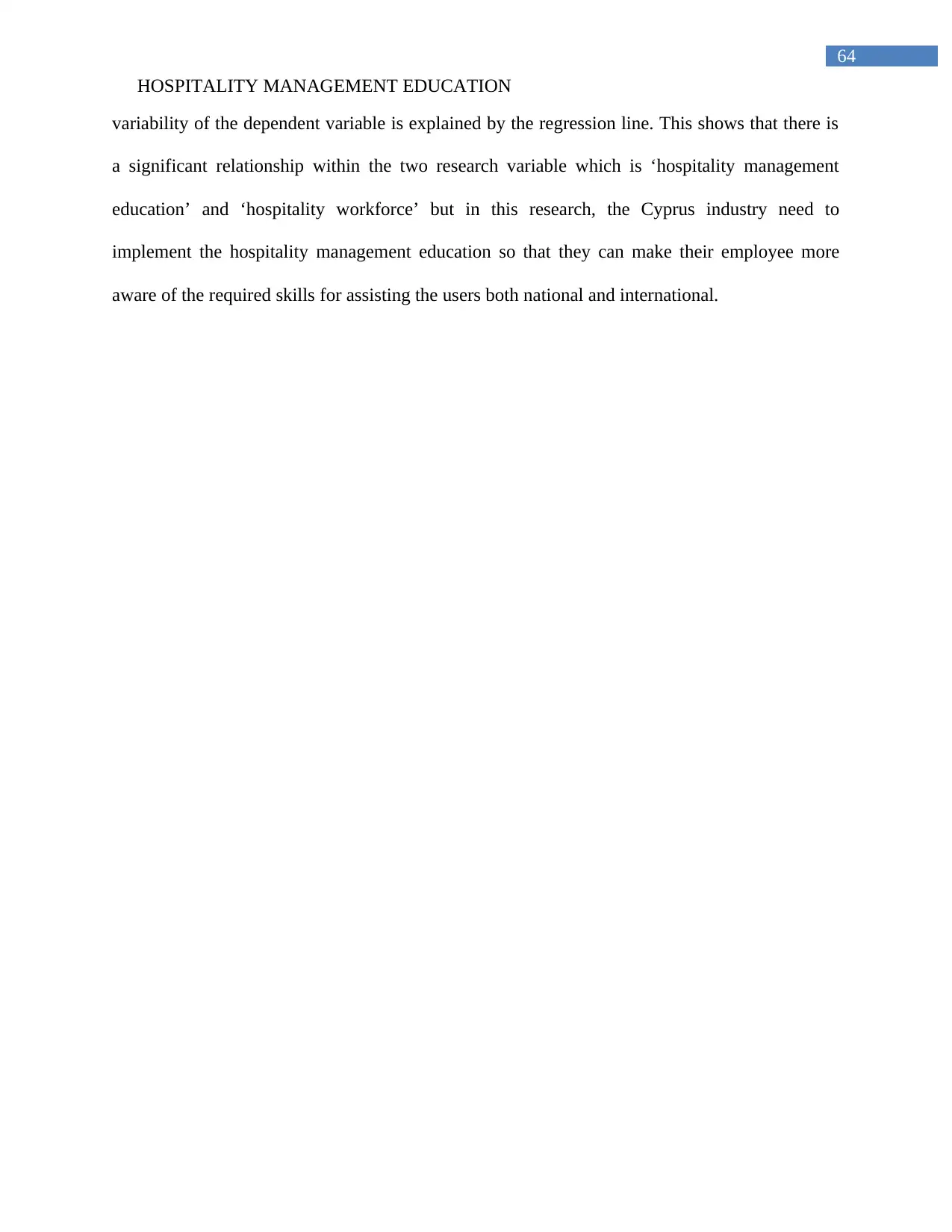
64
HOSPITALITY MANAGEMENT EDUCATION
variability of the dependent variable is explained by the regression line. This shows that there is
a significant relationship within the two research variable which is ‘hospitality management
education’ and ‘hospitality workforce’ but in this research, the Cyprus industry need to
implement the hospitality management education so that they can make their employee more
aware of the required skills for assisting the users both national and international.
HOSPITALITY MANAGEMENT EDUCATION
variability of the dependent variable is explained by the regression line. This shows that there is
a significant relationship within the two research variable which is ‘hospitality management
education’ and ‘hospitality workforce’ but in this research, the Cyprus industry need to
implement the hospitality management education so that they can make their employee more
aware of the required skills for assisting the users both national and international.
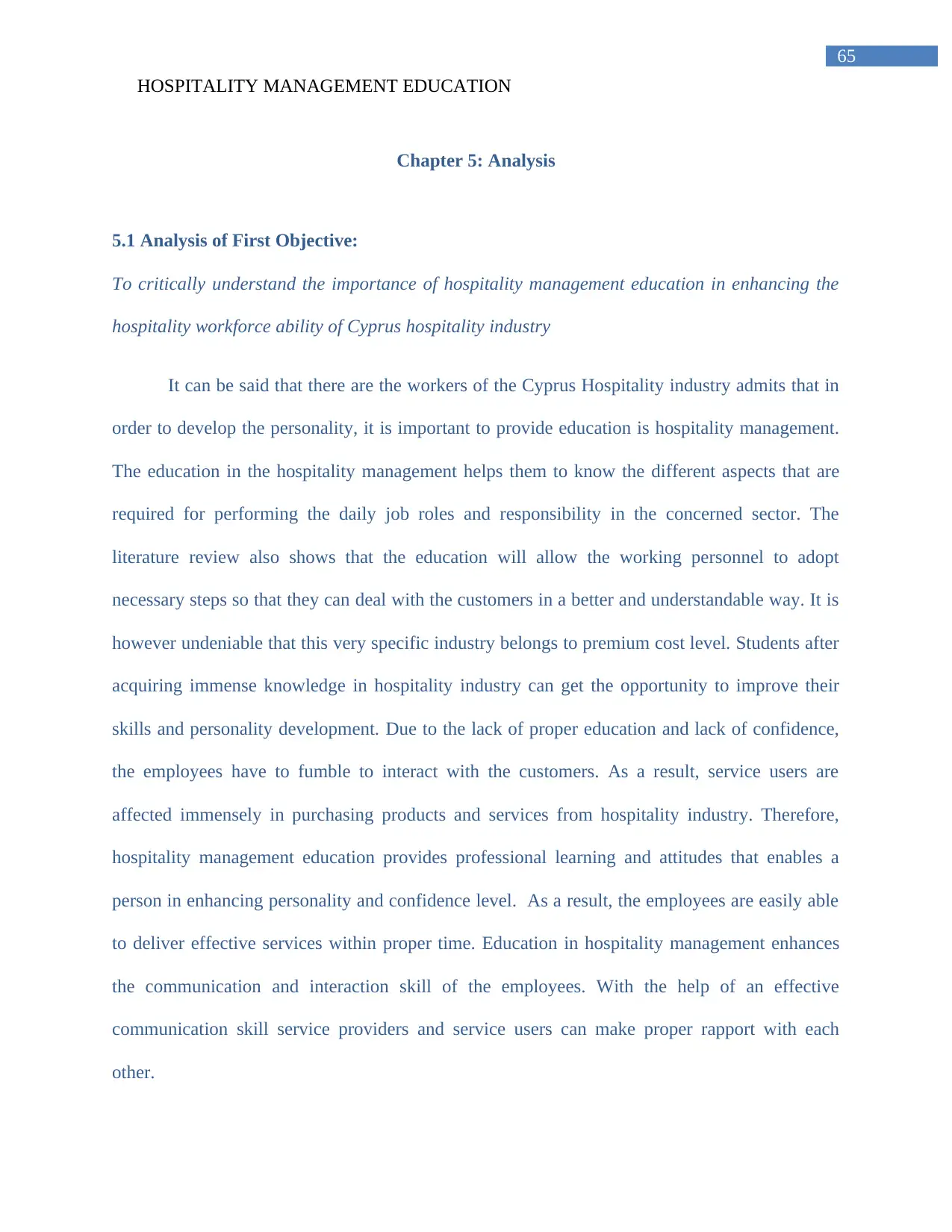
65
HOSPITALITY MANAGEMENT EDUCATION
Chapter 5: Analysis
5.1 Analysis of First Objective:
To critically understand the importance of hospitality management education in enhancing the
hospitality workforce ability of Cyprus hospitality industry
It can be said that there are the workers of the Cyprus Hospitality industry admits that in
order to develop the personality, it is important to provide education is hospitality management.
The education in the hospitality management helps them to know the different aspects that are
required for performing the daily job roles and responsibility in the concerned sector. The
literature review also shows that the education will allow the working personnel to adopt
necessary steps so that they can deal with the customers in a better and understandable way. It is
however undeniable that this very specific industry belongs to premium cost level. Students after
acquiring immense knowledge in hospitality industry can get the opportunity to improve their
skills and personality development. Due to the lack of proper education and lack of confidence,
the employees have to fumble to interact with the customers. As a result, service users are
affected immensely in purchasing products and services from hospitality industry. Therefore,
hospitality management education provides professional learning and attitudes that enables a
person in enhancing personality and confidence level. As a result, the employees are easily able
to deliver effective services within proper time. Education in hospitality management enhances
the communication and interaction skill of the employees. With the help of an effective
communication skill service providers and service users can make proper rapport with each
other.
HOSPITALITY MANAGEMENT EDUCATION
Chapter 5: Analysis
5.1 Analysis of First Objective:
To critically understand the importance of hospitality management education in enhancing the
hospitality workforce ability of Cyprus hospitality industry
It can be said that there are the workers of the Cyprus Hospitality industry admits that in
order to develop the personality, it is important to provide education is hospitality management.
The education in the hospitality management helps them to know the different aspects that are
required for performing the daily job roles and responsibility in the concerned sector. The
literature review also shows that the education will allow the working personnel to adopt
necessary steps so that they can deal with the customers in a better and understandable way. It is
however undeniable that this very specific industry belongs to premium cost level. Students after
acquiring immense knowledge in hospitality industry can get the opportunity to improve their
skills and personality development. Due to the lack of proper education and lack of confidence,
the employees have to fumble to interact with the customers. As a result, service users are
affected immensely in purchasing products and services from hospitality industry. Therefore,
hospitality management education provides professional learning and attitudes that enables a
person in enhancing personality and confidence level. As a result, the employees are easily able
to deliver effective services within proper time. Education in hospitality management enhances
the communication and interaction skill of the employees. With the help of an effective
communication skill service providers and service users can make proper rapport with each
other.
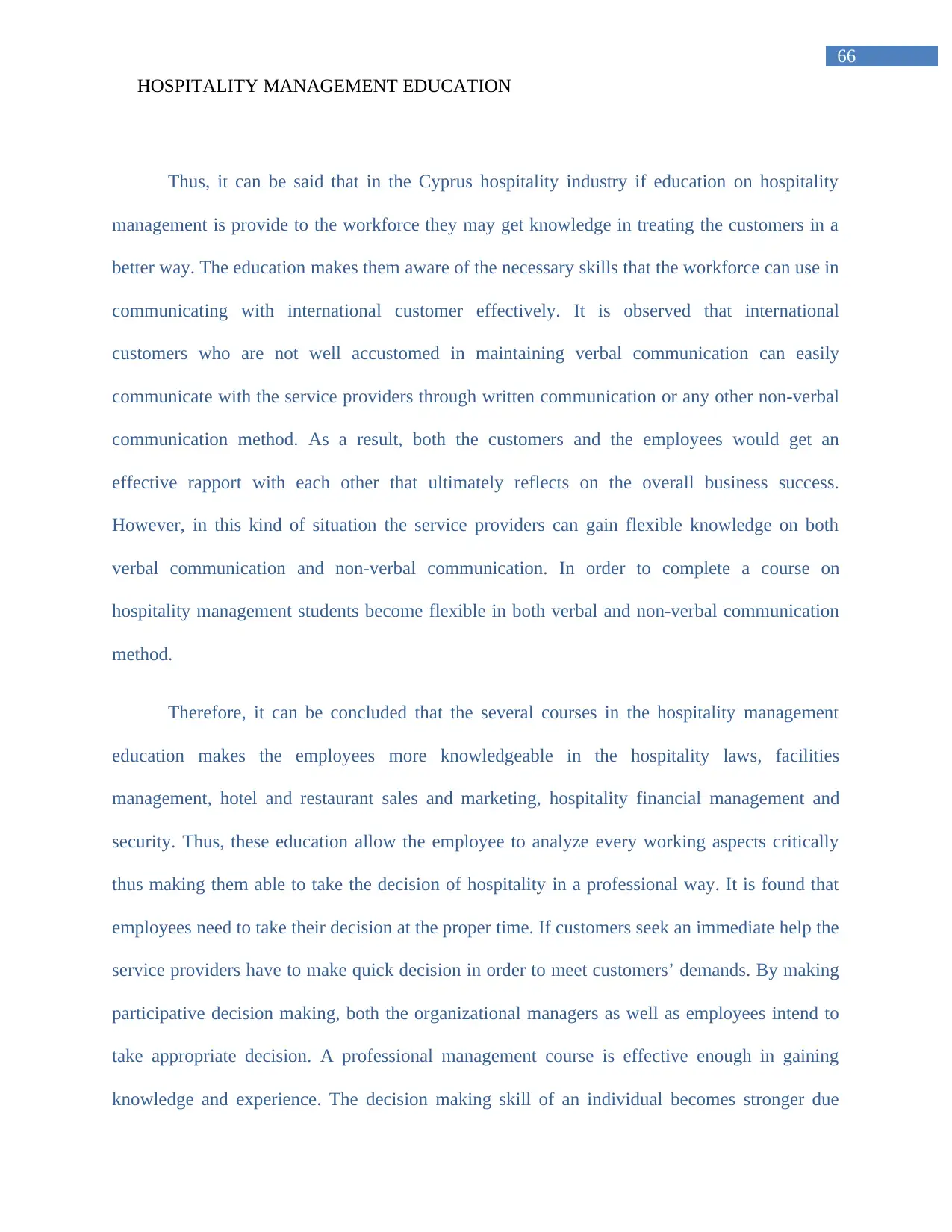
66
HOSPITALITY MANAGEMENT EDUCATION
Thus, it can be said that in the Cyprus hospitality industry if education on hospitality
management is provide to the workforce they may get knowledge in treating the customers in a
better way. The education makes them aware of the necessary skills that the workforce can use in
communicating with international customer effectively. It is observed that international
customers who are not well accustomed in maintaining verbal communication can easily
communicate with the service providers through written communication or any other non-verbal
communication method. As a result, both the customers and the employees would get an
effective rapport with each other that ultimately reflects on the overall business success.
However, in this kind of situation the service providers can gain flexible knowledge on both
verbal communication and non-verbal communication. In order to complete a course on
hospitality management students become flexible in both verbal and non-verbal communication
method.
Therefore, it can be concluded that the several courses in the hospitality management
education makes the employees more knowledgeable in the hospitality laws, facilities
management, hotel and restaurant sales and marketing, hospitality financial management and
security. Thus, these education allow the employee to analyze every working aspects critically
thus making them able to take the decision of hospitality in a professional way. It is found that
employees need to take their decision at the proper time. If customers seek an immediate help the
service providers have to make quick decision in order to meet customers’ demands. By making
participative decision making, both the organizational managers as well as employees intend to
take appropriate decision. A professional management course is effective enough in gaining
knowledge and experience. The decision making skill of an individual becomes stronger due
HOSPITALITY MANAGEMENT EDUCATION
Thus, it can be said that in the Cyprus hospitality industry if education on hospitality
management is provide to the workforce they may get knowledge in treating the customers in a
better way. The education makes them aware of the necessary skills that the workforce can use in
communicating with international customer effectively. It is observed that international
customers who are not well accustomed in maintaining verbal communication can easily
communicate with the service providers through written communication or any other non-verbal
communication method. As a result, both the customers and the employees would get an
effective rapport with each other that ultimately reflects on the overall business success.
However, in this kind of situation the service providers can gain flexible knowledge on both
verbal communication and non-verbal communication. In order to complete a course on
hospitality management students become flexible in both verbal and non-verbal communication
method.
Therefore, it can be concluded that the several courses in the hospitality management
education makes the employees more knowledgeable in the hospitality laws, facilities
management, hotel and restaurant sales and marketing, hospitality financial management and
security. Thus, these education allow the employee to analyze every working aspects critically
thus making them able to take the decision of hospitality in a professional way. It is found that
employees need to take their decision at the proper time. If customers seek an immediate help the
service providers have to make quick decision in order to meet customers’ demands. By making
participative decision making, both the organizational managers as well as employees intend to
take appropriate decision. A professional management course is effective enough in gaining
knowledge and experience. The decision making skill of an individual becomes stronger due
Paraphrase This Document
Need a fresh take? Get an instant paraphrase of this document with our AI Paraphraser
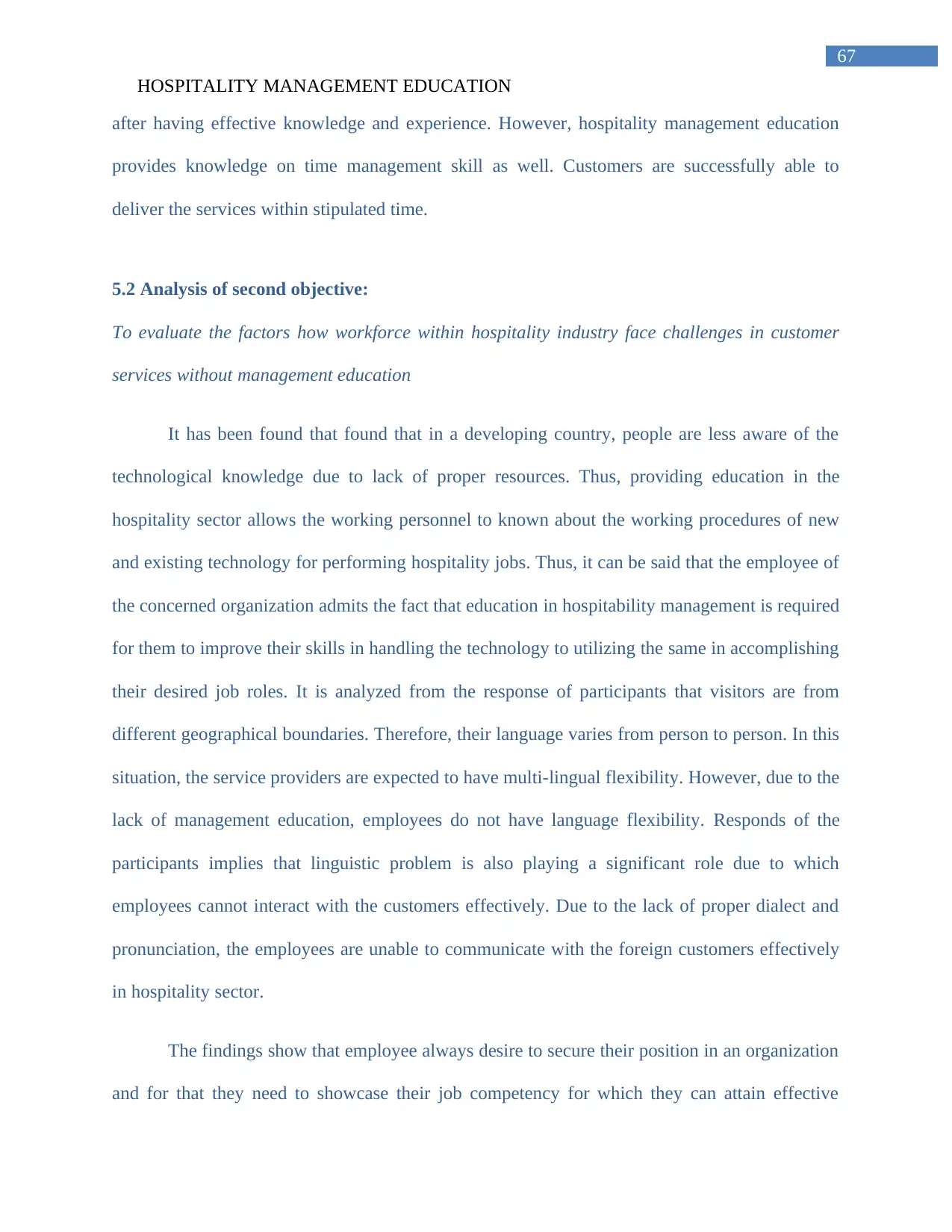
67
HOSPITALITY MANAGEMENT EDUCATION
after having effective knowledge and experience. However, hospitality management education
provides knowledge on time management skill as well. Customers are successfully able to
deliver the services within stipulated time.
5.2 Analysis of second objective:
To evaluate the factors how workforce within hospitality industry face challenges in customer
services without management education
It has been found that found that in a developing country, people are less aware of the
technological knowledge due to lack of proper resources. Thus, providing education in the
hospitality sector allows the working personnel to known about the working procedures of new
and existing technology for performing hospitality jobs. Thus, it can be said that the employee of
the concerned organization admits the fact that education in hospitability management is required
for them to improve their skills in handling the technology to utilizing the same in accomplishing
their desired job roles. It is analyzed from the response of participants that visitors are from
different geographical boundaries. Therefore, their language varies from person to person. In this
situation, the service providers are expected to have multi-lingual flexibility. However, due to the
lack of management education, employees do not have language flexibility. Responds of the
participants implies that linguistic problem is also playing a significant role due to which
employees cannot interact with the customers effectively. Due to the lack of proper dialect and
pronunciation, the employees are unable to communicate with the foreign customers effectively
in hospitality sector.
The findings show that employee always desire to secure their position in an organization
and for that they need to showcase their job competency for which they can attain effective
HOSPITALITY MANAGEMENT EDUCATION
after having effective knowledge and experience. However, hospitality management education
provides knowledge on time management skill as well. Customers are successfully able to
deliver the services within stipulated time.
5.2 Analysis of second objective:
To evaluate the factors how workforce within hospitality industry face challenges in customer
services without management education
It has been found that found that in a developing country, people are less aware of the
technological knowledge due to lack of proper resources. Thus, providing education in the
hospitality sector allows the working personnel to known about the working procedures of new
and existing technology for performing hospitality jobs. Thus, it can be said that the employee of
the concerned organization admits the fact that education in hospitability management is required
for them to improve their skills in handling the technology to utilizing the same in accomplishing
their desired job roles. It is analyzed from the response of participants that visitors are from
different geographical boundaries. Therefore, their language varies from person to person. In this
situation, the service providers are expected to have multi-lingual flexibility. However, due to the
lack of management education, employees do not have language flexibility. Responds of the
participants implies that linguistic problem is also playing a significant role due to which
employees cannot interact with the customers effectively. Due to the lack of proper dialect and
pronunciation, the employees are unable to communicate with the foreign customers effectively
in hospitality sector.
The findings show that employee always desire to secure their position in an organization
and for that they need to showcase their job competency for which they can attain effective
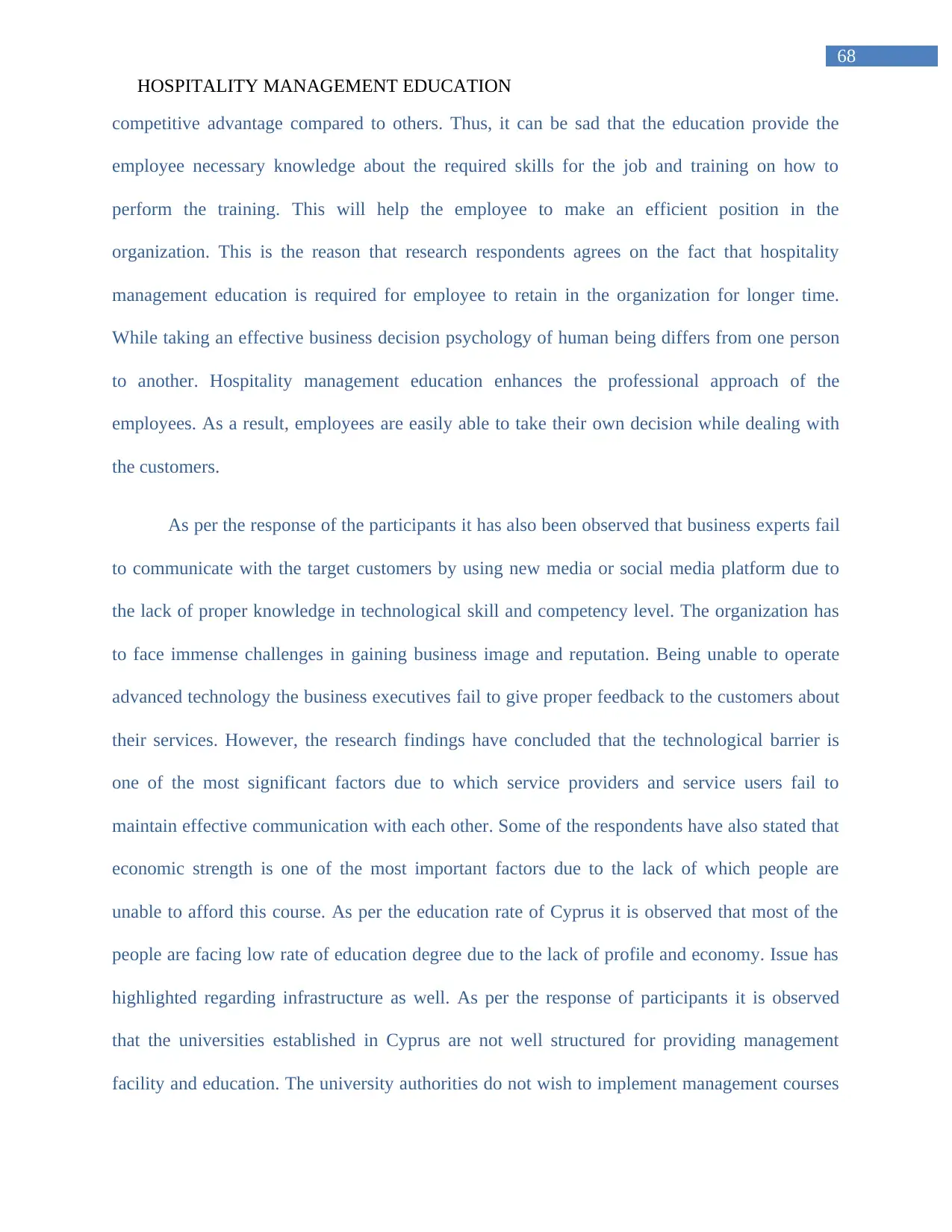
68
HOSPITALITY MANAGEMENT EDUCATION
competitive advantage compared to others. Thus, it can be sad that the education provide the
employee necessary knowledge about the required skills for the job and training on how to
perform the training. This will help the employee to make an efficient position in the
organization. This is the reason that research respondents agrees on the fact that hospitality
management education is required for employee to retain in the organization for longer time.
While taking an effective business decision psychology of human being differs from one person
to another. Hospitality management education enhances the professional approach of the
employees. As a result, employees are easily able to take their own decision while dealing with
the customers.
As per the response of the participants it has also been observed that business experts fail
to communicate with the target customers by using new media or social media platform due to
the lack of proper knowledge in technological skill and competency level. The organization has
to face immense challenges in gaining business image and reputation. Being unable to operate
advanced technology the business executives fail to give proper feedback to the customers about
their services. However, the research findings have concluded that the technological barrier is
one of the most significant factors due to which service providers and service users fail to
maintain effective communication with each other. Some of the respondents have also stated that
economic strength is one of the most important factors due to the lack of which people are
unable to afford this course. As per the education rate of Cyprus it is observed that most of the
people are facing low rate of education degree due to the lack of profile and economy. Issue has
highlighted regarding infrastructure as well. As per the response of participants it is observed
that the universities established in Cyprus are not well structured for providing management
facility and education. The university authorities do not wish to implement management courses
HOSPITALITY MANAGEMENT EDUCATION
competitive advantage compared to others. Thus, it can be sad that the education provide the
employee necessary knowledge about the required skills for the job and training on how to
perform the training. This will help the employee to make an efficient position in the
organization. This is the reason that research respondents agrees on the fact that hospitality
management education is required for employee to retain in the organization for longer time.
While taking an effective business decision psychology of human being differs from one person
to another. Hospitality management education enhances the professional approach of the
employees. As a result, employees are easily able to take their own decision while dealing with
the customers.
As per the response of the participants it has also been observed that business experts fail
to communicate with the target customers by using new media or social media platform due to
the lack of proper knowledge in technological skill and competency level. The organization has
to face immense challenges in gaining business image and reputation. Being unable to operate
advanced technology the business executives fail to give proper feedback to the customers about
their services. However, the research findings have concluded that the technological barrier is
one of the most significant factors due to which service providers and service users fail to
maintain effective communication with each other. Some of the respondents have also stated that
economic strength is one of the most important factors due to the lack of which people are
unable to afford this course. As per the education rate of Cyprus it is observed that most of the
people are facing low rate of education degree due to the lack of profile and economy. Issue has
highlighted regarding infrastructure as well. As per the response of participants it is observed
that the universities established in Cyprus are not well structured for providing management
facility and education. The university authorities do not wish to implement management courses
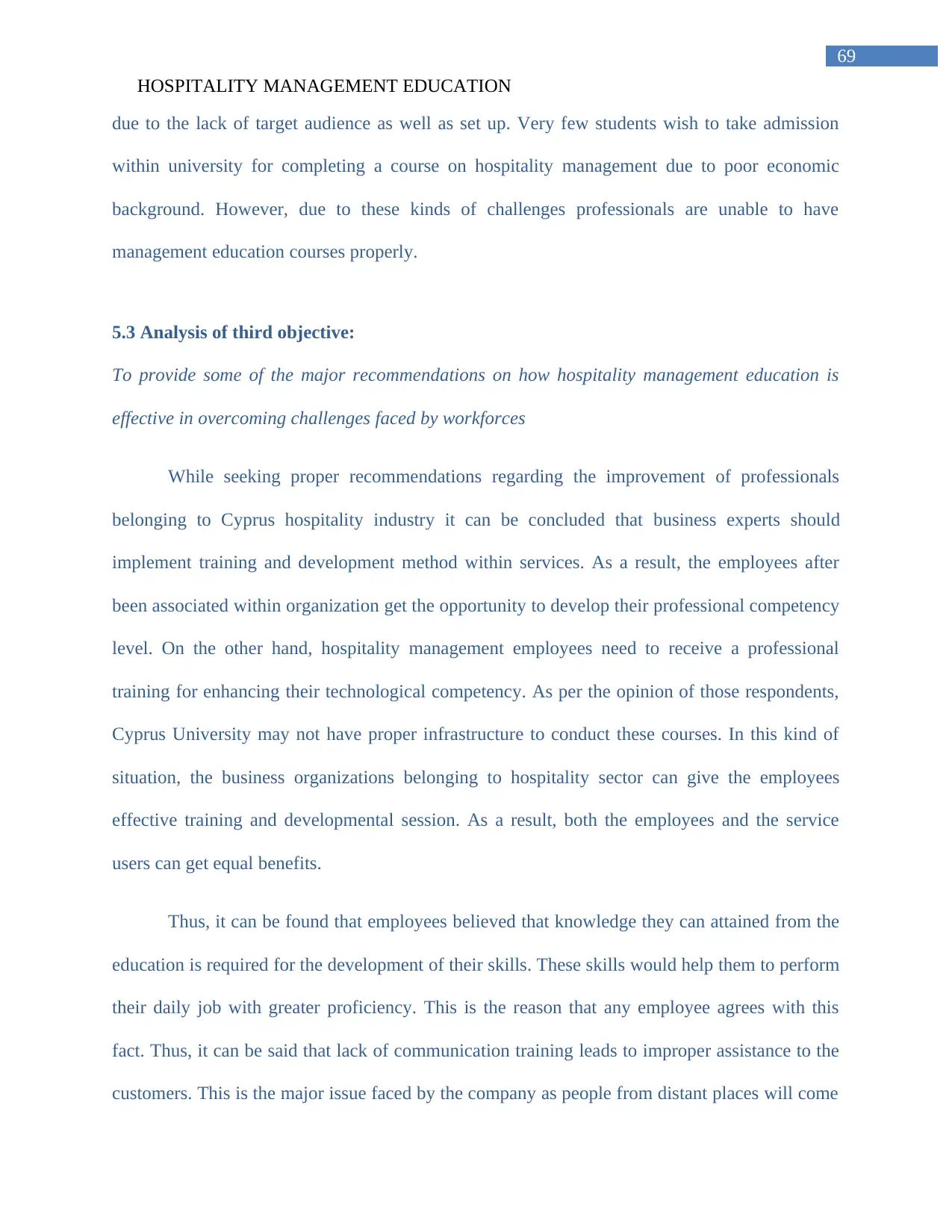
69
HOSPITALITY MANAGEMENT EDUCATION
due to the lack of target audience as well as set up. Very few students wish to take admission
within university for completing a course on hospitality management due to poor economic
background. However, due to these kinds of challenges professionals are unable to have
management education courses properly.
5.3 Analysis of third objective:
To provide some of the major recommendations on how hospitality management education is
effective in overcoming challenges faced by workforces
While seeking proper recommendations regarding the improvement of professionals
belonging to Cyprus hospitality industry it can be concluded that business experts should
implement training and development method within services. As a result, the employees after
been associated within organization get the opportunity to develop their professional competency
level. On the other hand, hospitality management employees need to receive a professional
training for enhancing their technological competency. As per the opinion of those respondents,
Cyprus University may not have proper infrastructure to conduct these courses. In this kind of
situation, the business organizations belonging to hospitality sector can give the employees
effective training and developmental session. As a result, both the employees and the service
users can get equal benefits.
Thus, it can be found that employees believed that knowledge they can attained from the
education is required for the development of their skills. These skills would help them to perform
their daily job with greater proficiency. This is the reason that any employee agrees with this
fact. Thus, it can be said that lack of communication training leads to improper assistance to the
customers. This is the major issue faced by the company as people from distant places will come
HOSPITALITY MANAGEMENT EDUCATION
due to the lack of target audience as well as set up. Very few students wish to take admission
within university for completing a course on hospitality management due to poor economic
background. However, due to these kinds of challenges professionals are unable to have
management education courses properly.
5.3 Analysis of third objective:
To provide some of the major recommendations on how hospitality management education is
effective in overcoming challenges faced by workforces
While seeking proper recommendations regarding the improvement of professionals
belonging to Cyprus hospitality industry it can be concluded that business experts should
implement training and development method within services. As a result, the employees after
been associated within organization get the opportunity to develop their professional competency
level. On the other hand, hospitality management employees need to receive a professional
training for enhancing their technological competency. As per the opinion of those respondents,
Cyprus University may not have proper infrastructure to conduct these courses. In this kind of
situation, the business organizations belonging to hospitality sector can give the employees
effective training and developmental session. As a result, both the employees and the service
users can get equal benefits.
Thus, it can be found that employees believed that knowledge they can attained from the
education is required for the development of their skills. These skills would help them to perform
their daily job with greater proficiency. This is the reason that any employee agrees with this
fact. Thus, it can be said that lack of communication training leads to improper assistance to the
customers. This is the major issue faced by the company as people from distant places will come
Secure Best Marks with AI Grader
Need help grading? Try our AI Grader for instant feedback on your assignments.
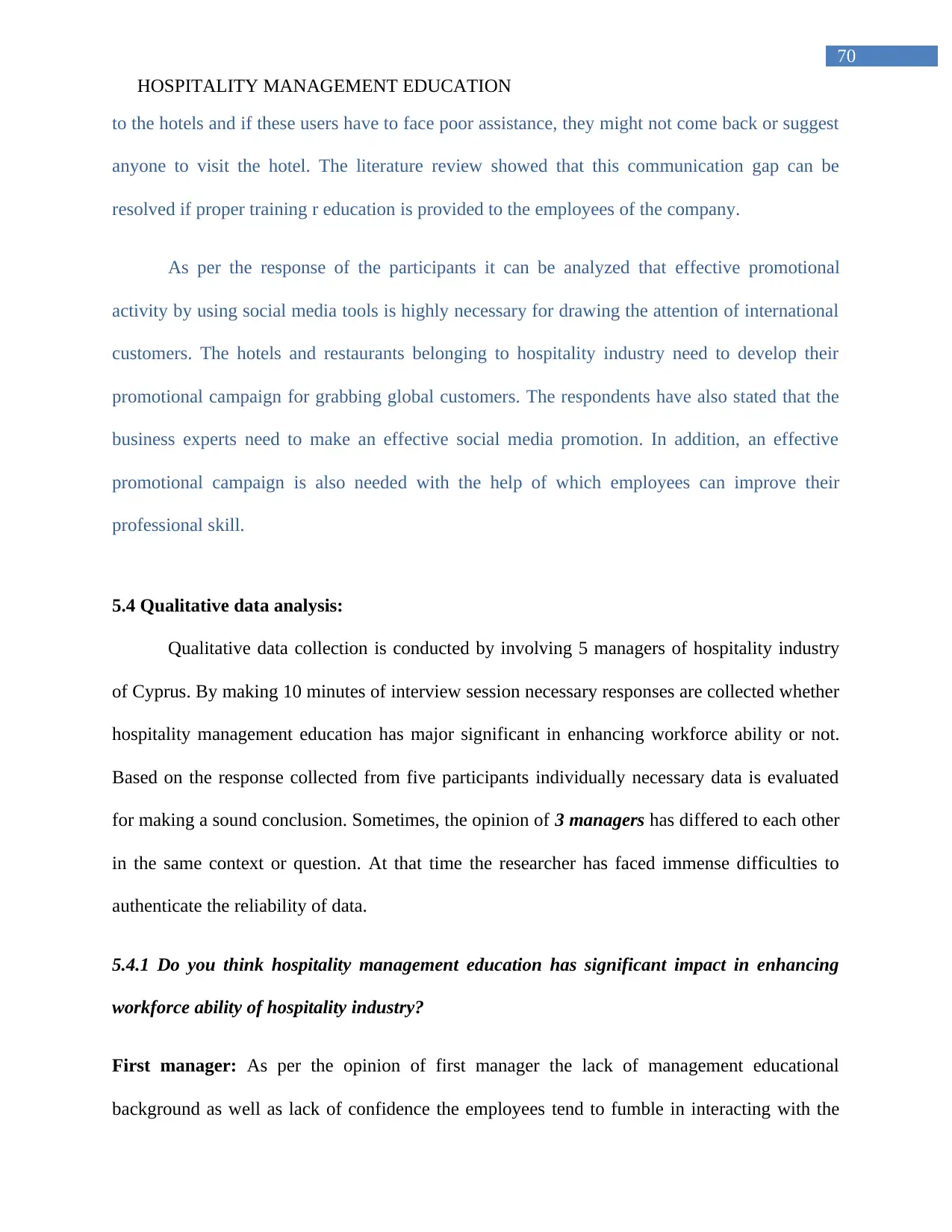
70
HOSPITALITY MANAGEMENT EDUCATION
to the hotels and if these users have to face poor assistance, they might not come back or suggest
anyone to visit the hotel. The literature review showed that this communication gap can be
resolved if proper training r education is provided to the employees of the company.
As per the response of the participants it can be analyzed that effective promotional
activity by using social media tools is highly necessary for drawing the attention of international
customers. The hotels and restaurants belonging to hospitality industry need to develop their
promotional campaign for grabbing global customers. The respondents have also stated that the
business experts need to make an effective social media promotion. In addition, an effective
promotional campaign is also needed with the help of which employees can improve their
professional skill.
5.4 Qualitative data analysis:
Qualitative data collection is conducted by involving 5 managers of hospitality industry
of Cyprus. By making 10 minutes of interview session necessary responses are collected whether
hospitality management education has major significant in enhancing workforce ability or not.
Based on the response collected from five participants individually necessary data is evaluated
for making a sound conclusion. Sometimes, the opinion of 3 managers has differed to each other
in the same context or question. At that time the researcher has faced immense difficulties to
authenticate the reliability of data.
5.4.1 Do you think hospitality management education has significant impact in enhancing
workforce ability of hospitality industry?
First manager: As per the opinion of first manager the lack of management educational
background as well as lack of confidence the employees tend to fumble in interacting with the
HOSPITALITY MANAGEMENT EDUCATION
to the hotels and if these users have to face poor assistance, they might not come back or suggest
anyone to visit the hotel. The literature review showed that this communication gap can be
resolved if proper training r education is provided to the employees of the company.
As per the response of the participants it can be analyzed that effective promotional
activity by using social media tools is highly necessary for drawing the attention of international
customers. The hotels and restaurants belonging to hospitality industry need to develop their
promotional campaign for grabbing global customers. The respondents have also stated that the
business experts need to make an effective social media promotion. In addition, an effective
promotional campaign is also needed with the help of which employees can improve their
professional skill.
5.4 Qualitative data analysis:
Qualitative data collection is conducted by involving 5 managers of hospitality industry
of Cyprus. By making 10 minutes of interview session necessary responses are collected whether
hospitality management education has major significant in enhancing workforce ability or not.
Based on the response collected from five participants individually necessary data is evaluated
for making a sound conclusion. Sometimes, the opinion of 3 managers has differed to each other
in the same context or question. At that time the researcher has faced immense difficulties to
authenticate the reliability of data.
5.4.1 Do you think hospitality management education has significant impact in enhancing
workforce ability of hospitality industry?
First manager: As per the opinion of first manager the lack of management educational
background as well as lack of confidence the employees tend to fumble in interacting with the
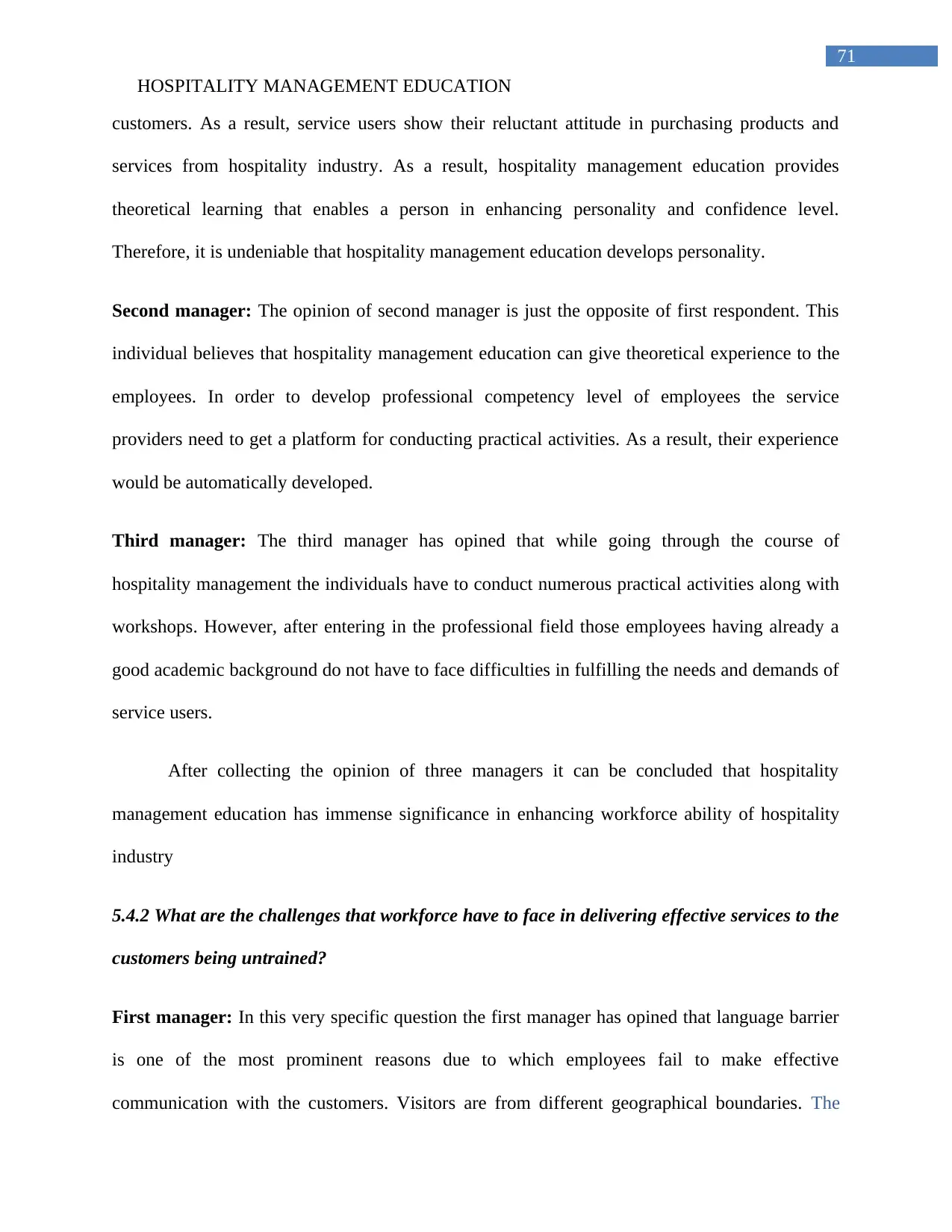
71
HOSPITALITY MANAGEMENT EDUCATION
customers. As a result, service users show their reluctant attitude in purchasing products and
services from hospitality industry. As a result, hospitality management education provides
theoretical learning that enables a person in enhancing personality and confidence level.
Therefore, it is undeniable that hospitality management education develops personality.
Second manager: The opinion of second manager is just the opposite of first respondent. This
individual believes that hospitality management education can give theoretical experience to the
employees. In order to develop professional competency level of employees the service
providers need to get a platform for conducting practical activities. As a result, their experience
would be automatically developed.
Third manager: The third manager has opined that while going through the course of
hospitality management the individuals have to conduct numerous practical activities along with
workshops. However, after entering in the professional field those employees having already a
good academic background do not have to face difficulties in fulfilling the needs and demands of
service users.
After collecting the opinion of three managers it can be concluded that hospitality
management education has immense significance in enhancing workforce ability of hospitality
industry
5.4.2 What are the challenges that workforce have to face in delivering effective services to the
customers being untrained?
First manager: In this very specific question the first manager has opined that language barrier
is one of the most prominent reasons due to which employees fail to make effective
communication with the customers. Visitors are from different geographical boundaries. The
HOSPITALITY MANAGEMENT EDUCATION
customers. As a result, service users show their reluctant attitude in purchasing products and
services from hospitality industry. As a result, hospitality management education provides
theoretical learning that enables a person in enhancing personality and confidence level.
Therefore, it is undeniable that hospitality management education develops personality.
Second manager: The opinion of second manager is just the opposite of first respondent. This
individual believes that hospitality management education can give theoretical experience to the
employees. In order to develop professional competency level of employees the service
providers need to get a platform for conducting practical activities. As a result, their experience
would be automatically developed.
Third manager: The third manager has opined that while going through the course of
hospitality management the individuals have to conduct numerous practical activities along with
workshops. However, after entering in the professional field those employees having already a
good academic background do not have to face difficulties in fulfilling the needs and demands of
service users.
After collecting the opinion of three managers it can be concluded that hospitality
management education has immense significance in enhancing workforce ability of hospitality
industry
5.4.2 What are the challenges that workforce have to face in delivering effective services to the
customers being untrained?
First manager: In this very specific question the first manager has opined that language barrier
is one of the most prominent reasons due to which employees fail to make effective
communication with the customers. Visitors are from different geographical boundaries. The
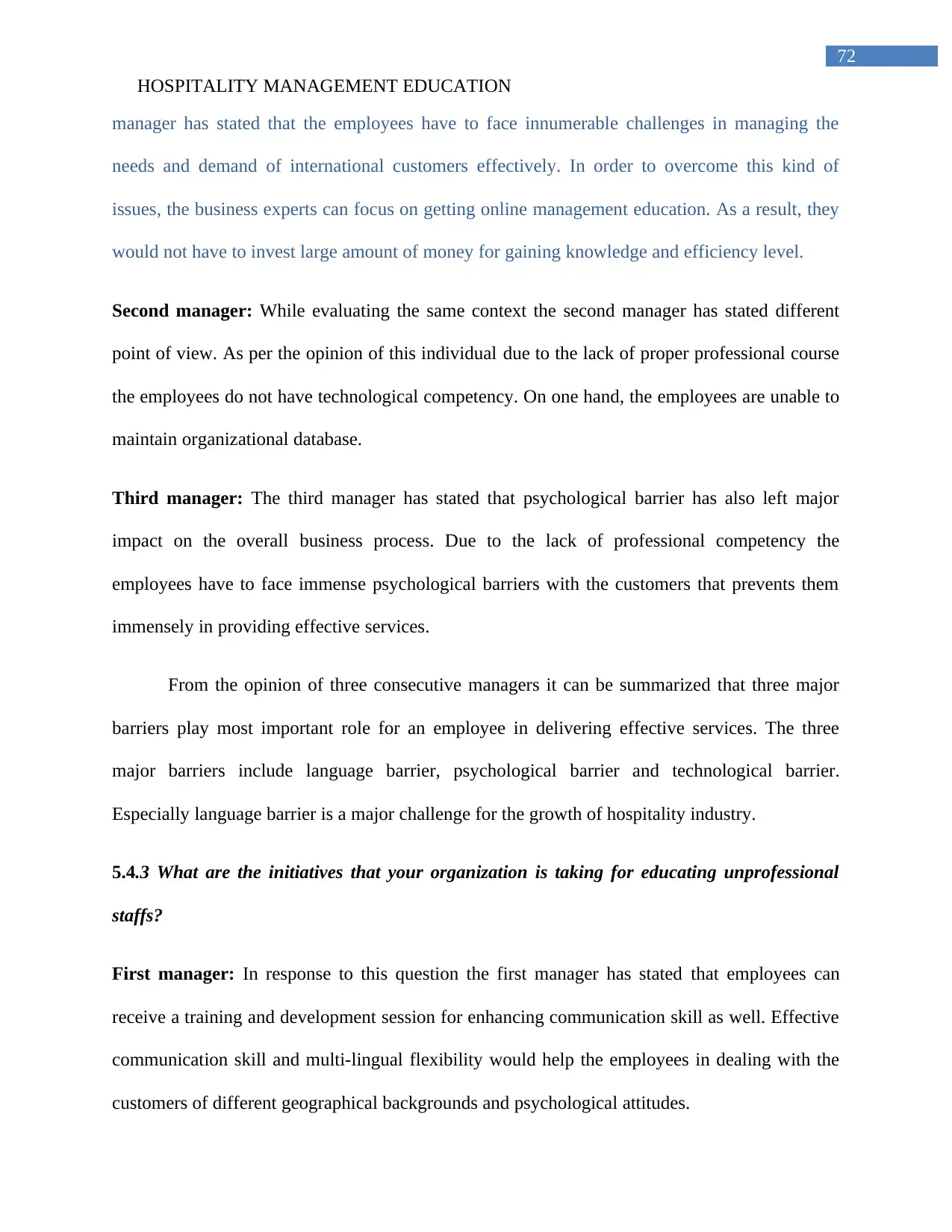
72
HOSPITALITY MANAGEMENT EDUCATION
manager has stated that the employees have to face innumerable challenges in managing the
needs and demand of international customers effectively. In order to overcome this kind of
issues, the business experts can focus on getting online management education. As a result, they
would not have to invest large amount of money for gaining knowledge and efficiency level.
Second manager: While evaluating the same context the second manager has stated different
point of view. As per the opinion of this individual due to the lack of proper professional course
the employees do not have technological competency. On one hand, the employees are unable to
maintain organizational database.
Third manager: The third manager has stated that psychological barrier has also left major
impact on the overall business process. Due to the lack of professional competency the
employees have to face immense psychological barriers with the customers that prevents them
immensely in providing effective services.
From the opinion of three consecutive managers it can be summarized that three major
barriers play most important role for an employee in delivering effective services. The three
major barriers include language barrier, psychological barrier and technological barrier.
Especially language barrier is a major challenge for the growth of hospitality industry.
5.4.3 What are the initiatives that your organization is taking for educating unprofessional
staffs?
First manager: In response to this question the first manager has stated that employees can
receive a training and development session for enhancing communication skill as well. Effective
communication skill and multi-lingual flexibility would help the employees in dealing with the
customers of different geographical backgrounds and psychological attitudes.
HOSPITALITY MANAGEMENT EDUCATION
manager has stated that the employees have to face innumerable challenges in managing the
needs and demand of international customers effectively. In order to overcome this kind of
issues, the business experts can focus on getting online management education. As a result, they
would not have to invest large amount of money for gaining knowledge and efficiency level.
Second manager: While evaluating the same context the second manager has stated different
point of view. As per the opinion of this individual due to the lack of proper professional course
the employees do not have technological competency. On one hand, the employees are unable to
maintain organizational database.
Third manager: The third manager has stated that psychological barrier has also left major
impact on the overall business process. Due to the lack of professional competency the
employees have to face immense psychological barriers with the customers that prevents them
immensely in providing effective services.
From the opinion of three consecutive managers it can be summarized that three major
barriers play most important role for an employee in delivering effective services. The three
major barriers include language barrier, psychological barrier and technological barrier.
Especially language barrier is a major challenge for the growth of hospitality industry.
5.4.3 What are the initiatives that your organization is taking for educating unprofessional
staffs?
First manager: In response to this question the first manager has stated that employees can
receive a training and development session for enhancing communication skill as well. Effective
communication skill and multi-lingual flexibility would help the employees in dealing with the
customers of different geographical backgrounds and psychological attitudes.
Paraphrase This Document
Need a fresh take? Get an instant paraphrase of this document with our AI Paraphraser
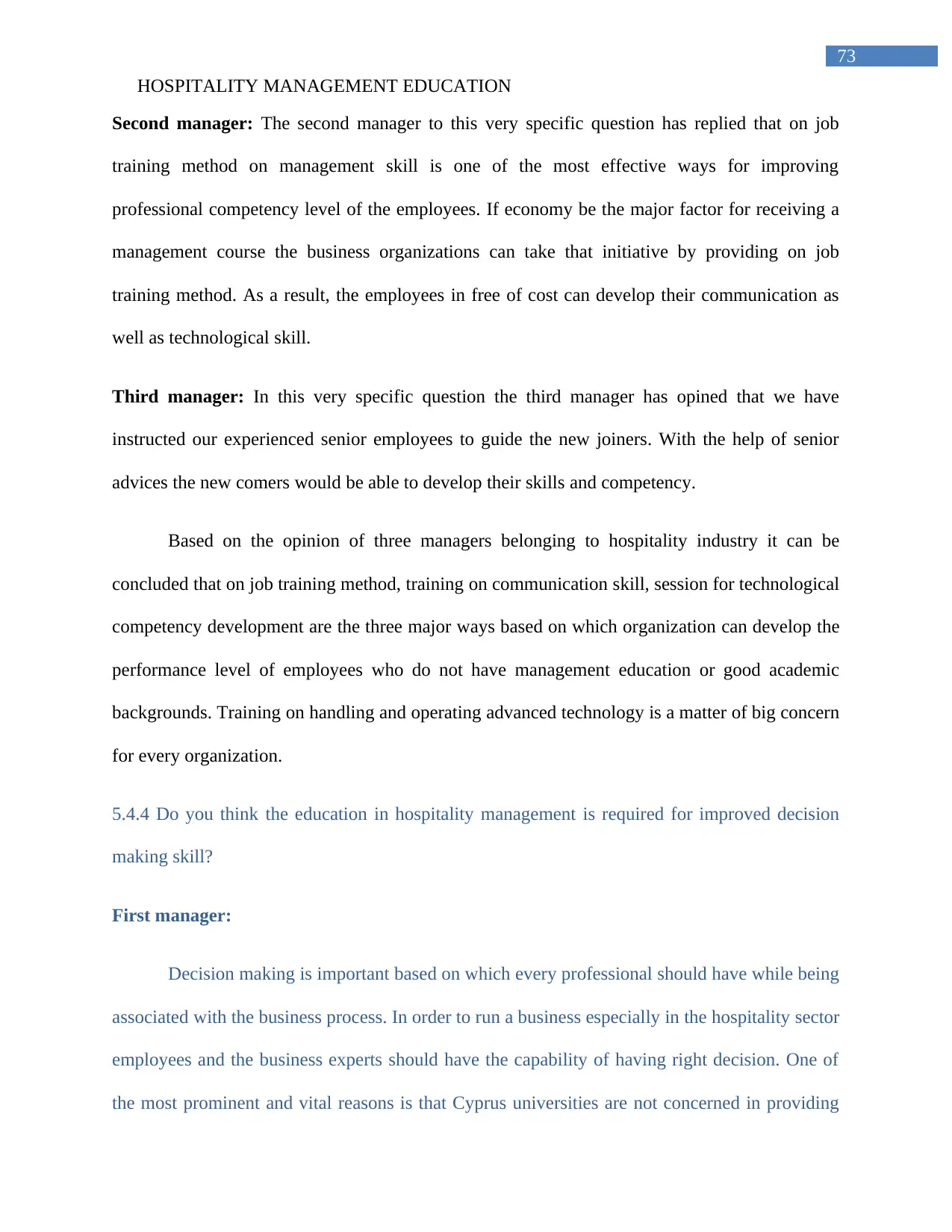
73
HOSPITALITY MANAGEMENT EDUCATION
Second manager: The second manager to this very specific question has replied that on job
training method on management skill is one of the most effective ways for improving
professional competency level of the employees. If economy be the major factor for receiving a
management course the business organizations can take that initiative by providing on job
training method. As a result, the employees in free of cost can develop their communication as
well as technological skill.
Third manager: In this very specific question the third manager has opined that we have
instructed our experienced senior employees to guide the new joiners. With the help of senior
advices the new comers would be able to develop their skills and competency.
Based on the opinion of three managers belonging to hospitality industry it can be
concluded that on job training method, training on communication skill, session for technological
competency development are the three major ways based on which organization can develop the
performance level of employees who do not have management education or good academic
backgrounds. Training on handling and operating advanced technology is a matter of big concern
for every organization.
5.4.4 Do you think the education in hospitality management is required for improved decision
making skill?
First manager:
Decision making is important based on which every professional should have while being
associated with the business process. In order to run a business especially in the hospitality sector
employees and the business experts should have the capability of having right decision. One of
the most prominent and vital reasons is that Cyprus universities are not concerned in providing
HOSPITALITY MANAGEMENT EDUCATION
Second manager: The second manager to this very specific question has replied that on job
training method on management skill is one of the most effective ways for improving
professional competency level of the employees. If economy be the major factor for receiving a
management course the business organizations can take that initiative by providing on job
training method. As a result, the employees in free of cost can develop their communication as
well as technological skill.
Third manager: In this very specific question the third manager has opined that we have
instructed our experienced senior employees to guide the new joiners. With the help of senior
advices the new comers would be able to develop their skills and competency.
Based on the opinion of three managers belonging to hospitality industry it can be
concluded that on job training method, training on communication skill, session for technological
competency development are the three major ways based on which organization can develop the
performance level of employees who do not have management education or good academic
backgrounds. Training on handling and operating advanced technology is a matter of big concern
for every organization.
5.4.4 Do you think the education in hospitality management is required for improved decision
making skill?
First manager:
Decision making is important based on which every professional should have while being
associated with the business process. In order to run a business especially in the hospitality sector
employees and the business experts should have the capability of having right decision. One of
the most prominent and vital reasons is that Cyprus universities are not concerned in providing
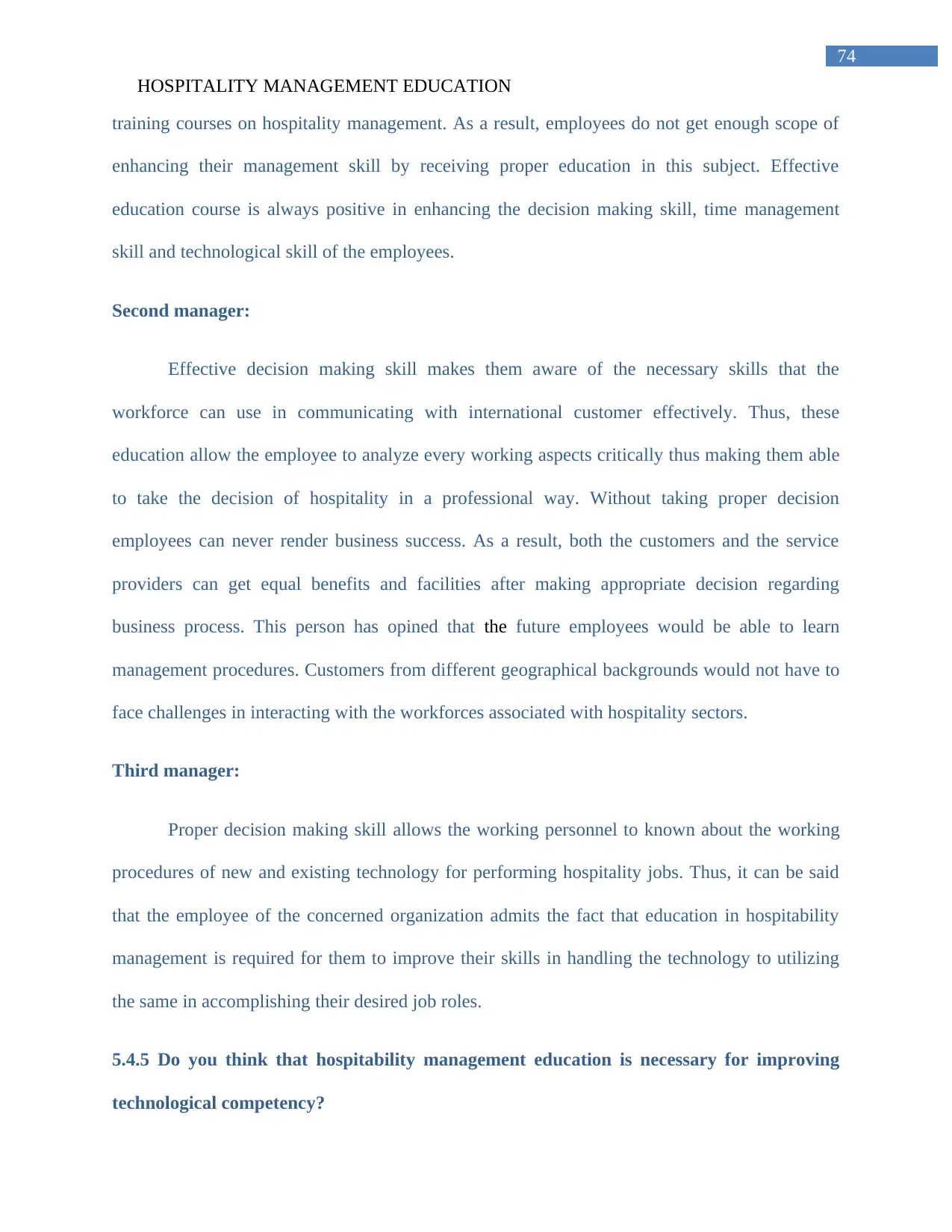
74
HOSPITALITY MANAGEMENT EDUCATION
training courses on hospitality management. As a result, employees do not get enough scope of
enhancing their management skill by receiving proper education in this subject. Effective
education course is always positive in enhancing the decision making skill, time management
skill and technological skill of the employees.
Second manager:
Effective decision making skill makes them aware of the necessary skills that the
workforce can use in communicating with international customer effectively. Thus, these
education allow the employee to analyze every working aspects critically thus making them able
to take the decision of hospitality in a professional way. Without taking proper decision
employees can never render business success. As a result, both the customers and the service
providers can get equal benefits and facilities after making appropriate decision regarding
business process. This person has opined that the future employees would be able to learn
management procedures. Customers from different geographical backgrounds would not have to
face challenges in interacting with the workforces associated with hospitality sectors.
Third manager:
Proper decision making skill allows the working personnel to known about the working
procedures of new and existing technology for performing hospitality jobs. Thus, it can be said
that the employee of the concerned organization admits the fact that education in hospitability
management is required for them to improve their skills in handling the technology to utilizing
the same in accomplishing their desired job roles.
5.4.5 Do you think that hospitability management education is necessary for improving
technological competency?
HOSPITALITY MANAGEMENT EDUCATION
training courses on hospitality management. As a result, employees do not get enough scope of
enhancing their management skill by receiving proper education in this subject. Effective
education course is always positive in enhancing the decision making skill, time management
skill and technological skill of the employees.
Second manager:
Effective decision making skill makes them aware of the necessary skills that the
workforce can use in communicating with international customer effectively. Thus, these
education allow the employee to analyze every working aspects critically thus making them able
to take the decision of hospitality in a professional way. Without taking proper decision
employees can never render business success. As a result, both the customers and the service
providers can get equal benefits and facilities after making appropriate decision regarding
business process. This person has opined that the future employees would be able to learn
management procedures. Customers from different geographical backgrounds would not have to
face challenges in interacting with the workforces associated with hospitality sectors.
Third manager:
Proper decision making skill allows the working personnel to known about the working
procedures of new and existing technology for performing hospitality jobs. Thus, it can be said
that the employee of the concerned organization admits the fact that education in hospitability
management is required for them to improve their skills in handling the technology to utilizing
the same in accomplishing their desired job roles.
5.4.5 Do you think that hospitability management education is necessary for improving
technological competency?

75
HOSPITALITY MANAGEMENT EDUCATION
First manager:
The supervisor in the hospitality industry has opined that with the emergence of new
technology employees associated with the hospitality sector have to face immense challenges in
maintaining database based on advanced technology. However, education in hospitality
management is very much effective in rendering technological skill and competency of an
individual. Customers by sitting at different geographic zone can get in-depth overview about the
products and services with the help of new technology. As a result, the communication between
the service providers and the services users becomes very much transparent.
Second manager:
As per the opinion of second manager it can be summarized that the advanced
technological recourses the entire business method is highly dependent on big data and business
intelligence method. However, after being appointed within an organization of hospitality
industry those employees do not have to face challenges in operating advanced technology as
well as maintaining database of business due to strong academic backgrounds. It is however
undeniable that hospitality management education is highly important for enhancing
performance level of an individual along with developing technological competency. In addition,
technological competency can be gained after doing a professional course on hospitality
management.
Third manager:
As per the opinion of third manager it can be stated that effective communication skill
and multi-lingual flexibility would help the employees in dealing with the customers of different
geographical backgrounds and psychological attitudes. However, proper communication between
HOSPITALITY MANAGEMENT EDUCATION
First manager:
The supervisor in the hospitality industry has opined that with the emergence of new
technology employees associated with the hospitality sector have to face immense challenges in
maintaining database based on advanced technology. However, education in hospitality
management is very much effective in rendering technological skill and competency of an
individual. Customers by sitting at different geographic zone can get in-depth overview about the
products and services with the help of new technology. As a result, the communication between
the service providers and the services users becomes very much transparent.
Second manager:
As per the opinion of second manager it can be summarized that the advanced
technological recourses the entire business method is highly dependent on big data and business
intelligence method. However, after being appointed within an organization of hospitality
industry those employees do not have to face challenges in operating advanced technology as
well as maintaining database of business due to strong academic backgrounds. It is however
undeniable that hospitality management education is highly important for enhancing
performance level of an individual along with developing technological competency. In addition,
technological competency can be gained after doing a professional course on hospitality
management.
Third manager:
As per the opinion of third manager it can be stated that effective communication skill
and multi-lingual flexibility would help the employees in dealing with the customers of different
geographical backgrounds and psychological attitudes. However, proper communication between
Secure Best Marks with AI Grader
Need help grading? Try our AI Grader for instant feedback on your assignments.
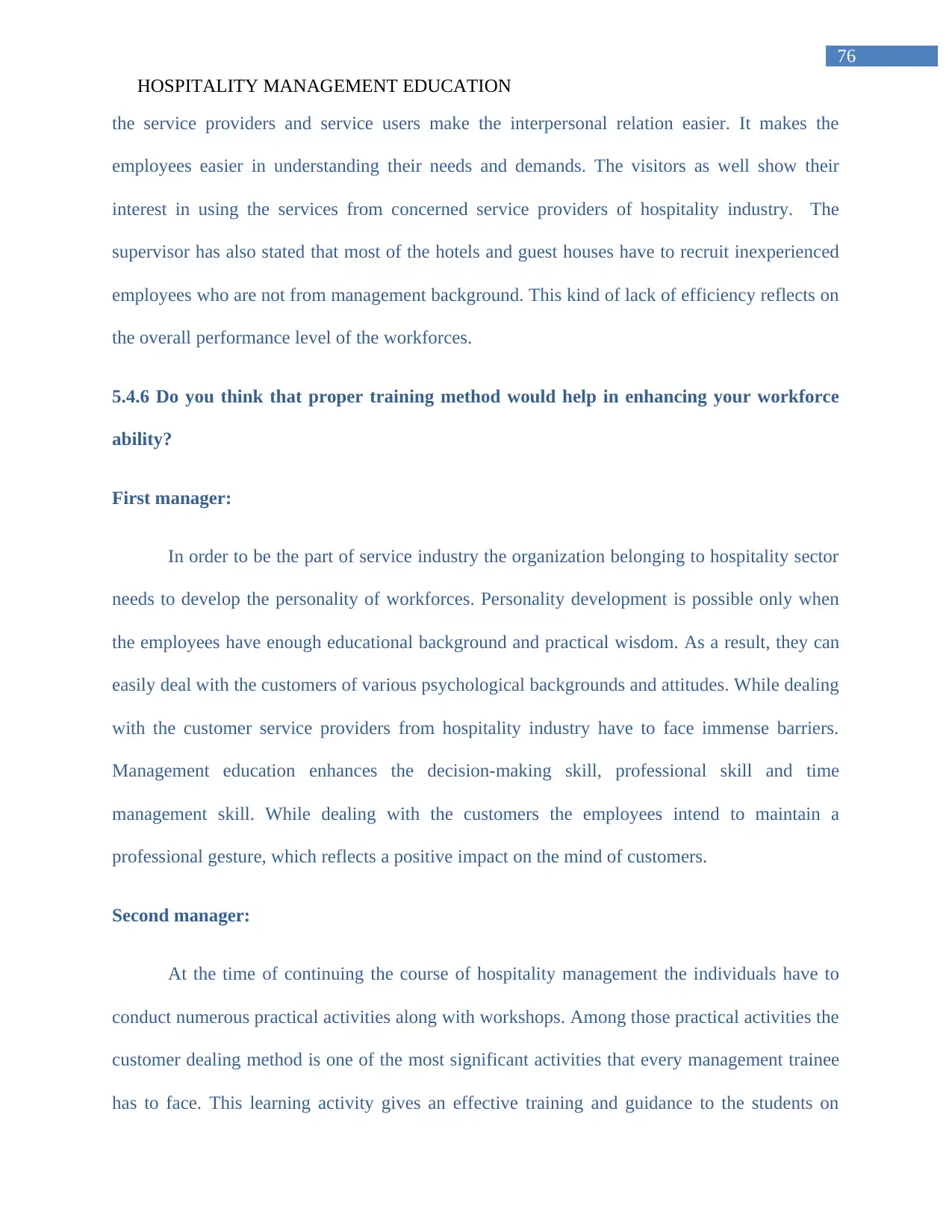
76
HOSPITALITY MANAGEMENT EDUCATION
the service providers and service users make the interpersonal relation easier. It makes the
employees easier in understanding their needs and demands. The visitors as well show their
interest in using the services from concerned service providers of hospitality industry. The
supervisor has also stated that most of the hotels and guest houses have to recruit inexperienced
employees who are not from management background. This kind of lack of efficiency reflects on
the overall performance level of the workforces.
5.4.6 Do you think that proper training method would help in enhancing your workforce
ability?
First manager:
In order to be the part of service industry the organization belonging to hospitality sector
needs to develop the personality of workforces. Personality development is possible only when
the employees have enough educational background and practical wisdom. As a result, they can
easily deal with the customers of various psychological backgrounds and attitudes. While dealing
with the customer service providers from hospitality industry have to face immense barriers.
Management education enhances the decision-making skill, professional skill and time
management skill. While dealing with the customers the employees intend to maintain a
professional gesture, which reflects a positive impact on the mind of customers.
Second manager:
At the time of continuing the course of hospitality management the individuals have to
conduct numerous practical activities along with workshops. Among those practical activities the
customer dealing method is one of the most significant activities that every management trainee
has to face. This learning activity gives an effective training and guidance to the students on
HOSPITALITY MANAGEMENT EDUCATION
the service providers and service users make the interpersonal relation easier. It makes the
employees easier in understanding their needs and demands. The visitors as well show their
interest in using the services from concerned service providers of hospitality industry. The
supervisor has also stated that most of the hotels and guest houses have to recruit inexperienced
employees who are not from management background. This kind of lack of efficiency reflects on
the overall performance level of the workforces.
5.4.6 Do you think that proper training method would help in enhancing your workforce
ability?
First manager:
In order to be the part of service industry the organization belonging to hospitality sector
needs to develop the personality of workforces. Personality development is possible only when
the employees have enough educational background and practical wisdom. As a result, they can
easily deal with the customers of various psychological backgrounds and attitudes. While dealing
with the customer service providers from hospitality industry have to face immense barriers.
Management education enhances the decision-making skill, professional skill and time
management skill. While dealing with the customers the employees intend to maintain a
professional gesture, which reflects a positive impact on the mind of customers.
Second manager:
At the time of continuing the course of hospitality management the individuals have to
conduct numerous practical activities along with workshops. Among those practical activities the
customer dealing method is one of the most significant activities that every management trainee
has to face. This learning activity gives an effective training and guidance to the students on
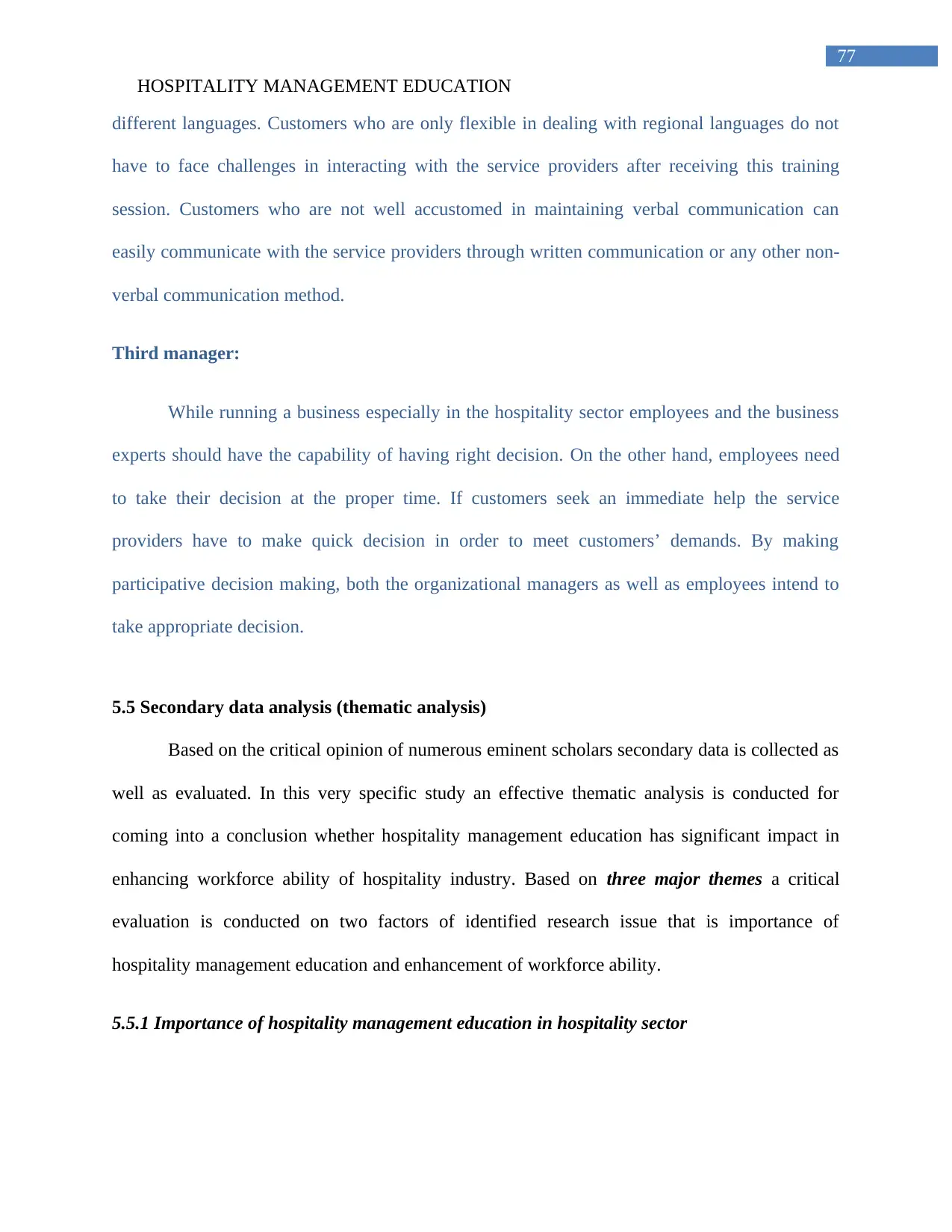
77
HOSPITALITY MANAGEMENT EDUCATION
different languages. Customers who are only flexible in dealing with regional languages do not
have to face challenges in interacting with the service providers after receiving this training
session. Customers who are not well accustomed in maintaining verbal communication can
easily communicate with the service providers through written communication or any other non-
verbal communication method.
Third manager:
While running a business especially in the hospitality sector employees and the business
experts should have the capability of having right decision. On the other hand, employees need
to take their decision at the proper time. If customers seek an immediate help the service
providers have to make quick decision in order to meet customers’ demands. By making
participative decision making, both the organizational managers as well as employees intend to
take appropriate decision.
5.5 Secondary data analysis (thematic analysis)
Based on the critical opinion of numerous eminent scholars secondary data is collected as
well as evaluated. In this very specific study an effective thematic analysis is conducted for
coming into a conclusion whether hospitality management education has significant impact in
enhancing workforce ability of hospitality industry. Based on three major themes a critical
evaluation is conducted on two factors of identified research issue that is importance of
hospitality management education and enhancement of workforce ability.
5.5.1 Importance of hospitality management education in hospitality sector
HOSPITALITY MANAGEMENT EDUCATION
different languages. Customers who are only flexible in dealing with regional languages do not
have to face challenges in interacting with the service providers after receiving this training
session. Customers who are not well accustomed in maintaining verbal communication can
easily communicate with the service providers through written communication or any other non-
verbal communication method.
Third manager:
While running a business especially in the hospitality sector employees and the business
experts should have the capability of having right decision. On the other hand, employees need
to take their decision at the proper time. If customers seek an immediate help the service
providers have to make quick decision in order to meet customers’ demands. By making
participative decision making, both the organizational managers as well as employees intend to
take appropriate decision.
5.5 Secondary data analysis (thematic analysis)
Based on the critical opinion of numerous eminent scholars secondary data is collected as
well as evaluated. In this very specific study an effective thematic analysis is conducted for
coming into a conclusion whether hospitality management education has significant impact in
enhancing workforce ability of hospitality industry. Based on three major themes a critical
evaluation is conducted on two factors of identified research issue that is importance of
hospitality management education and enhancement of workforce ability.
5.5.1 Importance of hospitality management education in hospitality sector
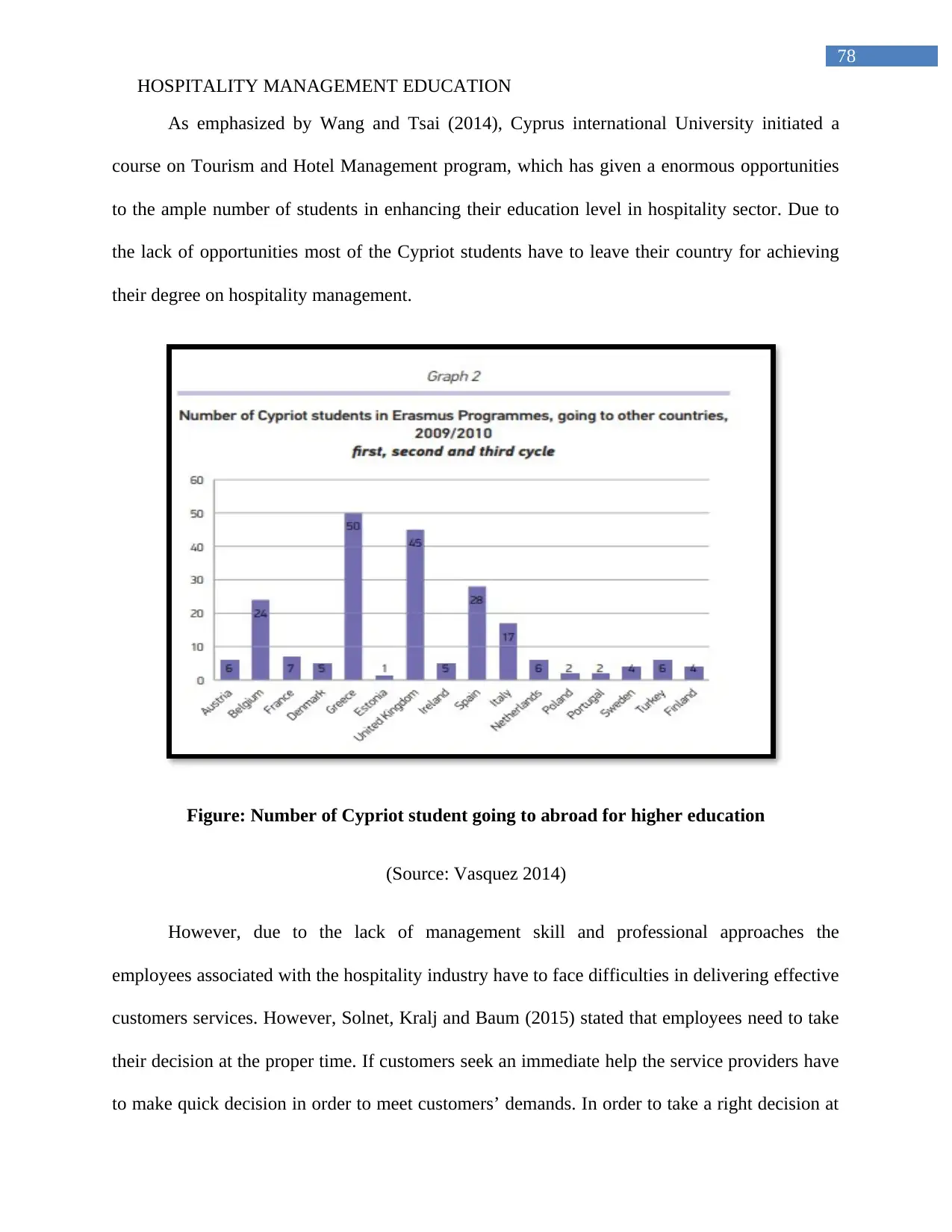
78
HOSPITALITY MANAGEMENT EDUCATION
As emphasized by Wang and Tsai (2014), Cyprus international University initiated a
course on Tourism and Hotel Management program, which has given a enormous opportunities
to the ample number of students in enhancing their education level in hospitality sector. Due to
the lack of opportunities most of the Cypriot students have to leave their country for achieving
their degree on hospitality management.
Figure: Number of Cypriot student going to abroad for higher education
(Source: Vasquez 2014)
However, due to the lack of management skill and professional approaches the
employees associated with the hospitality industry have to face difficulties in delivering effective
customers services. However, Solnet, Kralj and Baum (2015) stated that employees need to take
their decision at the proper time. If customers seek an immediate help the service providers have
to make quick decision in order to meet customers’ demands. In order to take a right decision at
HOSPITALITY MANAGEMENT EDUCATION
As emphasized by Wang and Tsai (2014), Cyprus international University initiated a
course on Tourism and Hotel Management program, which has given a enormous opportunities
to the ample number of students in enhancing their education level in hospitality sector. Due to
the lack of opportunities most of the Cypriot students have to leave their country for achieving
their degree on hospitality management.
Figure: Number of Cypriot student going to abroad for higher education
(Source: Vasquez 2014)
However, due to the lack of management skill and professional approaches the
employees associated with the hospitality industry have to face difficulties in delivering effective
customers services. However, Solnet, Kralj and Baum (2015) stated that employees need to take
their decision at the proper time. If customers seek an immediate help the service providers have
to make quick decision in order to meet customers’ demands. In order to take a right decision at
Paraphrase This Document
Need a fresh take? Get an instant paraphrase of this document with our AI Paraphraser

79
HOSPITALITY MANAGEMENT EDUCATION
the crucial time of business the employees need to have good educational backgrounds. With the
advanced of technological the entire business method is highly dependent on big data and
business intelligence method. As emphasized by Breakey, Robinson and Brenner (2014),
management education course helps the employees in enhancing their technological skills and
competency as well that would enable the workforces in maintaining organizational database
effectively. As per the opinion of Harrington et al. (2014) people belonging to various
geographical backgrounds and attitudes are associated with hospitality sector. They need to
improve their style of expression, behavioural approach, communication approach and so many.
As stated by Collis and Hussey (2013), these kinds of professional approach can be gained in
two effective ways. After this evaluation, it can be concluded that professional approach and
behaviour enhances customers’ brand identity and image. Unprofessional approach always raises
conflict among the employees. Due to the lack of training internal stakeholders do not intend to
maintain organizational behaviour and business ethics. This kind of internal conflict reflects a
major negative impact on the overall impression of customers.
As commented by Hornsby and Scott-Halsell (2015) employees become flexible in
resolving their issues with each other so that the flow of business can be well maintained. On the
other hand, professional communication is always helpful in meeting effective balance between
supply and demand. Employees by maintaining professionalism intends to take appropriate
decision making by following participative form of decision making style. In this form of
decision making style both the employees and the business managers intend to take equal
participation in forming business strategy and policy.
5.5.2 Challenges faced by the workforces of hospitality industry in dealing with customers
HOSPITALITY MANAGEMENT EDUCATION
the crucial time of business the employees need to have good educational backgrounds. With the
advanced of technological the entire business method is highly dependent on big data and
business intelligence method. As emphasized by Breakey, Robinson and Brenner (2014),
management education course helps the employees in enhancing their technological skills and
competency as well that would enable the workforces in maintaining organizational database
effectively. As per the opinion of Harrington et al. (2014) people belonging to various
geographical backgrounds and attitudes are associated with hospitality sector. They need to
improve their style of expression, behavioural approach, communication approach and so many.
As stated by Collis and Hussey (2013), these kinds of professional approach can be gained in
two effective ways. After this evaluation, it can be concluded that professional approach and
behaviour enhances customers’ brand identity and image. Unprofessional approach always raises
conflict among the employees. Due to the lack of training internal stakeholders do not intend to
maintain organizational behaviour and business ethics. This kind of internal conflict reflects a
major negative impact on the overall impression of customers.
As commented by Hornsby and Scott-Halsell (2015) employees become flexible in
resolving their issues with each other so that the flow of business can be well maintained. On the
other hand, professional communication is always helpful in meeting effective balance between
supply and demand. Employees by maintaining professionalism intends to take appropriate
decision making by following participative form of decision making style. In this form of
decision making style both the employees and the business managers intend to take equal
participation in forming business strategy and policy.
5.5.2 Challenges faced by the workforces of hospitality industry in dealing with customers

80
HOSPITALITY MANAGEMENT EDUCATION
As commented by Pratt and Hahn (2016), while evaluating the challenges faced by the
workforces of hospitality industry in dealing with customers most of the Cypriot students have
self-efficacy issue due to which the workforces have to face immense difficulties in
communicating with the international customers. In order to communicate with the visitors from
various cultural backgrounds and psychological attitudes the professionals have to face immense
challenges due to language barrier. Lugosi and Jameson (2017) stated that Cypriot students re
possessed with immense recognition issue. Due to the lack of economic strength most of the
personalities have to face innumerable difficulties in affording hotel management courses. As a
result, they do not get proper fame and recognition as a service provider of an organization.
Figure: Cypriot Students’ attitude towards hospitality sector of Cyprus
(Source: Bodenhausen and Curtis 2016)
Numerous eminent personalities have provided various opinions regarding this matter. As
emphasised by Wood (2015), employees lack effective technological skills and competencies as
HOSPITALITY MANAGEMENT EDUCATION
As commented by Pratt and Hahn (2016), while evaluating the challenges faced by the
workforces of hospitality industry in dealing with customers most of the Cypriot students have
self-efficacy issue due to which the workforces have to face immense difficulties in
communicating with the international customers. In order to communicate with the visitors from
various cultural backgrounds and psychological attitudes the professionals have to face immense
challenges due to language barrier. Lugosi and Jameson (2017) stated that Cypriot students re
possessed with immense recognition issue. Due to the lack of economic strength most of the
personalities have to face innumerable difficulties in affording hotel management courses. As a
result, they do not get proper fame and recognition as a service provider of an organization.
Figure: Cypriot Students’ attitude towards hospitality sector of Cyprus
(Source: Bodenhausen and Curtis 2016)
Numerous eminent personalities have provided various opinions regarding this matter. As
emphasised by Wood (2015), employees lack effective technological skills and competencies as
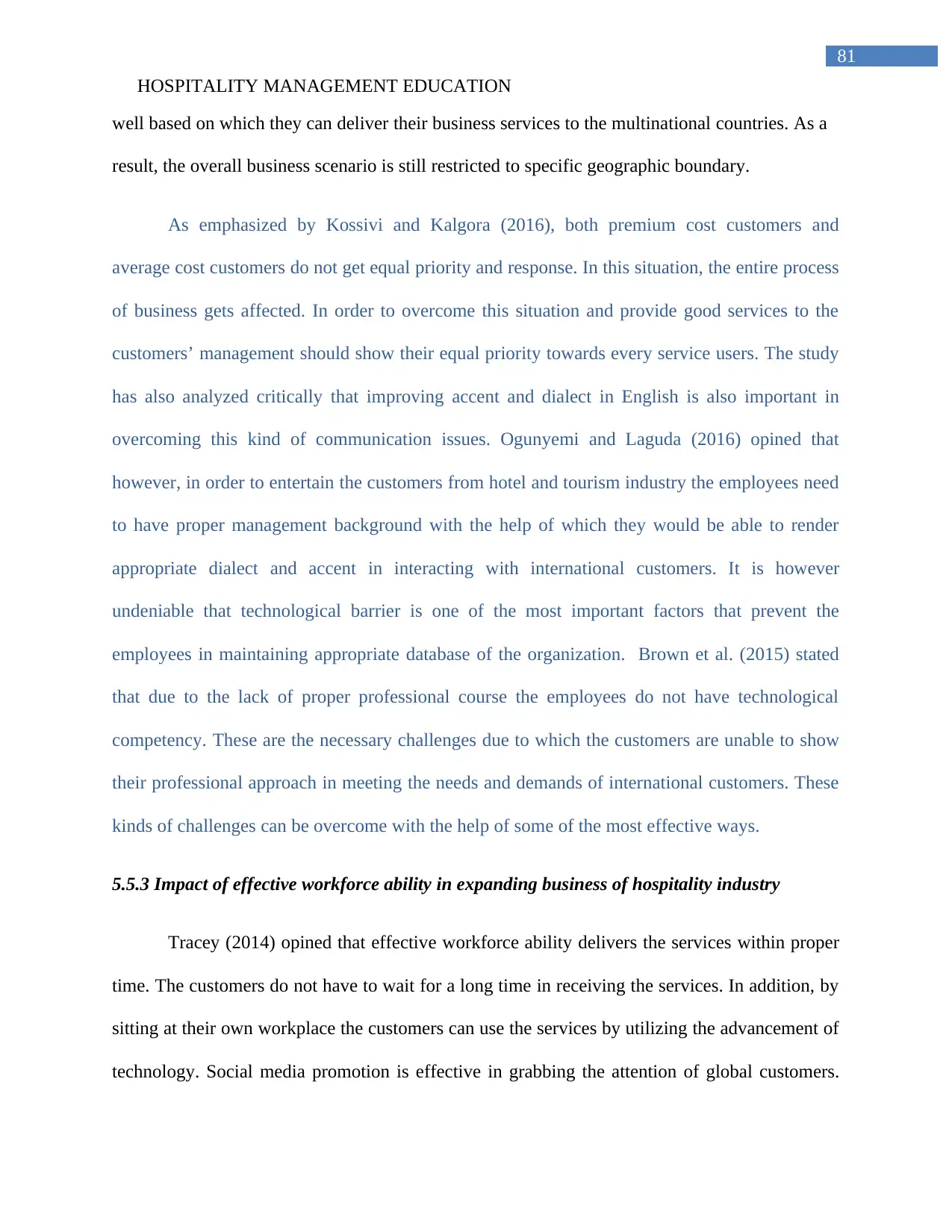
81
HOSPITALITY MANAGEMENT EDUCATION
well based on which they can deliver their business services to the multinational countries. As a
result, the overall business scenario is still restricted to specific geographic boundary.
As emphasized by Kossivi and Kalgora (2016), both premium cost customers and
average cost customers do not get equal priority and response. In this situation, the entire process
of business gets affected. In order to overcome this situation and provide good services to the
customers’ management should show their equal priority towards every service users. The study
has also analyzed critically that improving accent and dialect in English is also important in
overcoming this kind of communication issues. Ogunyemi and Laguda (2016) opined that
however, in order to entertain the customers from hotel and tourism industry the employees need
to have proper management background with the help of which they would be able to render
appropriate dialect and accent in interacting with international customers. It is however
undeniable that technological barrier is one of the most important factors that prevent the
employees in maintaining appropriate database of the organization. Brown et al. (2015) stated
that due to the lack of proper professional course the employees do not have technological
competency. These are the necessary challenges due to which the customers are unable to show
their professional approach in meeting the needs and demands of international customers. These
kinds of challenges can be overcome with the help of some of the most effective ways.
5.5.3 Impact of effective workforce ability in expanding business of hospitality industry
Tracey (2014) opined that effective workforce ability delivers the services within proper
time. The customers do not have to wait for a long time in receiving the services. In addition, by
sitting at their own workplace the customers can use the services by utilizing the advancement of
technology. Social media promotion is effective in grabbing the attention of global customers.
HOSPITALITY MANAGEMENT EDUCATION
well based on which they can deliver their business services to the multinational countries. As a
result, the overall business scenario is still restricted to specific geographic boundary.
As emphasized by Kossivi and Kalgora (2016), both premium cost customers and
average cost customers do not get equal priority and response. In this situation, the entire process
of business gets affected. In order to overcome this situation and provide good services to the
customers’ management should show their equal priority towards every service users. The study
has also analyzed critically that improving accent and dialect in English is also important in
overcoming this kind of communication issues. Ogunyemi and Laguda (2016) opined that
however, in order to entertain the customers from hotel and tourism industry the employees need
to have proper management background with the help of which they would be able to render
appropriate dialect and accent in interacting with international customers. It is however
undeniable that technological barrier is one of the most important factors that prevent the
employees in maintaining appropriate database of the organization. Brown et al. (2015) stated
that due to the lack of proper professional course the employees do not have technological
competency. These are the necessary challenges due to which the customers are unable to show
their professional approach in meeting the needs and demands of international customers. These
kinds of challenges can be overcome with the help of some of the most effective ways.
5.5.3 Impact of effective workforce ability in expanding business of hospitality industry
Tracey (2014) opined that effective workforce ability delivers the services within proper
time. The customers do not have to wait for a long time in receiving the services. In addition, by
sitting at their own workplace the customers can use the services by utilizing the advancement of
technology. Social media promotion is effective in grabbing the attention of global customers.
Secure Best Marks with AI Grader
Need help grading? Try our AI Grader for instant feedback on your assignments.

82
HOSPITALITY MANAGEMENT EDUCATION
With the help of social media promotion, the business experts can grab the attention of diverse
cultural backgrounds. As commented by Barron, Leask and Fyall (2014), after rendering a
professional efficiency within services the organization would be able to draw the attention of
international customers.
Bodenhausen and Curtis (2016) stated that Cyprus customers intend to get an in-depth
overview about their service methods of hotels and other necessary facilities and benefits.
Robinson, Solnet and Breakey (2014) opined that if the employees are not well aware on digital
marketing system or new media promotion they can never draw the attention of large number of
customers.
However, workforce ability plays the most significant role in attracting international
customers. Bartlett, Johnson and Schneider (2016) stated that if the employees are unable to
handle advanced technology the entire process would never be able to expand its business
process beyond going the regional market. On the other hand, an effective communication can
easily help the employees in understanding the needs and demands of the customers. Ogunyemi
and Laguda (2016) opined that the success of a business organization especially belonging to
hospitality management sector is highly dependent on the way of services that the executives
providers towards the customers. As commented by Rahmawati (2017) at the same time,
effective workforce ability enables the managers in keeping an in-depth overview about the
overall profit and loss balance of the organization. As a result, both the customers and the service
providers can get the opportunity to maintain a good rapport with each other. Business
organizations do not have to face challenges in fulfilling the needs and demands of the
customers.
HOSPITALITY MANAGEMENT EDUCATION
With the help of social media promotion, the business experts can grab the attention of diverse
cultural backgrounds. As commented by Barron, Leask and Fyall (2014), after rendering a
professional efficiency within services the organization would be able to draw the attention of
international customers.
Bodenhausen and Curtis (2016) stated that Cyprus customers intend to get an in-depth
overview about their service methods of hotels and other necessary facilities and benefits.
Robinson, Solnet and Breakey (2014) opined that if the employees are not well aware on digital
marketing system or new media promotion they can never draw the attention of large number of
customers.
However, workforce ability plays the most significant role in attracting international
customers. Bartlett, Johnson and Schneider (2016) stated that if the employees are unable to
handle advanced technology the entire process would never be able to expand its business
process beyond going the regional market. On the other hand, an effective communication can
easily help the employees in understanding the needs and demands of the customers. Ogunyemi
and Laguda (2016) opined that the success of a business organization especially belonging to
hospitality management sector is highly dependent on the way of services that the executives
providers towards the customers. As commented by Rahmawati (2017) at the same time,
effective workforce ability enables the managers in keeping an in-depth overview about the
overall profit and loss balance of the organization. As a result, both the customers and the service
providers can get the opportunity to maintain a good rapport with each other. Business
organizations do not have to face challenges in fulfilling the needs and demands of the
customers.
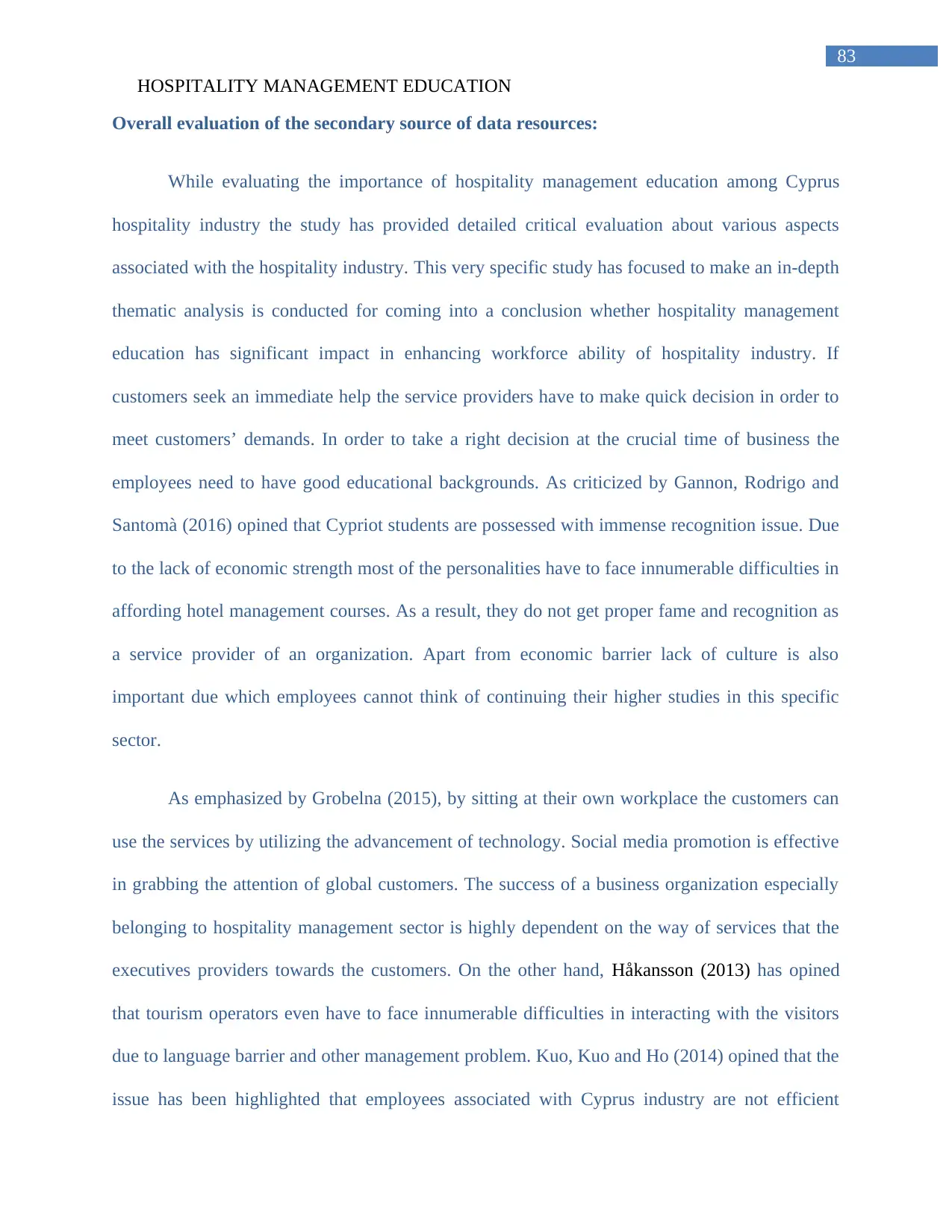
83
HOSPITALITY MANAGEMENT EDUCATION
Overall evaluation of the secondary source of data resources:
While evaluating the importance of hospitality management education among Cyprus
hospitality industry the study has provided detailed critical evaluation about various aspects
associated with the hospitality industry. This very specific study has focused to make an in-depth
thematic analysis is conducted for coming into a conclusion whether hospitality management
education has significant impact in enhancing workforce ability of hospitality industry. If
customers seek an immediate help the service providers have to make quick decision in order to
meet customers’ demands. In order to take a right decision at the crucial time of business the
employees need to have good educational backgrounds. As criticized by Gannon, Rodrigo and
Santomà (2016) opined that Cypriot students are possessed with immense recognition issue. Due
to the lack of economic strength most of the personalities have to face innumerable difficulties in
affording hotel management courses. As a result, they do not get proper fame and recognition as
a service provider of an organization. Apart from economic barrier lack of culture is also
important due which employees cannot think of continuing their higher studies in this specific
sector.
As emphasized by Grobelna (2015), by sitting at their own workplace the customers can
use the services by utilizing the advancement of technology. Social media promotion is effective
in grabbing the attention of global customers. The success of a business organization especially
belonging to hospitality management sector is highly dependent on the way of services that the
executives providers towards the customers. On the other hand, Håkansson (2013) has opined
that tourism operators even have to face innumerable difficulties in interacting with the visitors
due to language barrier and other management problem. Kuo, Kuo and Ho (2014) opined that the
issue has been highlighted that employees associated with Cyprus industry are not efficient
HOSPITALITY MANAGEMENT EDUCATION
Overall evaluation of the secondary source of data resources:
While evaluating the importance of hospitality management education among Cyprus
hospitality industry the study has provided detailed critical evaluation about various aspects
associated with the hospitality industry. This very specific study has focused to make an in-depth
thematic analysis is conducted for coming into a conclusion whether hospitality management
education has significant impact in enhancing workforce ability of hospitality industry. If
customers seek an immediate help the service providers have to make quick decision in order to
meet customers’ demands. In order to take a right decision at the crucial time of business the
employees need to have good educational backgrounds. As criticized by Gannon, Rodrigo and
Santomà (2016) opined that Cypriot students are possessed with immense recognition issue. Due
to the lack of economic strength most of the personalities have to face innumerable difficulties in
affording hotel management courses. As a result, they do not get proper fame and recognition as
a service provider of an organization. Apart from economic barrier lack of culture is also
important due which employees cannot think of continuing their higher studies in this specific
sector.
As emphasized by Grobelna (2015), by sitting at their own workplace the customers can
use the services by utilizing the advancement of technology. Social media promotion is effective
in grabbing the attention of global customers. The success of a business organization especially
belonging to hospitality management sector is highly dependent on the way of services that the
executives providers towards the customers. On the other hand, Håkansson (2013) has opined
that tourism operators even have to face innumerable difficulties in interacting with the visitors
due to language barrier and other management problem. Kuo, Kuo and Ho (2014) opined that the
issue has been highlighted that employees associated with Cyprus industry are not efficient
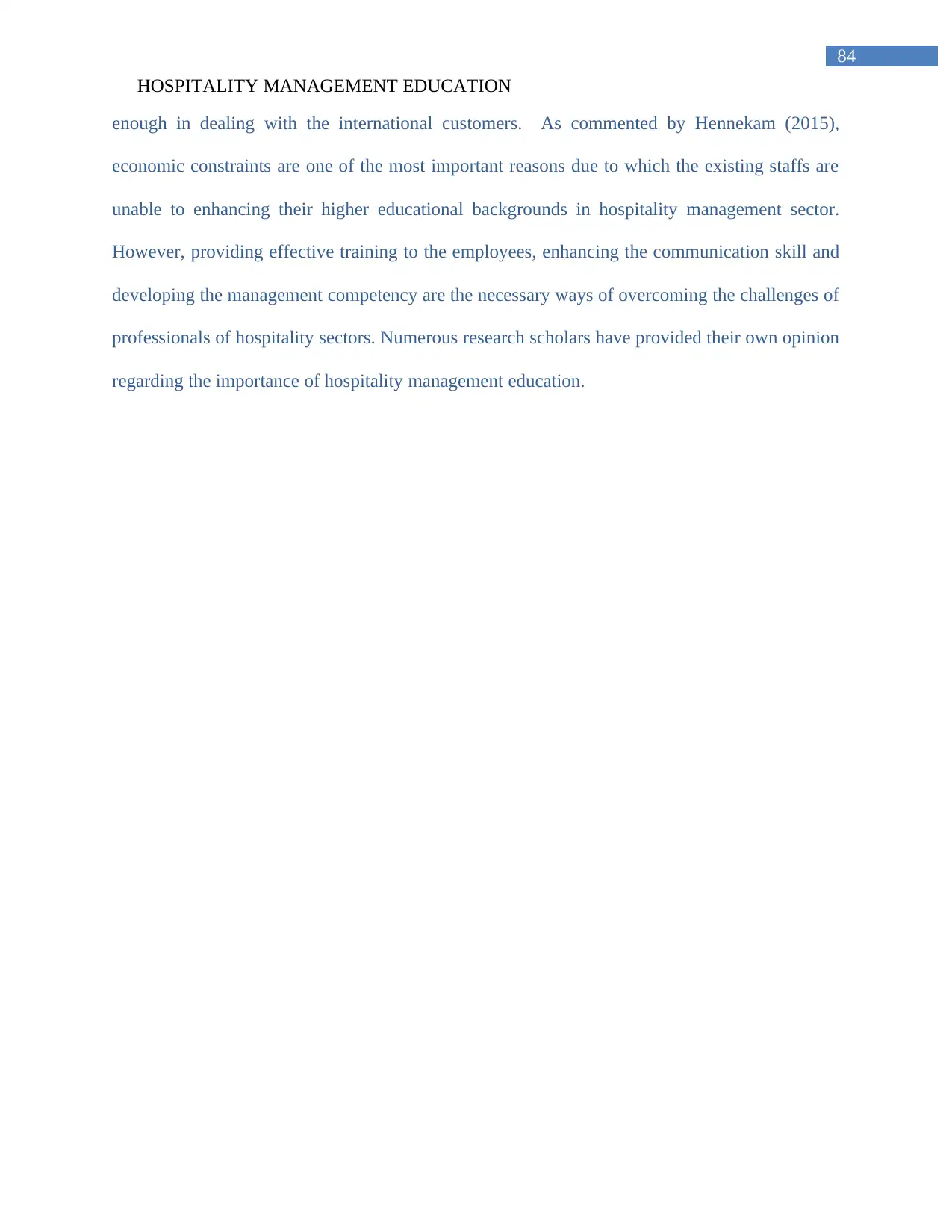
84
HOSPITALITY MANAGEMENT EDUCATION
enough in dealing with the international customers. As commented by Hennekam (2015),
economic constraints are one of the most important reasons due to which the existing staffs are
unable to enhancing their higher educational backgrounds in hospitality management sector.
However, providing effective training to the employees, enhancing the communication skill and
developing the management competency are the necessary ways of overcoming the challenges of
professionals of hospitality sectors. Numerous research scholars have provided their own opinion
regarding the importance of hospitality management education.
HOSPITALITY MANAGEMENT EDUCATION
enough in dealing with the international customers. As commented by Hennekam (2015),
economic constraints are one of the most important reasons due to which the existing staffs are
unable to enhancing their higher educational backgrounds in hospitality management sector.
However, providing effective training to the employees, enhancing the communication skill and
developing the management competency are the necessary ways of overcoming the challenges of
professionals of hospitality sectors. Numerous research scholars have provided their own opinion
regarding the importance of hospitality management education.
Paraphrase This Document
Need a fresh take? Get an instant paraphrase of this document with our AI Paraphraser
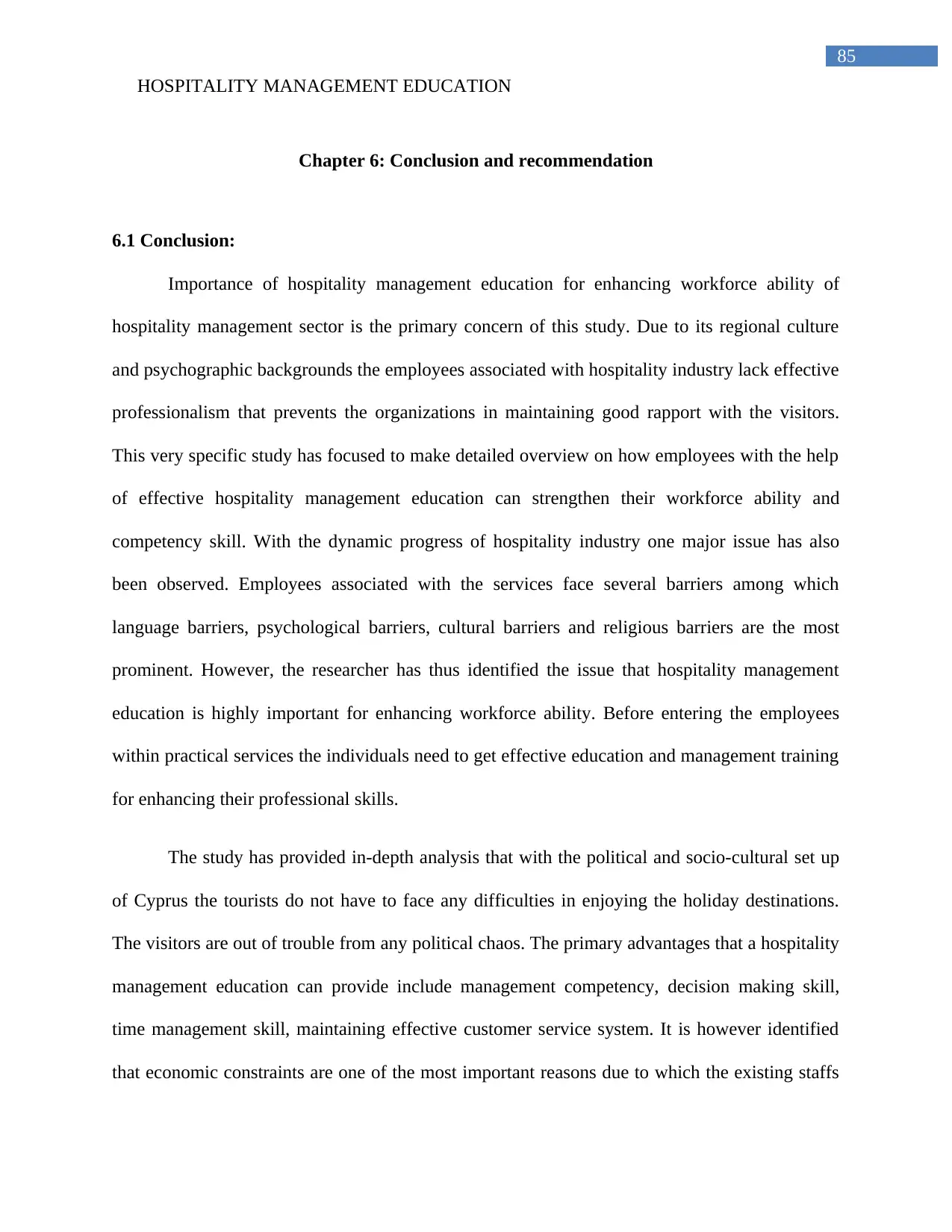
85
HOSPITALITY MANAGEMENT EDUCATION
Chapter 6: Conclusion and recommendation
6.1 Conclusion:
Importance of hospitality management education for enhancing workforce ability of
hospitality management sector is the primary concern of this study. Due to its regional culture
and psychographic backgrounds the employees associated with hospitality industry lack effective
professionalism that prevents the organizations in maintaining good rapport with the visitors.
This very specific study has focused to make detailed overview on how employees with the help
of effective hospitality management education can strengthen their workforce ability and
competency skill. With the dynamic progress of hospitality industry one major issue has also
been observed. Employees associated with the services face several barriers among which
language barriers, psychological barriers, cultural barriers and religious barriers are the most
prominent. However, the researcher has thus identified the issue that hospitality management
education is highly important for enhancing workforce ability. Before entering the employees
within practical services the individuals need to get effective education and management training
for enhancing their professional skills.
The study has provided in-depth analysis that with the political and socio-cultural set up
of Cyprus the tourists do not have to face any difficulties in enjoying the holiday destinations.
The visitors are out of trouble from any political chaos. The primary advantages that a hospitality
management education can provide include management competency, decision making skill,
time management skill, maintaining effective customer service system. It is however identified
that economic constraints are one of the most important reasons due to which the existing staffs
HOSPITALITY MANAGEMENT EDUCATION
Chapter 6: Conclusion and recommendation
6.1 Conclusion:
Importance of hospitality management education for enhancing workforce ability of
hospitality management sector is the primary concern of this study. Due to its regional culture
and psychographic backgrounds the employees associated with hospitality industry lack effective
professionalism that prevents the organizations in maintaining good rapport with the visitors.
This very specific study has focused to make detailed overview on how employees with the help
of effective hospitality management education can strengthen their workforce ability and
competency skill. With the dynamic progress of hospitality industry one major issue has also
been observed. Employees associated with the services face several barriers among which
language barriers, psychological barriers, cultural barriers and religious barriers are the most
prominent. However, the researcher has thus identified the issue that hospitality management
education is highly important for enhancing workforce ability. Before entering the employees
within practical services the individuals need to get effective education and management training
for enhancing their professional skills.
The study has provided in-depth analysis that with the political and socio-cultural set up
of Cyprus the tourists do not have to face any difficulties in enjoying the holiday destinations.
The visitors are out of trouble from any political chaos. The primary advantages that a hospitality
management education can provide include management competency, decision making skill,
time management skill, maintaining effective customer service system. It is however identified
that economic constraints are one of the most important reasons due to which the existing staffs
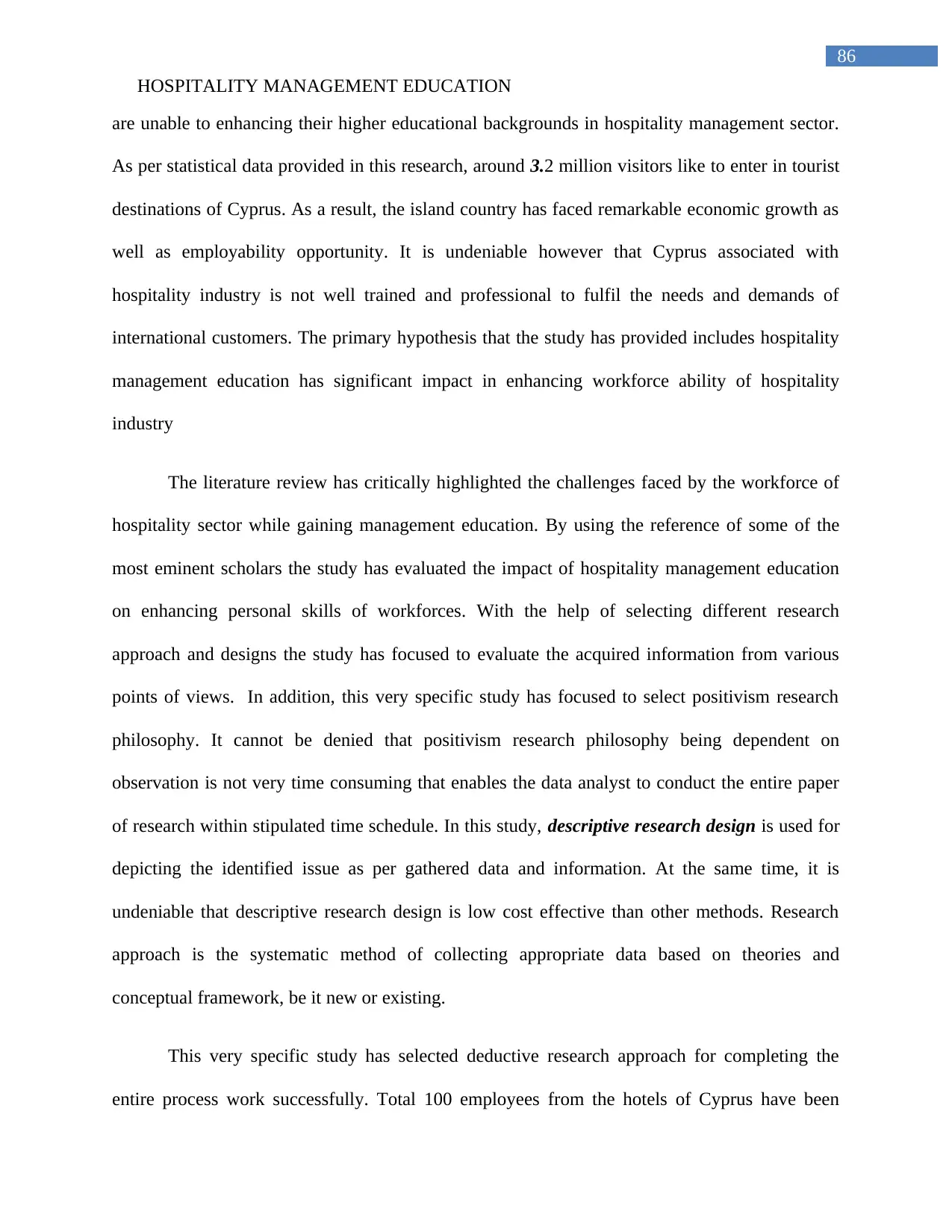
86
HOSPITALITY MANAGEMENT EDUCATION
are unable to enhancing their higher educational backgrounds in hospitality management sector.
As per statistical data provided in this research, around 3.2 million visitors like to enter in tourist
destinations of Cyprus. As a result, the island country has faced remarkable economic growth as
well as employability opportunity. It is undeniable however that Cyprus associated with
hospitality industry is not well trained and professional to fulfil the needs and demands of
international customers. The primary hypothesis that the study has provided includes hospitality
management education has significant impact in enhancing workforce ability of hospitality
industry
The literature review has critically highlighted the challenges faced by the workforce of
hospitality sector while gaining management education. By using the reference of some of the
most eminent scholars the study has evaluated the impact of hospitality management education
on enhancing personal skills of workforces. With the help of selecting different research
approach and designs the study has focused to evaluate the acquired information from various
points of views. In addition, this very specific study has focused to select positivism research
philosophy. It cannot be denied that positivism research philosophy being dependent on
observation is not very time consuming that enables the data analyst to conduct the entire paper
of research within stipulated time schedule. In this study, descriptive research design is used for
depicting the identified issue as per gathered data and information. At the same time, it is
undeniable that descriptive research design is low cost effective than other methods. Research
approach is the systematic method of collecting appropriate data based on theories and
conceptual framework, be it new or existing.
This very specific study has selected deductive research approach for completing the
entire process work successfully. Total 100 employees from the hotels of Cyprus have been
HOSPITALITY MANAGEMENT EDUCATION
are unable to enhancing their higher educational backgrounds in hospitality management sector.
As per statistical data provided in this research, around 3.2 million visitors like to enter in tourist
destinations of Cyprus. As a result, the island country has faced remarkable economic growth as
well as employability opportunity. It is undeniable however that Cyprus associated with
hospitality industry is not well trained and professional to fulfil the needs and demands of
international customers. The primary hypothesis that the study has provided includes hospitality
management education has significant impact in enhancing workforce ability of hospitality
industry
The literature review has critically highlighted the challenges faced by the workforce of
hospitality sector while gaining management education. By using the reference of some of the
most eminent scholars the study has evaluated the impact of hospitality management education
on enhancing personal skills of workforces. With the help of selecting different research
approach and designs the study has focused to evaluate the acquired information from various
points of views. In addition, this very specific study has focused to select positivism research
philosophy. It cannot be denied that positivism research philosophy being dependent on
observation is not very time consuming that enables the data analyst to conduct the entire paper
of research within stipulated time schedule. In this study, descriptive research design is used for
depicting the identified issue as per gathered data and information. At the same time, it is
undeniable that descriptive research design is low cost effective than other methods. Research
approach is the systematic method of collecting appropriate data based on theories and
conceptual framework, be it new or existing.
This very specific study has selected deductive research approach for completing the
entire process work successfully. Total 100 employees from the hotels of Cyprus have been
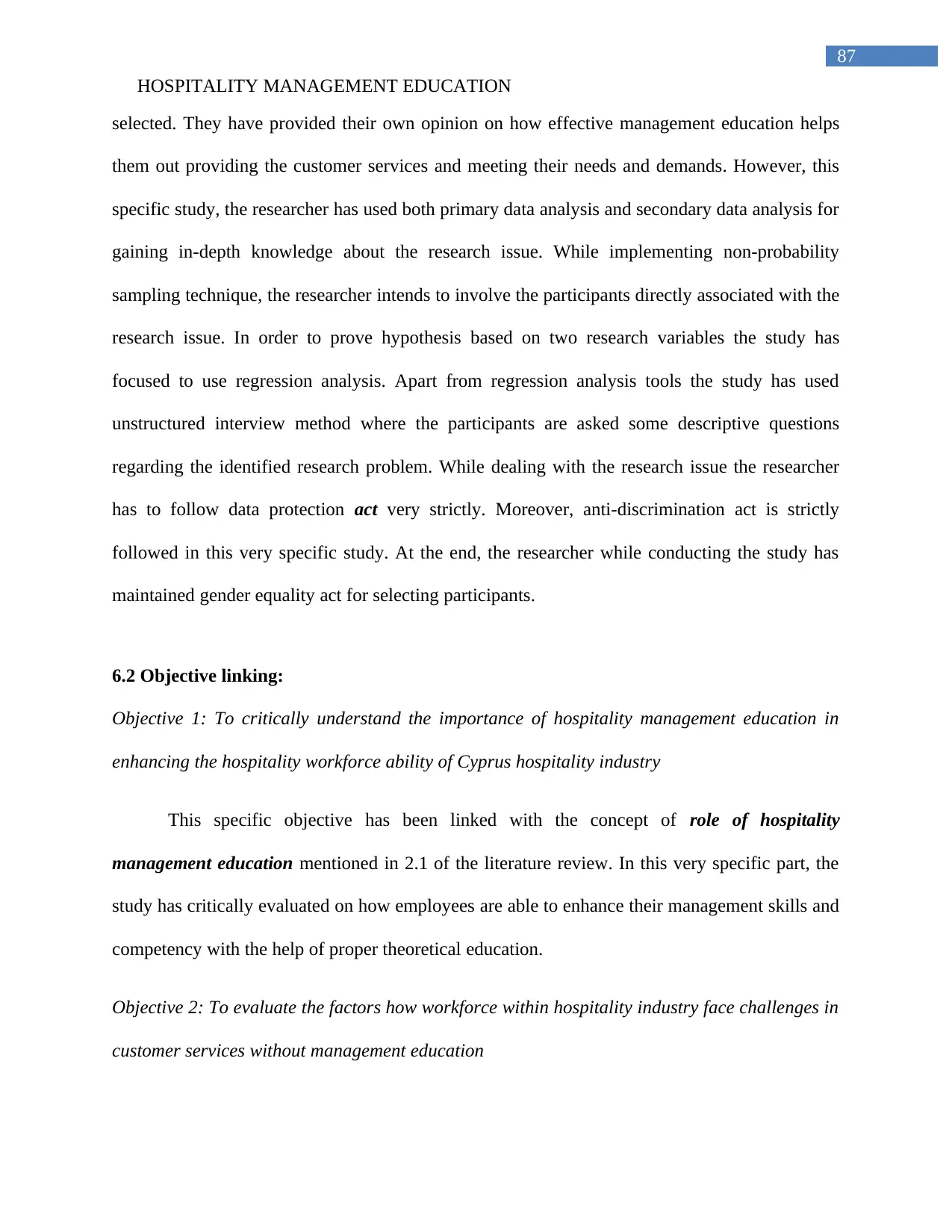
87
HOSPITALITY MANAGEMENT EDUCATION
selected. They have provided their own opinion on how effective management education helps
them out providing the customer services and meeting their needs and demands. However, this
specific study, the researcher has used both primary data analysis and secondary data analysis for
gaining in-depth knowledge about the research issue. While implementing non-probability
sampling technique, the researcher intends to involve the participants directly associated with the
research issue. In order to prove hypothesis based on two research variables the study has
focused to use regression analysis. Apart from regression analysis tools the study has used
unstructured interview method where the participants are asked some descriptive questions
regarding the identified research problem. While dealing with the research issue the researcher
has to follow data protection act very strictly. Moreover, anti-discrimination act is strictly
followed in this very specific study. At the end, the researcher while conducting the study has
maintained gender equality act for selecting participants.
6.2 Objective linking:
Objective 1: To critically understand the importance of hospitality management education in
enhancing the hospitality workforce ability of Cyprus hospitality industry
This specific objective has been linked with the concept of role of hospitality
management education mentioned in 2.1 of the literature review. In this very specific part, the
study has critically evaluated on how employees are able to enhance their management skills and
competency with the help of proper theoretical education.
Objective 2: To evaluate the factors how workforce within hospitality industry face challenges in
customer services without management education
HOSPITALITY MANAGEMENT EDUCATION
selected. They have provided their own opinion on how effective management education helps
them out providing the customer services and meeting their needs and demands. However, this
specific study, the researcher has used both primary data analysis and secondary data analysis for
gaining in-depth knowledge about the research issue. While implementing non-probability
sampling technique, the researcher intends to involve the participants directly associated with the
research issue. In order to prove hypothesis based on two research variables the study has
focused to use regression analysis. Apart from regression analysis tools the study has used
unstructured interview method where the participants are asked some descriptive questions
regarding the identified research problem. While dealing with the research issue the researcher
has to follow data protection act very strictly. Moreover, anti-discrimination act is strictly
followed in this very specific study. At the end, the researcher while conducting the study has
maintained gender equality act for selecting participants.
6.2 Objective linking:
Objective 1: To critically understand the importance of hospitality management education in
enhancing the hospitality workforce ability of Cyprus hospitality industry
This specific objective has been linked with the concept of role of hospitality
management education mentioned in 2.1 of the literature review. In this very specific part, the
study has critically evaluated on how employees are able to enhance their management skills and
competency with the help of proper theoretical education.
Objective 2: To evaluate the factors how workforce within hospitality industry face challenges in
customer services without management education
Secure Best Marks with AI Grader
Need help grading? Try our AI Grader for instant feedback on your assignments.
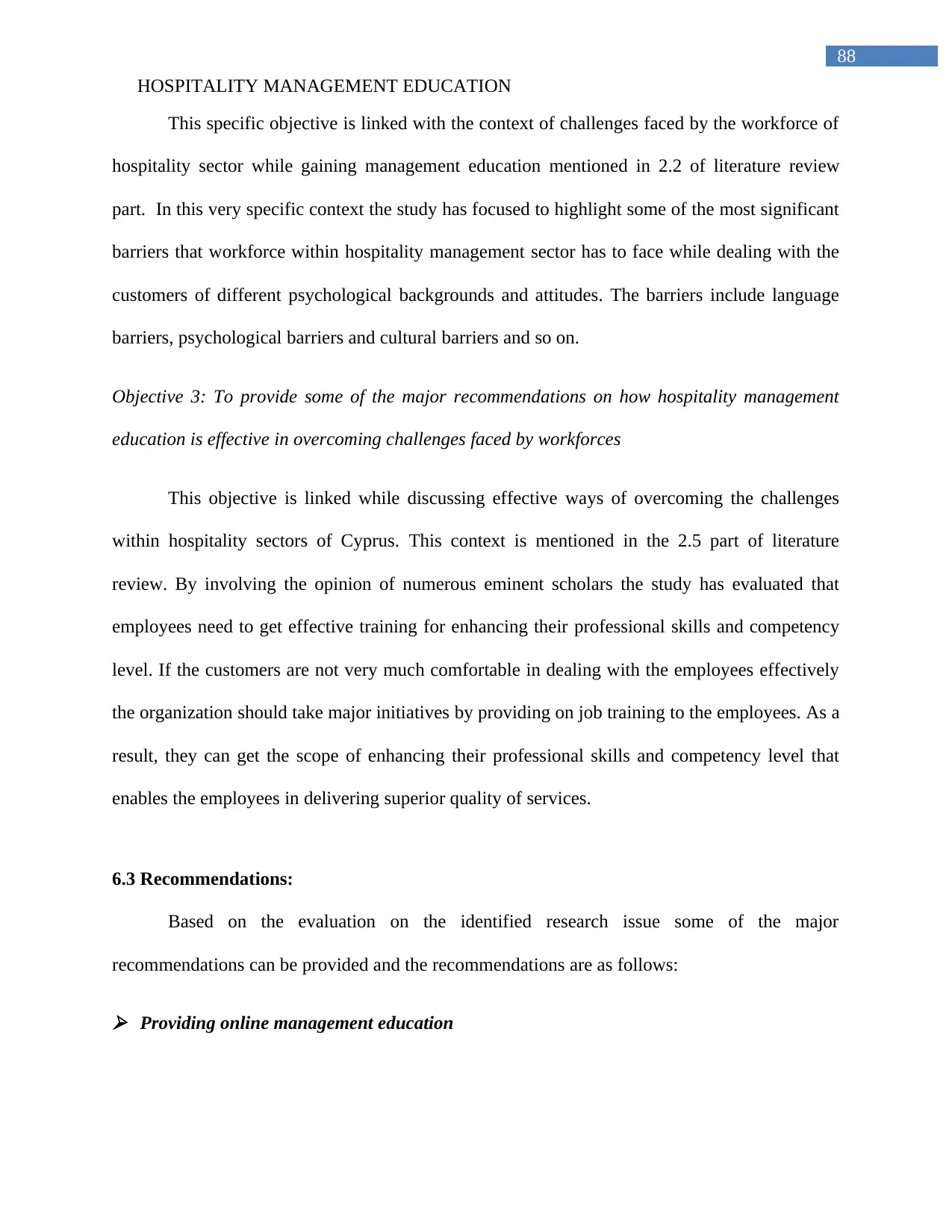
88
HOSPITALITY MANAGEMENT EDUCATION
This specific objective is linked with the context of challenges faced by the workforce of
hospitality sector while gaining management education mentioned in 2.2 of literature review
part. In this very specific context the study has focused to highlight some of the most significant
barriers that workforce within hospitality management sector has to face while dealing with the
customers of different psychological backgrounds and attitudes. The barriers include language
barriers, psychological barriers and cultural barriers and so on.
Objective 3: To provide some of the major recommendations on how hospitality management
education is effective in overcoming challenges faced by workforces
This objective is linked while discussing effective ways of overcoming the challenges
within hospitality sectors of Cyprus. This context is mentioned in the 2.5 part of literature
review. By involving the opinion of numerous eminent scholars the study has evaluated that
employees need to get effective training for enhancing their professional skills and competency
level. If the customers are not very much comfortable in dealing with the employees effectively
the organization should take major initiatives by providing on job training to the employees. As a
result, they can get the scope of enhancing their professional skills and competency level that
enables the employees in delivering superior quality of services.
6.3 Recommendations:
Based on the evaluation on the identified research issue some of the major
recommendations can be provided and the recommendations are as follows:
Providing online management education
HOSPITALITY MANAGEMENT EDUCATION
This specific objective is linked with the context of challenges faced by the workforce of
hospitality sector while gaining management education mentioned in 2.2 of literature review
part. In this very specific context the study has focused to highlight some of the most significant
barriers that workforce within hospitality management sector has to face while dealing with the
customers of different psychological backgrounds and attitudes. The barriers include language
barriers, psychological barriers and cultural barriers and so on.
Objective 3: To provide some of the major recommendations on how hospitality management
education is effective in overcoming challenges faced by workforces
This objective is linked while discussing effective ways of overcoming the challenges
within hospitality sectors of Cyprus. This context is mentioned in the 2.5 part of literature
review. By involving the opinion of numerous eminent scholars the study has evaluated that
employees need to get effective training for enhancing their professional skills and competency
level. If the customers are not very much comfortable in dealing with the employees effectively
the organization should take major initiatives by providing on job training to the employees. As a
result, they can get the scope of enhancing their professional skills and competency level that
enables the employees in delivering superior quality of services.
6.3 Recommendations:
Based on the evaluation on the identified research issue some of the major
recommendations can be provided and the recommendations are as follows:
Providing online management education
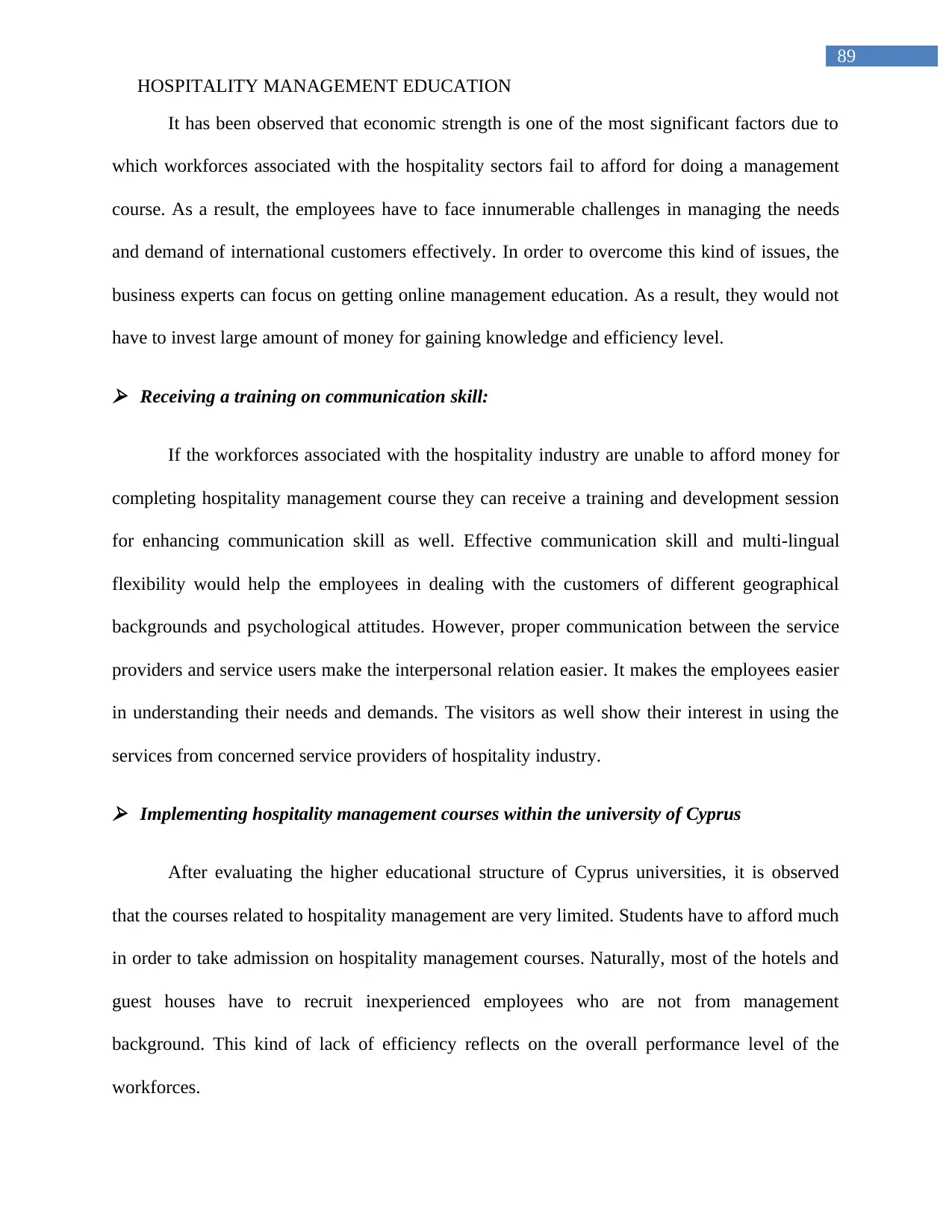
89
HOSPITALITY MANAGEMENT EDUCATION
It has been observed that economic strength is one of the most significant factors due to
which workforces associated with the hospitality sectors fail to afford for doing a management
course. As a result, the employees have to face innumerable challenges in managing the needs
and demand of international customers effectively. In order to overcome this kind of issues, the
business experts can focus on getting online management education. As a result, they would not
have to invest large amount of money for gaining knowledge and efficiency level.
Receiving a training on communication skill:
If the workforces associated with the hospitality industry are unable to afford money for
completing hospitality management course they can receive a training and development session
for enhancing communication skill as well. Effective communication skill and multi-lingual
flexibility would help the employees in dealing with the customers of different geographical
backgrounds and psychological attitudes. However, proper communication between the service
providers and service users make the interpersonal relation easier. It makes the employees easier
in understanding their needs and demands. The visitors as well show their interest in using the
services from concerned service providers of hospitality industry.
Implementing hospitality management courses within the university of Cyprus
After evaluating the higher educational structure of Cyprus universities, it is observed
that the courses related to hospitality management are very limited. Students have to afford much
in order to take admission on hospitality management courses. Naturally, most of the hotels and
guest houses have to recruit inexperienced employees who are not from management
background. This kind of lack of efficiency reflects on the overall performance level of the
workforces.
HOSPITALITY MANAGEMENT EDUCATION
It has been observed that economic strength is one of the most significant factors due to
which workforces associated with the hospitality sectors fail to afford for doing a management
course. As a result, the employees have to face innumerable challenges in managing the needs
and demand of international customers effectively. In order to overcome this kind of issues, the
business experts can focus on getting online management education. As a result, they would not
have to invest large amount of money for gaining knowledge and efficiency level.
Receiving a training on communication skill:
If the workforces associated with the hospitality industry are unable to afford money for
completing hospitality management course they can receive a training and development session
for enhancing communication skill as well. Effective communication skill and multi-lingual
flexibility would help the employees in dealing with the customers of different geographical
backgrounds and psychological attitudes. However, proper communication between the service
providers and service users make the interpersonal relation easier. It makes the employees easier
in understanding their needs and demands. The visitors as well show their interest in using the
services from concerned service providers of hospitality industry.
Implementing hospitality management courses within the university of Cyprus
After evaluating the higher educational structure of Cyprus universities, it is observed
that the courses related to hospitality management are very limited. Students have to afford much
in order to take admission on hospitality management courses. Naturally, most of the hotels and
guest houses have to recruit inexperienced employees who are not from management
background. This kind of lack of efficiency reflects on the overall performance level of the
workforces.
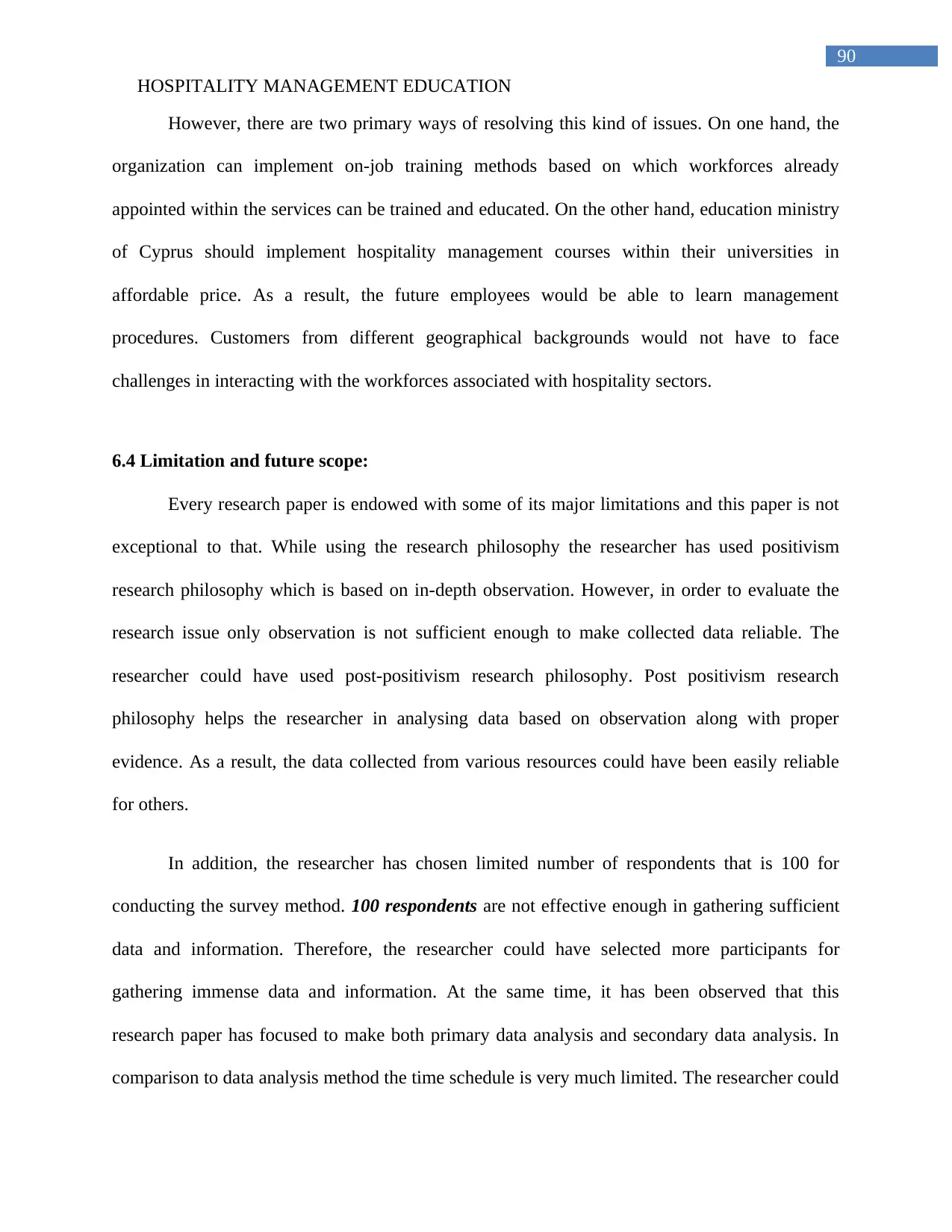
90
HOSPITALITY MANAGEMENT EDUCATION
However, there are two primary ways of resolving this kind of issues. On one hand, the
organization can implement on-job training methods based on which workforces already
appointed within the services can be trained and educated. On the other hand, education ministry
of Cyprus should implement hospitality management courses within their universities in
affordable price. As a result, the future employees would be able to learn management
procedures. Customers from different geographical backgrounds would not have to face
challenges in interacting with the workforces associated with hospitality sectors.
6.4 Limitation and future scope:
Every research paper is endowed with some of its major limitations and this paper is not
exceptional to that. While using the research philosophy the researcher has used positivism
research philosophy which is based on in-depth observation. However, in order to evaluate the
research issue only observation is not sufficient enough to make collected data reliable. The
researcher could have used post-positivism research philosophy. Post positivism research
philosophy helps the researcher in analysing data based on observation along with proper
evidence. As a result, the data collected from various resources could have been easily reliable
for others.
In addition, the researcher has chosen limited number of respondents that is 100 for
conducting the survey method. 100 respondents are not effective enough in gathering sufficient
data and information. Therefore, the researcher could have selected more participants for
gathering immense data and information. At the same time, it has been observed that this
research paper has focused to make both primary data analysis and secondary data analysis. In
comparison to data analysis method the time schedule is very much limited. The researcher could
HOSPITALITY MANAGEMENT EDUCATION
However, there are two primary ways of resolving this kind of issues. On one hand, the
organization can implement on-job training methods based on which workforces already
appointed within the services can be trained and educated. On the other hand, education ministry
of Cyprus should implement hospitality management courses within their universities in
affordable price. As a result, the future employees would be able to learn management
procedures. Customers from different geographical backgrounds would not have to face
challenges in interacting with the workforces associated with hospitality sectors.
6.4 Limitation and future scope:
Every research paper is endowed with some of its major limitations and this paper is not
exceptional to that. While using the research philosophy the researcher has used positivism
research philosophy which is based on in-depth observation. However, in order to evaluate the
research issue only observation is not sufficient enough to make collected data reliable. The
researcher could have used post-positivism research philosophy. Post positivism research
philosophy helps the researcher in analysing data based on observation along with proper
evidence. As a result, the data collected from various resources could have been easily reliable
for others.
In addition, the researcher has chosen limited number of respondents that is 100 for
conducting the survey method. 100 respondents are not effective enough in gathering sufficient
data and information. Therefore, the researcher could have selected more participants for
gathering immense data and information. At the same time, it has been observed that this
research paper has focused to make both primary data analysis and secondary data analysis. In
comparison to data analysis method the time schedule is very much limited. The researcher could
Paraphrase This Document
Need a fresh take? Get an instant paraphrase of this document with our AI Paraphraser
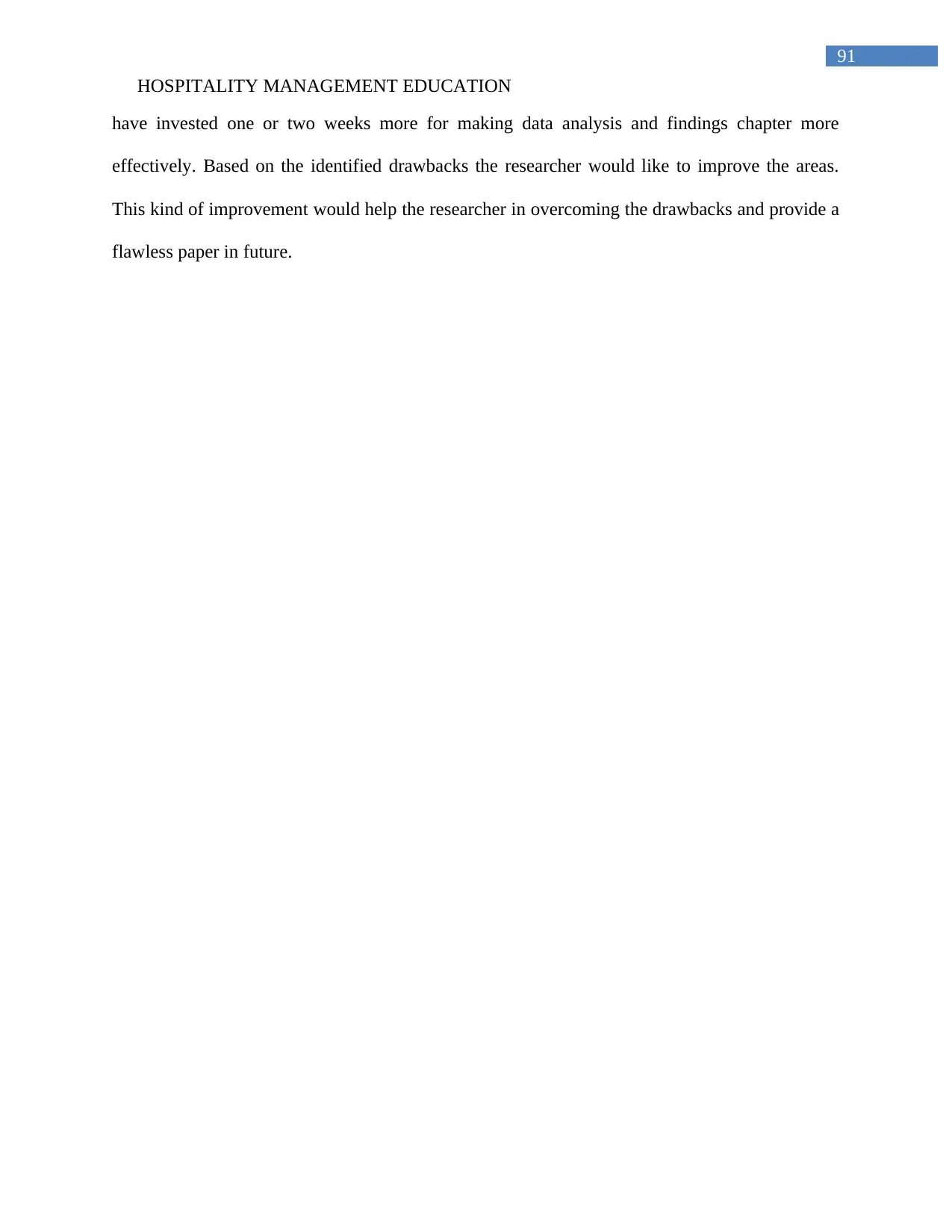
91
HOSPITALITY MANAGEMENT EDUCATION
have invested one or two weeks more for making data analysis and findings chapter more
effectively. Based on the identified drawbacks the researcher would like to improve the areas.
This kind of improvement would help the researcher in overcoming the drawbacks and provide a
flawless paper in future.
HOSPITALITY MANAGEMENT EDUCATION
have invested one or two weeks more for making data analysis and findings chapter more
effectively. Based on the identified drawbacks the researcher would like to improve the areas.
This kind of improvement would help the researcher in overcoming the drawbacks and provide a
flawless paper in future.

92
HOSPITALITY MANAGEMENT EDUCATION
Reference List:
Barron, P., Leask, A. and Fyall, A., 2014. Engaging the multi-generational workforce in tourism
and hospitality. Tourism Review, 69(4), pp.245-263.
Bartlett, K.R., Johnson, K.R. and Schneider, I.E., 2016. Comparing strategic human resource
development approaches for tourism and hospitality workforce planning. Journal of Human
Resources in Hospitality & Tourism, 15(4), pp.440-461.
Bodenhausen, C. and Curtis, C., 2016. Transformational Leadership and Employee Involvement:
Perspectives from Millennial Workforce Entrants. Journal of Quality Assurance in Hospitality &
Tourism, 17(3), pp.371-387.
Breakey, N.M., Robinson, R.N. and Brenner, M.L., 2014. Approaches in the design and delivery
of hotel/hospitality management undergraduate degree programmes within Australia. The
Routledge Handbook of Tourism and Hospitality Education, p.305.
Brown, E.A., Arendt, S.W. and Bosselman, R.H., 2014. Hospitality management graduates’
perceptions of career factor importance and career factor experience. International Journal of
Hospitality Management, 37, pp.58-67.
Brown, E.A., Thomas, N.J. and Bosselman, R.H., 2015. Are they leaving or staying: A
qualitative analysis of turnover issues for Generation Y hospitality employees with a hospitality
education. International Journal of Hospitality Management, 46, pp.130-137.
Bryman, A. and Bell, E., 2015. Business research methods. Oxford University Press, USA.
Coleman, R. (Ed.)., 2013. Deleuze and research methodologies. Edinburgh University Press.
HOSPITALITY MANAGEMENT EDUCATION
Reference List:
Barron, P., Leask, A. and Fyall, A., 2014. Engaging the multi-generational workforce in tourism
and hospitality. Tourism Review, 69(4), pp.245-263.
Bartlett, K.R., Johnson, K.R. and Schneider, I.E., 2016. Comparing strategic human resource
development approaches for tourism and hospitality workforce planning. Journal of Human
Resources in Hospitality & Tourism, 15(4), pp.440-461.
Bodenhausen, C. and Curtis, C., 2016. Transformational Leadership and Employee Involvement:
Perspectives from Millennial Workforce Entrants. Journal of Quality Assurance in Hospitality &
Tourism, 17(3), pp.371-387.
Breakey, N.M., Robinson, R.N. and Brenner, M.L., 2014. Approaches in the design and delivery
of hotel/hospitality management undergraduate degree programmes within Australia. The
Routledge Handbook of Tourism and Hospitality Education, p.305.
Brown, E.A., Arendt, S.W. and Bosselman, R.H., 2014. Hospitality management graduates’
perceptions of career factor importance and career factor experience. International Journal of
Hospitality Management, 37, pp.58-67.
Brown, E.A., Thomas, N.J. and Bosselman, R.H., 2015. Are they leaving or staying: A
qualitative analysis of turnover issues for Generation Y hospitality employees with a hospitality
education. International Journal of Hospitality Management, 46, pp.130-137.
Bryman, A. and Bell, E., 2015. Business research methods. Oxford University Press, USA.
Coleman, R. (Ed.)., 2013. Deleuze and research methodologies. Edinburgh University Press.
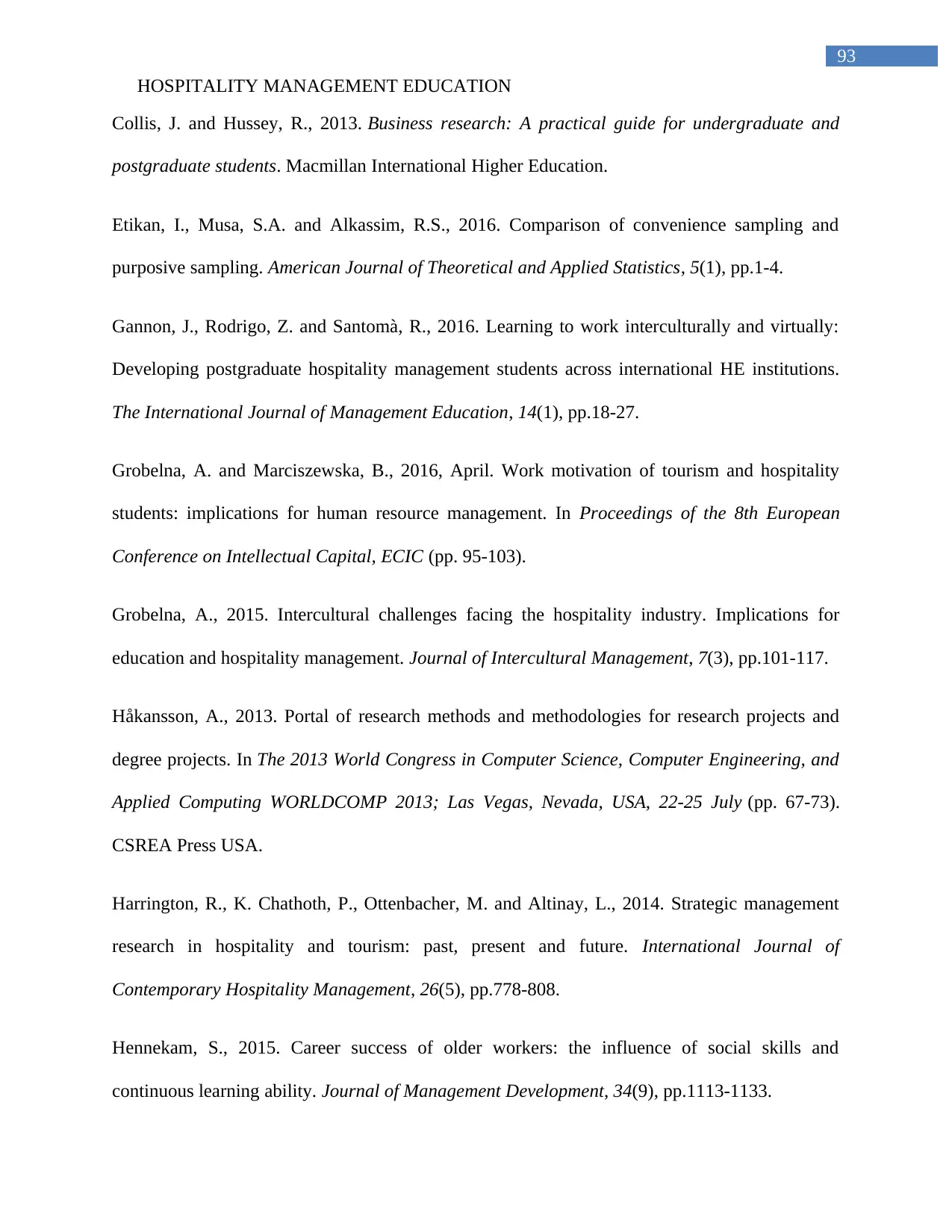
93
HOSPITALITY MANAGEMENT EDUCATION
Collis, J. and Hussey, R., 2013. Business research: A practical guide for undergraduate and
postgraduate students. Macmillan International Higher Education.
Etikan, I., Musa, S.A. and Alkassim, R.S., 2016. Comparison of convenience sampling and
purposive sampling. American Journal of Theoretical and Applied Statistics, 5(1), pp.1-4.
Gannon, J., Rodrigo, Z. and Santomà, R., 2016. Learning to work interculturally and virtually:
Developing postgraduate hospitality management students across international HE institutions.
The International Journal of Management Education, 14(1), pp.18-27.
Grobelna, A. and Marciszewska, B., 2016, April. Work motivation of tourism and hospitality
students: implications for human resource management. In Proceedings of the 8th European
Conference on Intellectual Capital, ECIC (pp. 95-103).
Grobelna, A., 2015. Intercultural challenges facing the hospitality industry. Implications for
education and hospitality management. Journal of Intercultural Management, 7(3), pp.101-117.
Håkansson, A., 2013. Portal of research methods and methodologies for research projects and
degree projects. In The 2013 World Congress in Computer Science, Computer Engineering, and
Applied Computing WORLDCOMP 2013; Las Vegas, Nevada, USA, 22-25 July (pp. 67-73).
CSREA Press USA.
Harrington, R., K. Chathoth, P., Ottenbacher, M. and Altinay, L., 2014. Strategic management
research in hospitality and tourism: past, present and future. International Journal of
Contemporary Hospitality Management, 26(5), pp.778-808.
Hennekam, S., 2015. Career success of older workers: the influence of social skills and
continuous learning ability. Journal of Management Development, 34(9), pp.1113-1133.
HOSPITALITY MANAGEMENT EDUCATION
Collis, J. and Hussey, R., 2013. Business research: A practical guide for undergraduate and
postgraduate students. Macmillan International Higher Education.
Etikan, I., Musa, S.A. and Alkassim, R.S., 2016. Comparison of convenience sampling and
purposive sampling. American Journal of Theoretical and Applied Statistics, 5(1), pp.1-4.
Gannon, J., Rodrigo, Z. and Santomà, R., 2016. Learning to work interculturally and virtually:
Developing postgraduate hospitality management students across international HE institutions.
The International Journal of Management Education, 14(1), pp.18-27.
Grobelna, A. and Marciszewska, B., 2016, April. Work motivation of tourism and hospitality
students: implications for human resource management. In Proceedings of the 8th European
Conference on Intellectual Capital, ECIC (pp. 95-103).
Grobelna, A., 2015. Intercultural challenges facing the hospitality industry. Implications for
education and hospitality management. Journal of Intercultural Management, 7(3), pp.101-117.
Håkansson, A., 2013. Portal of research methods and methodologies for research projects and
degree projects. In The 2013 World Congress in Computer Science, Computer Engineering, and
Applied Computing WORLDCOMP 2013; Las Vegas, Nevada, USA, 22-25 July (pp. 67-73).
CSREA Press USA.
Harrington, R., K. Chathoth, P., Ottenbacher, M. and Altinay, L., 2014. Strategic management
research in hospitality and tourism: past, present and future. International Journal of
Contemporary Hospitality Management, 26(5), pp.778-808.
Hennekam, S., 2015. Career success of older workers: the influence of social skills and
continuous learning ability. Journal of Management Development, 34(9), pp.1113-1133.
Secure Best Marks with AI Grader
Need help grading? Try our AI Grader for instant feedback on your assignments.
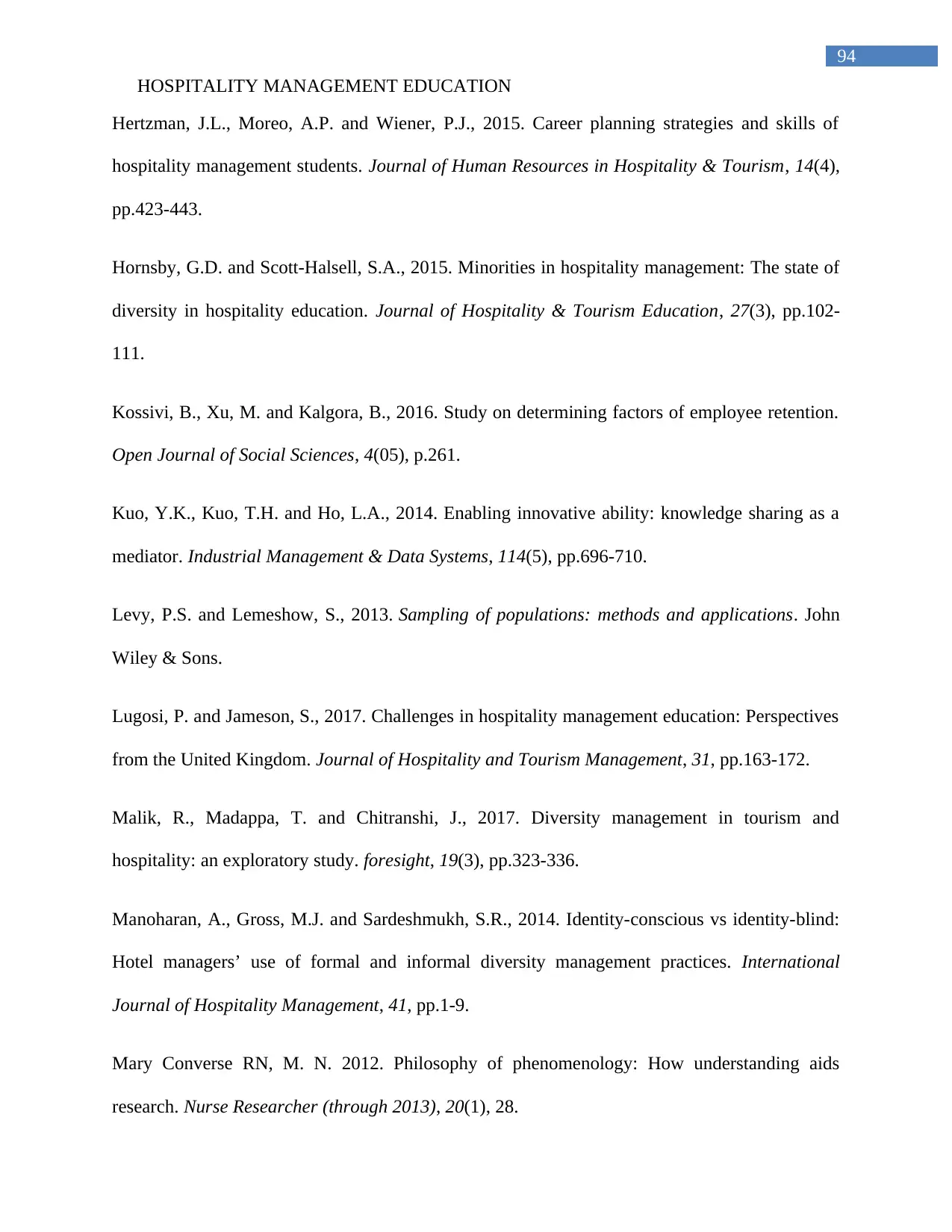
94
HOSPITALITY MANAGEMENT EDUCATION
Hertzman, J.L., Moreo, A.P. and Wiener, P.J., 2015. Career planning strategies and skills of
hospitality management students. Journal of Human Resources in Hospitality & Tourism, 14(4),
pp.423-443.
Hornsby, G.D. and Scott-Halsell, S.A., 2015. Minorities in hospitality management: The state of
diversity in hospitality education. Journal of Hospitality & Tourism Education, 27(3), pp.102-
111.
Kossivi, B., Xu, M. and Kalgora, B., 2016. Study on determining factors of employee retention.
Open Journal of Social Sciences, 4(05), p.261.
Kuo, Y.K., Kuo, T.H. and Ho, L.A., 2014. Enabling innovative ability: knowledge sharing as a
mediator. Industrial Management & Data Systems, 114(5), pp.696-710.
Levy, P.S. and Lemeshow, S., 2013. Sampling of populations: methods and applications. John
Wiley & Sons.
Lugosi, P. and Jameson, S., 2017. Challenges in hospitality management education: Perspectives
from the United Kingdom. Journal of Hospitality and Tourism Management, 31, pp.163-172.
Malik, R., Madappa, T. and Chitranshi, J., 2017. Diversity management in tourism and
hospitality: an exploratory study. foresight, 19(3), pp.323-336.
Manoharan, A., Gross, M.J. and Sardeshmukh, S.R., 2014. Identity-conscious vs identity-blind:
Hotel managers’ use of formal and informal diversity management practices. International
Journal of Hospitality Management, 41, pp.1-9.
Mary Converse RN, M. N. 2012. Philosophy of phenomenology: How understanding aids
research. Nurse Researcher (through 2013), 20(1), 28.
HOSPITALITY MANAGEMENT EDUCATION
Hertzman, J.L., Moreo, A.P. and Wiener, P.J., 2015. Career planning strategies and skills of
hospitality management students. Journal of Human Resources in Hospitality & Tourism, 14(4),
pp.423-443.
Hornsby, G.D. and Scott-Halsell, S.A., 2015. Minorities in hospitality management: The state of
diversity in hospitality education. Journal of Hospitality & Tourism Education, 27(3), pp.102-
111.
Kossivi, B., Xu, M. and Kalgora, B., 2016. Study on determining factors of employee retention.
Open Journal of Social Sciences, 4(05), p.261.
Kuo, Y.K., Kuo, T.H. and Ho, L.A., 2014. Enabling innovative ability: knowledge sharing as a
mediator. Industrial Management & Data Systems, 114(5), pp.696-710.
Levy, P.S. and Lemeshow, S., 2013. Sampling of populations: methods and applications. John
Wiley & Sons.
Lugosi, P. and Jameson, S., 2017. Challenges in hospitality management education: Perspectives
from the United Kingdom. Journal of Hospitality and Tourism Management, 31, pp.163-172.
Malik, R., Madappa, T. and Chitranshi, J., 2017. Diversity management in tourism and
hospitality: an exploratory study. foresight, 19(3), pp.323-336.
Manoharan, A., Gross, M.J. and Sardeshmukh, S.R., 2014. Identity-conscious vs identity-blind:
Hotel managers’ use of formal and informal diversity management practices. International
Journal of Hospitality Management, 41, pp.1-9.
Mary Converse RN, M. N. 2012. Philosophy of phenomenology: How understanding aids
research. Nurse Researcher (through 2013), 20(1), 28.
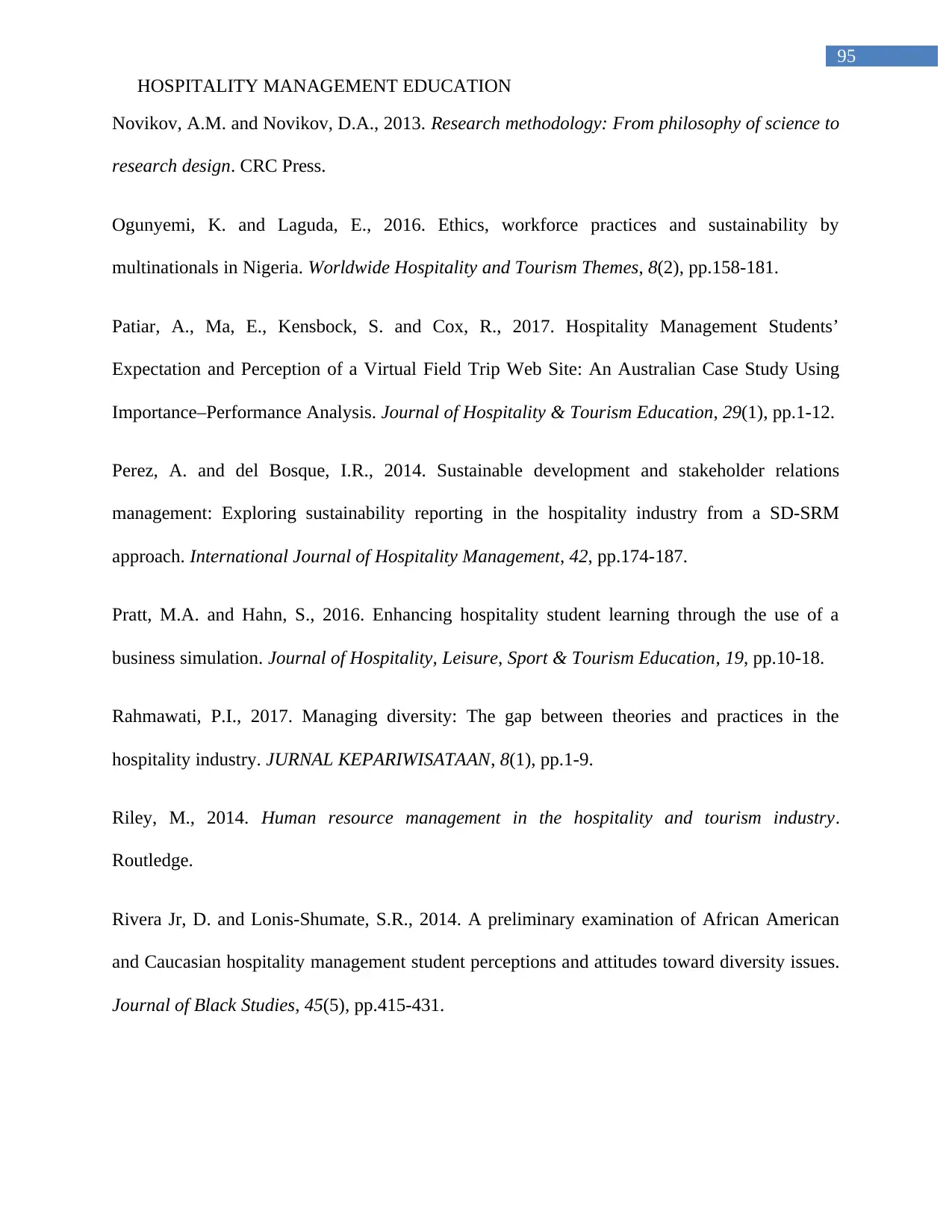
95
HOSPITALITY MANAGEMENT EDUCATION
Novikov, A.M. and Novikov, D.A., 2013. Research methodology: From philosophy of science to
research design. CRC Press.
Ogunyemi, K. and Laguda, E., 2016. Ethics, workforce practices and sustainability by
multinationals in Nigeria. Worldwide Hospitality and Tourism Themes, 8(2), pp.158-181.
Patiar, A., Ma, E., Kensbock, S. and Cox, R., 2017. Hospitality Management Students’
Expectation and Perception of a Virtual Field Trip Web Site: An Australian Case Study Using
Importance–Performance Analysis. Journal of Hospitality & Tourism Education, 29(1), pp.1-12.
Perez, A. and del Bosque, I.R., 2014. Sustainable development and stakeholder relations
management: Exploring sustainability reporting in the hospitality industry from a SD-SRM
approach. International Journal of Hospitality Management, 42, pp.174-187.
Pratt, M.A. and Hahn, S., 2016. Enhancing hospitality student learning through the use of a
business simulation. Journal of Hospitality, Leisure, Sport & Tourism Education, 19, pp.10-18.
Rahmawati, P.I., 2017. Managing diversity: The gap between theories and practices in the
hospitality industry. JURNAL KEPARIWISATAAN, 8(1), pp.1-9.
Riley, M., 2014. Human resource management in the hospitality and tourism industry.
Routledge.
Rivera Jr, D. and Lonis-Shumate, S.R., 2014. A preliminary examination of African American
and Caucasian hospitality management student perceptions and attitudes toward diversity issues.
Journal of Black Studies, 45(5), pp.415-431.
HOSPITALITY MANAGEMENT EDUCATION
Novikov, A.M. and Novikov, D.A., 2013. Research methodology: From philosophy of science to
research design. CRC Press.
Ogunyemi, K. and Laguda, E., 2016. Ethics, workforce practices and sustainability by
multinationals in Nigeria. Worldwide Hospitality and Tourism Themes, 8(2), pp.158-181.
Patiar, A., Ma, E., Kensbock, S. and Cox, R., 2017. Hospitality Management Students’
Expectation and Perception of a Virtual Field Trip Web Site: An Australian Case Study Using
Importance–Performance Analysis. Journal of Hospitality & Tourism Education, 29(1), pp.1-12.
Perez, A. and del Bosque, I.R., 2014. Sustainable development and stakeholder relations
management: Exploring sustainability reporting in the hospitality industry from a SD-SRM
approach. International Journal of Hospitality Management, 42, pp.174-187.
Pratt, M.A. and Hahn, S., 2016. Enhancing hospitality student learning through the use of a
business simulation. Journal of Hospitality, Leisure, Sport & Tourism Education, 19, pp.10-18.
Rahmawati, P.I., 2017. Managing diversity: The gap between theories and practices in the
hospitality industry. JURNAL KEPARIWISATAAN, 8(1), pp.1-9.
Riley, M., 2014. Human resource management in the hospitality and tourism industry.
Routledge.
Rivera Jr, D. and Lonis-Shumate, S.R., 2014. A preliminary examination of African American
and Caucasian hospitality management student perceptions and attitudes toward diversity issues.
Journal of Black Studies, 45(5), pp.415-431.
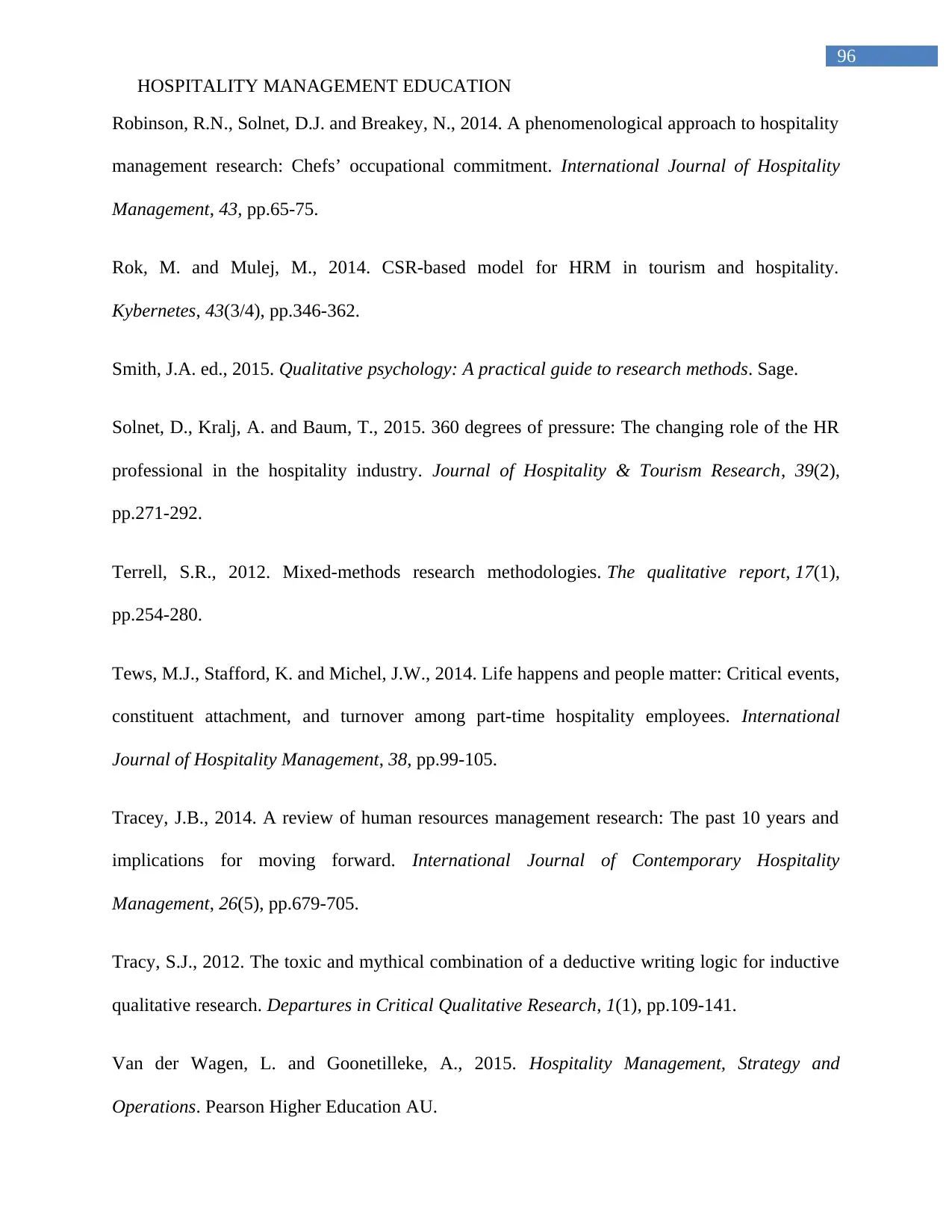
96
HOSPITALITY MANAGEMENT EDUCATION
Robinson, R.N., Solnet, D.J. and Breakey, N., 2014. A phenomenological approach to hospitality
management research: Chefs’ occupational commitment. International Journal of Hospitality
Management, 43, pp.65-75.
Rok, M. and Mulej, M., 2014. CSR-based model for HRM in tourism and hospitality.
Kybernetes, 43(3/4), pp.346-362.
Smith, J.A. ed., 2015. Qualitative psychology: A practical guide to research methods. Sage.
Solnet, D., Kralj, A. and Baum, T., 2015. 360 degrees of pressure: The changing role of the HR
professional in the hospitality industry. Journal of Hospitality & Tourism Research, 39(2),
pp.271-292.
Terrell, S.R., 2012. Mixed-methods research methodologies. The qualitative report, 17(1),
pp.254-280.
Tews, M.J., Stafford, K. and Michel, J.W., 2014. Life happens and people matter: Critical events,
constituent attachment, and turnover among part-time hospitality employees. International
Journal of Hospitality Management, 38, pp.99-105.
Tracey, J.B., 2014. A review of human resources management research: The past 10 years and
implications for moving forward. International Journal of Contemporary Hospitality
Management, 26(5), pp.679-705.
Tracy, S.J., 2012. The toxic and mythical combination of a deductive writing logic for inductive
qualitative research. Departures in Critical Qualitative Research, 1(1), pp.109-141.
Van der Wagen, L. and Goonetilleke, A., 2015. Hospitality Management, Strategy and
Operations. Pearson Higher Education AU.
HOSPITALITY MANAGEMENT EDUCATION
Robinson, R.N., Solnet, D.J. and Breakey, N., 2014. A phenomenological approach to hospitality
management research: Chefs’ occupational commitment. International Journal of Hospitality
Management, 43, pp.65-75.
Rok, M. and Mulej, M., 2014. CSR-based model for HRM in tourism and hospitality.
Kybernetes, 43(3/4), pp.346-362.
Smith, J.A. ed., 2015. Qualitative psychology: A practical guide to research methods. Sage.
Solnet, D., Kralj, A. and Baum, T., 2015. 360 degrees of pressure: The changing role of the HR
professional in the hospitality industry. Journal of Hospitality & Tourism Research, 39(2),
pp.271-292.
Terrell, S.R., 2012. Mixed-methods research methodologies. The qualitative report, 17(1),
pp.254-280.
Tews, M.J., Stafford, K. and Michel, J.W., 2014. Life happens and people matter: Critical events,
constituent attachment, and turnover among part-time hospitality employees. International
Journal of Hospitality Management, 38, pp.99-105.
Tracey, J.B., 2014. A review of human resources management research: The past 10 years and
implications for moving forward. International Journal of Contemporary Hospitality
Management, 26(5), pp.679-705.
Tracy, S.J., 2012. The toxic and mythical combination of a deductive writing logic for inductive
qualitative research. Departures in Critical Qualitative Research, 1(1), pp.109-141.
Van der Wagen, L. and Goonetilleke, A., 2015. Hospitality Management, Strategy and
Operations. Pearson Higher Education AU.
Paraphrase This Document
Need a fresh take? Get an instant paraphrase of this document with our AI Paraphraser

97
HOSPITALITY MANAGEMENT EDUCATION
van Wyk, B. 2012. Research design and methods Part I. University of Western Cape.
Vasquez, D., 2014. Employee retention for economic stabilization: A qualitative
phenomenological study in the hospitality sector.
Wahyuni, D., 2012. The research design maze: Understanding paradigms, cases, methods and
methodologies.
Wang, Y.F. and Tsai, C.T., 2014. Employability of hospitality graduates: Student and industry
perspectives. Journal of Hospitality & Tourism Education, 26(3), pp.125-135.
Wood, R.C. ed., 2015. Hospitality management: A brief introduction. Sage
Woods, K., 2016. Organizational ambidexterity and the multi-generational workforce. Journal of
Organizational Culture, Communications and Conflict, 20(1), p.95.
Zaitseva, N.A., Semenova, L.V., Larionova, A.A., Yumatov, K.V. and Hamnaeva, N.I., 2016.
The role of human resource capacity to ensure the competitiveness of the cross-border
cooperation projects in the tourism and hospitality industry. IEJME Math Educ, 11(7), pp.1961-
1970.
Zikmund, W.G., Babin, B.J., Carr, J.C. and Griffin, M., 2013. Business research methods.
Cengage Learning.
HOSPITALITY MANAGEMENT EDUCATION
van Wyk, B. 2012. Research design and methods Part I. University of Western Cape.
Vasquez, D., 2014. Employee retention for economic stabilization: A qualitative
phenomenological study in the hospitality sector.
Wahyuni, D., 2012. The research design maze: Understanding paradigms, cases, methods and
methodologies.
Wang, Y.F. and Tsai, C.T., 2014. Employability of hospitality graduates: Student and industry
perspectives. Journal of Hospitality & Tourism Education, 26(3), pp.125-135.
Wood, R.C. ed., 2015. Hospitality management: A brief introduction. Sage
Woods, K., 2016. Organizational ambidexterity and the multi-generational workforce. Journal of
Organizational Culture, Communications and Conflict, 20(1), p.95.
Zaitseva, N.A., Semenova, L.V., Larionova, A.A., Yumatov, K.V. and Hamnaeva, N.I., 2016.
The role of human resource capacity to ensure the competitiveness of the cross-border
cooperation projects in the tourism and hospitality industry. IEJME Math Educ, 11(7), pp.1961-
1970.
Zikmund, W.G., Babin, B.J., Carr, J.C. and Griffin, M., 2013. Business research methods.
Cengage Learning.

98
HOSPITALITY MANAGEMENT EDUCATION
Appendices
4.1 Demographic Questions
Q1. In which age group you belong?
Q2. How many years you have been associated with hospitality industry?
4.2.1 Quantitative questions on hospitality management education
Q3. How far do you agree that hospitality management education is important for your
personality development?
4.2 Quantitative Questions
Q4. Do you agree that hospitality management education is important for enhancing the
communication skill?
Q5. How far do you agree that the education in hospitality management is required for improved
decision making skill?
Q6. Do you agree that hospitability management education is necessary for improved
technological competency?
4.2.2 Quantitative Questions on hospitality workforce
Q7. How far do you agree that you always want to learn new things concerning your job
responsibility for assuring your position in the company?
HOSPITALITY MANAGEMENT EDUCATION
Appendices
4.1 Demographic Questions
Q1. In which age group you belong?
Q2. How many years you have been associated with hospitality industry?
4.2.1 Quantitative questions on hospitality management education
Q3. How far do you agree that hospitality management education is important for your
personality development?
4.2 Quantitative Questions
Q4. Do you agree that hospitality management education is important for enhancing the
communication skill?
Q5. How far do you agree that the education in hospitality management is required for improved
decision making skill?
Q6. Do you agree that hospitability management education is necessary for improved
technological competency?
4.2.2 Quantitative Questions on hospitality workforce
Q7. How far do you agree that you always want to learn new things concerning your job
responsibility for assuring your position in the company?
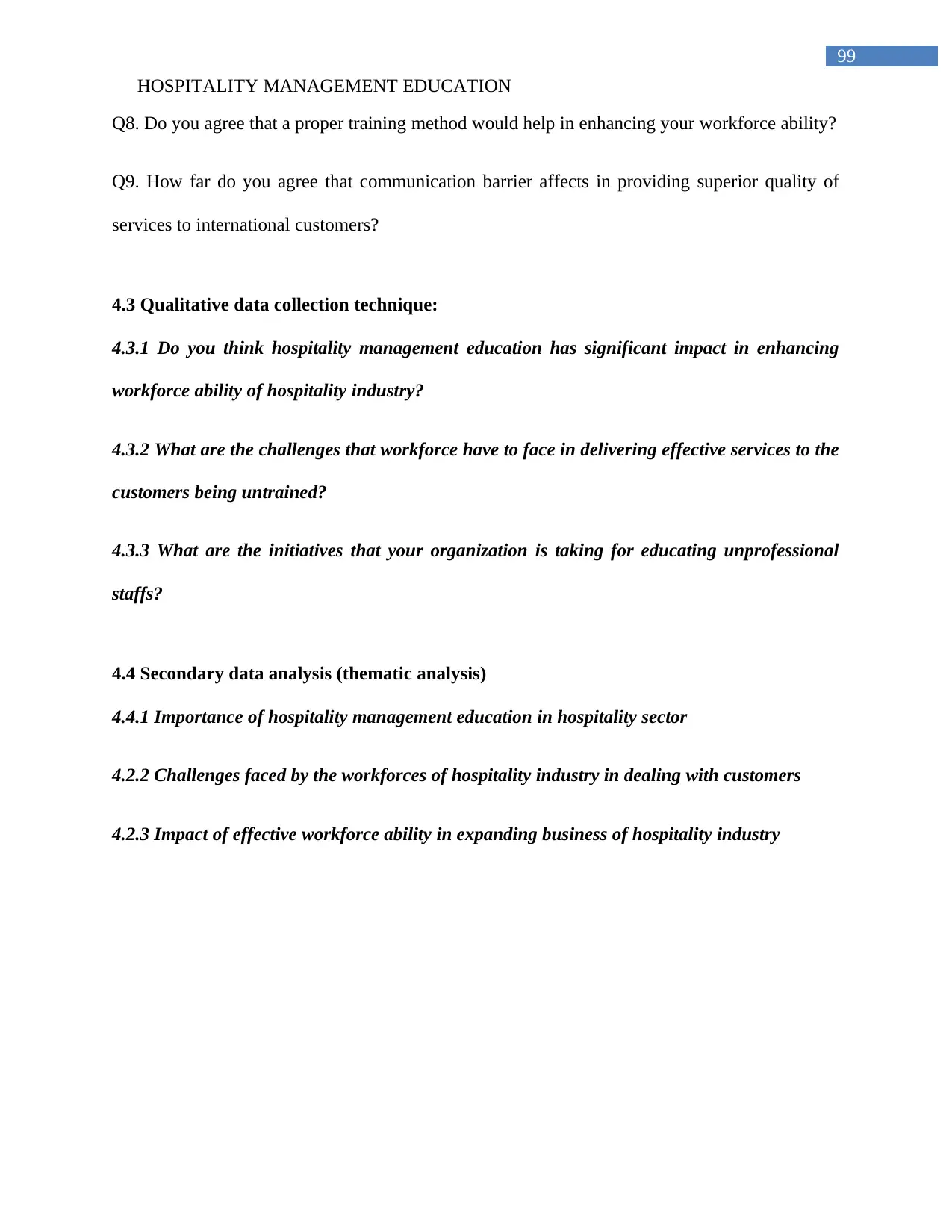
99
HOSPITALITY MANAGEMENT EDUCATION
Q8. Do you agree that a proper training method would help in enhancing your workforce ability?
Q9. How far do you agree that communication barrier affects in providing superior quality of
services to international customers?
4.3 Qualitative data collection technique:
4.3.1 Do you think hospitality management education has significant impact in enhancing
workforce ability of hospitality industry?
4.3.2 What are the challenges that workforce have to face in delivering effective services to the
customers being untrained?
4.3.3 What are the initiatives that your organization is taking for educating unprofessional
staffs?
4.4 Secondary data analysis (thematic analysis)
4.4.1 Importance of hospitality management education in hospitality sector
4.2.2 Challenges faced by the workforces of hospitality industry in dealing with customers
4.2.3 Impact of effective workforce ability in expanding business of hospitality industry
HOSPITALITY MANAGEMENT EDUCATION
Q8. Do you agree that a proper training method would help in enhancing your workforce ability?
Q9. How far do you agree that communication barrier affects in providing superior quality of
services to international customers?
4.3 Qualitative data collection technique:
4.3.1 Do you think hospitality management education has significant impact in enhancing
workforce ability of hospitality industry?
4.3.2 What are the challenges that workforce have to face in delivering effective services to the
customers being untrained?
4.3.3 What are the initiatives that your organization is taking for educating unprofessional
staffs?
4.4 Secondary data analysis (thematic analysis)
4.4.1 Importance of hospitality management education in hospitality sector
4.2.2 Challenges faced by the workforces of hospitality industry in dealing with customers
4.2.3 Impact of effective workforce ability in expanding business of hospitality industry
1 out of 100
Related Documents
Your All-in-One AI-Powered Toolkit for Academic Success.
+13062052269
info@desklib.com
Available 24*7 on WhatsApp / Email
![[object Object]](/_next/static/media/star-bottom.7253800d.svg)
Unlock your academic potential
© 2024 | Zucol Services PVT LTD | All rights reserved.





